The Lord of the Rings: Tales of Middle-earth™ Release Notes
Editor's Note: The Lord of the Rings: Tales of Middle-earth™ Release Notes have been updated to include cards from Scene Boxes and Jumpstart Volume 2, releasing November 3, 2023.
Compiled by Eric Levine
Document last modified May 8, 2023
PDF Download Links:
English | 中国话,汉语;中文 | Français | Deutsch
Italiano | Português | Español | 日本語
The Release Notes include information concerning the release of a new Magic: The Gathering set, as well as a collection of clarifications and rulings involving that set's cards. It's intended to make playing with the new cards more fun by clearing up the common misconceptions and confusion inevitably caused by new mechanics and interactions. As future sets are released, updates to the Magic rules may cause some of this information to become outdated. Go to Magic.Wizards.com/Rules to find the most up-to-date rules.
The "General Notes" section includes information about card legality and explains some of the mechanics and concepts in the set.
The "Card-Specific Notes" sections contain answers to the most important, most common, and most confusing questions players might ask about cards in the set. Items in the "Card-Specific Notes" sections include full card text for your reference. Not all cards in the set are listed.
GENERAL NOTES
Card Legality
The Lord of the Rings: Tales of Middle-earth™ cards with the LTR set code are permitted in the Modern format, as well as in Commander, Legacy, and Vintage.
New The Lord of the Rings: Tales of Middle-earth Commander cards with the LTC set code are permitted in the Commander, Legacy, and Vintage formats. Reprinted cards with the LTC set code are legal for play in any format where a card with the same name is permitted.
Go to Magic.Wizards.com/Formats for a complete list of formats and their permitted card sets and banned lists.
Go to Magic.Wizards.com/Commander for more information on the Commander variant.
Go to Locator.Wizards.com to find an event or store near you.
New Mechanic: The Ring tempts you
The One Ring, forged by the Dark Lord Sauron, is both powerful and dangerous. The mechanic the Ring tempts you allows you to designate a creature as your Ring-bearer. Each time the Ring tempts you, it will gain a new ability that makes your Ring-bearer more powerful while attacking.
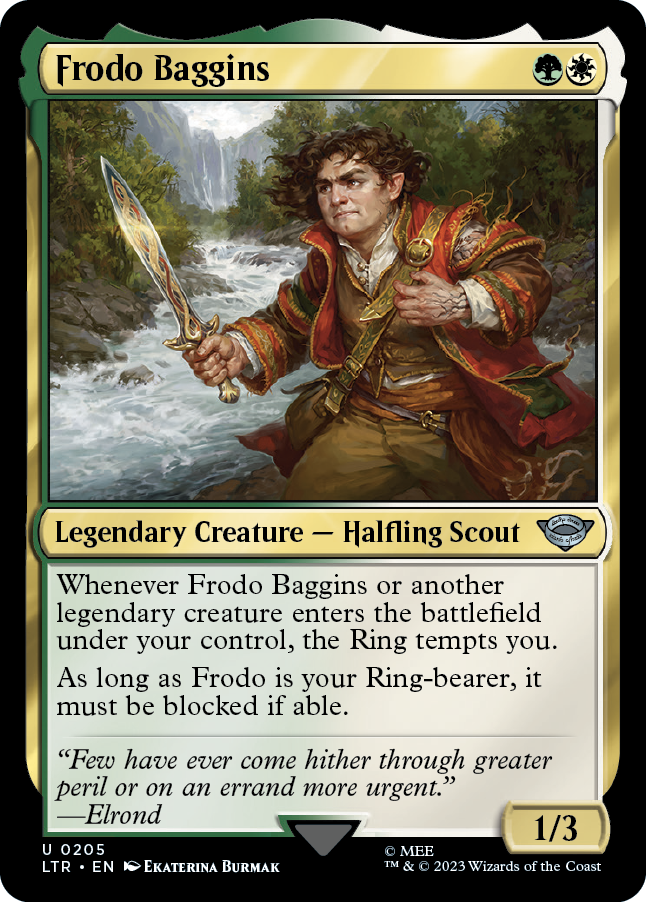
Frodo Baggins
{G}{W}
Legendary Creature — Halfling Scout
1/3
Whenever Frodo Baggins or another legendary creature enters the battlefield under your control, the Ring tempts you.
As long as Frodo is your Ring-bearer, it must be blocked if able.
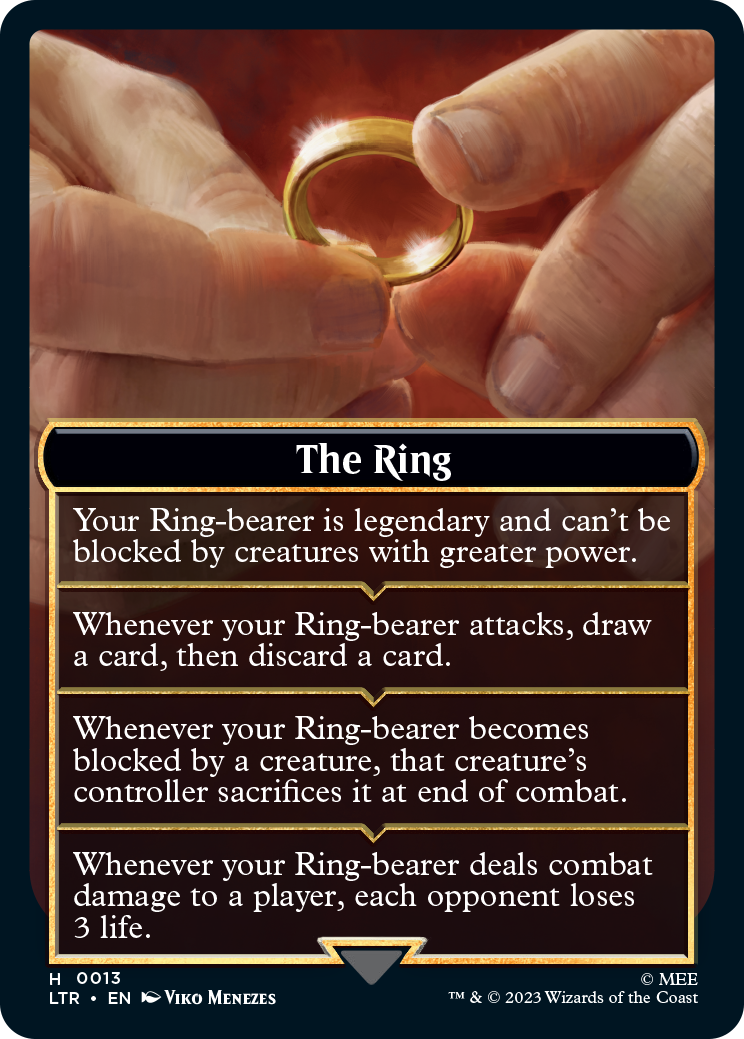
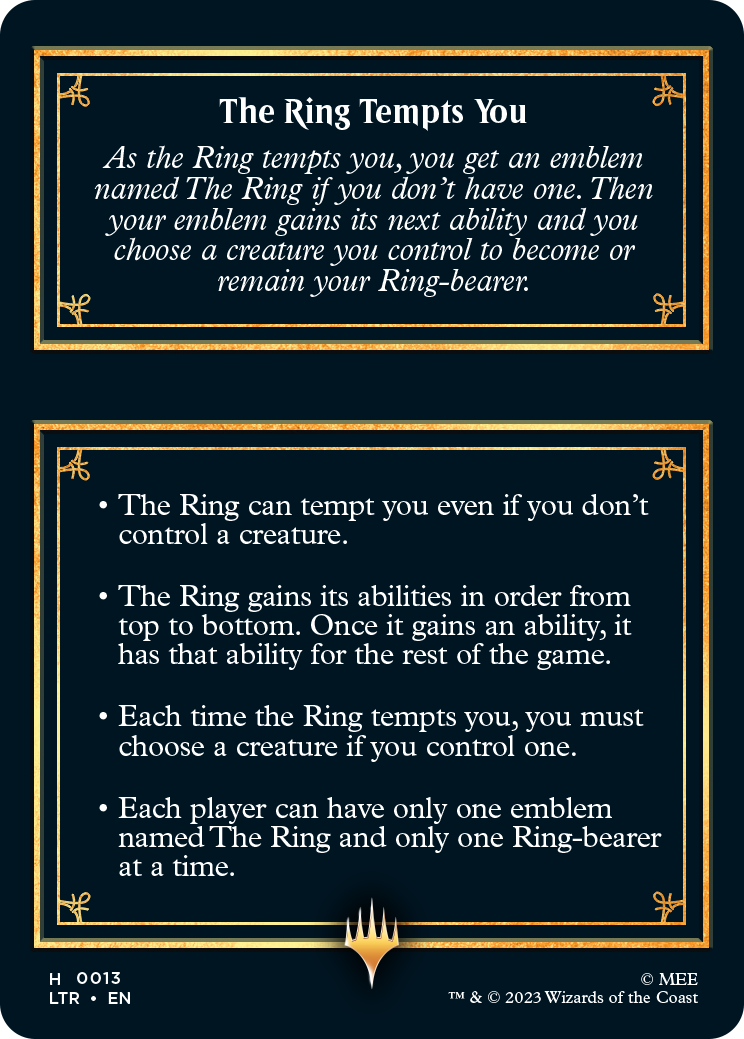
The Ring
Your Ring-bearer is legendary and can't be blocked by creatures with greater power.
Whenever your Ring-bearer attacks, draw a card, then discard a card.
Whenever your Ring-bearer becomes blocked by a creature, that creature's controller sacrifices it at end of combat.
Whenever your Ring-bearer deals combat damage to a player, each opponent loses 3 life.
- As the Ring tempts you, you get an emblem named The Ring if you don't have one. Then your emblem gains its next ability and you choose a creature you control to become (or remain) your Ring-bearer.
- The Ring can tempt you even if you don't control a creature. In this case, abilities that trigger "whenever the Ring tempts you" will still trigger.
- If the creature you choose as your Ring-bearer was already your Ring-bearer, that still counts as choosing that creature as your Ring-bearer for the purpose of abilities that trigger "whenever you choose a creature as your Ring-bearer" or abilities that care about which creature was chosen as your Ring-bearer.
- The Ring gains its abilities in order from top to bottom. Once it gains an ability, it has that ability for the rest of the game.
- Each time the Ring tempts you, you must choose a creature if you control one.
- Each player can have only one emblem named The Ring and only one Ring-bearer at a time.
- Some spells and abilities that cause the Ring to tempt you may require targets. If each target chosen is an illegal target as that spell or ability tries to resolve, it won't resolve. The Ring won't tempt you.
New Mechanic: Amass Orcs
Amass is back, but this time, it's a little different. In The Lord of the Rings: Tales of Middle-earth, amass represents Sauron's ever-growing armies of Orcs, which he plans to use to conquer all of Middle-earth and gain control of the One Ring once more.
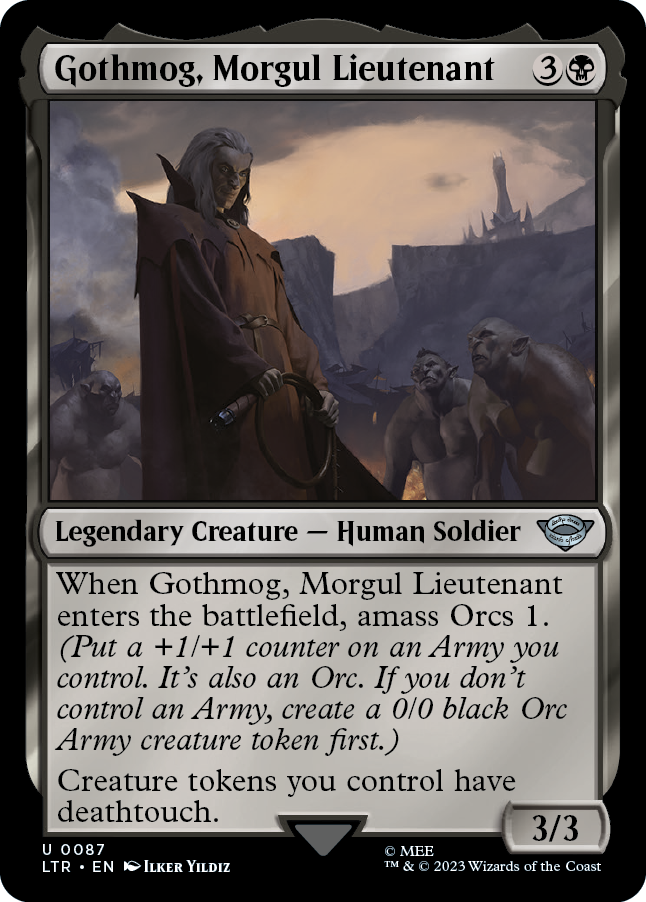
Gothmog, Morgul Lieutenant
{3}{B}
Legendary Creature — Human Soldier
3/3
When Gothmog, Morgul Lieutenant enters the battlefield, amass Orcs 1. (Put a +1/+1 counter on an Army you control. It's also an Orc. If you don't control an Army, create a 0/0 black Orc Army creature token first.)
Creature tokens you control have deathtouch.
General Amass Orcs Notes:
- Amass abilities are now written as "amass [subtype] N." Previous cards with amass will receive errata to say "amass Zombies N."
- To amass Orcs N, if you don't control an Army creature, create a 0/0 black Orc Army creature token. Then you choose an Army creature you control and put N +1/+1 counters on it. If that Army isn't already an Orc, it becomes an Orc in addition to its other types.
- Amass Zombies works the same way, except you create a 0/0 black Zombie Army creature token if you don't control an Army. And if the Army creature you chose isn't already a Zombie, it becomes a Zombie in addition to its other types. By combining cards with amass Orcs and amass Zombies, you can end up with an Orc Zombie Army.
- In the rare case that you control multiple Army creatures (perhaps because you played a creature with changeling) while you amass Orcs, you choose which of your Army creatures to put the +1/+1 counters on. If that creature isn't an Orc, it becomes an Orc in addition to its other types.
- If you don't control an Army, the Orc Army token you create enters the battlefield as a 0/0 creature before receiving counters. Any abilities that trigger when a creature with a certain power enters the battlefield, such as that of Mentor of the Meek, will see the token enter as a 0/0 creature before it gets +1/+1 counters.
- Some spells and abilities that amass Orcs may require targets. If each target chosen is an illegal target as that spell or ability tries to resolve, it won't resolve. You won't amass Orcs.
- Some cards refer to the "amassed Army." That means the Army creature you chose to receive counters, even if no counters were placed on it for some reason.
Returning Mechanic: Food Tokens
If given the opportunity, Hobbits will eat six meals a day. Serve up a feast for them with some Food tokens!
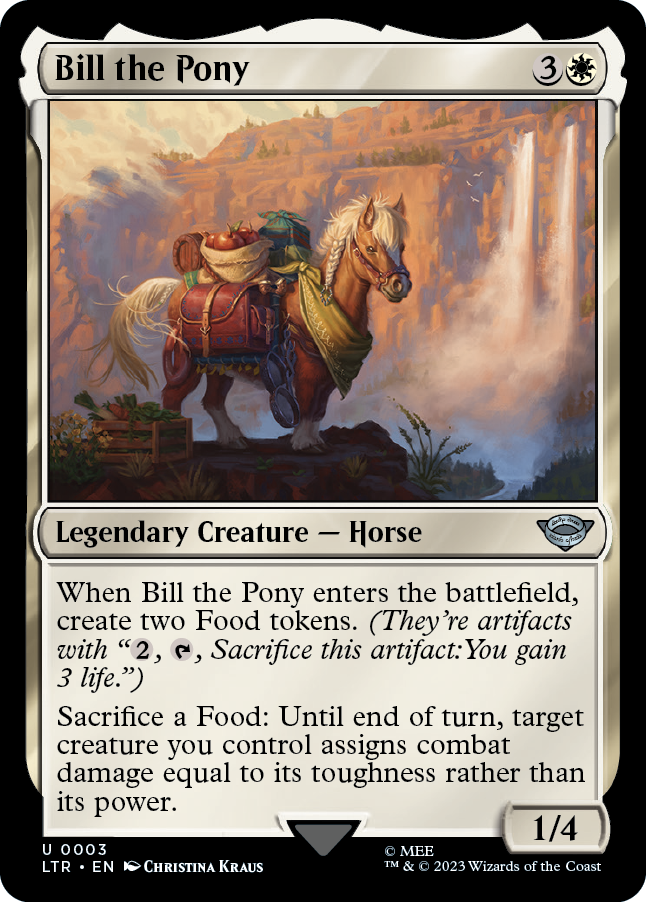
Bill the Pony
{3}{W}
Legendary Creature — Horse
1/4
When Bill the Pony enters the battlefield, create two Food tokens. (They're artifacts with "{2}, {T}, Sacrifice this artifact: You gain 3 life.")
Sacrifice a Food: Until end of turn, target creature you control assigns combat damage equal to its toughness rather than its power.
General Food Notes:
- Food is an artifact type. Even though it appears on some creatures in other sets, it's never a creature type.
- If an effect refers to a Food, it means any Food artifact, not just a Food artifact token. For example, you can sacrifice Lembas, an artifact card with the Food subtype, to activate the last ability of Bill the Pony.
- You can't sacrifice a Food token to pay multiple costs. For example, you can't sacrifice a Food token to activate its own ability and also to activate the last ability of Bill the Pony.
- Some spells and abilities that create Food tokens may require targets. If each target chosen is an illegal target as that spell or ability tries to resolve, it won't resolve. You won't create any Food tokens.
- Do not eat the delicious cards. No, not even for second breakfast.
Returning Mechanic: Historic
Middle-earth's history had a profound effect on the events of the Third Age. This set celebrates that history with cards that care about historic cards—that is, cards with the legendary supertype, the artifact card type, or the Saga enchantment type.
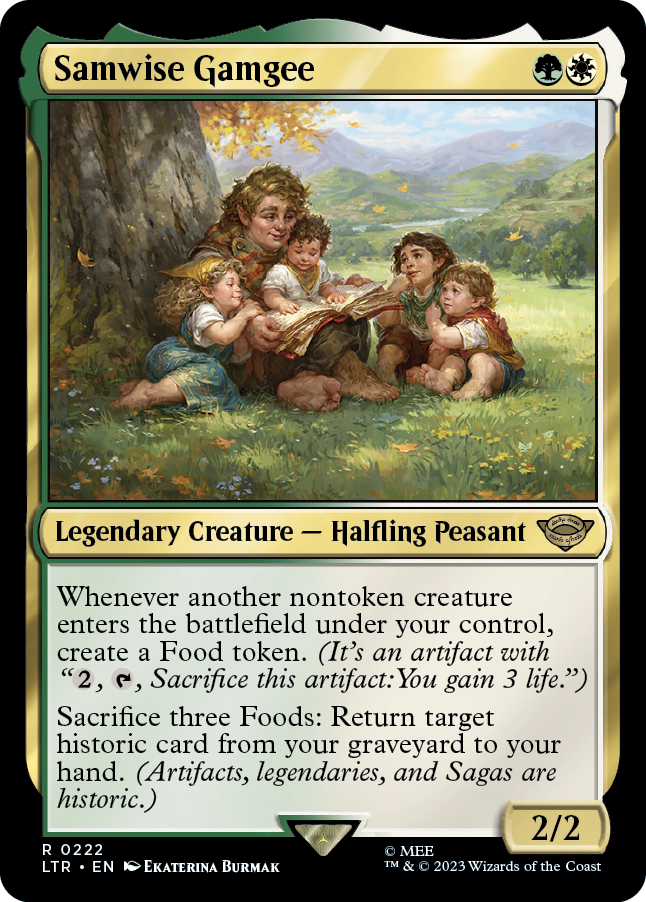
Samwise Gamgee
{G}{W}
Legendary Creature — Halfling Peasant
2/2
Whenever another nontoken creature enters the battlefield under your control, create a Food token. (It's an artifact with "{2}, {T}, Sacrifice this artifact: You gain 3 life.")
Sacrifice three Foods: Return target historic card from your graveyard to your hand. (Artifacts, legendaries, and Sagas are historic.)
General Historic Notes:
- A card, spell, or permanent is historic if it has the legendary supertype, the artifact card type, or the Saga subtype. Having two of those qualities doesn't make an object more historic than another or provide an additional bonus—an object either is historic or it isn't.
- Some abilities trigger "whenever you cast a historic spell." Such an ability resolves before the spell that caused it to trigger. It resolves even if that spell is countered.
- An ability that triggers "whenever you cast a historic spell" doesn't trigger if a historic card is put onto the battlefield without being cast.
- Lands are never cast, so abilities that trigger "whenever you cast a historic spell" won't trigger if you play a legendary land. They also won't trigger if a card on the battlefield transforms into a card with the legendary supertype, the artifact card type, or the Saga subtype.
Returning Mechanic: Typecycling
Typecycling is a variant of the cycling ability. "[Type]cycling [cost]" means "[Cost], Discard this card: Search your library for a [type] card, reveal it, put it into your hand, then shuffle." This type is usually a subtype (as in "Mountaincycling") but can be any card type, subtype, supertype, or combination thereof (as in "basic landcycling").
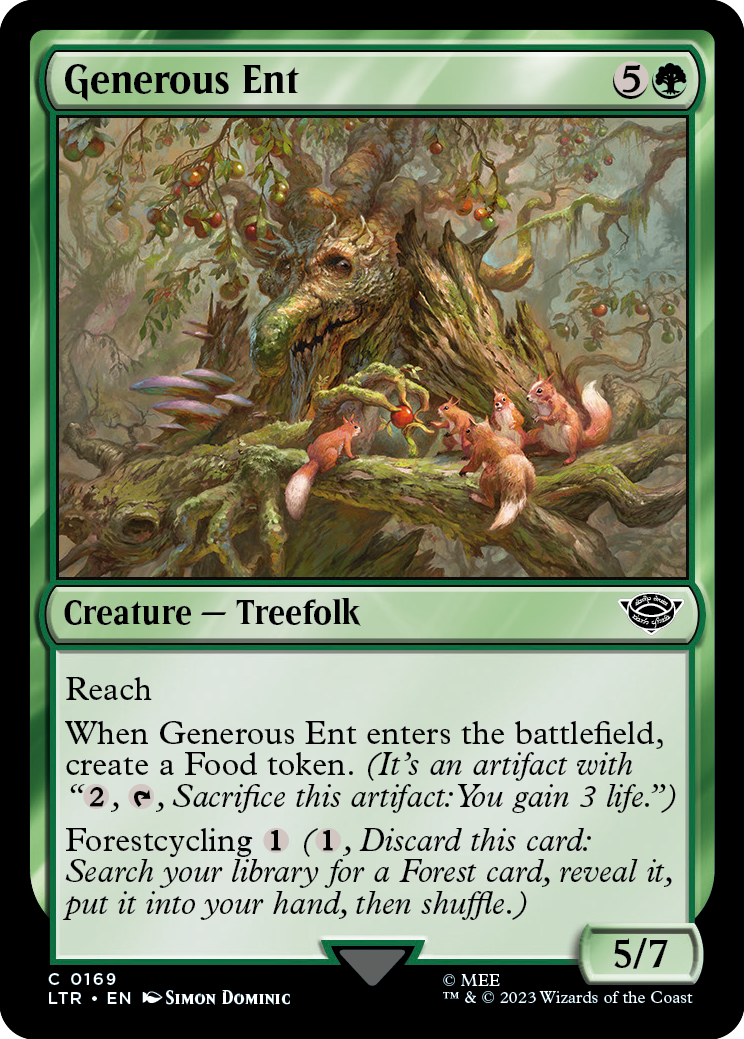
Generous Ent
{5}{G}
Creature — Treefolk
5/7
Reach
When Generous Ent enters the battlefield, create a Food token. (It's an artifact with "{2}, {T}, Sacrifice this artifact: You gain 3 life.")
Forestcycling {1} ({1}, Discard this card: Search your library for a Forest card, reveal it, put it into your hand, then shuffle.)
General Typecycling Notes:
- Unlike the normal cycling ability, typecycling doesn't allow you to draw a card. Rather, it lets you search your library for a card with the type or types indicated by the ability name. For example, a card with basic landcycling lets you search for a basic land card, and a card with Wizardcycling lets you search for a Wizard card.
- Typecycling is a form of cycling. Any ability that triggers on a card being cycled also triggers on a card being typecycled. Any ability that stops a cycling ability from being activated also stops a typecycling ability from being activated.
New Legendary Land Cycle
The Lord of the Rings: Tales of Middle-earth introduces a cycle of legendary lands that enter the battlefield tapped unless you control a legendary creature.
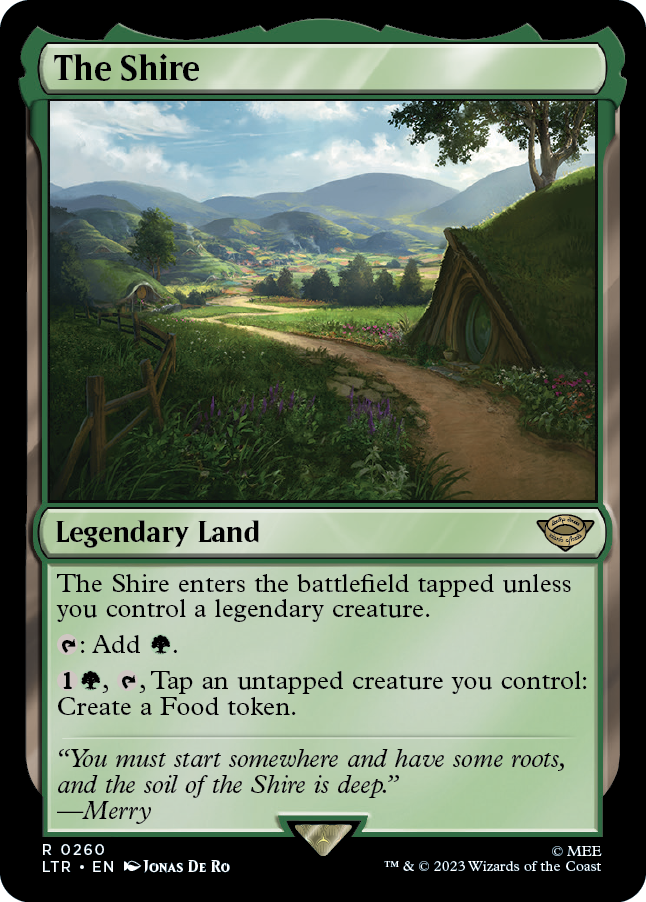
The Shire
Legendary Land
The Shire enters the battlefield tapped unless you control a legendary creature.
{T}: Add {G}.
{1}{G}, {T}, Tap an untapped creature you control: Create a Food token.
- The legendary creature must already be on the battlefield as the land enters the battlefield. If it enters the battlefield at the same time, the land will enter tapped.
New Ability Word: Secret Council
Returning Ability Word: Will of the Council
Returning Ability Word: Council's Dilemma
The Lord of the Rings: Tales of Middle-earth Commander decks feature a return of the voting mechanic as well as a new twist: secret voting.
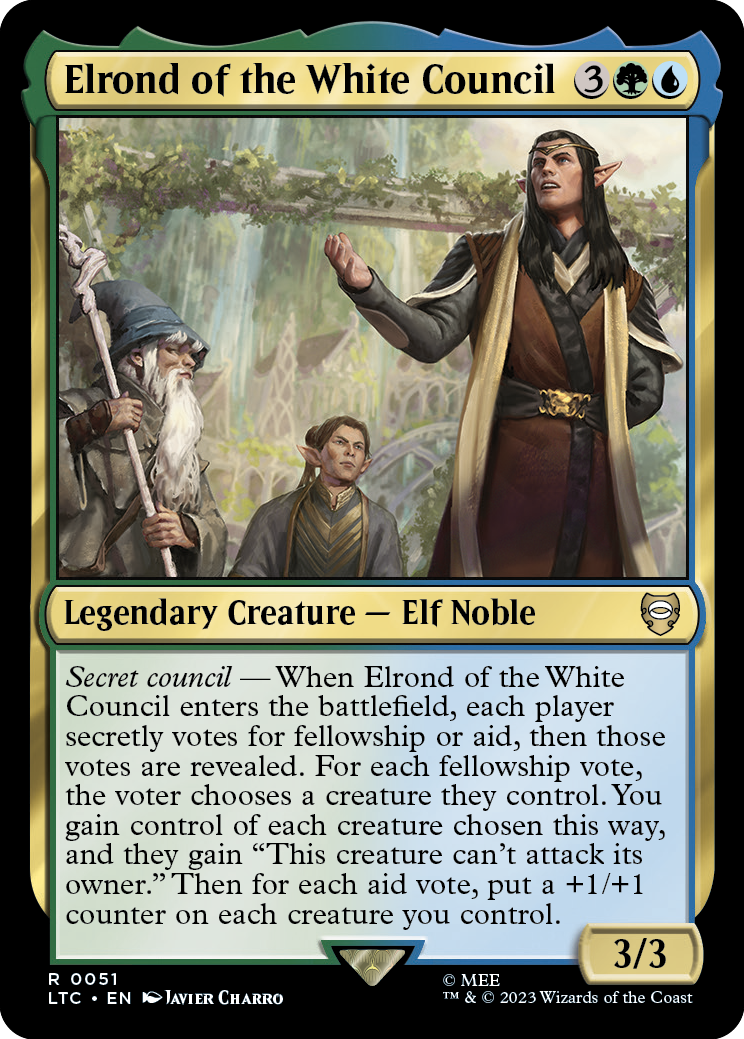
Elrond of the White Council
{3}{G}{U}
Legendary Creature — Elf Noble
3/3
Secret council — When Elrond of the White Council enters the battlefield, each player secretly votes for fellowship or aid, then those votes are revealed. For each fellowship vote, the voter chooses a creature they control. You gain control of each creature chosen this way, and they gain "This creature can't attack its owner." Then for each aid vote, put a +1/+1 counter on each creature you control.
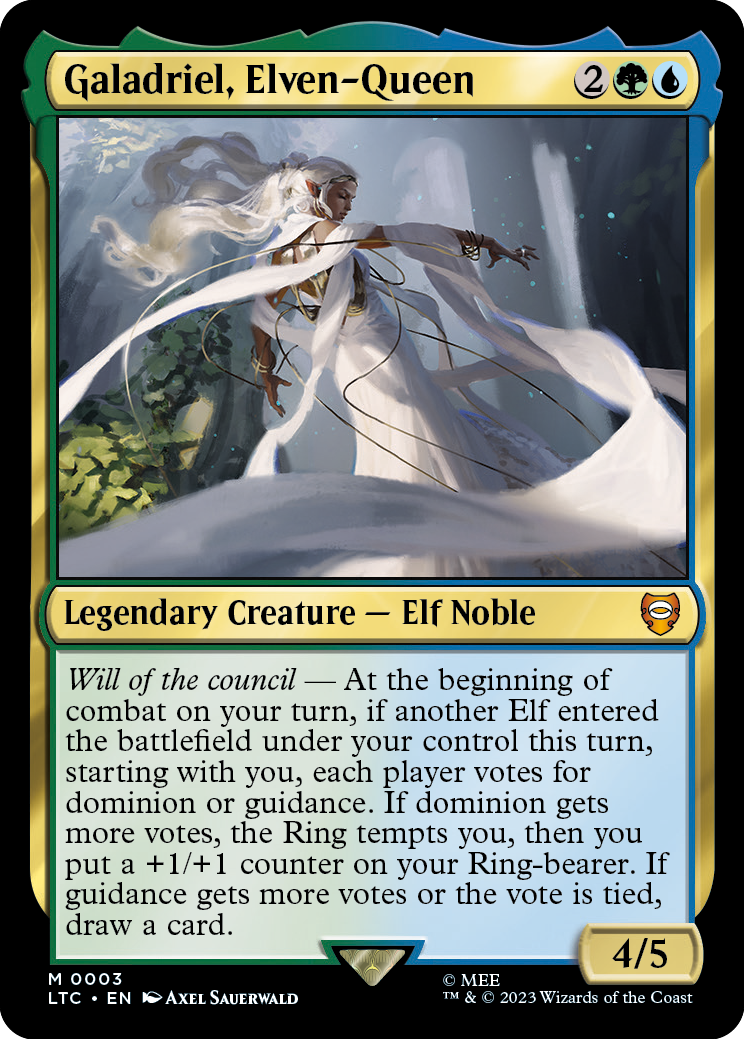
Galadriel, Elven-Queen
{2}{G}{U}
Legendary Creature — Elf Noble
4/5
Will of the council — At the beginning of combat on your turn, if another Elf entered the battlefield under your control this turn, starting with you, each player votes for dominion or guidance. If dominion gets more votes, the Ring tempts you, then you put a +1/+1 counter on your Ring-bearer. If guidance gets more votes or the vote is tied, draw a card.
None of these ability words have rules meaning, but each are used in different circumstances. Secret council is specifically for abilities that require secret voting. Will of the council and council's dilemma both use non-secret voting, with will of the council showing up on cards that care which option got more votes and council's dilemma being used for cards where the number of votes for each option is what matters.
General Voting Notes:
- To secretly vote, each player writes down their chosen option without showing it to anyone else. Each player then keeps their vote secret until all players simultaneously reveal their votes.
- Before secret votes are revealed, players may announce how they intend to vote, but they can't reveal what they actually wrote down until all votes are simultaneously revealed. Players can lie about how they intend to vote before the votes are revealed.
- Abilities that trigger "whenever players finish voting" trigger once all players have voted or once all secret votes are revealed, but they won't go on the stack until the current spell or ability finishes resolving.
- In the case of non-secret voting, votes are cast in turn order, and each player will know the votes of players who voted beforehand.
- Each player must vote for one of the available options. They can't abstain.
- No player votes until the spell or ability resolves. Any responses to that spell or ability must be made without knowing the outcome of the vote.
- The phrase "the vote is tied" refers only to when there is more than one choice that received the most votes. For example, if a 5-player vote from among three different choices ends 3 votes to 1 vote to 1 vote, the vote isn't tied.
Returning Mechanic Variant: Partner with [Name]
The Lord of the Rings: Tales of Middle-earth Commander decks include legendary creatures with the partner with [name] ability, which is a variant of the partner keyword.
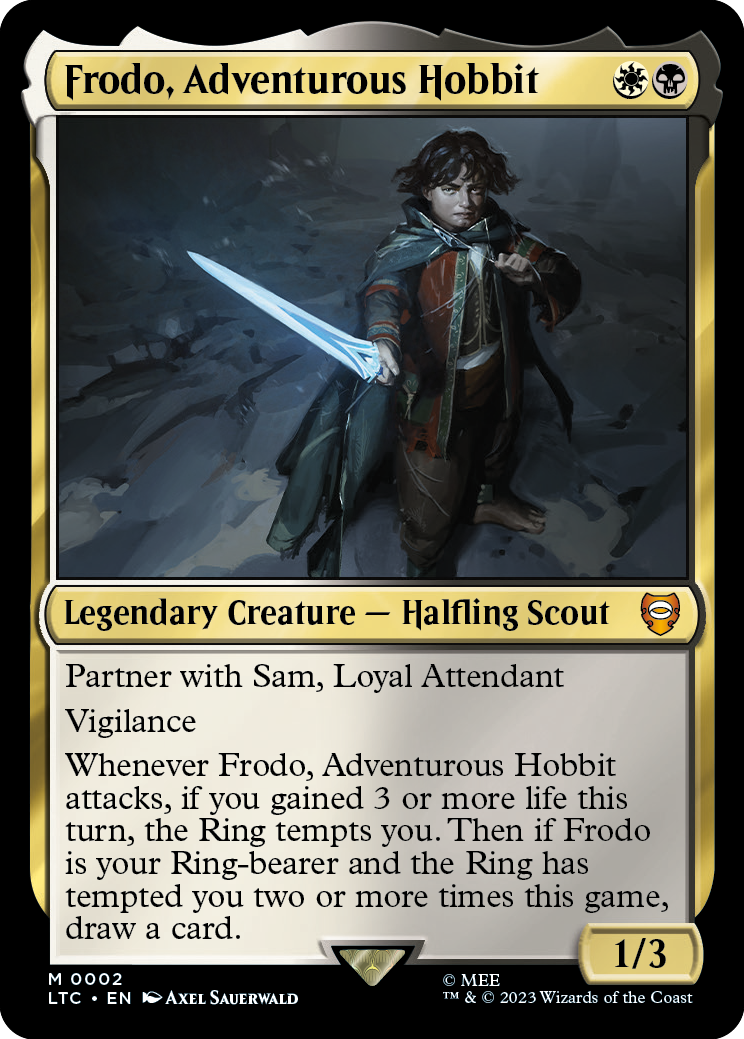
Frodo, Adventurous Hobbit
{W}{B}
Legendary Creature — Halfling Scout
1/3
Partner with Sam, Loyal Attendant
Vigilance
Whenever Frodo, Adventurous Hobbit attacks, if you gained 3 or more life this turn, the Ring tempts you. Then if Frodo is your Ring-bearer and the Ring has tempted you two or more times this game, draw a card.
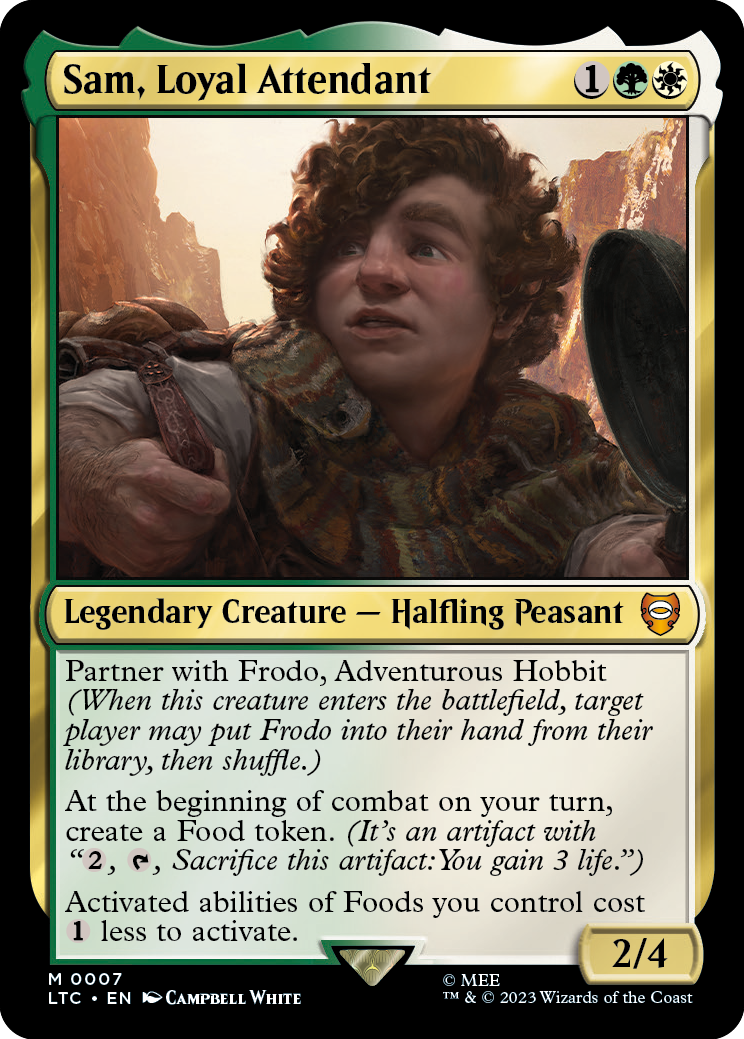
Sam, Loyal Attendant
{1}{G}{W}
Legendary Creature — Halfling Peasant
2/4
Partner with Frodo, Adventurous Hobbit (When this creature enters the battlefield, target player may put Frodo into their hand from their library, then shuffle.)
At the beginning of combat on your turn, create a Food token. (It's an artifact with "{2}, {T}, Sacrifice this artifact: You gain 3 life.")
Activated abilities of Foods you control cost {1} less to activate.
General Partner with Notes:
- "Partner with [name]" represents two abilities. The first is a triggered ability: "When this permanent enters the battlefield, target player may search their library for a card named [name], reveal it, put it into their hand, then shuffle their library."
- Note that the target player searches their library (which may be affected by effects such as that of Stranglehold) and that the card they find is revealed, even though these words aren't included in the ability's reminder text.
- The second ability represented by the "partner with [name]" keyword modifies the rules for deck construction in the Commander variant and has no function outside of that variant. If a legendary creature card with "partner with [name]" is designated as your commander, the named legendary creature card can also be designated as your commander. For more information on the Commander variant, please visit Wizards.com/Commander.
- If your Commander deck has two commanders, you can only include cards whose own color identities are also found in your commanders' combined color identities. If Frodo, Adventurous Hobbit and Sam, Loyal Attendant are your commanders, your deck may contain cards with white, black, and/or green in their color identity, but not blue or red.
- Both commanders start in the command zone, and the remaining 98 cards of your deck are shuffled to become your library.
- To have two commanders, both must have the partner ability or corresponding "partner with" abilities as the game begins. A creature with a "partner with" ability can't partner with any creature other than its designated partner. Losing a partner ability during the game doesn't cause either to cease to be your commander.
- Once the game begins, your two commanders are tracked separately. If you cast one, you won't have to pay an additional {2} the first time you cast the other. A player loses the game after having been dealt 21 damage from one of them, not from both of them combined. Command Beacon's effect puts one into your hand from the command zone, not both.
- An effect that checks whether you control your commander is satisfied if you control one or both of your two commanders.
- The triggered ability of the "partner with" keyword still triggers in a Commander game. If your other commander has somehow ended up in your library, you can find it. You can also target another player, whether or not they have that card in their library.
Returning Mechanic: The Monarch
The Lord of the Rings: Tales of Middle-earth Commander decks also herald the return of everyone's favorite designation: the monarch! As long as you're the monarch, you'll get to draw an extra card on your turns, but don't be surprised if other players begin plotting to usurp the throne.
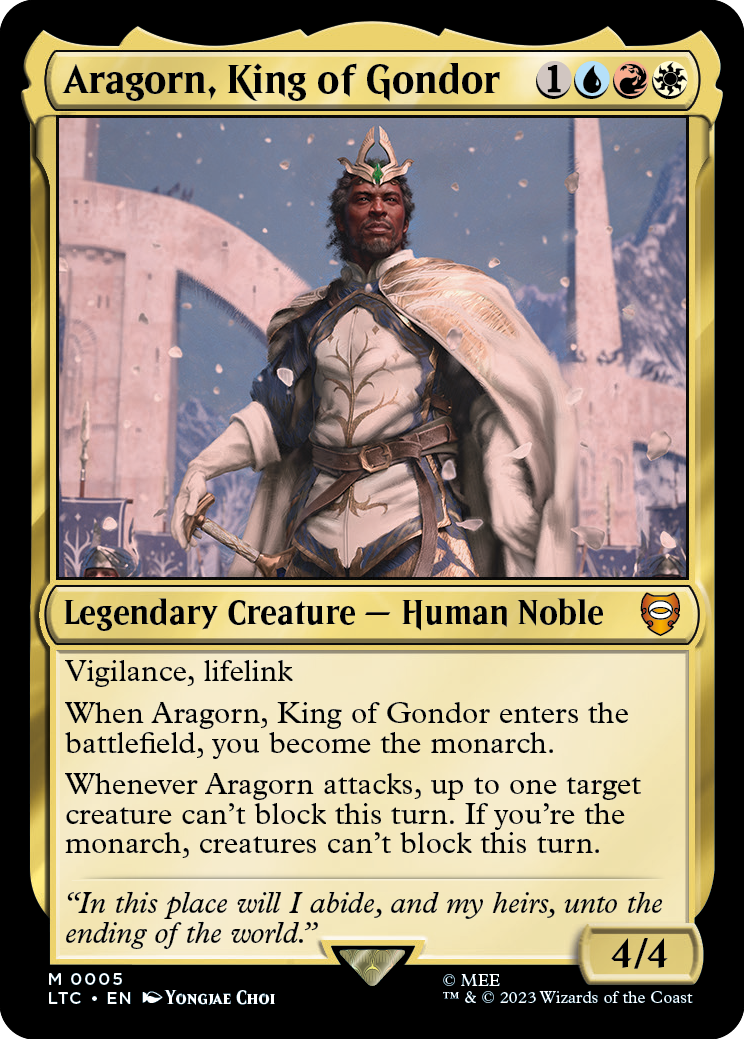
Aragorn, King of Gondor
{1}{U}{R}{W}
Legendary Creature — Human Noble
4/4
Vigilance, lifelink
When Aragorn, King of Gondor enters the battlefield, you become the monarch.
Whenever Aragorn attacks, up to one target creature can't block this turn. If you're the monarch, creatures can't block this turn.
General Monarch Notes:
- The game starts with no monarch. Once an effect makes one player the monarch, the game will have exactly one monarch from that point forward. As a player becomes the monarch, the current monarch (if any) ceases being the monarch.
- There are two inherent triggered abilities associated with being the monarch. These triggered abilities have no source and are controlled by the player who was the monarch at the time the abilities triggered. The full texts of these abilities are "At the beginning of the monarch's end step, that player draws a card" and "Whenever a creature deals combat damage to the monarch, its controller becomes the monarch."
- If the triggered ability that causes the monarch to draw a card goes on the stack and a different player becomes the monarch before that ability resolves, the first player will still draw the card.
- If the monarch leaves the game during another player's turn, that player becomes the monarch. If the monarch leaves the game during their turn, the next player in turn order becomes the monarch.
- If combat damage dealt to the monarch causes that player to lose the game, the triggered ability that causes the controller of the attacking creature to become the monarch doesn't resolve. In most cases, the controller of the attacking creature will still become the monarch as it is likely their turn.
THE LORD OF THE RINGS: TALES OF MIDDLE-EARTH MAIN SET CARD-SPECIFIC NOTES
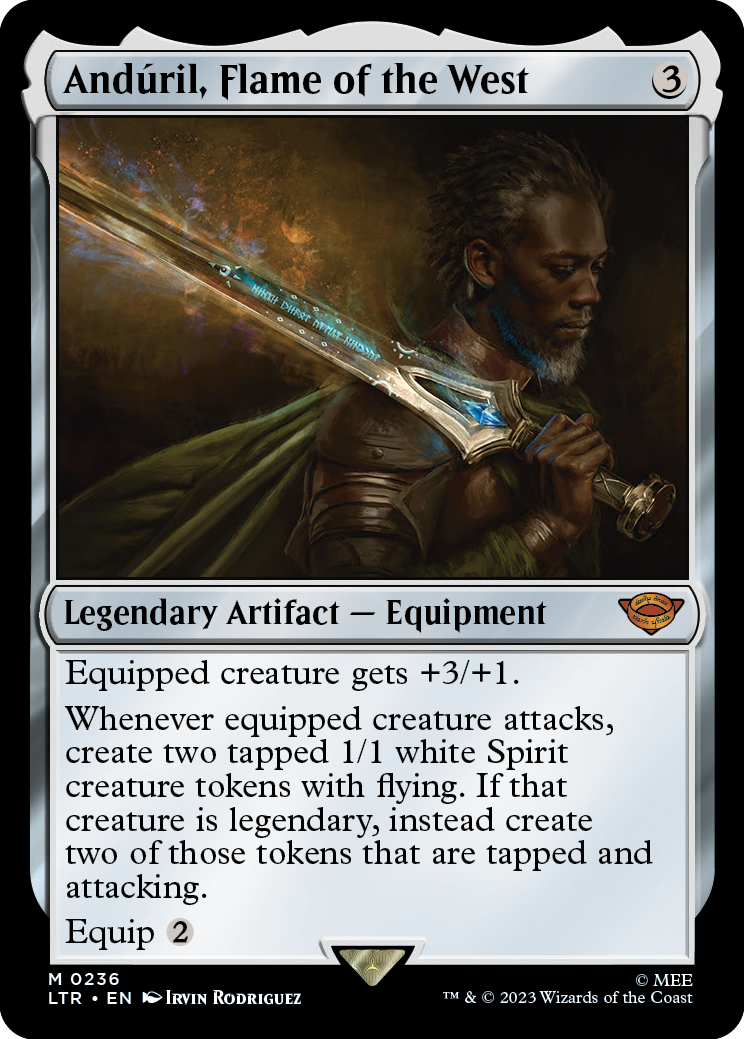
Andúril, Flame of the West
{3}
Legendary Artifact — Equipment
Equipped creature gets +3/+1.
Whenever equipped creature attacks, create two tapped 1/1 white Spirit creature tokens with flying. If that creature is legendary, instead create two of those tokens that are tapped and attacking.
Equip {2}
- If the equipped creature is legendary, Andúril's controller chooses which player, planeswalker, or battle the Spirit tokens are attacking. Each Spirit token can enter attacking a different player, planeswalker, or battle, and they don't need to be the same player, planeswalker, or battle that the equipped creature is attacking.
- If Andúril is equipped to a creature an opponent controls, Andúril's controller will create two tapped Spirit tokens each time that creature attacks. Even if that creature is legendary, the Spirits would not enter the battlefield attacking.
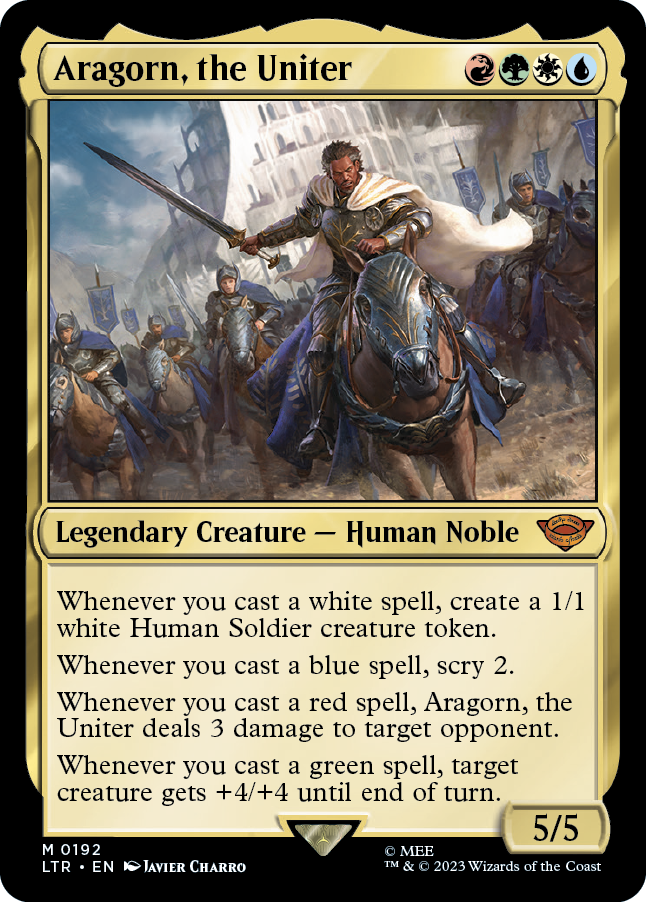
Aragorn, the Uniter
{R}{G}{W}{U}
Legendary Creature — Human Noble
5/5
Whenever you cast a white spell, create a 1/1 white Human Soldier creature token.
Whenever you cast a blue spell, scry 2.
Whenever you cast a red spell, Aragorn, the Uniter deals 3 damage to target opponent.
Whenever you cast a green spell, target creature gets +4/+4 until end of turn.
- If you cast a spell that's multiple colors, more than one of Aragorn, the Uniter's abilities may trigger. In that case, you choose the order in which the abilities are put onto the stack.
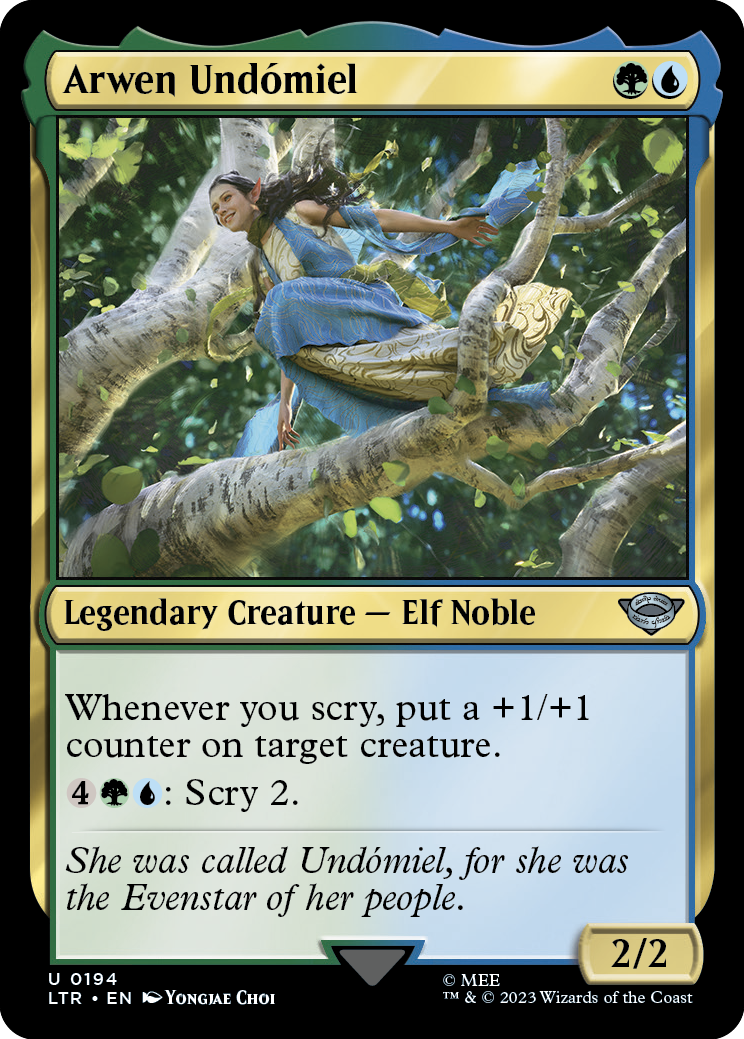
Arwen Undómiel
{G}{U}
Legendary Creature — Elf Noble
2/2
Whenever you scry, put a +1/+1 counter on target creature.
{4}{G}{U}: Scry 2.
- You finish scrying before choosing a target for Arwen's first ability.
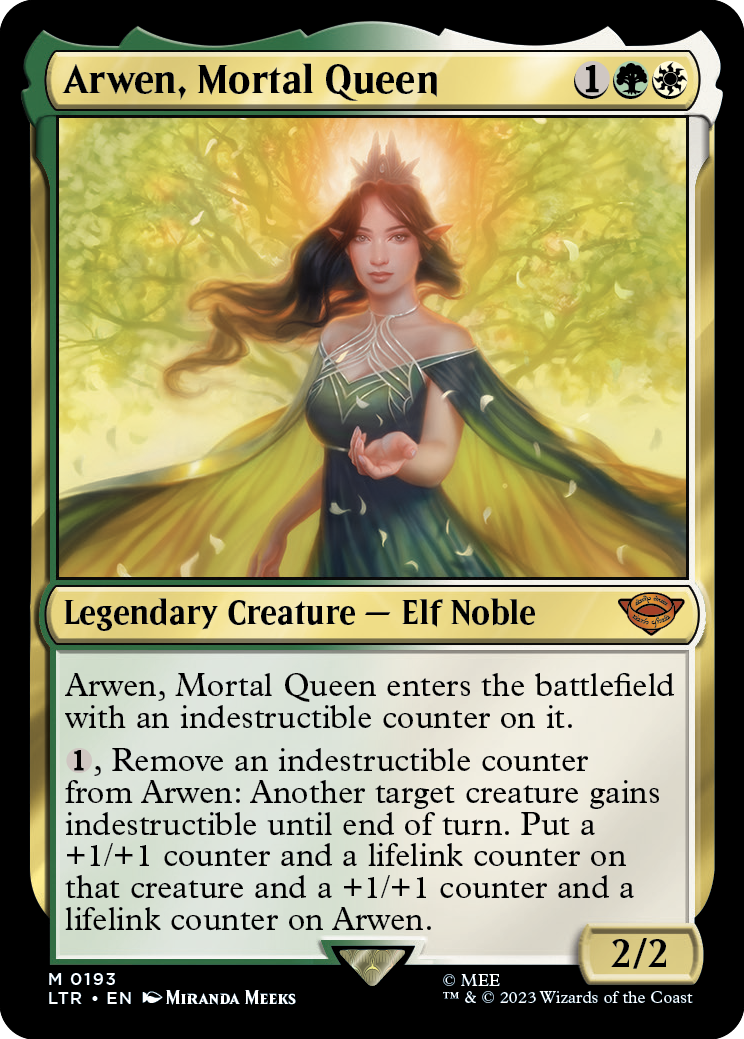
Arwen, Mortal Queen
{1}{G}{W}
Legendary Creature — Elf Noble
2/2
Arwen, Mortal Queen enters the battlefield with an indestructible counter on it.
{1}, Remove an indestructible counter from Arwen: Another target creature gains indestructible until end of turn. Put a +1/+1 counter and a lifelink counter on that creature and a +1/+1 counter and a lifelink counter on Arwen.
- You remove the indestructible counter from Arwen as a cost to activate its second ability. If Arwen already received 2 damage earlier in the turn, it will be destroyed due to having lethal damage before you get to put a +1/+1 counter on it.
- If the target of Arwen's second ability is illegal as it tries to resolve, the ability does nothing. You won't get to put any counters on Arwen.
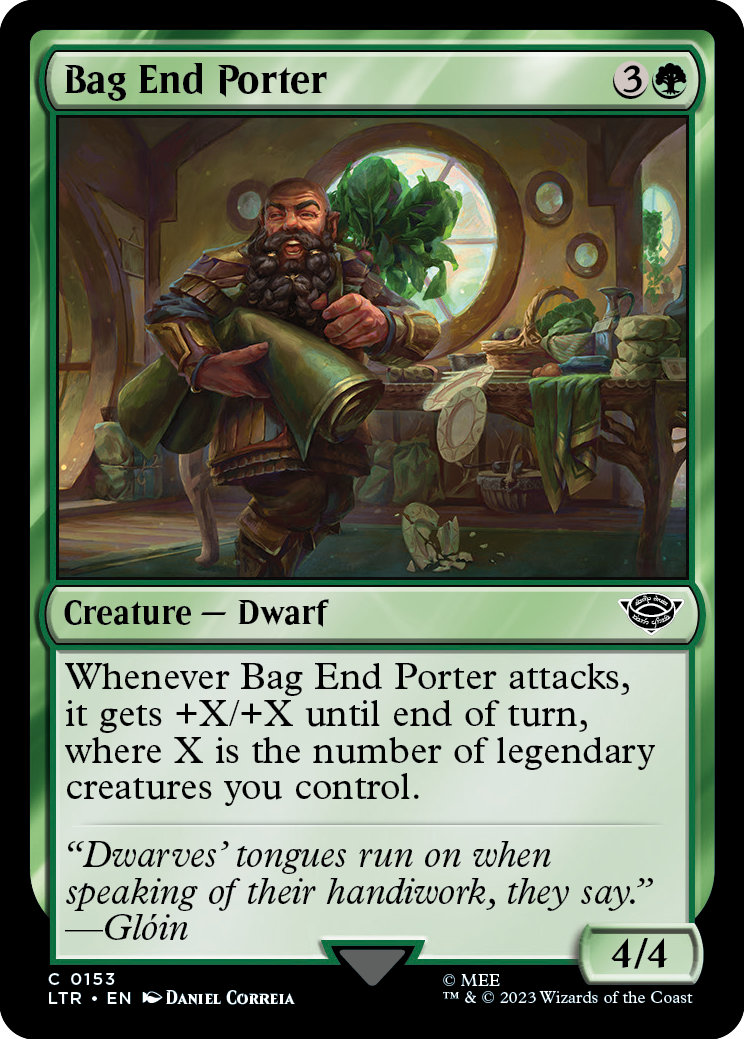
Bag End Porter
{3}{G}
Creature — Dwarf
4/4
Whenever Bag End Porter attacks, it gets +X/+X until end of turn, where X is the number of legendary creatures you control.
- The value of X is determined only as Bag End Porter's triggered ability resolves. It won't change later in the turn if the number of legendary creatures you control changes.
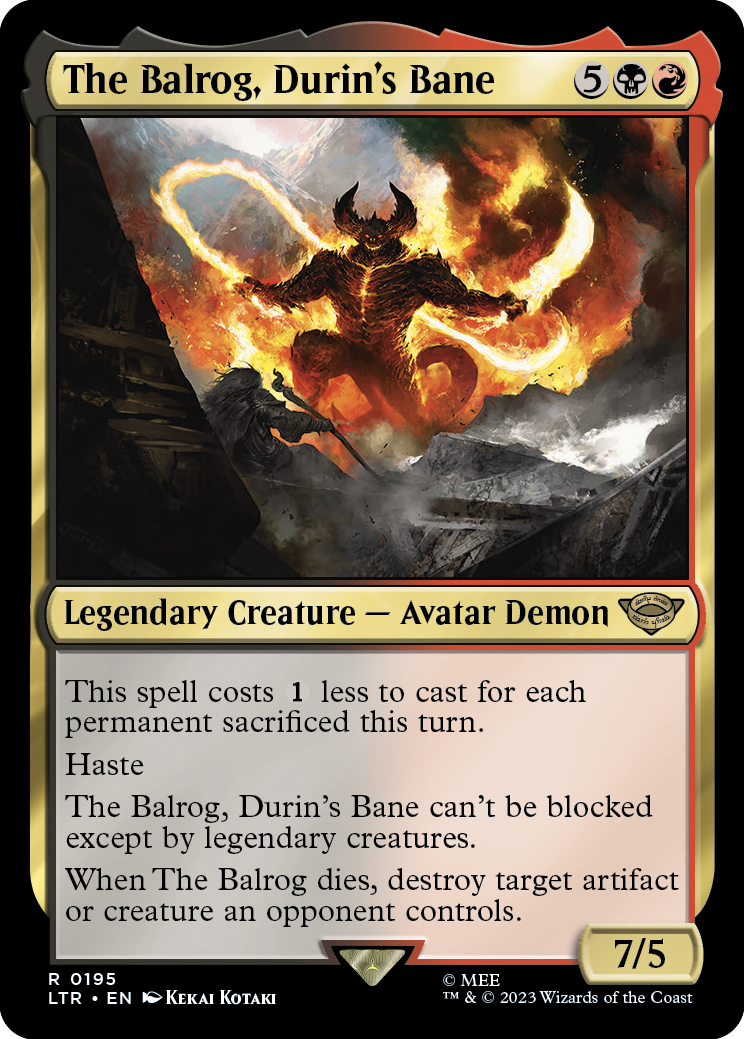
The Balrog, Durin's Bane
{5}{B}{R}
Legendary Creature — Avatar Demon
7/5
This spell costs {1} less to cast for each permanent sacrificed this turn.
Haste
The Balrog, Durin's Bane can't be blocked except by legendary creatures.
When The Balrog dies, destroy target artifact or creature an opponent controls.
- The Balrog, Durin's Bane's first ability can't reduce its cost to less than {B}{R}.
- The Balrog, Durin's Bane's first ability counts every permanent that was sacrificed this turn, by any player.
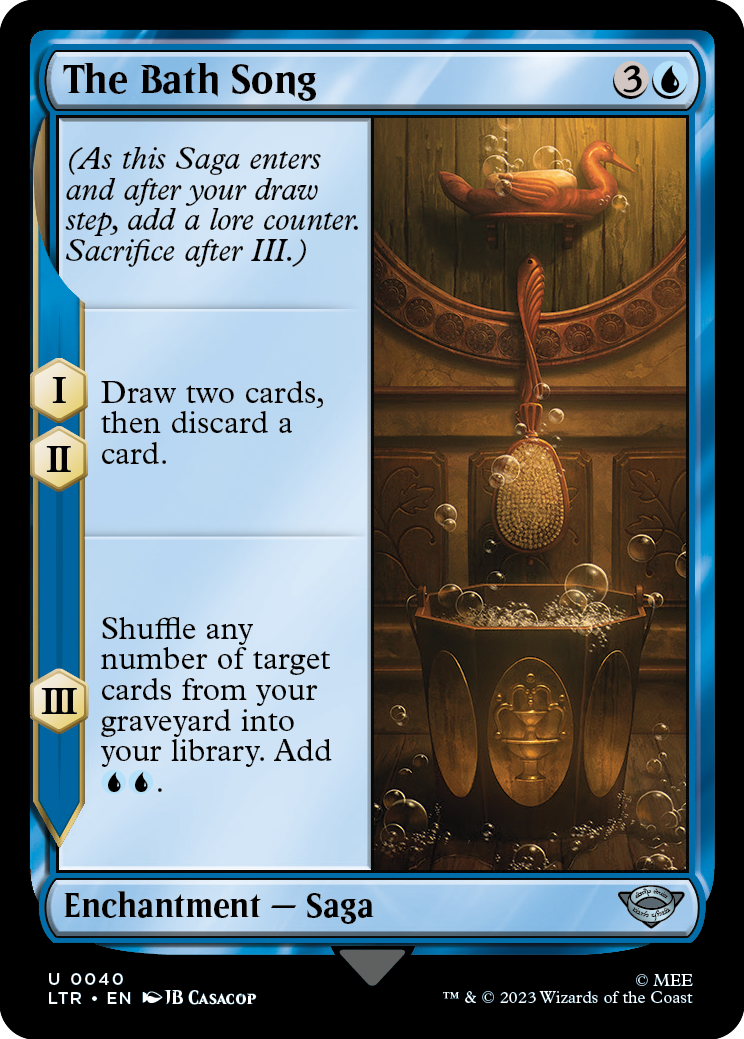
The Bath Song
{3}{U}
Enchantment — Saga
(As this Saga enters and after your draw step, add a lore counter. Sacrifice after III.)
I, II — Draw two cards, then discard a card.
III — Shuffle any number of target cards from your graveyard into your library. Add {U}{U}.
- The Bath Song's final chapter ability is not a mana ability. It uses the stack and can be responded to.
- You can choose no targets for The Bath Song's final chapter ability just to add {U}{U}. However, if you do choose targets, and all of those targets are illegal at the time the ability tries to resolve, the ability won't resolve and none of its effects will happen. You won't add {U}{U}.
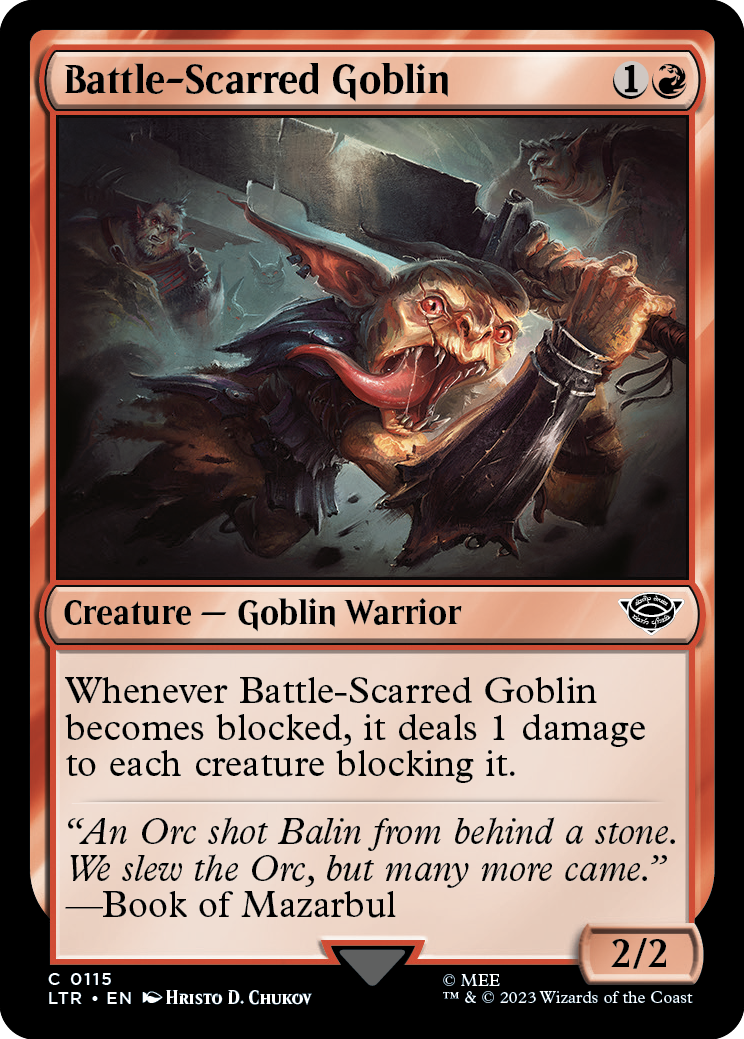
Battle-Scarred Goblin
{1}{R}
Creature — Goblin Warrior
2/2
Whenever Battle-Scarred Goblin becomes blocked, it deals 1 damage to each creature blocking it.
- The ability triggers only once, no matter how many creatures are blocking it. The ability resolves and deals damage to those creatures before combat damage is dealt. Even if that damage destroys all creatures blocking Battle-Scarred Goblin, Battle-Scarred Goblin doesn't become unblocked.
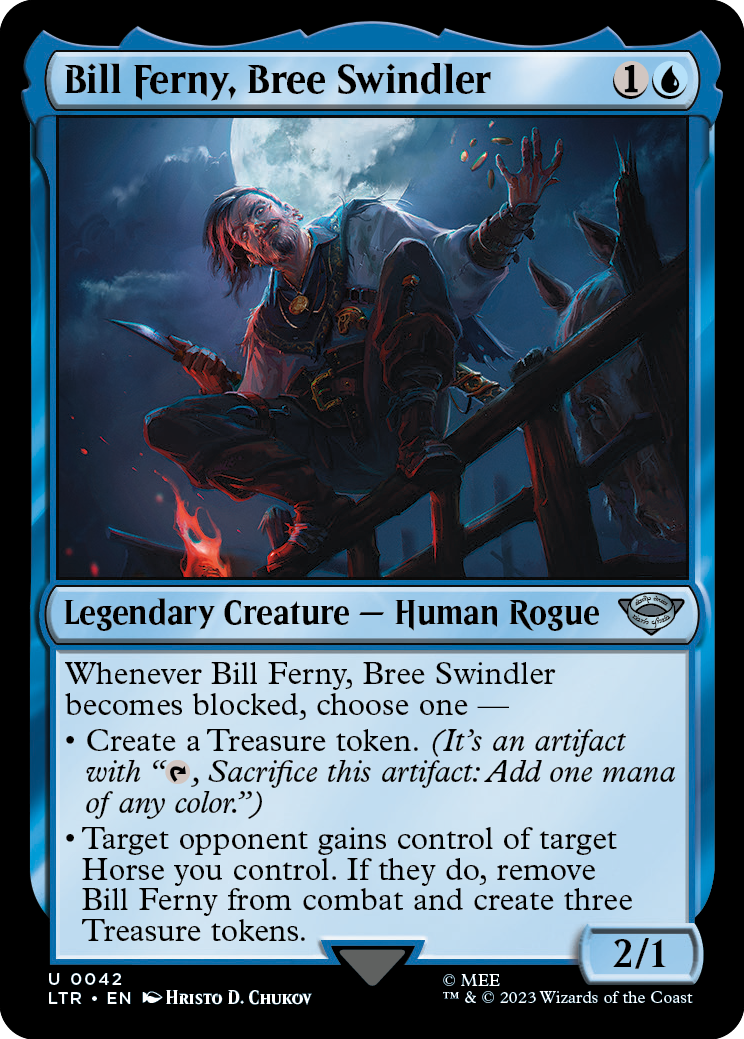
Bill Ferny, Bree Swindler
{1}{U}
Legendary Creature — Human Rogue
2/1
Whenever Bill Ferny, Bree Swindler becomes blocked, choose one —
• Create a Treasure token. (It's an artifact with "{T}, Sacrifice this artifact: Add one mana of any color.")
• Target opponent gains control of target Horse you control. If they do, remove Bill Ferny from combat and create three Treasure tokens.
- The ability triggers only once, no matter how many creatures are blocking it.
- If Bill Ferny, Bree Swindler is removed from combat, it remains tapped if it was tapped.

Bill the Pony
{3}{W}
Legendary Creature — Horse
1/4
When Bill the Pony enters the battlefield, create two Food tokens. (They're artifacts with "{2}, {T}, Sacrifice this artifact: You gain 3 life.")
Sacrifice a Food: Until end of turn, target creature you control assigns combat damage equal to its toughness rather than its power.
- Bill the Pony's last ability doesn't actually change any creature's power. It changes only the amount of combat damage it assigns. All other rules and effects that check power or toughness use the real values. For example, since having two creatures fight doesn't result in combat damage, an effect that causes the affected creature to fight another creature will still use its power to determine how much damage is dealt.
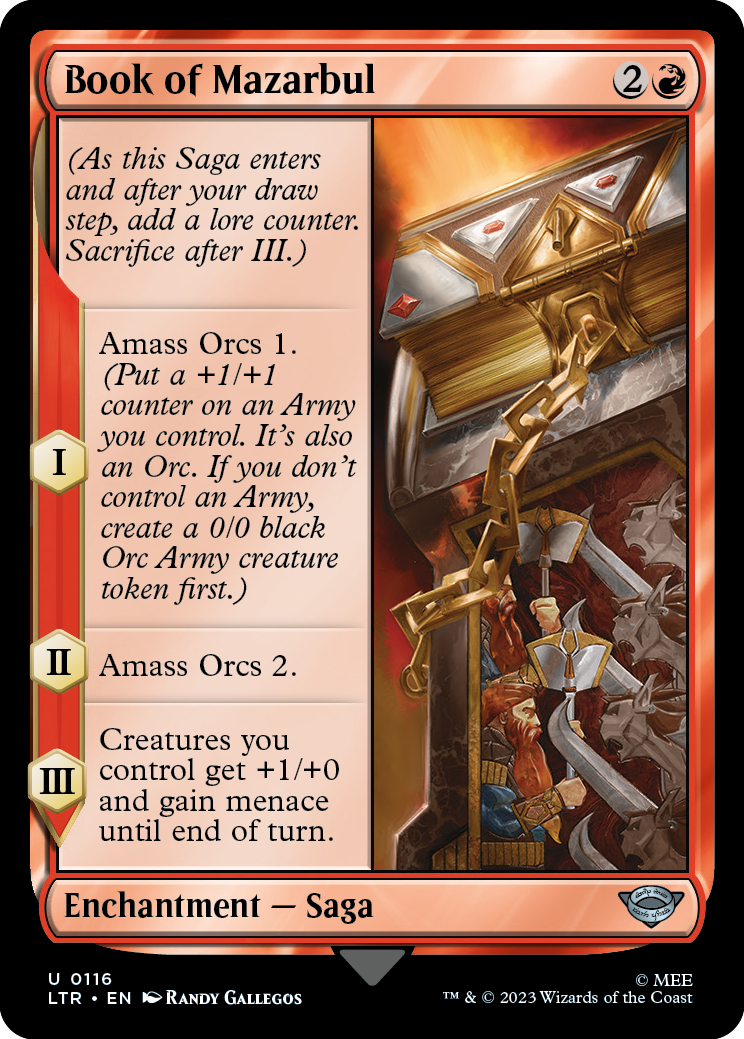
Book of Mazarbul
{2}{R}
Enchantment — Saga
(As this Saga enters and after your draw step, add a lore counter. Sacrifice after III.)
I — Amass Orcs 1. (Put a +1/+1 counter on an Army you control. It's also an Orc. If you don't control an Army, create a 0/0 black Orc Army creature token first.)
II — Amass Orcs 2.
III — Creatures you control get +1/+0 and gain menace until end of turn.
- The last chapter ability affects only creatures you control at the time it resolves. Any creatures that come under your control later in the turn won't be affected.
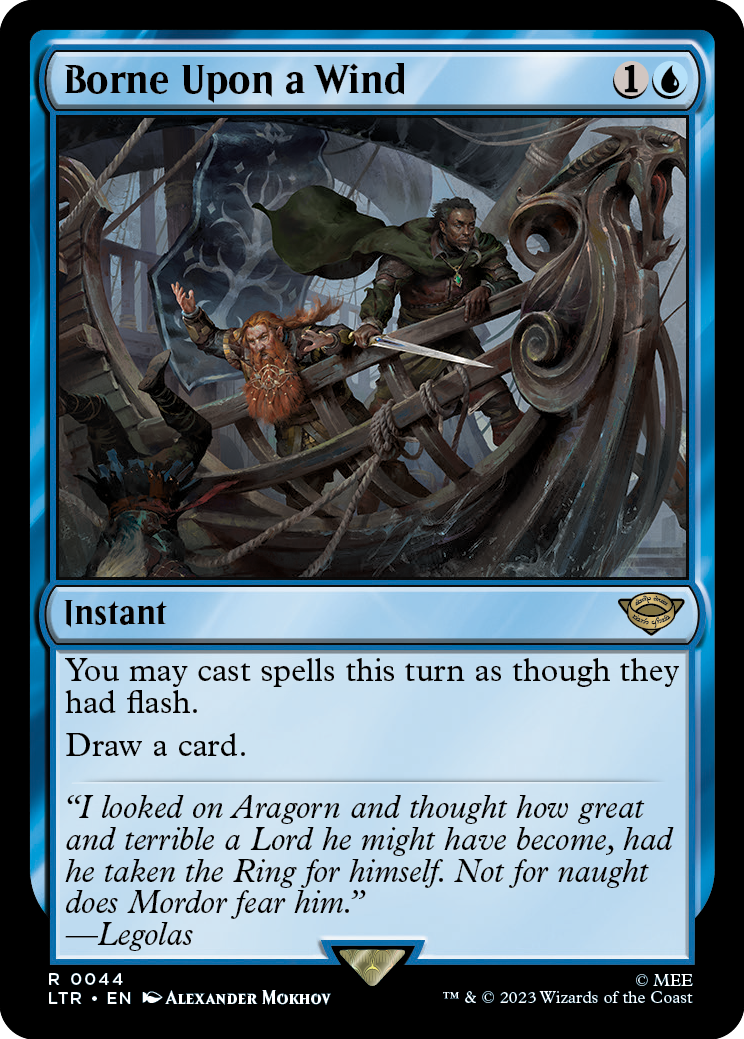
Borne Upon a Wind
{1}{U}
Instant
You may cast spells this turn as though they had flash.
Draw a card.
- This applies only to casting spells. It does not, for example, change when you can activate abilities that can be activated "only as a sorcery."
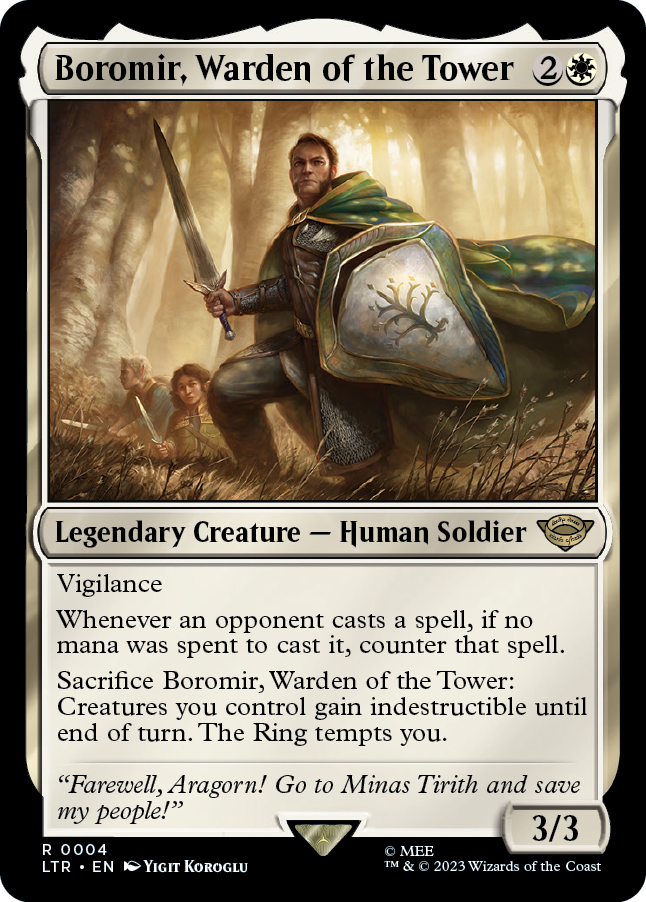
Boromir, Warden of the Tower
{2}{W}
Legendary Creature — Human Soldier
3/3
Vigilance
Whenever an opponent casts a spell, if no mana was spent to cast it, counter that spell.
Sacrifice Boromir, Warden of the Tower: Creatures you control gain indestructible until end of turn. The Ring tempts you.
- Players may cast spells that they know Boromir, Warden of the Tower will counter. Any abilities that trigger when spells are cast will still trigger and resolve if appropriate, and any effects that count how many spells are cast will still count those spells if appropriate.
- If a spell is cast with an alternative cost that includes mana (such as flashback), Boromir's second ability won't trigger and won't counter that spell. Similarly, if a spell is cast without paying its mana cost, but the player did pay mana for additional costs such as from kicker or from Thorn of Amethyst, Boromir's second ability won't trigger and won't counter that spell.
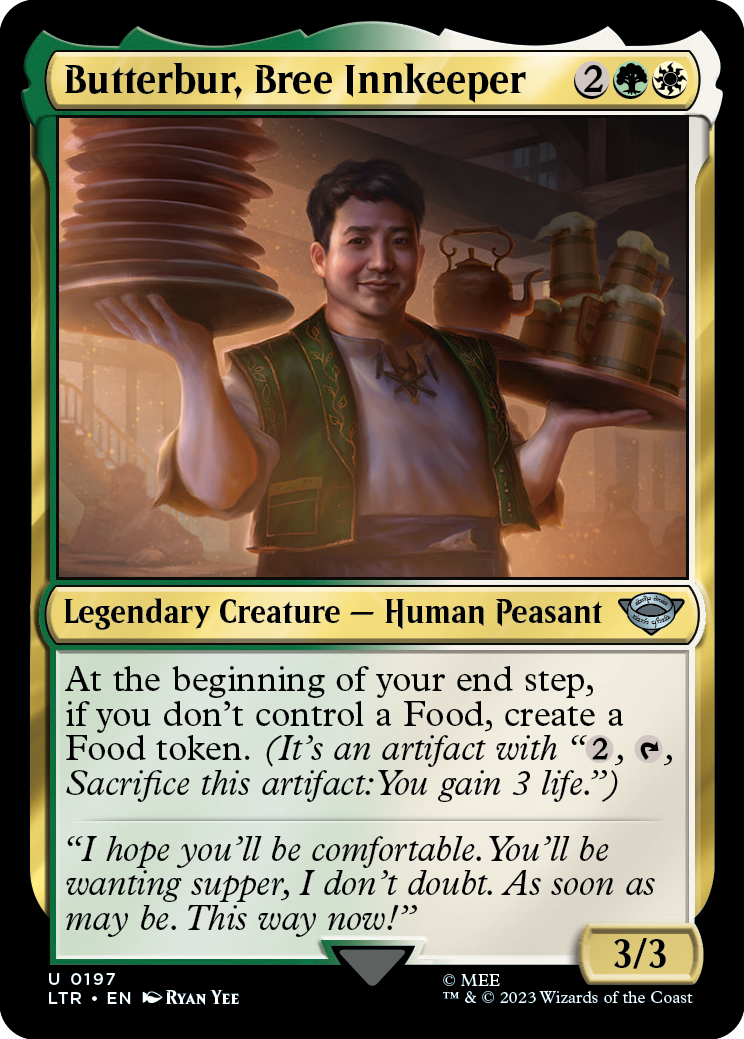
Butterbur, Bree Innkeeper
{2}{G}{W}
Legendary Creature — Human Peasant
3/3
At the beginning of your end step, if you don't control a Food, create a Food token. (It's an artifact with "{2}, {T}, Sacrifice this artifact: You gain 3 life.")
- Butterbur, Bree Innkeeper's ability checks if you control a Food at the beginning of your end step. If you do, the ability won't trigger.
- If the ability does trigger, but you control a Food when it tries to resolve, the ability will do nothing. No Food will be created.
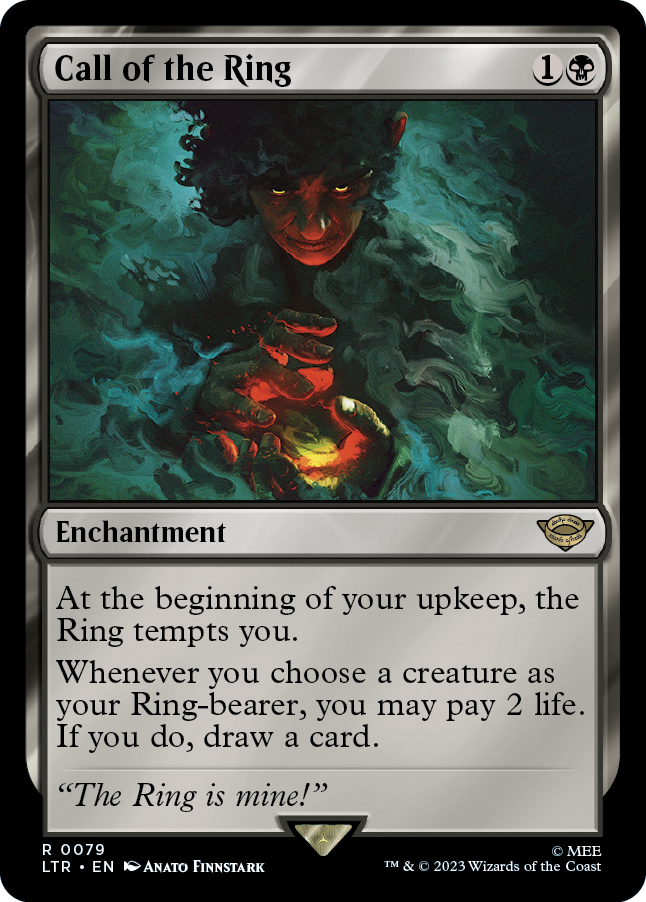
Call of the Ring
{1}{B}
Enchantment
At the beginning of your upkeep, the Ring tempts you.
Whenever you choose a creature as your Ring-bearer, you may pay 2 life. If you do, draw a card.
- Call of the Ring's last ability will trigger any time you choose a creature as your Ring-bearer, even if that creature was already your Ring-bearer.
- If the Ring tempts you but you can't choose a creature as your Ring-bearer (probably because you control no creatures), Call of the Ring's last ability won't trigger.
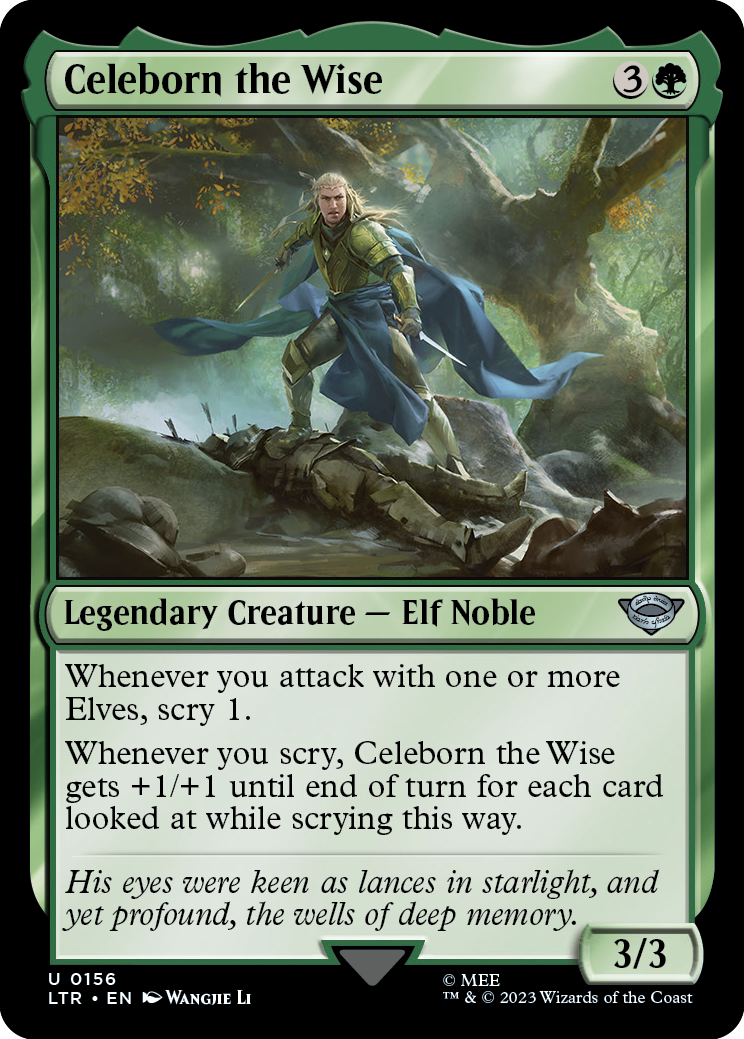
Celeborn the Wise
{3}{G}
Legendary Creature — Elf Noble
3/3
Whenever you attack with one or more Elves, scry 1.
Whenever you scry, Celeborn the Wise gets +1/+1 until end of turn for each card looked at while scrying this way.
- Celeborn the Wise's first ability has you scry 1 just once whenever you attack with one or more Elves, no matter how many Elves you attack with and no matter how many players you attack.
- Celeborn the Wise's last ability cares about the number of cards you actually looked at. For example, if you were supposed to scry 3 but only had two cards in your library, Celeborn would get +2/+2.
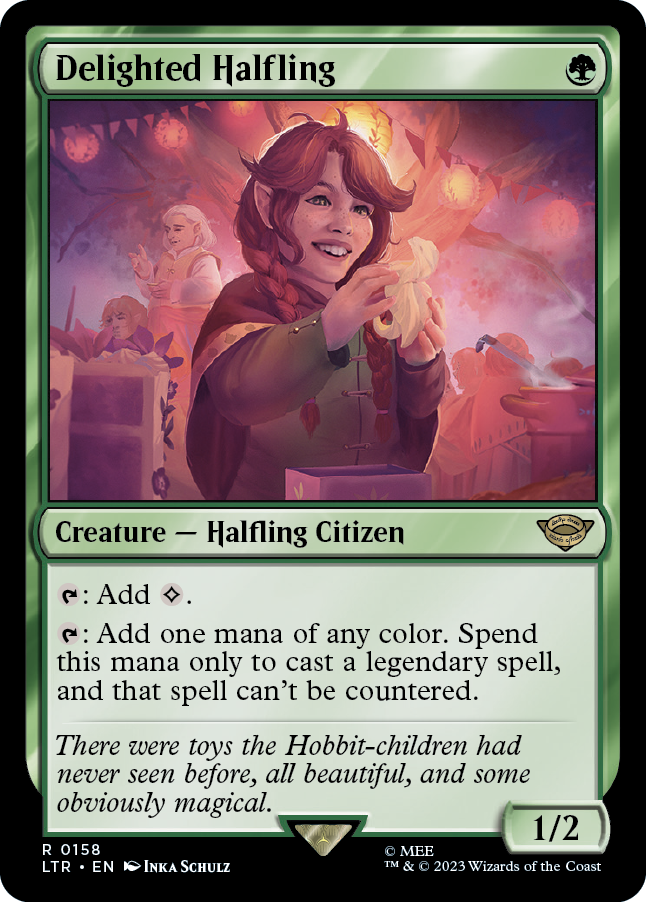
Delighted Halfling
{G}
Creature — Halfling Citizen
1/2
{T}: Add {C}.
{T}: Add one mana of any color. Spend this mana only to cast a legendary spell, and that spell can't be countered.
- The legendary spell can't be countered if the mana produced by Delighted Halfling is spent to pay any portion of the spell's cost, even an additional cost or an alternative cost. This is true even if you pay an additional cost while casting a spell "without paying its mana cost."
- If the legendary spell you cast this way is copied, the copy can be countered.
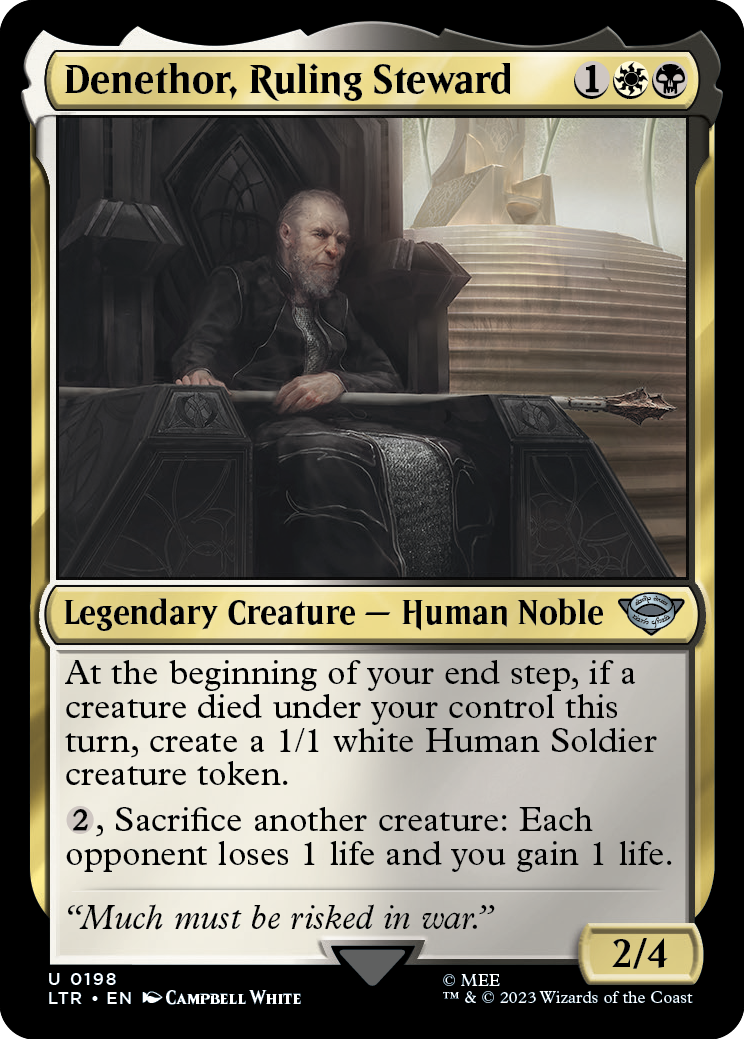
Denethor, Ruling Steward
{1}{W}{B}
Legendary Creature — Human Noble
2/4
At the beginning of your end step, if a creature died under your control this turn, create a 1/1 white Human Soldier creature token.
{2}, Sacrifice another creature: Each opponent loses 1 life and you gain 1 life.
- Denethor, Ruling Steward doesn't need to have been on the battlefield when the creature died. For example, if a creature dies during combat on your turn and you cast Denethor, Ruling Steward during your second main phase, its first ability will trigger at the beginning of your end step.
- Denethor, Ruling Steward's first ability will trigger only once during your end step, no matter how many creatures died under your control this turn. However, if no creatures have died under your control this turn as your end step begins, the ability won't trigger at all. It's not possible to cause a creature to die under your control during the end step in time to have the ability trigger.
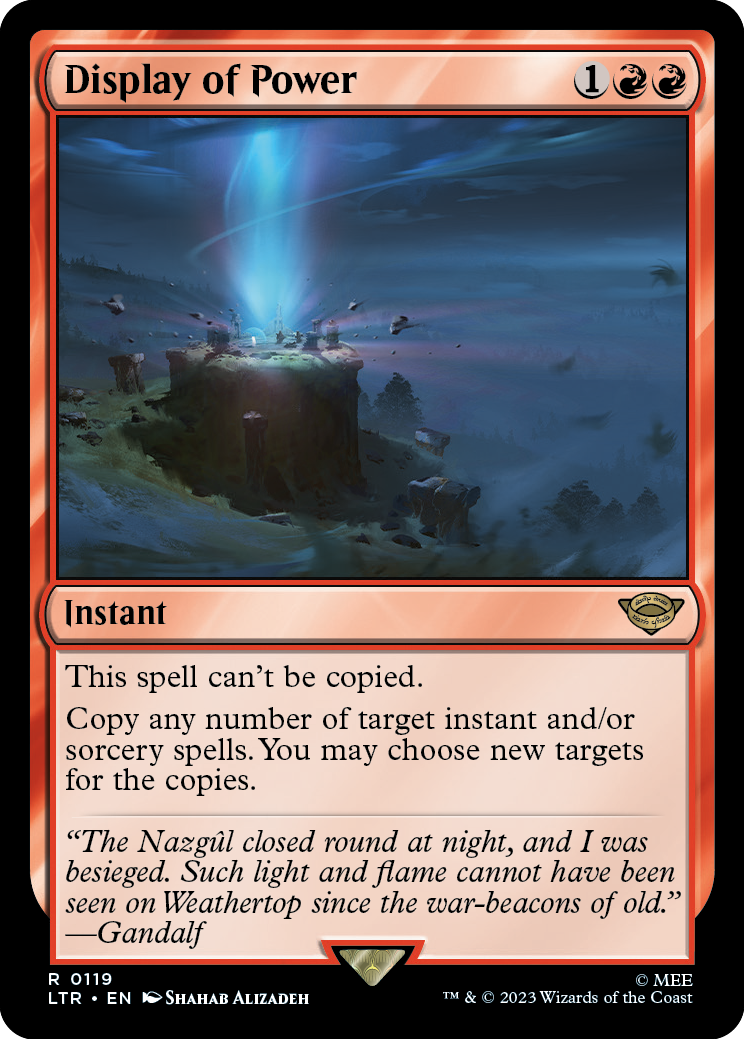
Display of Power
{1}{R}{R}
Instant
This spell can't be copied.
Copy any number of target instant and/or sorcery spells. You may choose new targets for the copies.
- Display of Power's first ability only functions on the stack. It can still be copied from your graveyard, your hand, or any other zone.
- If you copy multiple spells with Display of Power, you can put the copies on the stack in any order.
- If you cast Display of Power, you can, at most, make one copy of each instant and sorcery spell on the stack. It's not possible for one Display of Power to copy the same spell multiple times.
- The copies will have the same targets as the spells they're copying unless you choose new ones. You may change any number of the targets, including all of them or none of them. The new targets must be legal. If, for any target, you can't choose a new legal target, then it remains unchanged (even if the current target is illegal).
- The copies are created on the stack, so it's not "cast." Creating the copies won't cause abilities that trigger when a player casts a spell to trigger.
- If a spell that's copied is modal (that is, it says "Choose one —" or the like), the copy will have the same mode or modes. You can't choose different ones.
- If a spell that's copied has an X whose value was determined as it was cast, the copy has the same value of X.
- You can't choose to pay any additional costs for a copied spell. However, effects based on any additional costs that were paid for the original spell are copied as though those same costs were paid for the copy too.
- If a spell has damage divided as it was put onto the stack, the division can't be changed, although the targets receiving that damage still can. The same is true of spells that distribute counters to targets.
- Any choices made as a spell resolves won't have been made yet once it's copied. Any such choices will be made separately as the copy resolves.
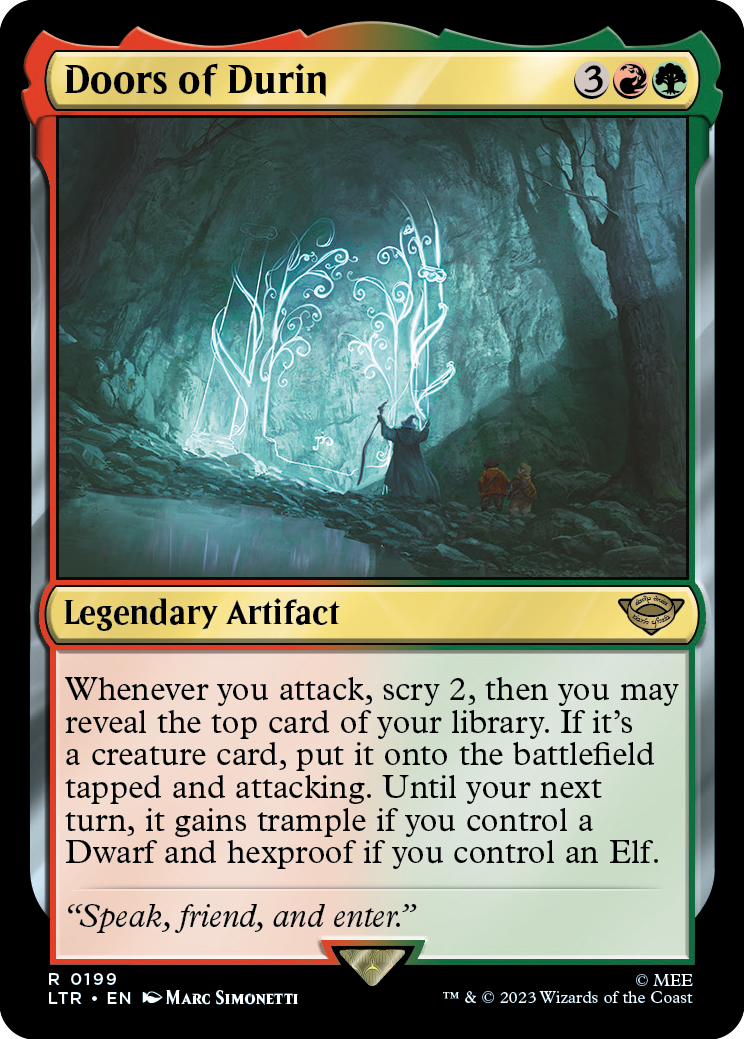
Doors of Durin
{3}{R}{G}
Legendary Artifact
Whenever you attack, scry 2, then you may reveal the top card of your library. If it's a creature card, put it onto the battlefield tapped and attacking. Until your next turn, it gains trample if you control a Dwarf and hexproof if you control an Elf.
- If the creature put onto the battlefield this way is a Dwarf and/or Elf, Doors of Durin will see it when checking whether you control a Dwarf or Elf.
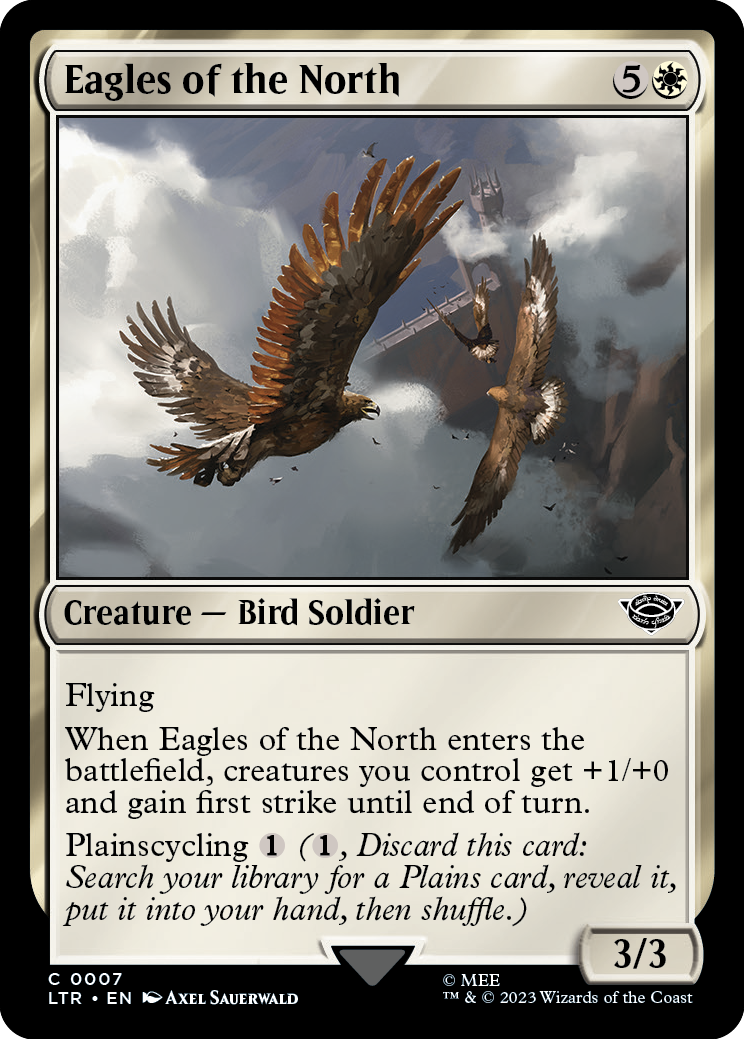
Eagles of the North
{5}{W}
Creature — Bird Soldier
3/3
Flying
When Eagles of the North enters the battlefield, creatures you control get +1/+0 and gain first strike until end of turn.
Plainscycling {1} ({1}, Discard this card: Search your library for a Plains card, reveal it, put it into your hand, then shuffle.)
- Eagles of the North's triggered ability affects only creatures you control at the time it resolves. Any creatures that come under your control later in the turn won't be affected.
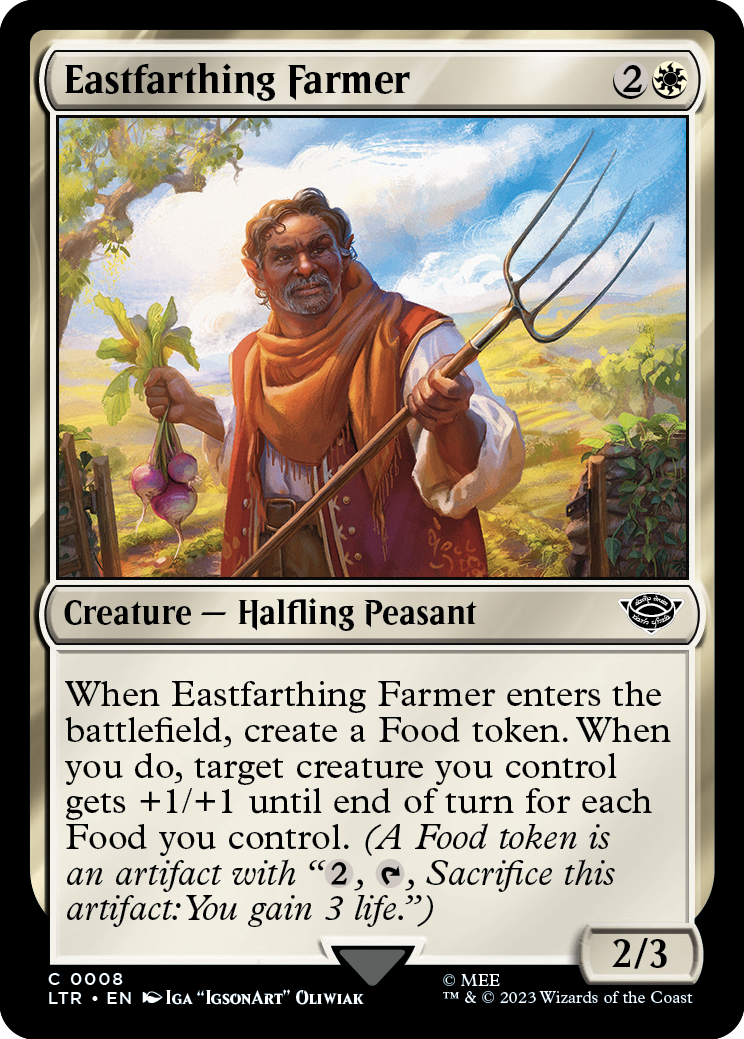
Eastfarthing Farmer
{2}{W}
Creature — Halfling Peasant
2/3
When Eastfarthing Farmer enters the battlefield, create a Food token. When you do, target creature you control gets +1/+1 until end of turn for each Food you control. (A Food token is an artifact with "{2}, {T}, Sacrifice this artifact: You gain 3 life.")
- You don't choose a target for Eastfarthing Farmer's ability at the time it triggers. Rather, a second "reflexive" ability triggers when you create a Food token this way. You choose a target for that ability as it goes on the stack. Each player may respond to this triggered ability as normal.
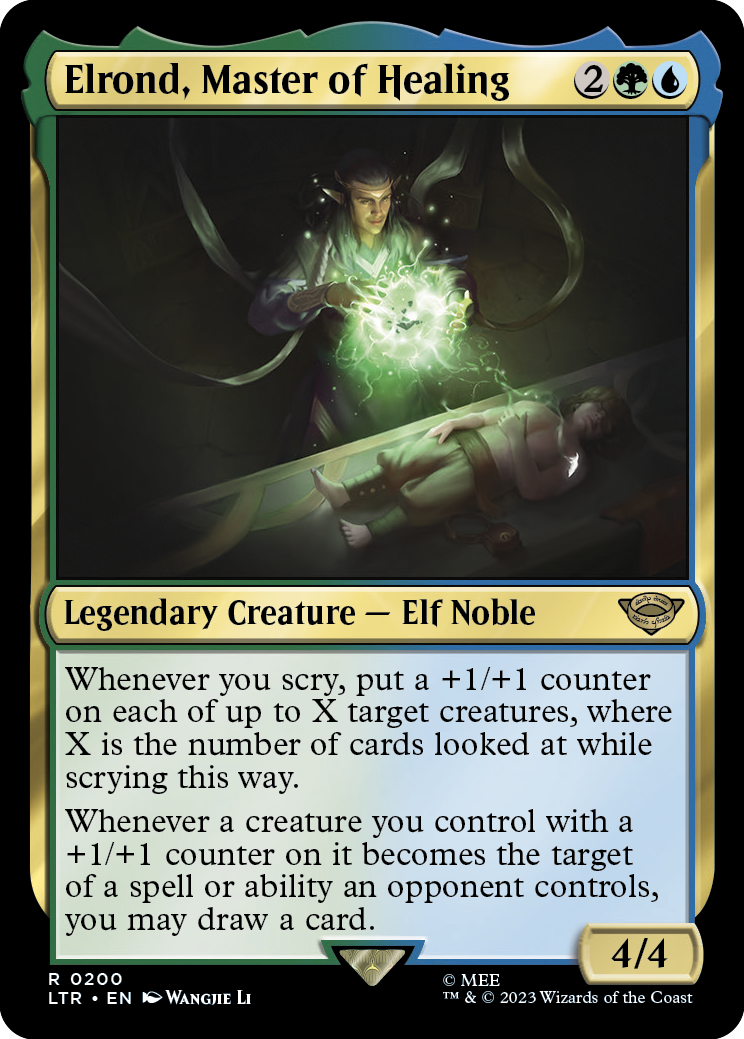
Elrond, Master of Healing
{2}{G}{U}
Legendary Creature — Elf Noble
4/4
Whenever you scry, put a +1/+1 counter on each of up to X target creatures, where X is the number of cards looked at while scrying this way.
Whenever a creature you control with a +1/+1 counter on it becomes the target of a spell or ability an opponent controls, you may draw a card.
- Elrond, Master of Healing's first ability cares about the number of cards you actually looked at. For example, if you were supposed to scry 3 but only had two cards in your library, X would be 2.
- If two creatures you control with +1/+1 counters on them become the target of the same spell or ability an opponent controls, Elrond, Master of Healing's last ability will trigger twice.
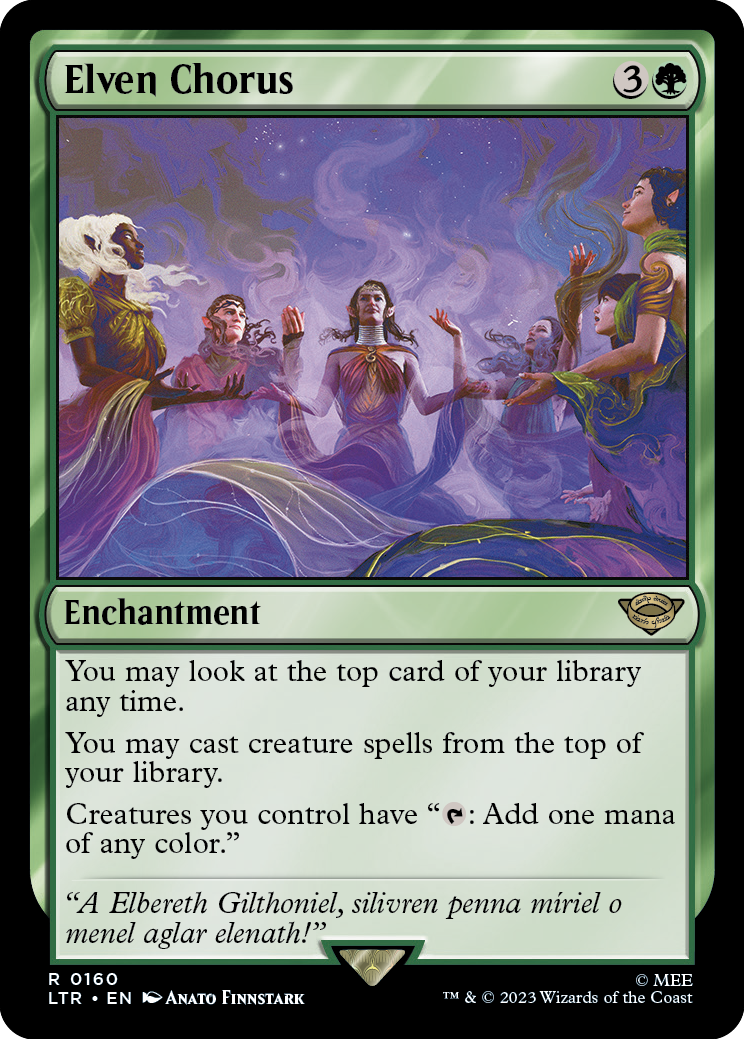
Elven Chorus
{3}{G}
Enchantment
You may look at the top card of your library any time.
You may cast creature spells from the top of your library.
Creatures you control have "{T}: Add one mana of any color."
- You can look at the top card of your library whenever you want (with one restriction; see below), even if you don't have priority. This action doesn't use the stack. Knowing what that card is becomes part of the information you have access to, just like you can look at the cards in your hand.
- If the top card of your library changes while you're casting a spell, playing a land, or activating an ability, you can't look at the new top card until you finish doing so. This means that if you cast a spell from the top of your library, you can't look at the next one until you're done paying for that spell.
- Elven Chorus doesn't change when you can cast creature spells. Normally, this means during your main phase when the stack is empty, although flash may change this.
- You'll still pay all costs for the spell, including additional costs. You may also pay alternative costs if any are available.
- The top card of your library isn't in your hand, so you can't take other actions that would normally be allowed from your hand, such as discarding it due to an effect or activating a cycling ability.
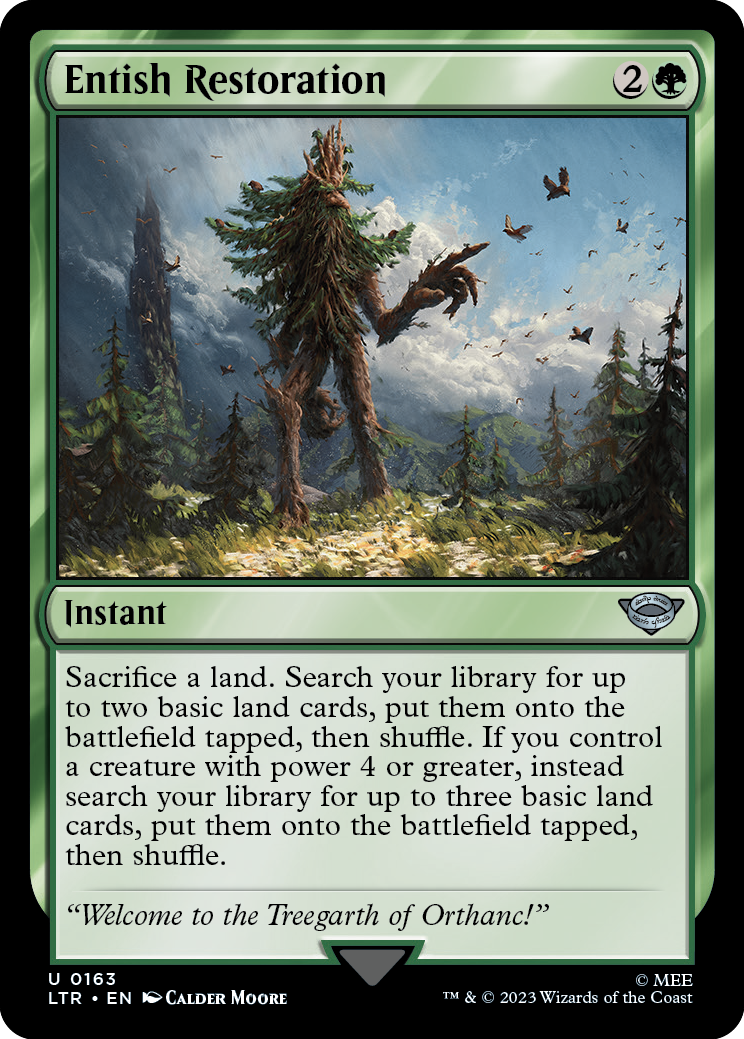
Entish Restoration
{2}{G}
Instant
Sacrifice a land. Search your library for up to two basic land cards, put them onto the battlefield tapped, then shuffle. If you control a creature with power 4 or greater, instead search your library for up to three basic land cards, put them onto the battlefield tapped, then shuffle.
- You sacrifice the lands as part of the resolution of Entish Restoration. It isn't an additional cost. If Entish Restoration is countered, you won't sacrifice any lands.
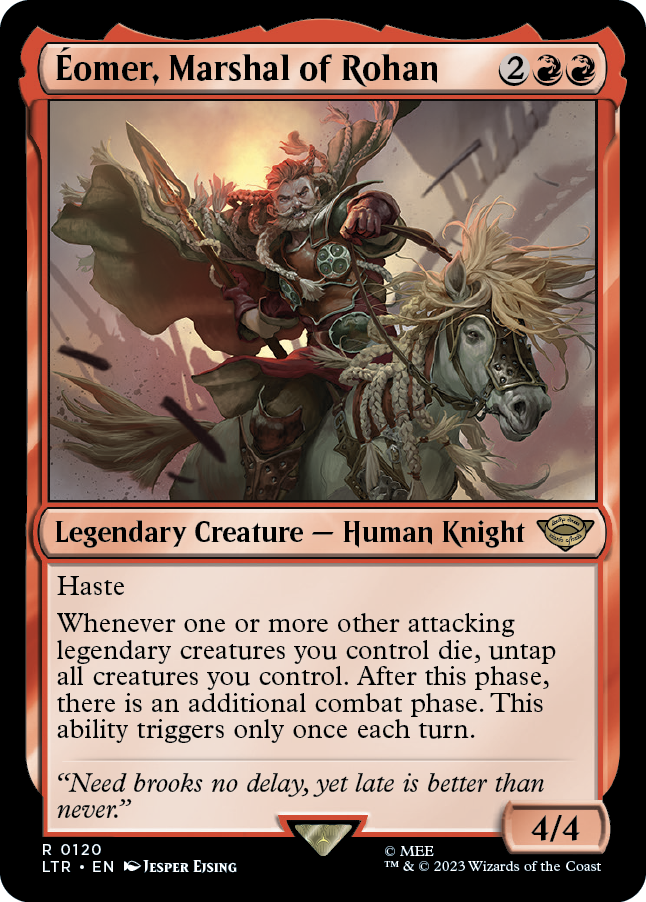
Éomer, Marshal of Rohan
{2}{R}{R}
Legendary Creature — Human Knight
4/4
Haste
Whenever one or more other attacking legendary creatures you control die, untap all creatures you control. After this phase, there is an additional combat phase. This ability triggers only once each turn.
- If Éomer, Marshal of Rohan and one or more other attacking legendary creatures you control die at the same time (probably due to combat damage), Éomer, Marshal of Rohan's last ability will trigger.
- Notably, Éomer, Marshal of Rohan's triggered ability doesn't give you any additional main phases. This means that you will move directly from the end of combat step of one combat phase to the beginning of combat step of the next one.
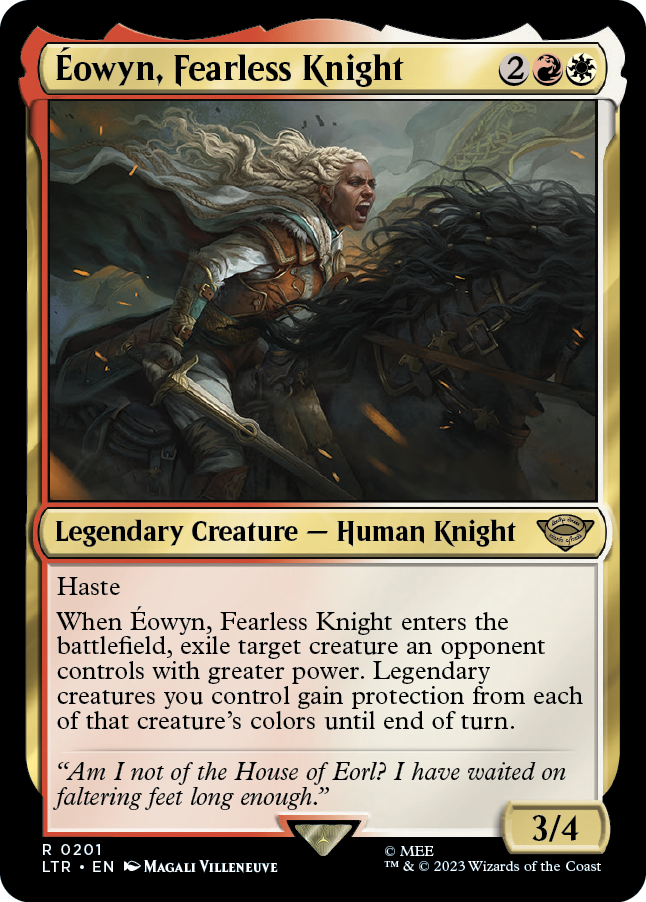
Éowyn, Fearless Knight
{2}{R}{W}
Legendary Creature — Human Knight
3/4
Haste
When Éowyn, Fearless Knight enters the battlefield, exile target creature an opponent controls with greater power. Legendary creatures you control gain protection from each of that creature's colors until end of turn.
- Éowyn, Fearless Knight cares about the creature's colors just before it left the battlefield. These could be different from the creature card's colors in exile (for example, if it had a copy effect applied to it on the battlefield.)
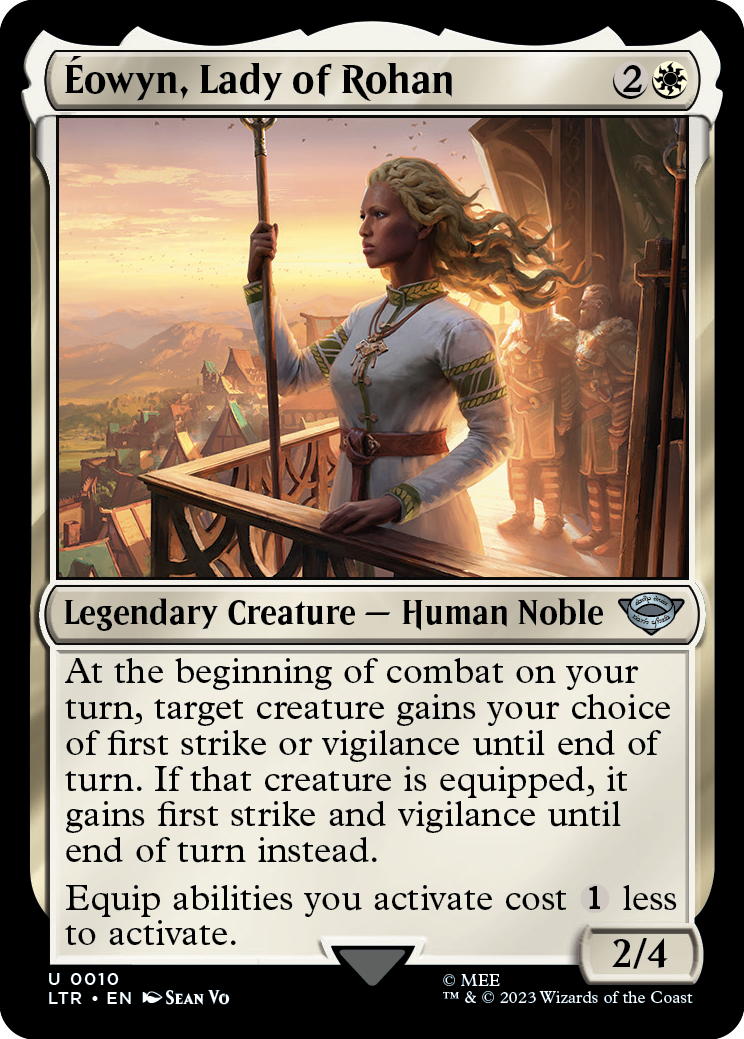
Éowyn, Lady of Rohan
{2}{W}
Legendary Creature — Human Noble
2/4
At the beginning of combat on your turn, target creature gains your choice of first strike or vigilance until end of turn. If that creature is equipped, it gains first strike and vigilance until end of turn instead.
Equip abilities you activate cost {1} less to activate.
- Éowyn, Lady of Rohan's last ability reduces only the amount of generic mana in equip abilities. For example, it will reduce an equip cost of {1} to {0}, but it will have no effect on an equip cost of {G}.
- Some Equipment creature cards in other sets have reconfigure, a different ability that attaches them to a creature. Reconfigure is not an equip ability, and reconfigure costs are not reduced by Éowyn, Lady of Rohan's last ability. Equip variants or equip abilities with restrictions, like the "equip Human" ability of Dúnedain Blade, are still equip abilities, and their costs will be reduced by Éowyn, Lady of Rohan's last ability.
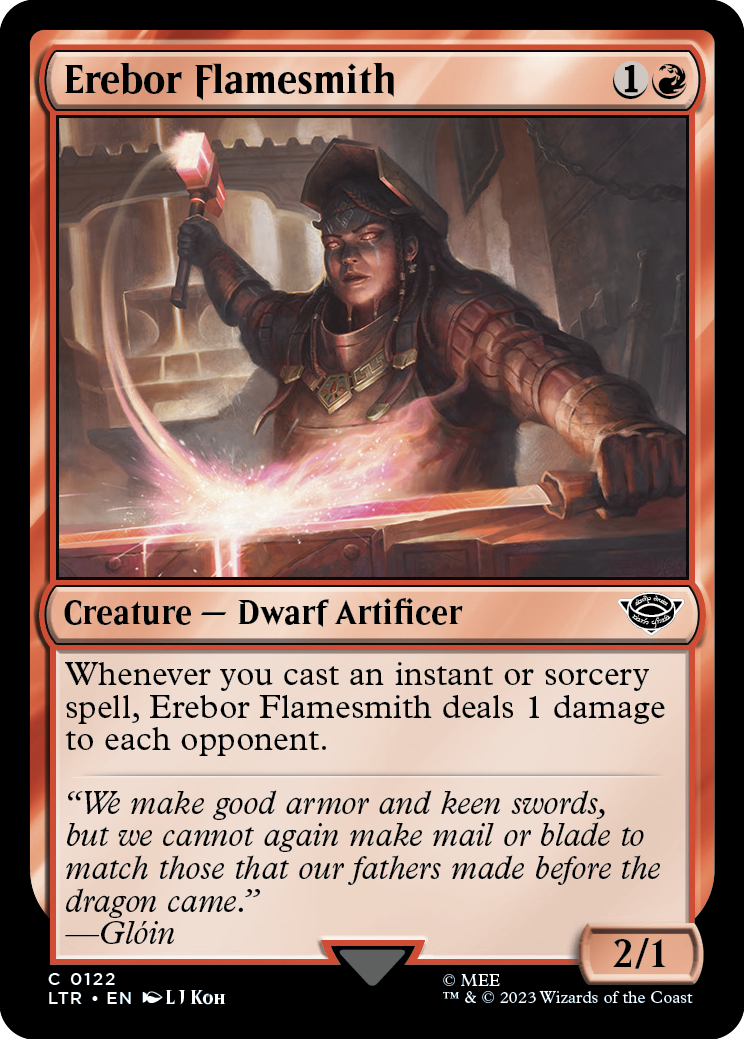
Erebor Flamesmith
{1}{R}
Creature — Dwarf Artificer
2/1
Whenever you cast an instant or sorcery spell, Erebor Flamesmith deals 1 damage to each opponent.
- Erebor Flamesmith's triggered ability will resolve before the spell that caused the ability to trigger.
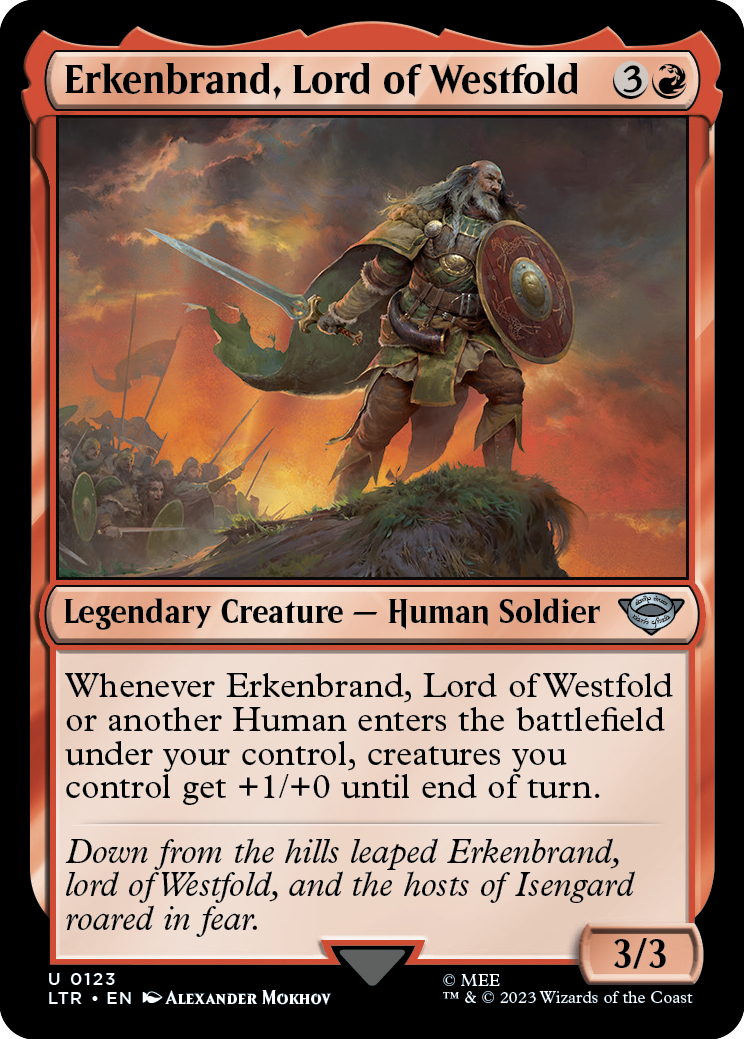
Erkenbrand, Lord of Westfold
{3}{R}
Legendary Creature — Human Soldier
3/3
Whenever Erkenbrand, Lord of Westfold or another Human enters the battlefield under your control, creatures you control get +1/+0 until end of turn.
- Erkenbrand, Lord of Westfold's triggered ability affects only creatures you control at the time it resolves. Any creatures that come under your control later in the turn won't be affected.
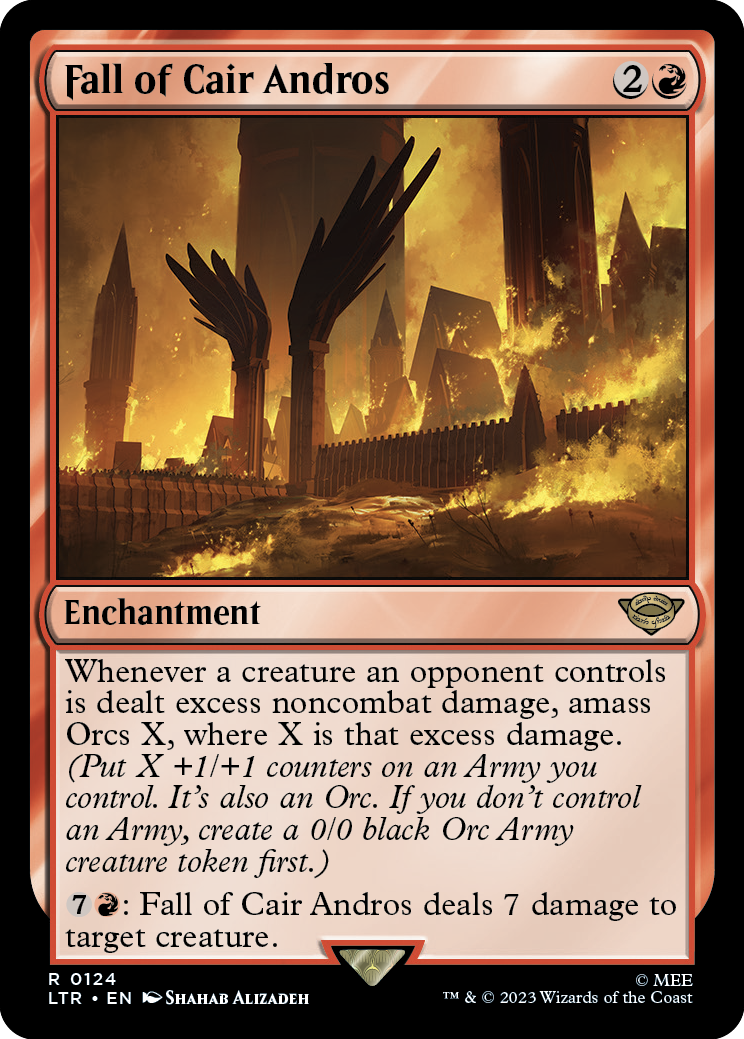
Fall of Cair Andros
{2}{R}
Enchantment
Whenever a creature an opponent controls is dealt excess noncombat damage, amass Orcs X, where X is that excess damage. (Put X +1/+1 counters on an Army you control. It's also an Orc. If you don't control an Army, create a 0/0 black Orc Army creature token first.)
{7}{R}: Fall of Cair Andros deals 7 damage to target creature.
- Excess damage has been dealt to a creature if the damage dealt to it is greater than lethal damage. Usually, this means damage greater than its toughness, although damage already marked on the creature is taken into account.
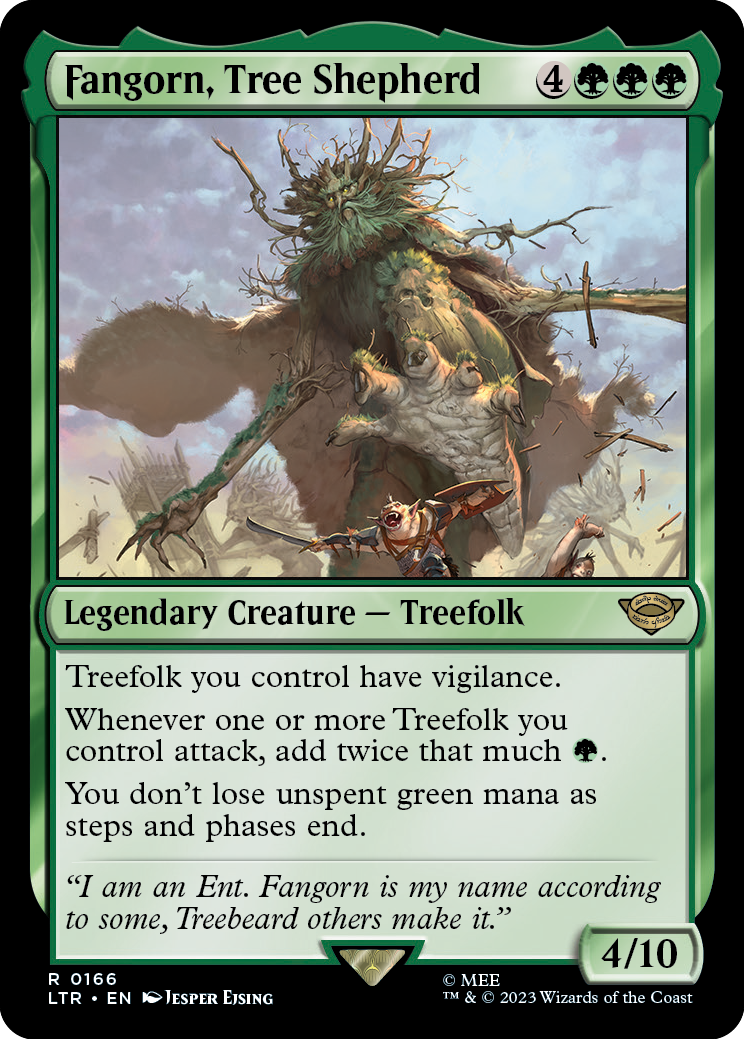
Fangorn, Tree Shepherd
{4}{G}{G}{G}
Legendary Creature — Treefolk
4/10
Treefolk you control have vigilance.
Whenever one or more Treefolk you control attack, add twice that much {G}.
You don't lose unspent green mana as steps and phases end.
- You can keep green mana in your mana pool indefinitely while Fangorn, Tree Shepherd is on the battlefield. That means if you add a green mana to your mana pool during one step or phase, you can spend it during a later step or phase, or even a later turn. Other types of mana will continue to empty from your mana pool as each step and phase ends.
- If a green mana you add to your mana pool has certain restrictions or riders associated with it (for example, if it was produced by Great Hall of the Citadel), they'll apply to that mana no matter when you spend it.
- Once Fangorn, Tree Shepherd leaves the battlefield, you have until the end of the current step or phase to spend whatever green mana is in your mana pool before it too empties as normal. There is no penalty associated with this other than the loss of the mana.
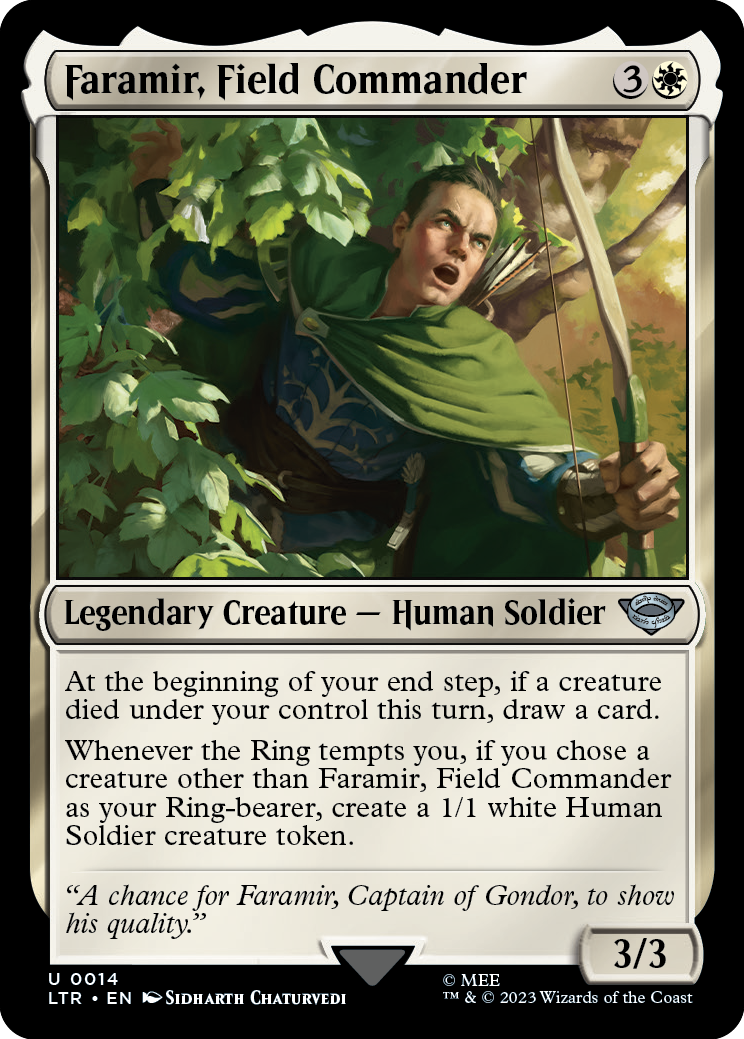
Faramir, Field Commander
{3}{W}
Legendary Creature — Human Soldier
3/3
At the beginning of your end step, if a creature died under your control this turn, draw a card.
Whenever the Ring tempts you, if you chose a creature other than Faramir, Field Commander as your Ring-bearer, create a 1/1 white Human Soldier creature token.
- Faramir, Field Commander doesn't need to have been on the battlefield when the creature died. For example, if a creature dies during combat on your turn and you cast Faramir, Field Commander during your second main phase, its first ability will trigger at the beginning of your end step.
- Faramir, Field Commander's first ability will trigger only once during your end step, no matter how many creatures died under your control this turn. However, if no creatures have died under your control so far this turn as your end step begins, the ability won't trigger at all. It's not possible to cause a creature to die under your control during the end step in time to have the ability trigger.
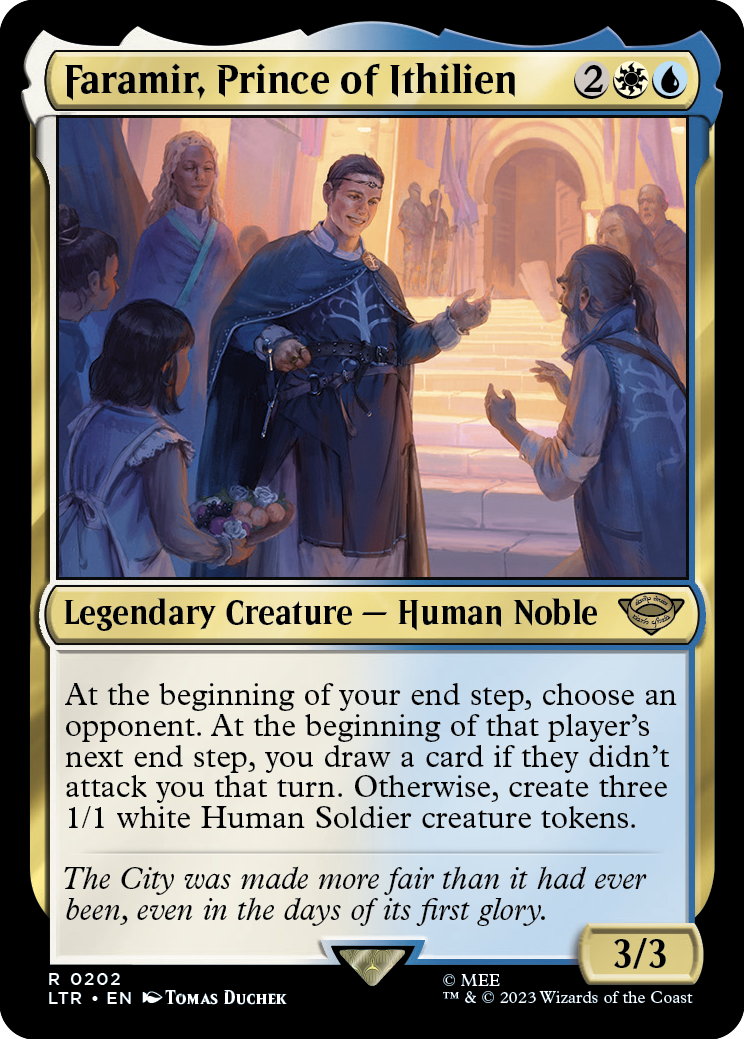
Faramir, Prince of Ithilien
{2}{W}{U}
Legendary Creature — Human Noble
3/3
At the beginning of your end step, choose an opponent. At the beginning of that player's next end step, you draw a card if they didn't attack you that turn. Otherwise, create three 1/1 white Human Soldier creature tokens.
- Attacking a planeswalker you control or battle you're protecting doesn't count as attacking you.
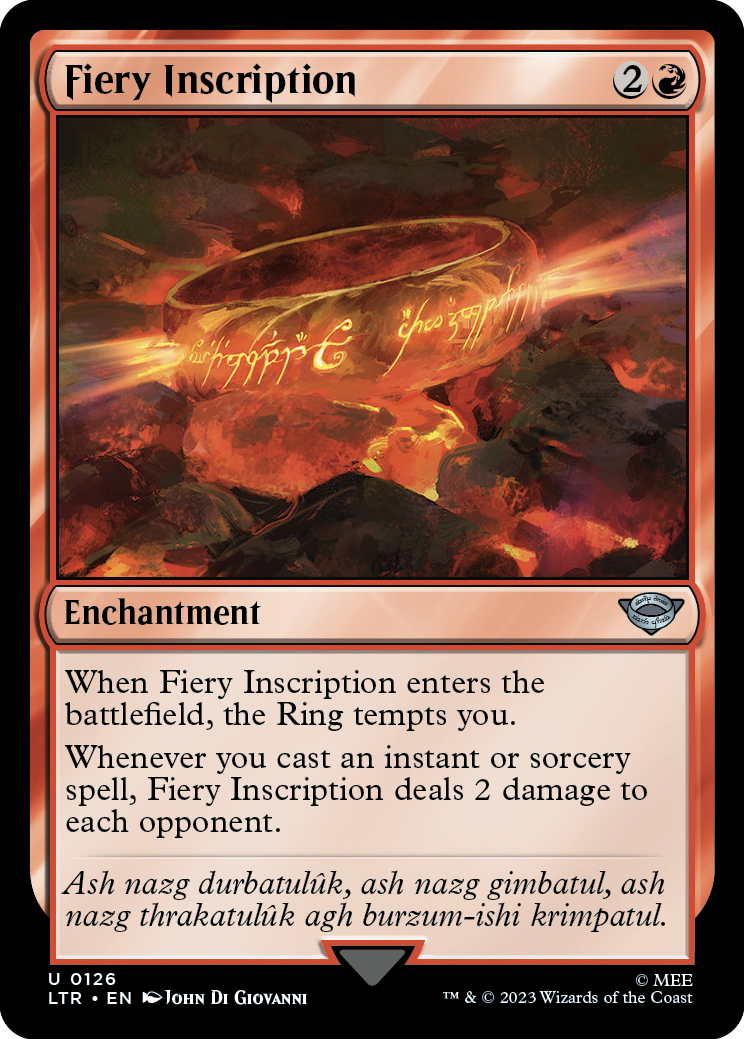
Fiery Inscription
{2}{R}
Enchantment
When Fiery Inscription enters the battlefield, the Ring tempts you.
Whenever you cast an instant or sorcery spell, Fiery Inscription deals 2 damage to each opponent.
- Fiery Inscription's second triggered ability will resolve before the spell that caused the ability to trigger.
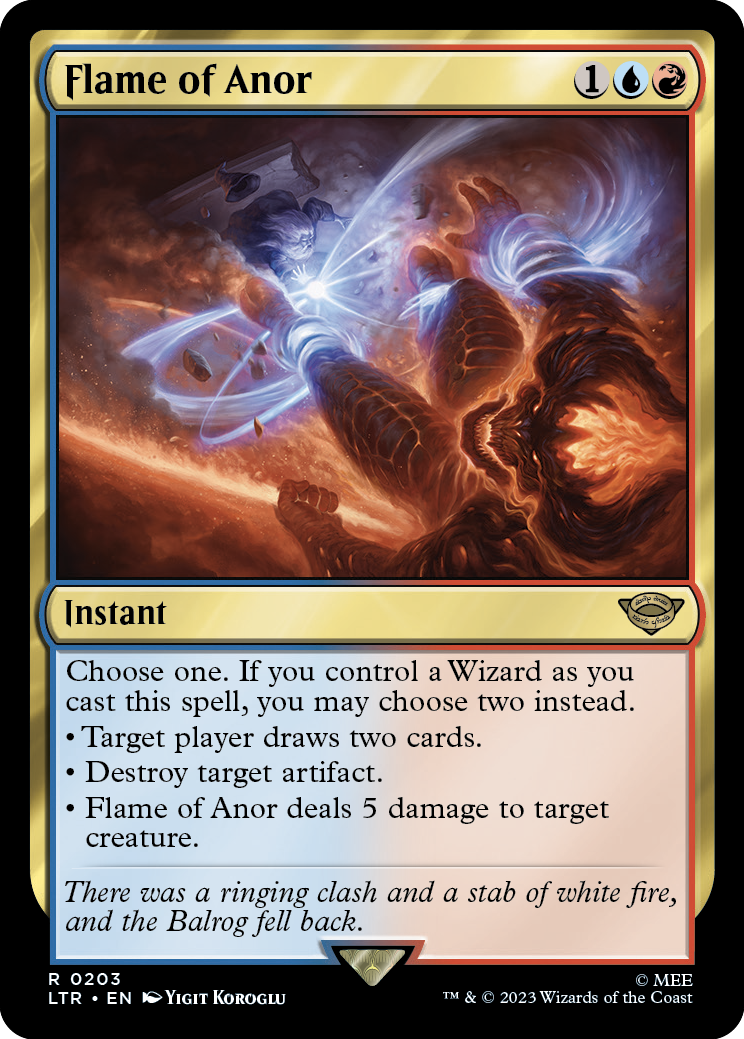
Flame of Anor
{1}{U}{R}
Instant
Choose one. If you control a Wizard as you cast this spell, you may choose two instead.
• Target player draws two cards.
• Destroy target artifact.
• Flame of Anor deals 5 damage to target creature.
- Once you cast Flame of Anor and choose two modes, it doesn't matter what happens to the Wizard you control in response. Flame of Anor will still have two modes chosen.
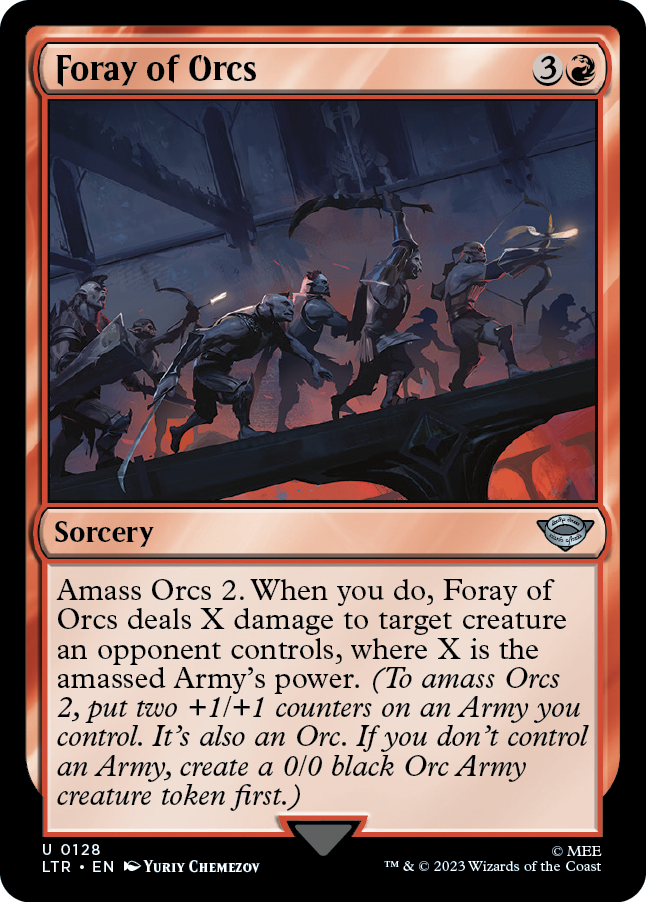
Foray of Orcs
{3}{R}
Sorcery
Amass Orcs 2. When you do, Foray of Orcs deals X damage to target creature an opponent controls, where X is the amassed Army's power. (To amass Orcs 2, put two +1/+1 counters on an Army you control. It's also an Orc. If you don't control an Army, create a 0/0 black Orc Army creature token first.)
- You don't choose a target for Foray of Orcs at the time you cast it. Rather, a second "reflexive" ability triggers when you amass Orcs this way. You choose a target for that ability as it goes on the stack. Each player may respond to this triggered ability as normal.
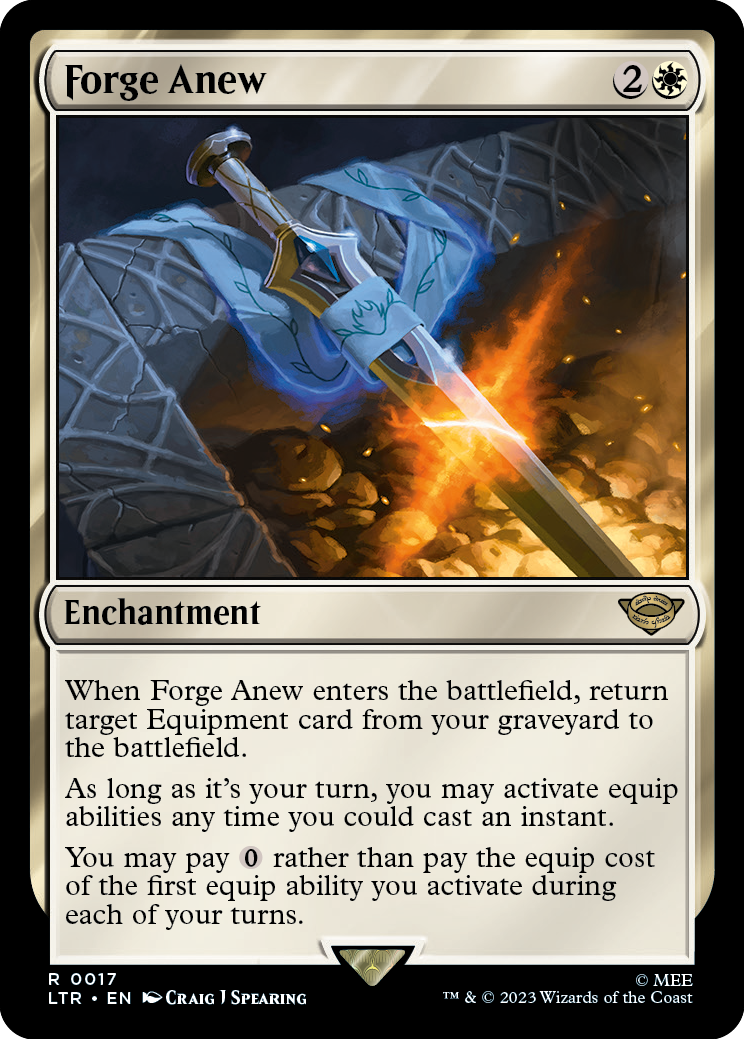
Forge Anew
{2}{W}
Enchantment
When Forge Anew enters the battlefield, return target Equipment card from your graveyard to the battlefield.
As long as it's your turn, you may activate equip abilities any time you could cast an instant.
You may pay {0} rather than pay the equip cost of the first equip ability you activate during each of your turns.
- Some Equipment creature cards in other sets have reconfigure, a different ability that attaches them to a creature. Reconfigure is not an equip ability. Reconfigure abilities cannot be activated at instant speed by Forge Anew's second ability, and you may not pay {0} rather than pay their reconfigure cost with Forge Anew's last ability. Equip variants or equip abilities with restrictions, like the "equip Human" ability of Dúnedain Blade, are still equip abilities, and you may pay {0} rather than pay their cost.
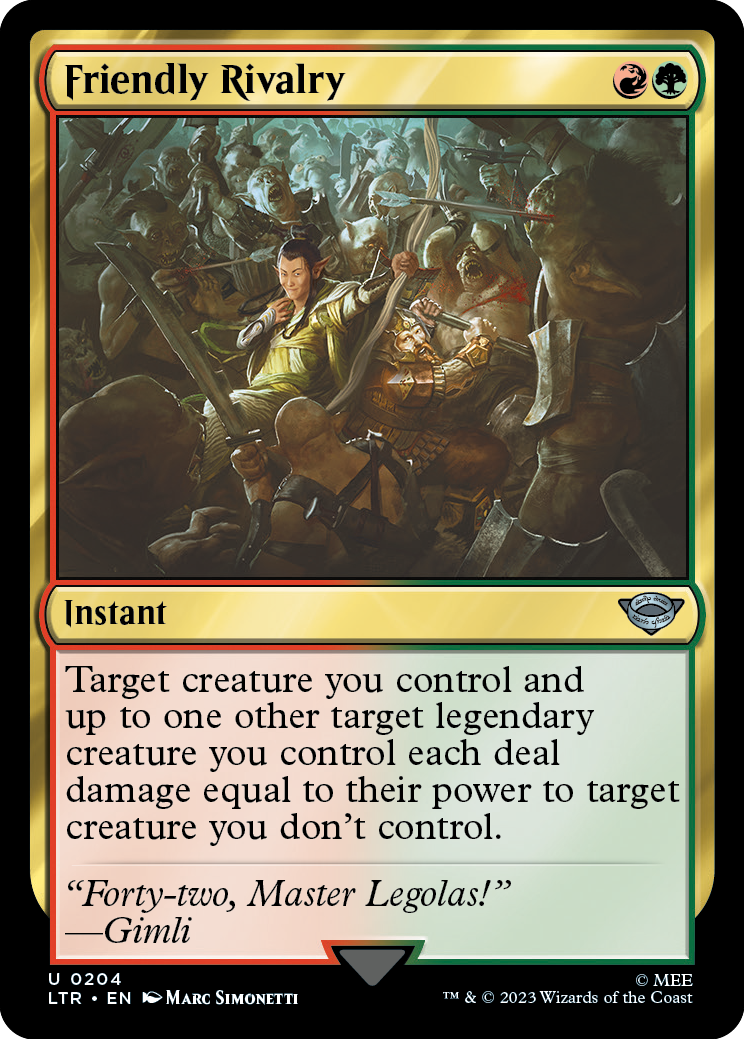
Friendly Rivalry
{R}{G}
Instant
Target creature you control and up to one other target legendary creature you control each deal damage equal to their power to target creature you don't control.
- If one of the two target creatures you control is an illegal target as Friendly Rivalry resolves, the other will still deal damage equal to its power.
- If the last target is an illegal target as Friendly Rivalry resolves, or if both of the first targets are illegal targets, no creature deals or is dealt damage.

Frodo Baggins
{G}{W}
Legendary Creature — Halfling Scout
1/3
Whenever Frodo Baggins or another legendary creature enters the battlefield under your control, the Ring tempts you.
As long as Frodo is your Ring-bearer, it must be blocked if able.
- If Frodo Baggins is your Ring-bearer, only one creature is required to block it. Other creatures may also block it and are free to block other creatures or not block at all.
- If Frodo Baggins is your Ring-bearer but each creature the defending player controls can't block for any reason (such as by having greater power than Frodo along with the first ability of the Ring emblem), then Frodo Baggins isn't blocked. If there's a cost associated with blocking Frodo Baggins, the defending player isn't forced to pay that cost, so it doesn't have to be blocked in that case either.
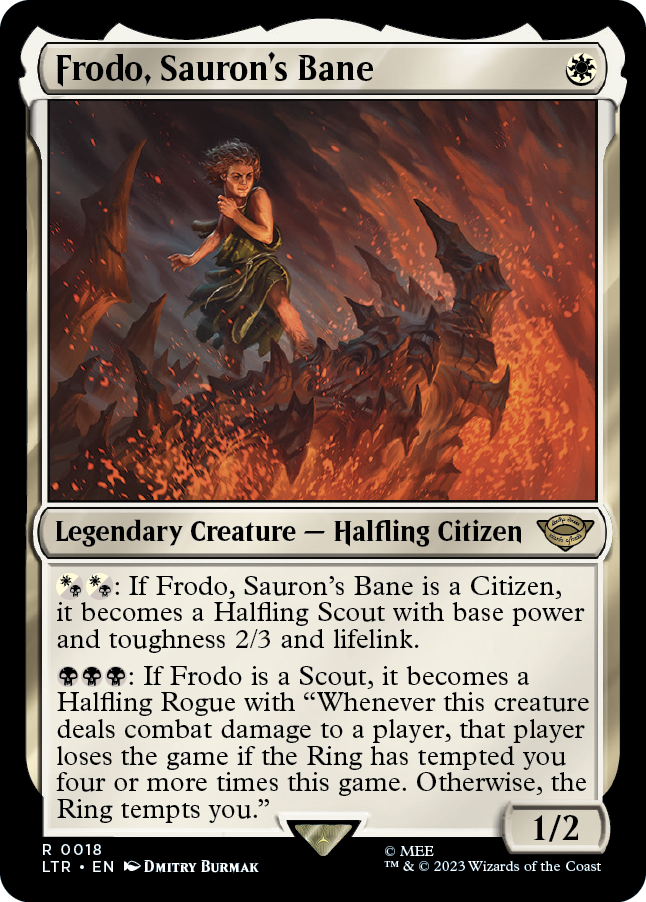
Frodo, Sauron's Bane
{W}
Legendary Creature — Halfling Citizen
1/2
{W/B}{W/B}: If Frodo, Sauron's Bane is a Citizen, it becomes a Halfling Scout with base power and toughness 2/3 and lifelink.
{B}{B}{B}: If Frodo is a Scout, it becomes a Halfling Rogue with "Whenever this creature deals combat damage to a player, that player loses the game if the Ring has tempted you four or more times this game. Otherwise, the Ring tempts you."
- None of these abilities have a duration. If one of them resolves, it will remain in effect until the game ends, Frodo, Sauron's Bane leaves the battlefield, or some subsequent effect changes its characteristics, whichever comes first.
- You can activate Frodo, Sauron's Bane's abilities regardless of what creature types it is. Each of those abilities checks Frodo's creature types when that ability resolves. If Frodo, Sauron's Bane isn't the appropriate creature type at the time, that ability does nothing.
- Frodo, Sauron's Bane's first ability checks whether it's a Citizen, and its second ability checks whether it's a Scout. It doesn't matter how it became the appropriate creature type.
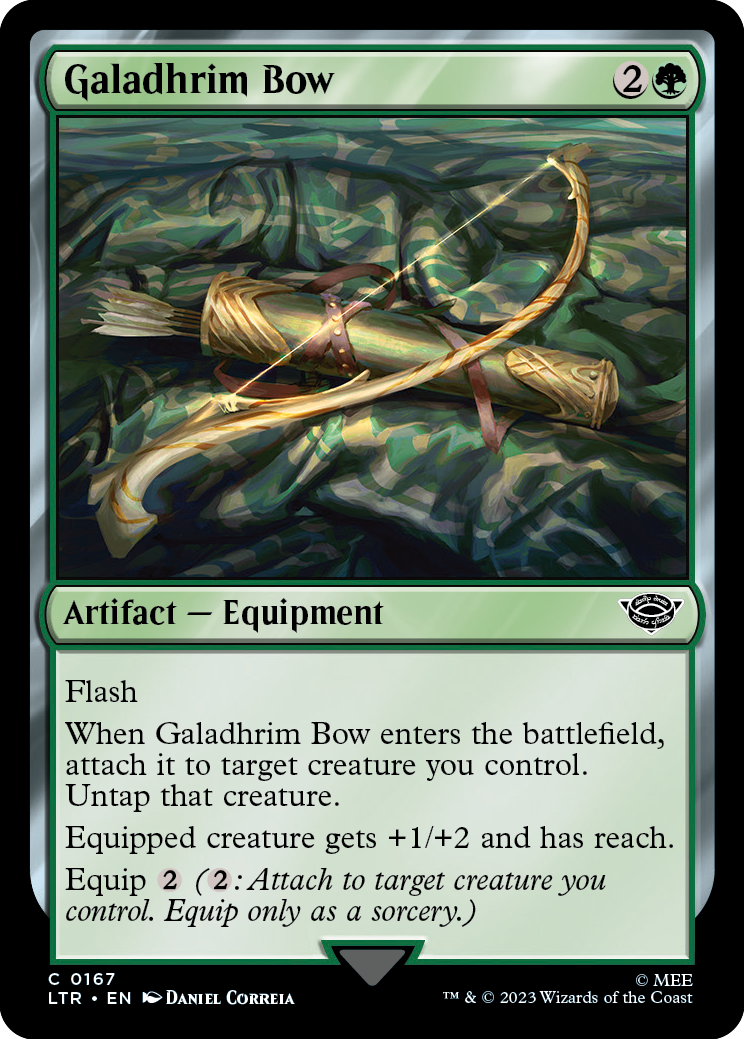
Galadhrim Bow
{2}{G}
Artifact — Equipment
Flash
When Galadhrim Bow enters the battlefield, attach it to target creature you control. Untap that creature.
Equipped creature gets +1/+2 and has reach.
Equip {2} ({2}: Attach to target creature you control. Equip only as a sorcery.)
- Attaching an Equipment with its enters-the-battlefield triggered ability isn't the same as using its equip ability. You don't pay mana for the attachment, and the timing restrictions for equip abilities don't apply.
- If the target creature becomes an illegal target, the Equipment remains on the battlefield unattached, and no creatures are untapped.
- Galadhrim Bow doesn't enter the battlefield attached to a creature. Instead, the Equipment enters the battlefield and then a triggered ability attaches it to a creature. You may cast Galadhrim Bow even if you don't control any creatures.
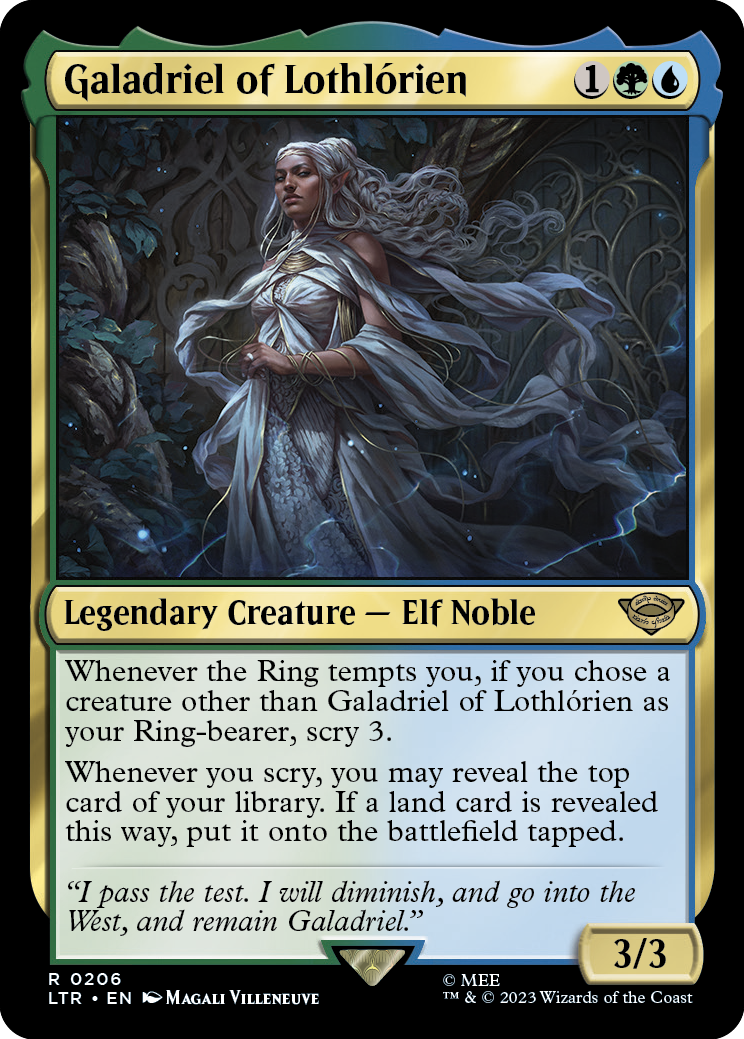
Galadriel of Lothlórien
{1}{G}{U}
Legendary Creature — Elf Noble
3/3
Whenever the Ring tempts you, if you chose a creature other than Galadriel of Lothlórien as your Ring-bearer, scry 3.
Whenever you scry, you may reveal the top card of your library. If a land card is revealed this way, put it onto the battlefield tapped.
- You finish scrying before revealing the top card of your library.
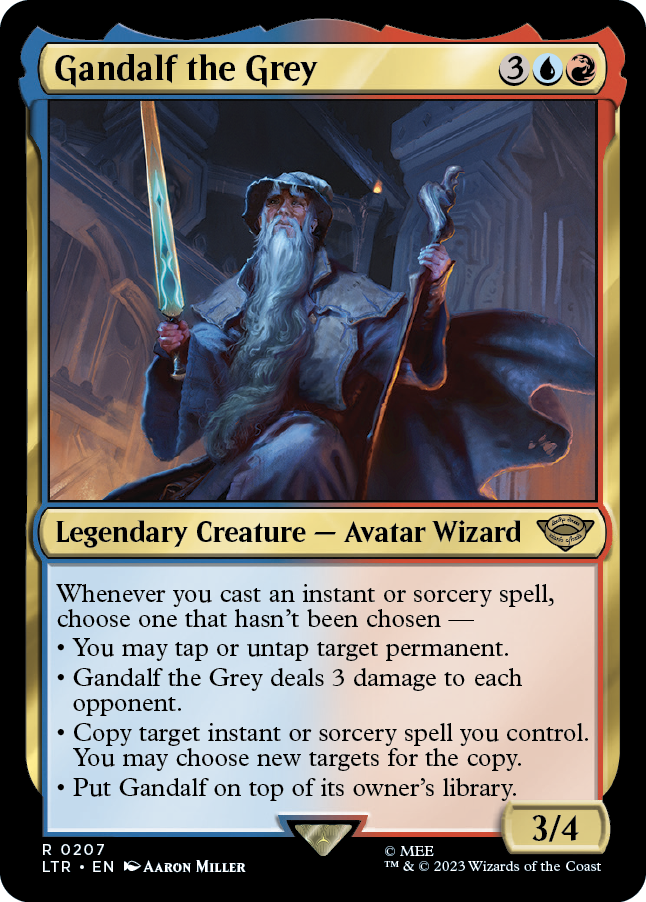
Gandalf the Grey
{3}{U}{R}
Legendary Creature — Avatar Wizard
3/4
Whenever you cast an instant or sorcery spell, choose one that hasn't been chosen —
• You may tap or untap target permanent.
• Gandalf the Grey deals 3 damage to each opponent.
• Copy target instant or sorcery spell you control. You may choose new targets for the copy.
• Put Gandalf on top of its owner's library.
- You choose the mode as the triggered ability goes on the stack. You can choose a mode that requires targets only if there are legal targets available.
- If the ability doesn't resolve (either for having its target become illegal or because a spell or ability counters it), the mode chosen for that instance of the ability still counts as being chosen.
- The phrase "that hasn't been chosen" refers only to that specific Gandalf the Grey. If Gandalf the Grey leaves the battlefield (possibly because of the fourth mode of its ability) and then returns to the battlefield later, it will be a new object with no memory of the modes chosen when it was last on the battlefield.
- It doesn't matter who has chosen any particular mode. For example, say you control Gandalf the Grey and have chosen the first two modes. If an opponent gains control of Gandalf the Grey, that player can choose only the third or fourth mode.
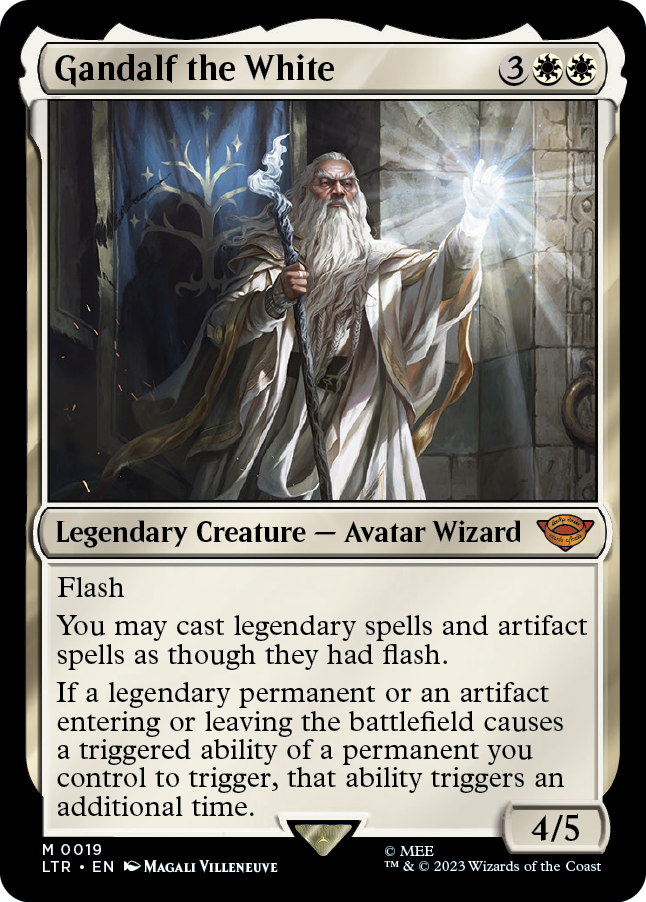
Gandalf the White
{3}{W}{W}
Legendary Creature — Avatar Wizard
4/5
Flash
You may cast legendary spells and artifact spells as though they had flash.
If a legendary permanent or an artifact entering or leaving the battlefield causes a triggered ability of a permanent you control to trigger, that ability triggers an additional time.
- The second ability applies only to casting spells. It does not, for example, change when you may activate abilities that can be activated "only as a sorcery."
- Gandalf the White affects a permanent's own enters-the-battlefield and leaves-the-battlefield triggered abilities as well as other triggered abilities that trigger when that permanent enters or leaves the battlefield. Such triggered abilities start with "when" or "whenever."
- Replacement effects are unaffected by Gandalf the White's ability. For example, a legendary creature that enters the battlefield with one +1/+1 counter on it won't receive an additional +1/+1 counter.
- Abilities that apply "as [this permanent] enters the battlefield," such as choosing a color with Gauntlet of Power, are also unaffected.
- You don't need to control the permanent entering or leaving the battlefield, only the permanent that has the triggered ability.
- Gandalf the White's effect doesn't copy the triggered ability; it just causes the ability to trigger twice. Any choices made as you put the ability onto the stack, such as modes and targets, are made separately for each instance of the ability. Any choices made on resolution, such as whether to put counters on a permanent, are also made individually.
- If you somehow control two copies of Gandalf the White, a legendary permanent or an artifact entering or leaving the battlefield causes abilities to trigger three times, not four. A third Gandalf the White causes abilities to trigger four times, a fourth causes abilities to trigger five times, and so on.
- If a legendary permanent or an artifact entering or leaving the battlefield at the same time as Gandalf the White (including Gandalf the White itself) causes a triggered ability of a permanent you control to trigger, that ability triggers an additional time.
- The trigger event doesn't have to specifically refer to legendary permanents or to artifacts, nor does it have to specifically refer to when something "leaves the battlefield." For example, an ability that triggers "whenever a creature dies" would trigger twice if a legendary creature or an artifact creature dies while Gandalf the White is on the battlefield, as would an ability that triggers "whenever a permanent is put into a graveyard from the battlefield."
- Look at each legendary permanent and each artifact as it exists on the battlefield, taking into account continuous effects, to determine whether any triggered abilities will trigger multiple times. For example, if a nonlegendary creature that has become legendary (probably because it's a player's Ring-bearer) dies, an ability that triggers when it leaves the battlefield triggers twice.
- An ability of a permanent that triggers when a card is put into a graveyard "from anywhere" triggers twice only if Gandalf the White and that permanent are both still on the battlefield immediately after the legendary permanent or the artifact has been put into the graveyard from the battlefield. For example, say you control both Gandalf the White and Sefris of the Hidden Ways. If another legendary creature you control dies, Sefris's first ability will trigger twice. But if Gandalf the White dies, Sefris's first ability will trigger only once.
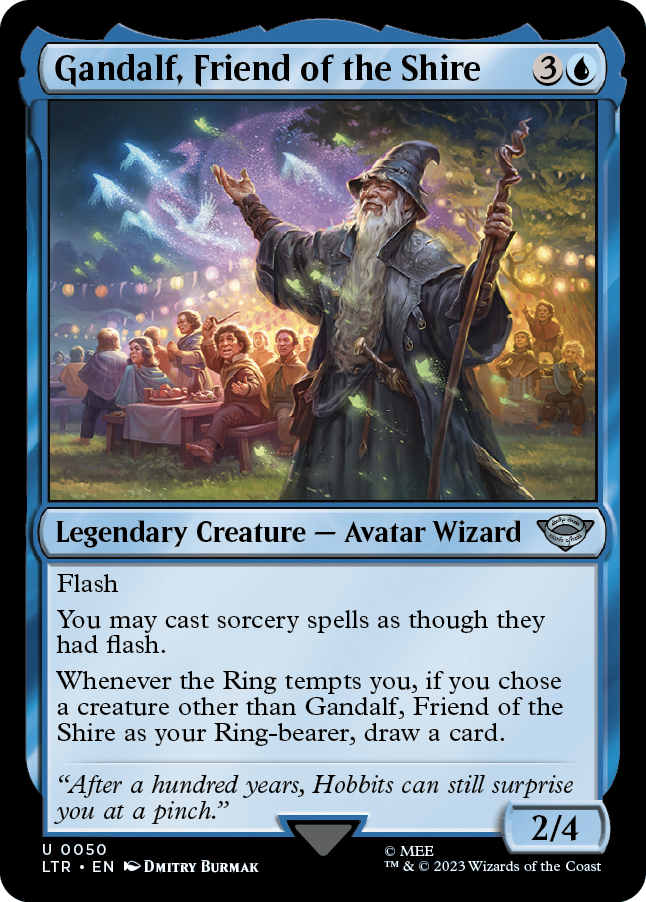
Gandalf, Friend of the Shire
{3}{U}
Legendary Creature — Avatar Wizard
2/4
Flash
You may cast sorcery spells as though they had flash.
Whenever the Ring tempts you, if you chose a creature other than Gandalf, Friend of the Shire as your Ring-bearer, draw a card.
- The second ability applies only to casting spells. It does not, for example, change when you may activate abilities that can be activated "only as a sorcery."
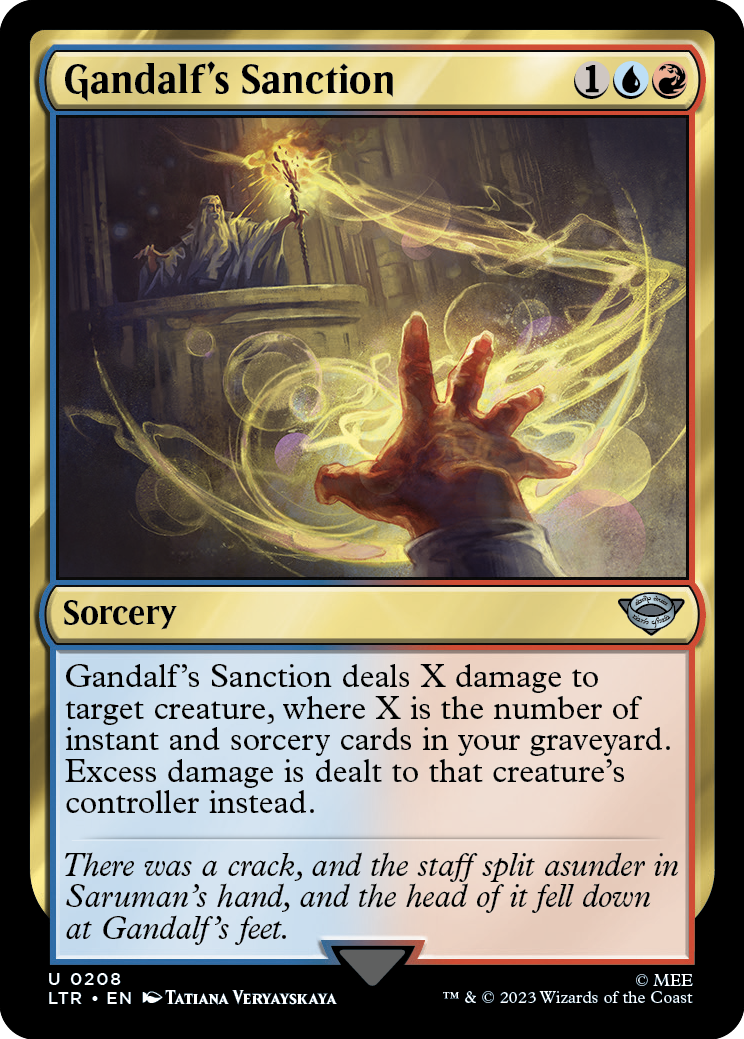
Gandalf's Sanction
{1}{U}{R}
Sorcery
Gandalf's Sanction deals X damage to target creature, where X is the number of instant and sorcery cards in your graveyard. Excess damage is dealt to that creature's controller instead.
- Gandalf's Sanction is not yet in your graveyard when you determine the value of X.
- Excess damage caused by a spell or ability is similar to how combat damage from a creature with trample is handled. Start with the amount of damage being dealt to the creature and determine what is "lethal." This is the creature's toughness minus the amount of damage that it already has marked on it, but ignoring any replacement or prevention effects that will modify this damage. Also ignore whether the creature has an ability such as indestructible that will result in it not being destroyed by this damage.
- Once you've determined how much damage is excess, Gandalf's Sanction simultaneously deals damage to the creature and to its controller. This damage may be modified by replacement or prevention effects.
- If the target creature is an illegal target by the time Gandalf's Sanction tries to resolve, the spell won't resolve. It won't deal damage to any player.
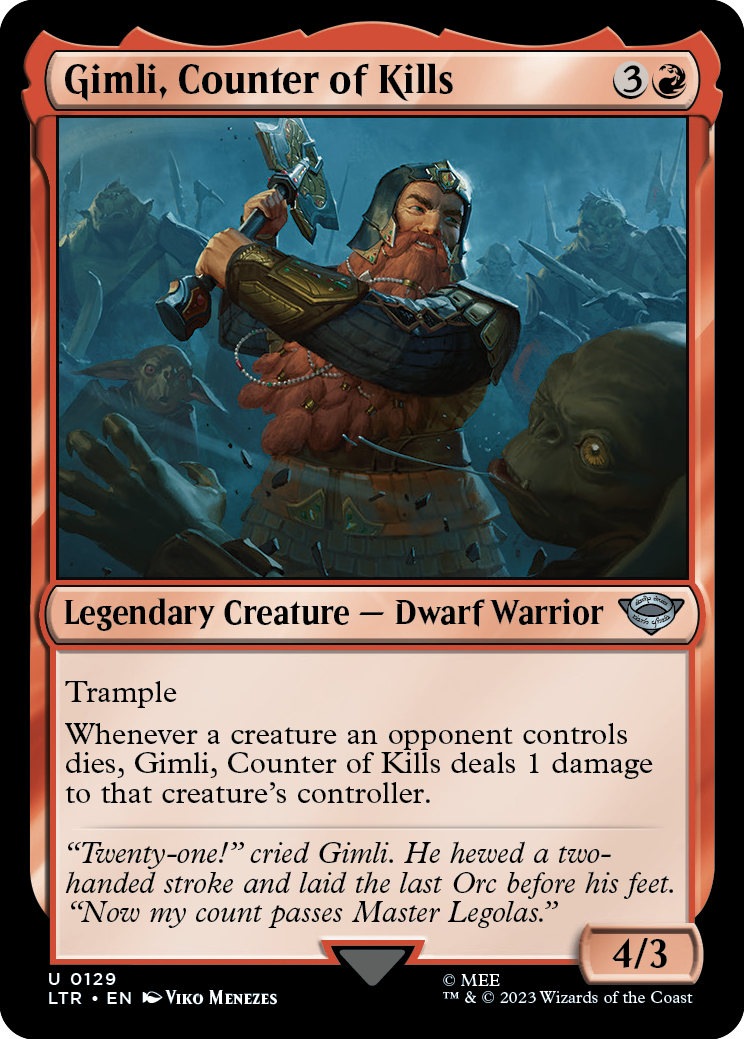
Gimli, Counter of Kills
{3}{R}
Legendary Creature — Dwarf Warrior
4/3
Trample
Whenever a creature an opponent controls dies, Gimli, Counter of Kills deals 1 damage to that creature's controller.
- If Gimli, Counter of Kills dies at the same time as one or more creatures an opponent controls, the last ability will trigger for each of those other creatures.
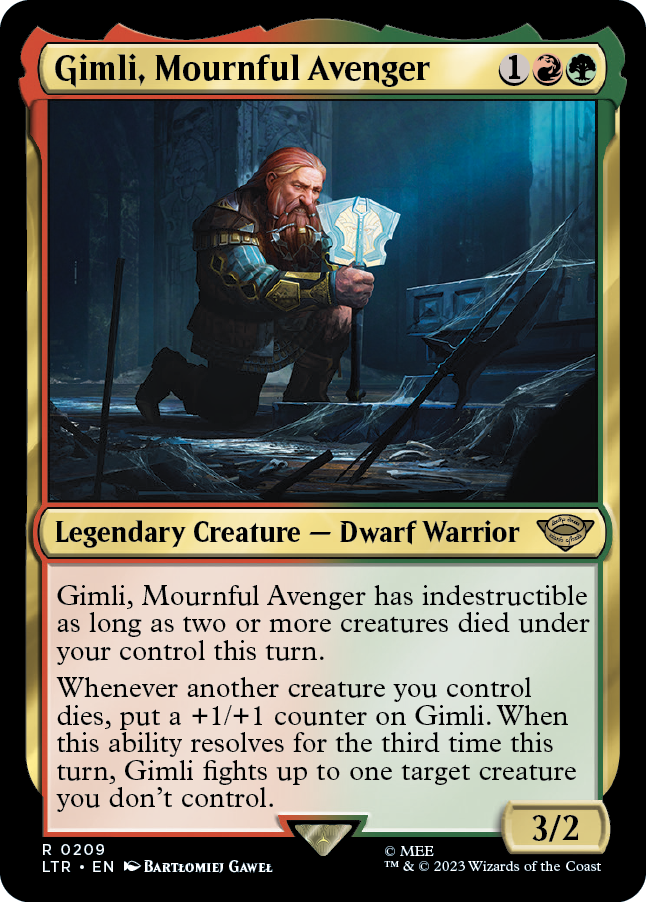
Gimli, Mournful Avenger
{1}{R}{G}
Legendary Creature — Dwarf Warrior
3/2
Gimli, Mournful Avenger has indestructible as long as two or more creatures died under your control this turn.
Whenever another creature you control dies, put a +1/+1 counter on Gimli. When this ability resolves for the third time this turn, Gimli fights up to one target creature you don't control.
- Gimli, Mournful Avenger doesn't need to have been on the battlefield when creatures died under your control for the first ability to count them. For example, if two creatures you control die during combat on your turn and you cast Gimli, Mournful Avenger during your second main phase, it will have indestructible until end of turn.
- You don't choose a target for Gimli, Mournful Avenger's last ability at the time it triggers. Rather, a second "reflexive" ability triggers when its last ability resolves for the third time in a turn. You may choose a target for that ability as it goes on the stack. Each player may respond to this triggered ability as normal.
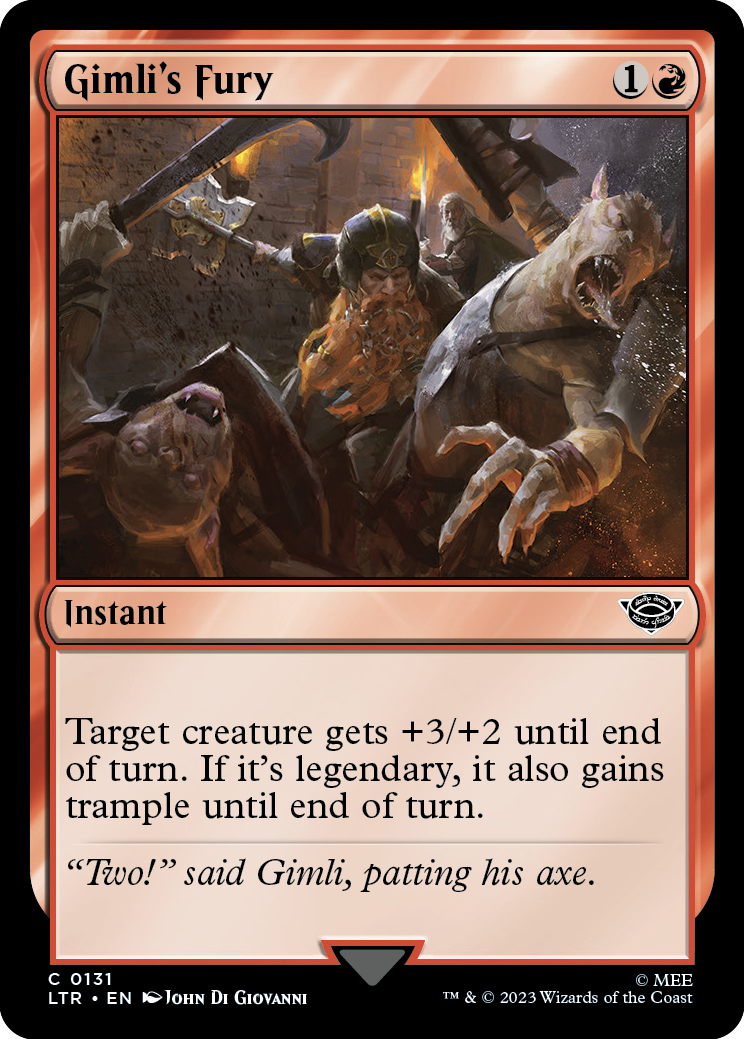
Gimli's Fury
{1}{R}
Instant
Target creature gets +3/+2 until end of turn. If it's legendary, it also gains trample until end of turn.
- Gimli's Fury checks whether the creature is legendary as it resolves. If the target isn't legendary as the spell is cast but becomes one before the spell resolves, that creature will gain trample.
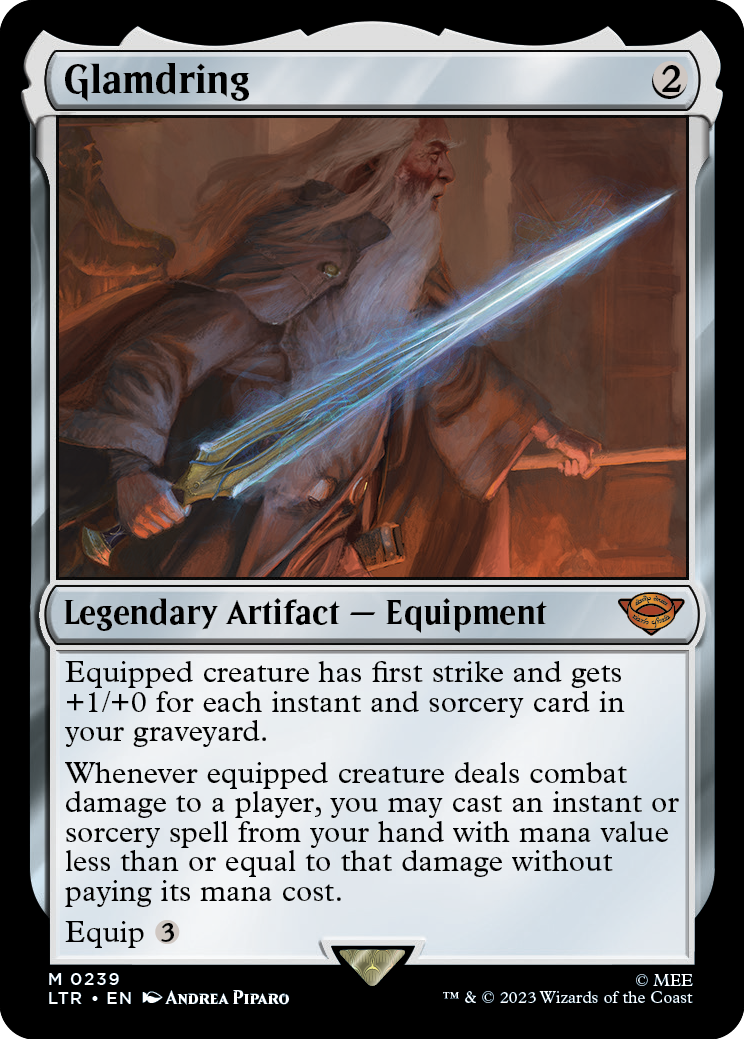
Glamdring
{2}
Legendary Artifact — Equipment
Equipped creature has first strike and gets +1/+0 for each instant and sorcery card in your graveyard.
Whenever equipped creature deals combat damage to a player, you may cast an instant or sorcery spell from your hand with mana value less than or equal to that damage without paying its mana cost.
Equip {3}
- If you cast a spell using Glamdring's triggered ability, you do so as part of the resolution of the ability. You can't wait to cast the spell later in the turn. Timing permissions based on the card's type are ignored.
- If you cast a spell "without paying its mana cost", you can't choose to cast it for any alternative costs. You can, however, pay additional costs, such as kicker costs. If the card has any mandatory additional costs, those must be paid to cast the spell.
- If the spell has {X} in its mana cost, you must choose 0 as the value of X.
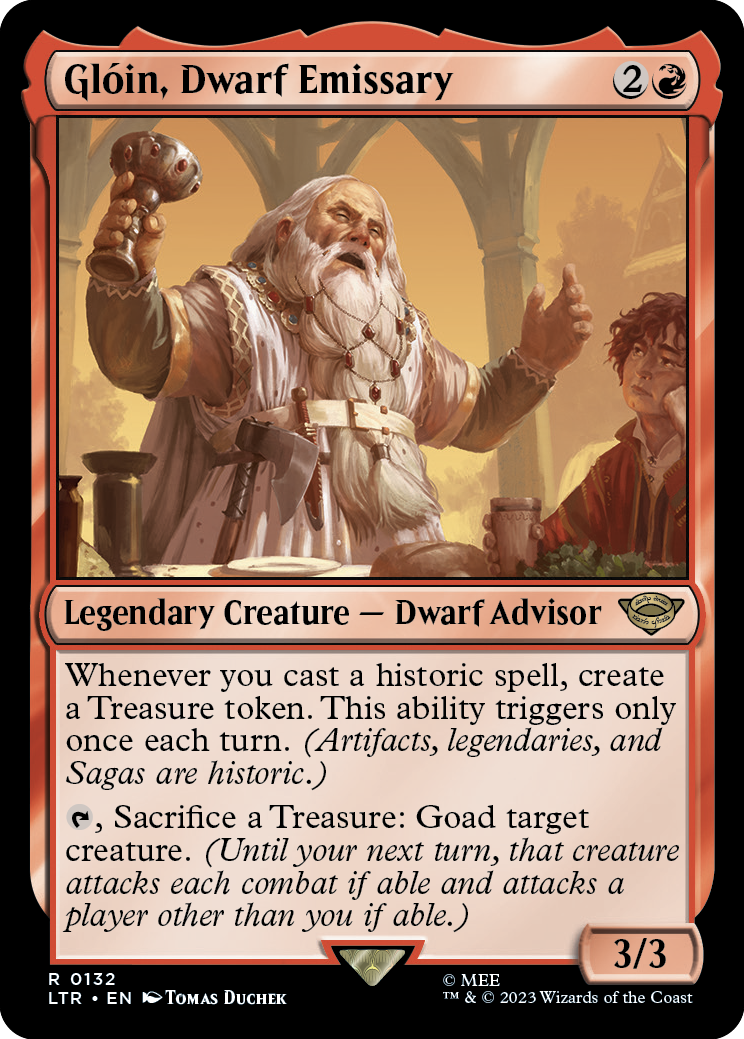
Glóin, Dwarf Emissary
{2}{R}
Legendary Creature — Dwarf Advisor
3/3
Whenever you cast a historic spell, create a Treasure token. This ability triggers only once each turn. (Artifacts, legendaries, and Sagas are historic.)
{T}, Sacrifice a Treasure: Goad target creature. (Until your next turn, that creature attacks each combat if able and attacks a player other than you if able.)
- If, during a player's declare attackers step, a creature that player controls that's been goaded is tapped, is affected by a spell or ability that says it can't attack, or hasn't been under that player's control continuously since the turn began (and doesn't have haste), then it doesn't attack. If there's a cost associated with having a creature attack a player, its controller isn't forced to pay that cost, so it doesn't have to attack that player.
- If the creature doesn't meet any of the above exceptions and can attack, it must attack a player other than the controller of the spell or ability that goaded it if able. If the creature can't attack any of those players but could otherwise attack, it must attack a planeswalker an opponent controls, a battle an opponent protects, or the player that goaded it.
- Being goaded isn't an ability the creature has. Once it's been goaded, it must attack as detailed above even if it loses all abilities.
- Attacking with a goaded creature doesn't cause it to stop being goaded. If there is an additional combat phase that turn, or if another player gains control of it before it stops being goaded, it must attack again if able.
- If a creature you control has been goaded by multiple opponents, it must attack one of your opponents that hasn't goaded it, as that fulfills the maximum number of goad requirements. If a creature you control has been goaded by each of your opponents, the creature must attack an opponent (rather than a planeswalker or battle), but you choose which opponent it attacks.
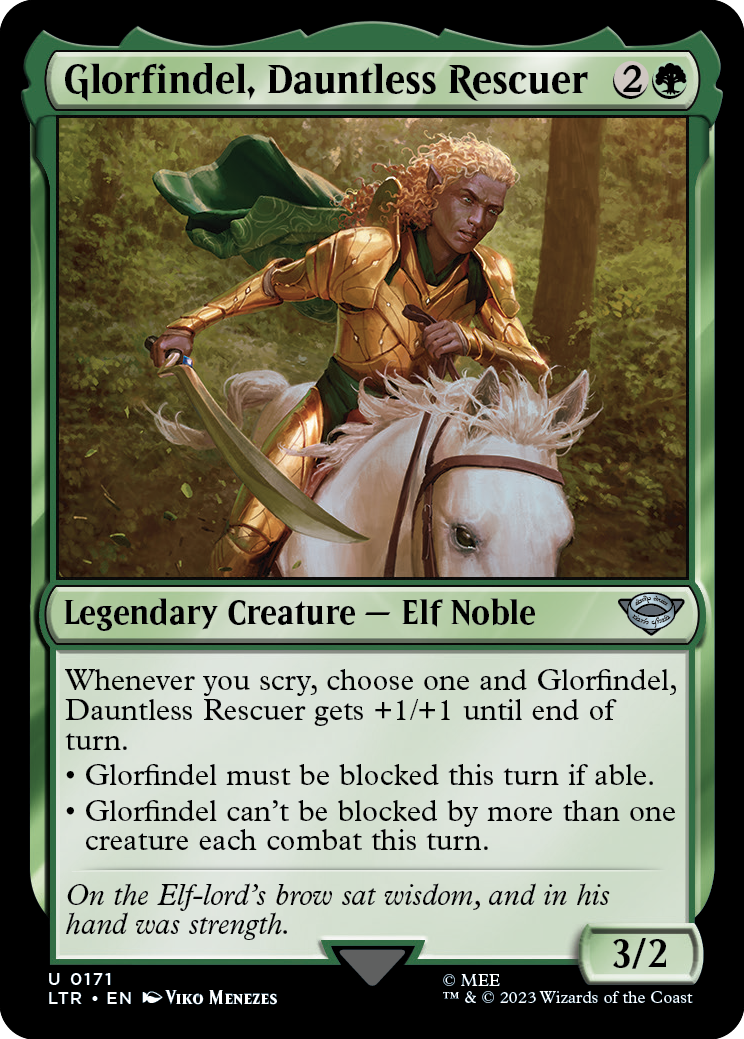
Glorfindel, Dauntless Rescuer
{2}{G}
Legendary Creature — Elf Noble
3/2
Whenever you scry, choose one and Glorfindel, Dauntless Rescuer gets +1/+1 until end of turn.
• Glorfindel must be blocked this turn if able.
• Glorfindel can't be blocked by more than one creature each combat this turn.
- If you choose the first mode for Glorfindel, Dauntless Rescuer's triggered ability, only one creature is required to block it. Other creatures may also block it (unless you've also chosen the second mode for Glorfindel, Dauntles Rescuer's triggered ability this turn) and are free to block other creatures or not block at all.
- If you choose the first mode for Glorfindel, Dauntless Rescuer's triggered ability but each creature the defending player controls can't block for any reason (such as being tapped), then Glorfindel, Dauntless Rescuer isn't blocked. If there's a cost associated with blocking Glorfindel, Dauntless Rescuer, the defending player isn't forced to pay that cost, so it doesn't have to be blocked in that case either.
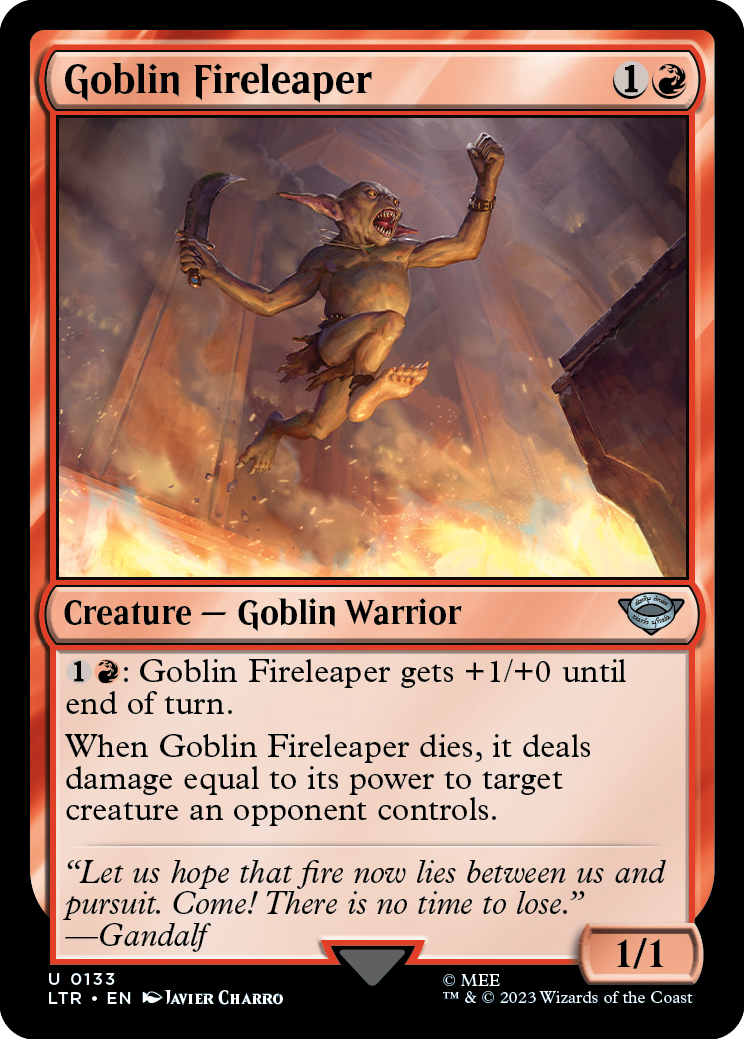
Goblin Fireleaper
{1}{R}
Creature — Goblin Warrior
1/1
{1}{R}: Goblin Fireleaper gets +1/+0 until end of turn.
When Goblin Fireleaper dies, it deals damage equal to its power to target creature an opponent controls.
- To determine the amount of damage it deals, use Goblin Fireleaper's power as it last existed on the battlefield, not its power in the graveyard.
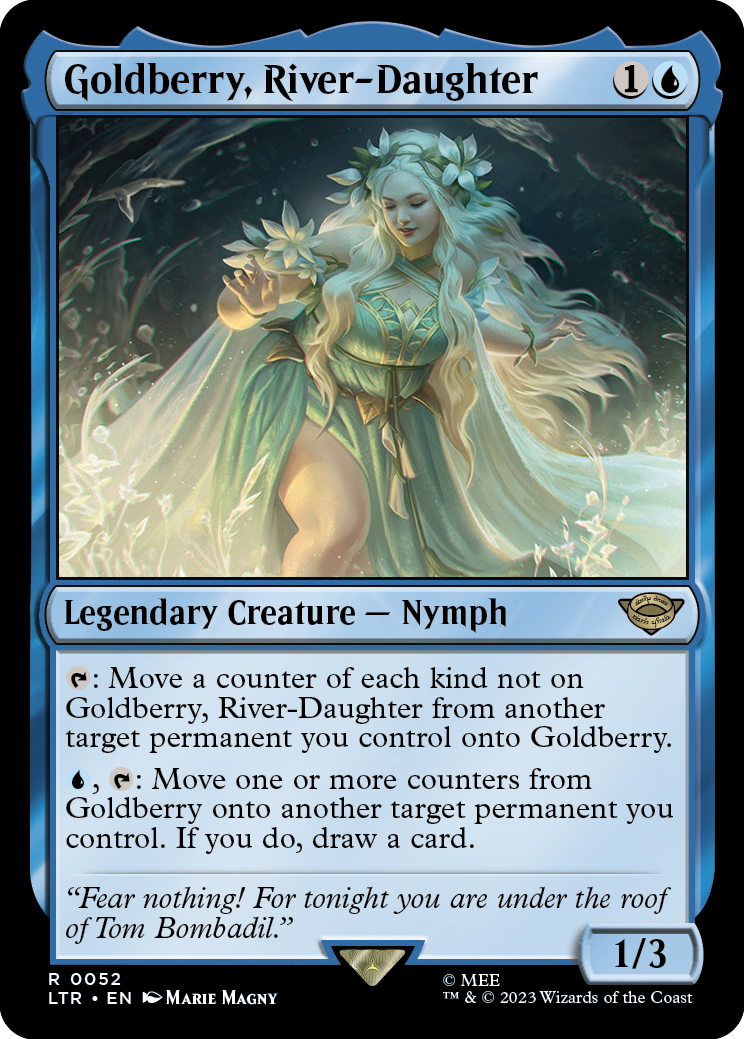
Goldberry, River-Daughter
{1}{U}
Legendary Creature — Nymph
1/3
{T}: Move a counter of each kind not on Goldberry, River-Daughter from another target permanent you control onto Goldberry.
{U}, {T}: Move one or more counters from Goldberry onto another target permanent you control. If you do, draw a card.
- To move a counter from one permanent to another, the counter is removed from the first permanent and put on the second. Any abilities that care about a counter being removed from or put onto a permanent will apply.
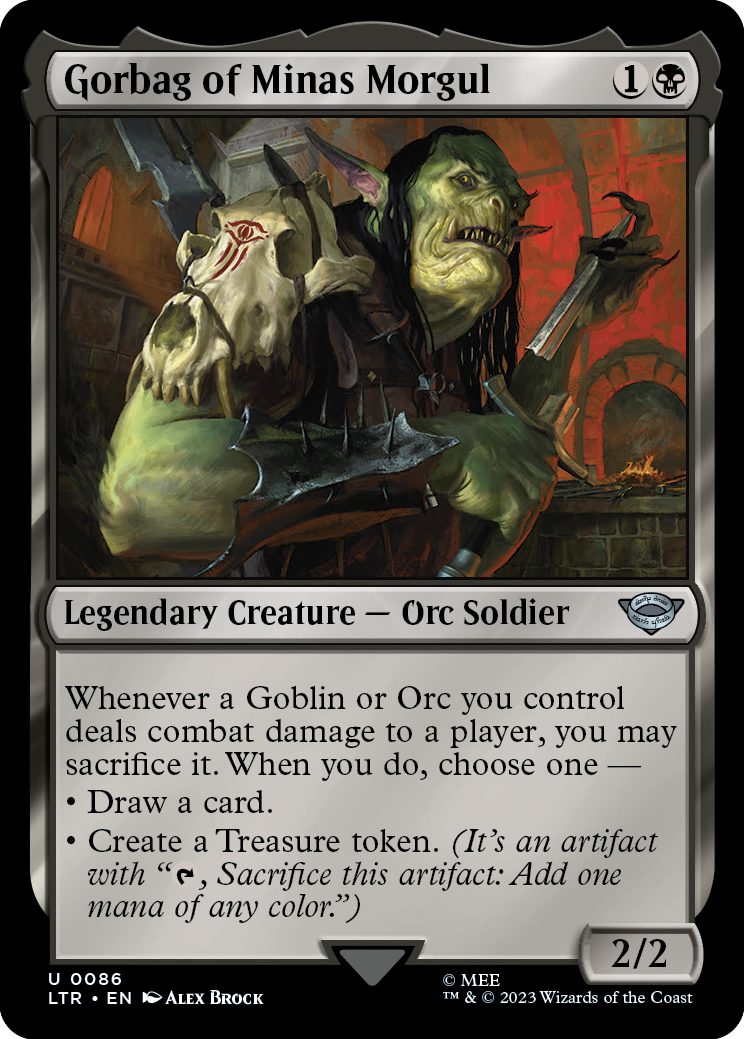
Gorbag of Minas Morgul
{1}{B}
Legendary Creature — Orc Soldier
2/2
Whenever a Goblin or Orc you control deals combat damage to a player, you may sacrifice it. When you do, choose one —
• Draw a card.
• Create a Treasure token. (It's an artifact with "{T}, Sacrifice this artifact: Add one mana of any color.")
- You don't choose a mode for Gorbag of Minas Morgul's ability at the time it triggers. Rather, a second "reflexive" ability triggers when you sacrifice a Goblin or Orc this way. You choose a mode for that ability as it goes on the stack. Each player may respond to this triggered ability as normal.
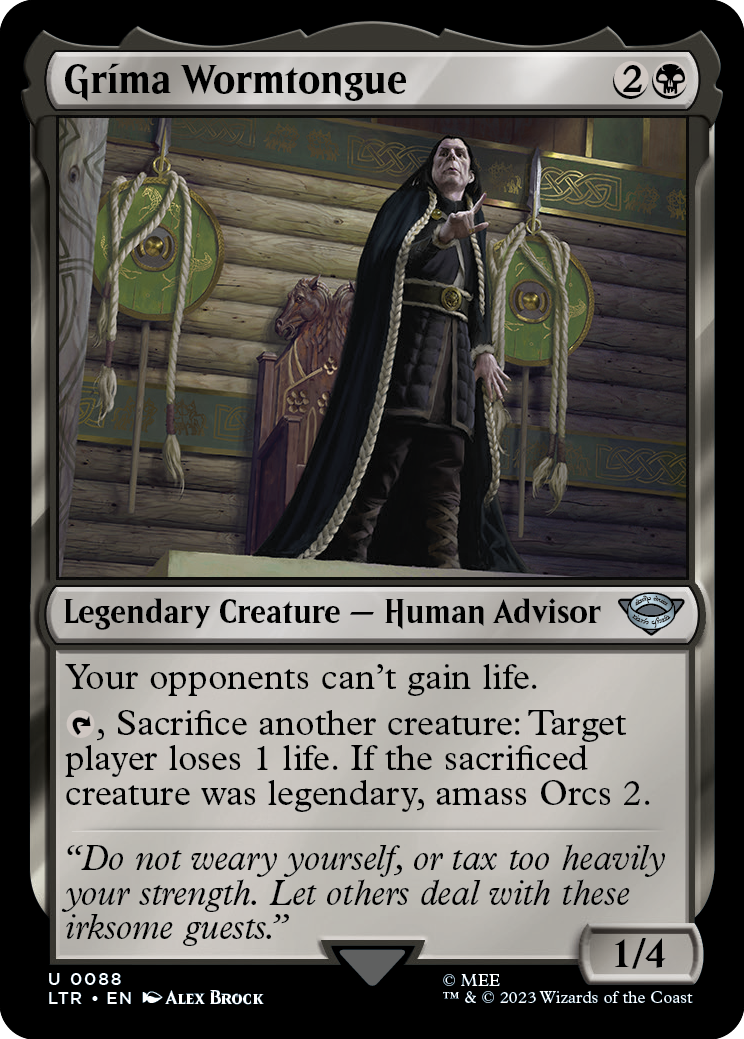
Gríma Wormtongue
{2}{B}
Legendary Creature — Human Advisor
1/4
Your opponents can't gain life.
{T}, Sacrifice another creature: Target player loses 1 life. If the sacrificed creature was legendary, amass Orcs 2.
- Spells and abilities that cause opponents to gain life still resolve while Gríma Wormtongue is on the battlefield. No opponent will gain life, but any other effects of that spell or ability will still happen.
- If an effect says to set an opponent's life total to a number that's higher than the opponent's current life total while Gríma Wormtongue is on the battlefield, the player's life total doesn't change.
- Gríma Wormtongue's activated ability checks whether the sacrificed creature was legendary as it last existed on the battlefield. It doesn't matter whether or not it's legendary in the graveyard.
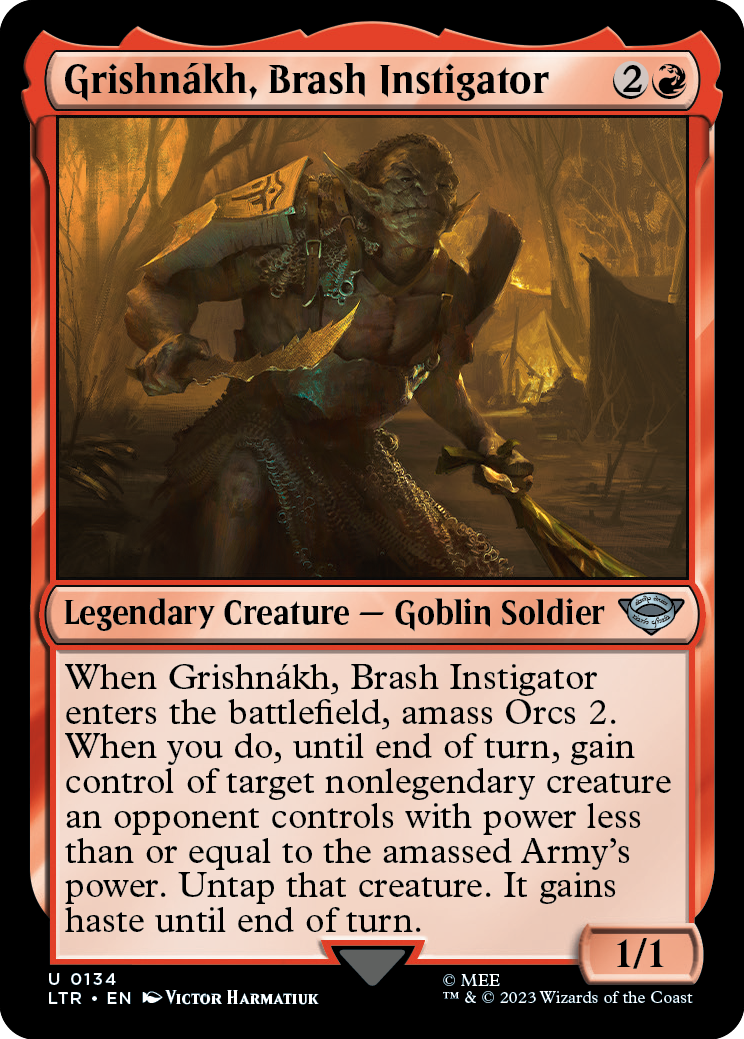
Grishnákh, Brash Instigator
{2}{R}
Legendary Creature — Goblin Soldier
1/1
When Grishnákh, Brash Instigator enters the battlefield, amass Orcs 2. When you do, until end of turn, gain control of target nonlegendary creature an opponent controls with power less than or equal to the amassed Army's power. Untap that creature. It gains haste until end of turn.
- You don't choose a target for Grishnákh, Brash Instigator's ability at the time it triggers. Rather, a second "reflexive" ability triggers when you amass Orcs this way. You choose a target for that ability as it goes on the stack. Each player may respond to this triggered ability as normal.
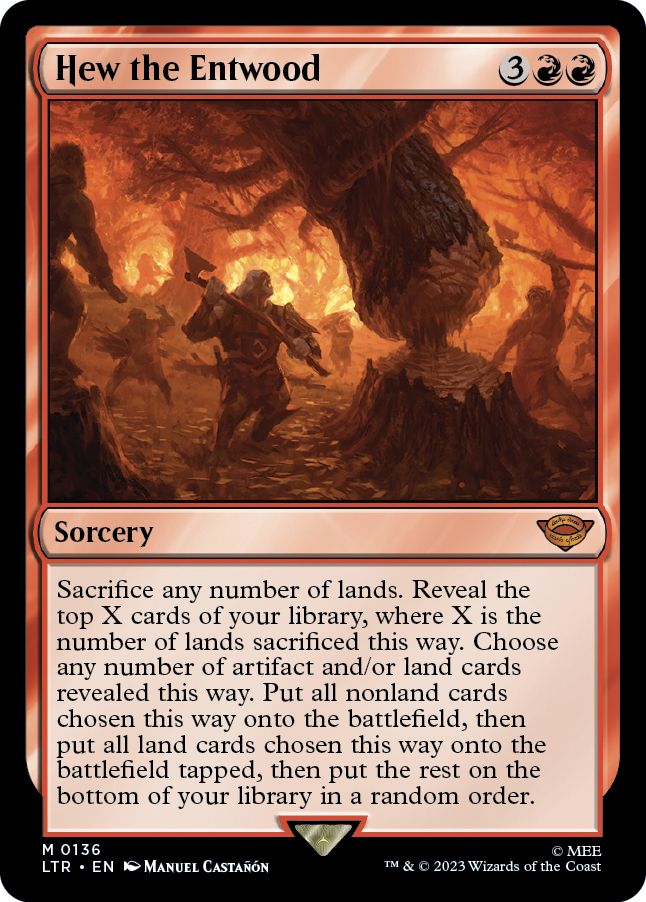
Hew the Entwood
{3}{R}{R}
Sorcery
Sacrifice any number of lands. Reveal the top X cards of your library, where X is the number of lands sacrificed this way. Choose any number of artifact and/or land cards revealed this way. Put all nonland cards chosen this way onto the battlefield, then put all land cards chosen this way onto the battlefield tapped, then put the rest on the bottom of your library in a random order.
- You sacrifice the lands as part of the resolution of Hew the Entwood. It isn't an additional cost. If Hew the Entwood is countered, you won't sacrifice any lands.
- Any abilities that trigger during the resolution of Hew the Entwood will wait to be put on the stack until everything is put on the battlefield and resolution is complete. The player whose turn it is puts their triggered abilities on the stack in any order, then each other player in turn order does the same. (The last ability put on the stack will be the first one to resolve.)
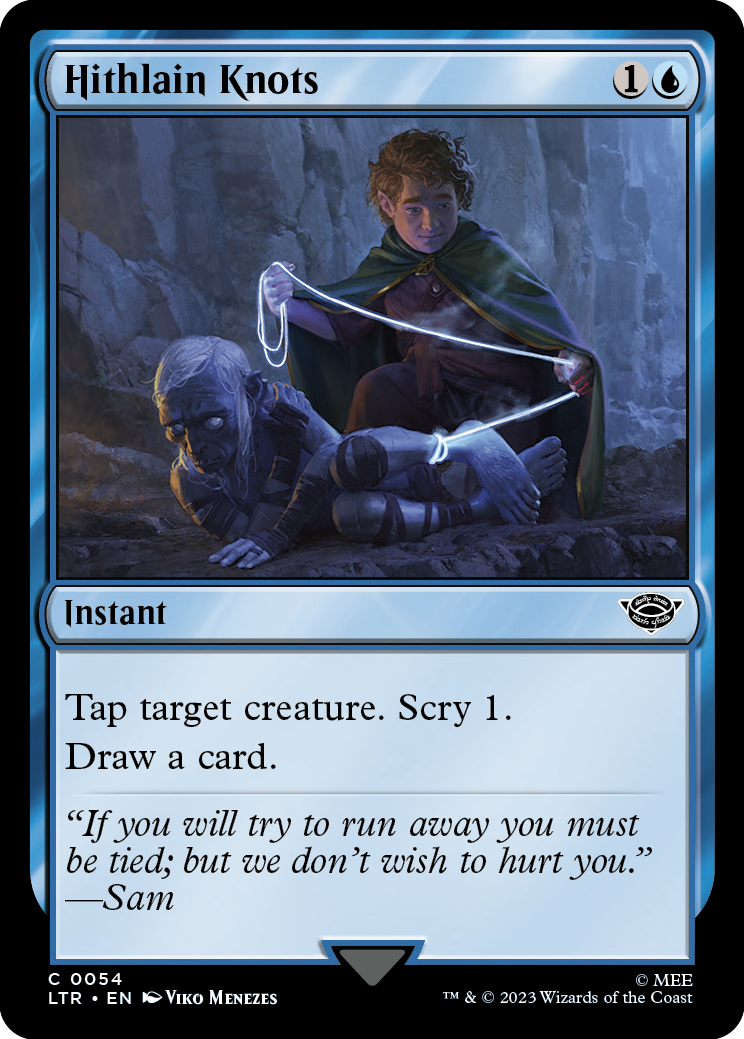
Hithlain Knots
{1}{U}
Instant
Tap target creature. Scry 1.
Draw a card.
- If the target creature is an illegal target by the time Hithlain Knots tries to resolve, the spell doesn't resolve. You won't scry 1, and you won't draw a card. However, if the target is legal but doesn't become tapped (most likely because it's already tapped), you do scry 1, and you do draw a card.
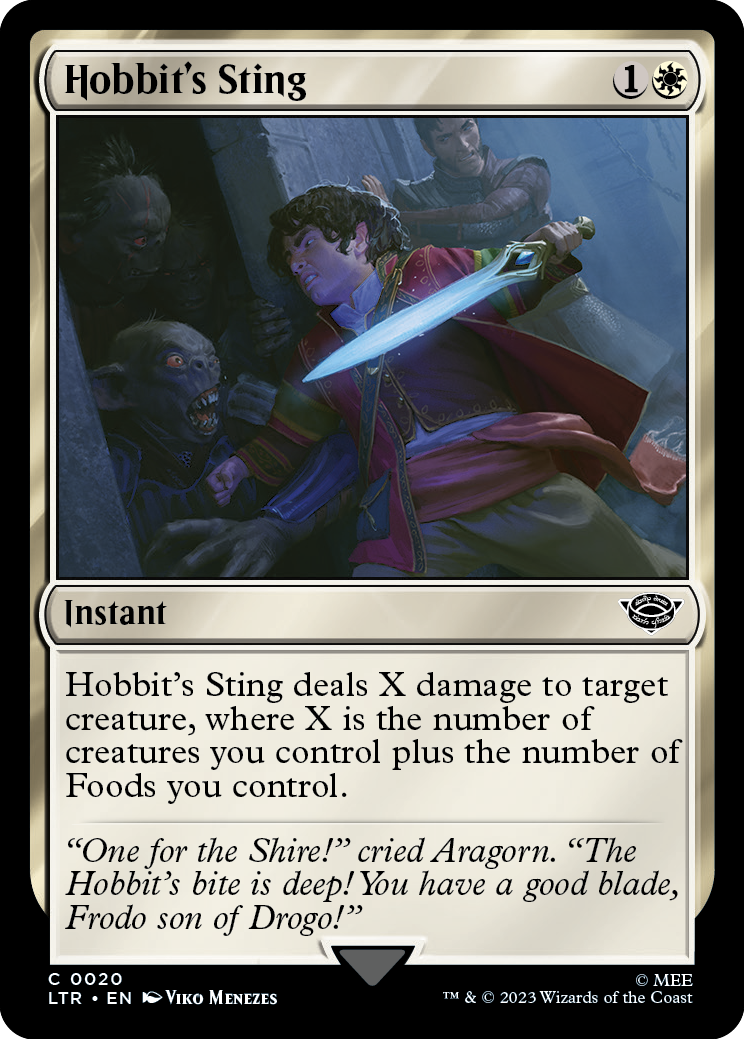
Hobbit's Sting
{1}{W}
Instant
Hobbit's Sting deals X damage to target creature, where X is the number of creatures you control plus the number of Foods you control.
- If a Food you control is also a creature, it will be counted twice.
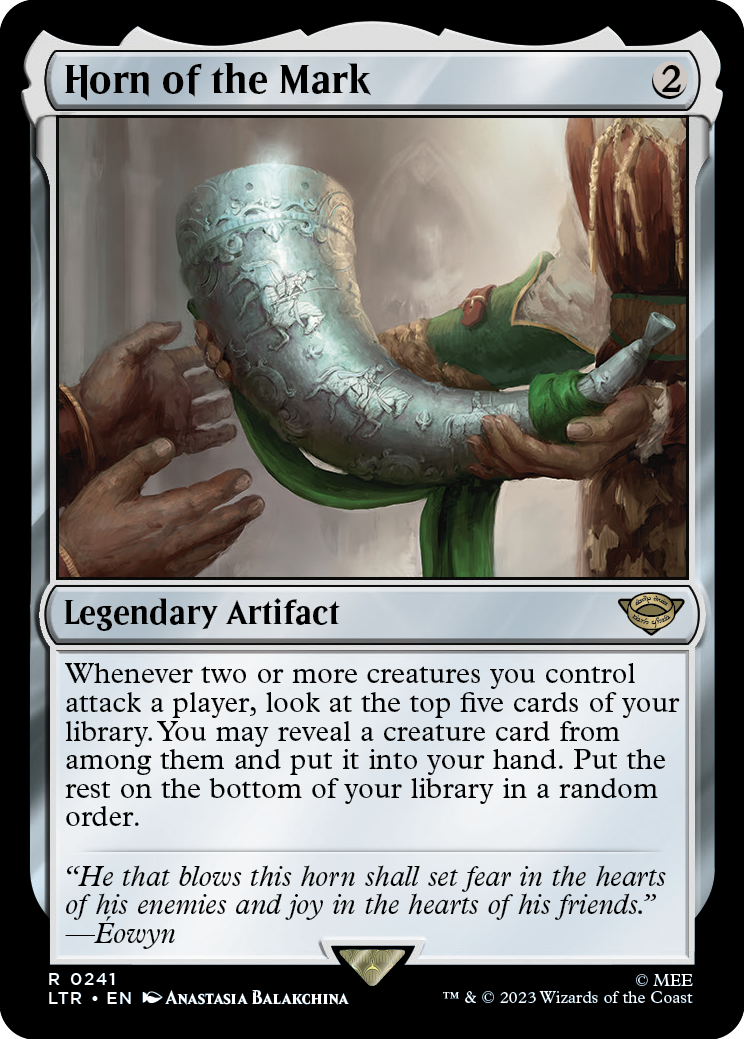
Horn of the Mark
{2}
Legendary Artifact
Whenever two or more creatures you control attack a player, look at the top five cards of your library. You may reveal a creature card from among them and put it into your hand. Put the rest on the bottom of your library in a random order.
- Two or more creatures you control must attack the same player in order for Horn of the Mark's ability to trigger. Creatures you control that attack planeswalkers that player controls or battles that player is protecting won't count toward Horn of the Mark's trigger condition.
- In a multiplayer game, Horn of the Mark's triggered ability triggers once for each player you attack with at least two creatures.
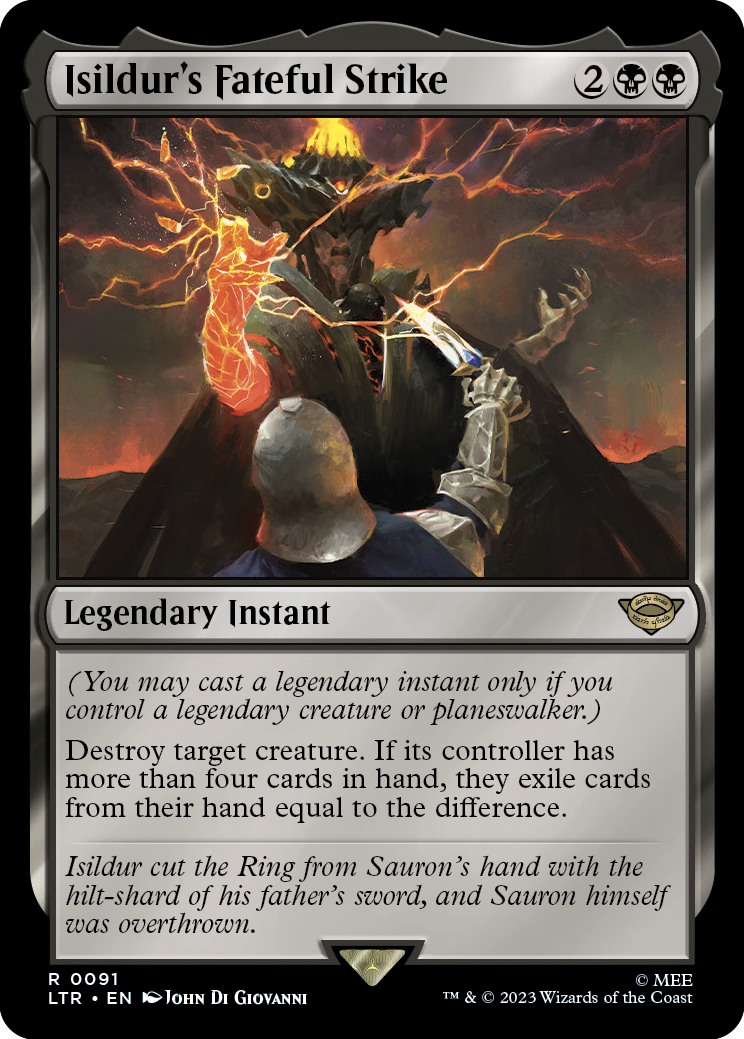
Isildur's Fateful Strike
{2}{B}{B}
Legendary Instant
(You may cast a legendary instant only if you control a legendary creature or planeswalker.)
Destroy target creature. If its controller has more than four cards in hand, they exile cards from their hand equal to the difference.
- Isildur's Fateful Strike is the first legendary instant. It is subject to the same casting restrictions as existing legendary sorceries, as listed in the following rulings.
- You can't cast a legendary instant unless you control a legendary creature or a legendary planeswalker. Once you begin to cast a legendary instant, losing control of your legendary creatures and planeswalkers won't affect that spell.
- Other than the casting restriction, the legendary supertype on an instant carries no additional rules. You may cast any number of legendary instants in a turn, and your deck may contain any number of legendary cards (but no more than four of any with the same name).
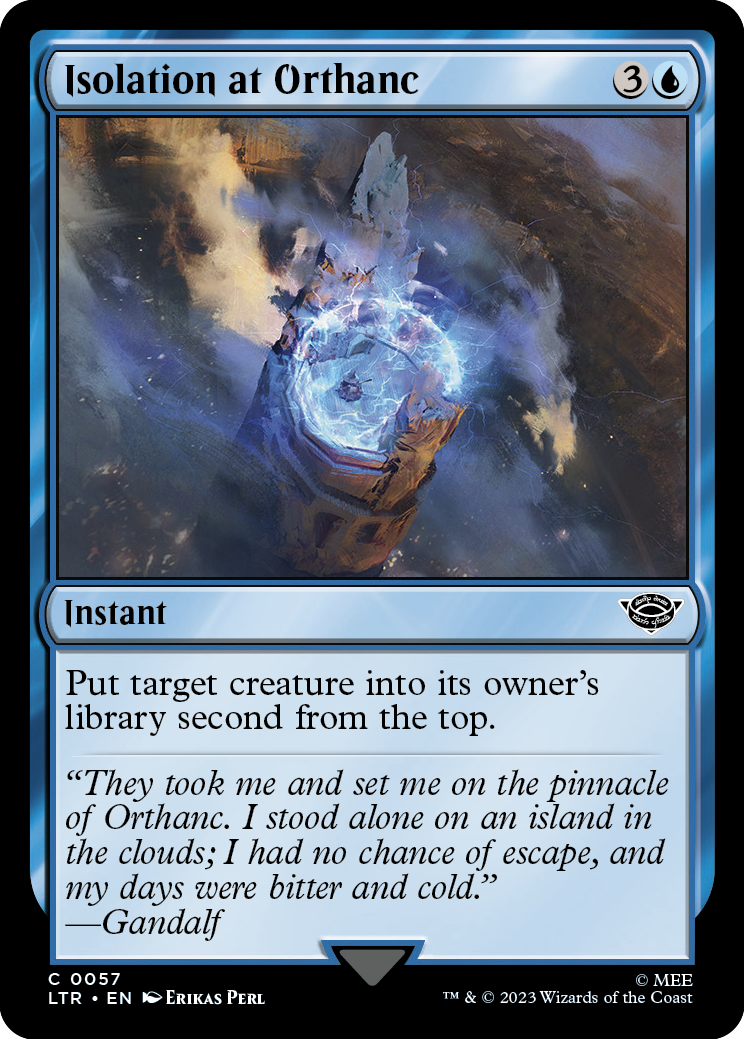
Isolation at Orthanc
{3}{U}
Instant
Put target creature into its owner's library second from the top.
- If the target creature's controller has zero cards left in their library when Isolation at Orthanc resolves, that creature becomes the top card of their library.
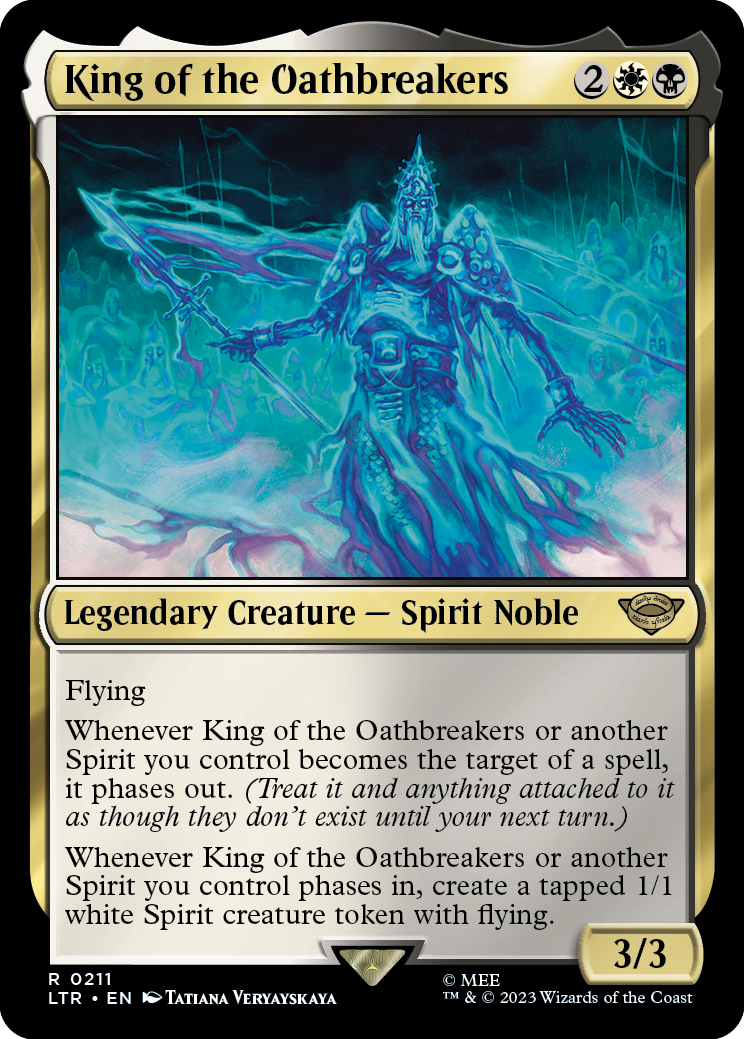
King of the Oathbreakers
{2}{W}{B}
Legendary Creature — Spirit Noble
3/3
Flying
Whenever King of the Oathbreakers or another Spirit you control becomes the target of a spell, it phases out. (Treat it and anything attached to it as though they don't exist until your next turn.)
Whenever King of the Oathbreakers or another Spirit you control phases in, create a tapped 1/1 white Spirit creature token with flying.
- If a spell an opponent controls targets multiple Spirits you control, King of the Oathbreakers's triggered ability will trigger once for each of those Spirits.
- Phased-out permanents are treated as though they don't exist. They can't be the target of spells or abilities, their static abilities have no effect on the game, their triggered abilities can't trigger, they can't attack or block, and so on.
- A phased-out token will phase in at the beginning of its controller's untap step just like a nontoken permanent would.
- As a creature is phased out, Auras and Equipment attached to it also phase out at the same time. Those Auras and Equipment will phase in at the same time that creature does, and they'll phase in still attached to that creature.
- Permanents phase back in during their controller's untap step, immediately before that player untaps their permanents. Creatures that phase in this way are able to attack and pay a cost of {T} during that turn. If a permanent had counters on it when it phased out, it will have those counters when it phases back in.
- If King of the Oathbreakers phases in at the same time as one or more other Spirits you control, King of the Oathbreakers's last ability will trigger for each of them.
- An attacking or blocking creature that phases out is removed from combat.
- Phasing out doesn't cause any "leaves the battlefield" abilities to trigger. Similarly, phasing in won't cause any "enters the battlefield" abilities to trigger.
- Any continuous effects with a "for as long as" duration, such as that of Rangers of Ithilien, ignore phased-out objects. If ignoring those objects causes the effect's conditions to no longer be met, the duration will expire.
- Choices made for permanents as they entered the battlefield are remembered even after they phase in.
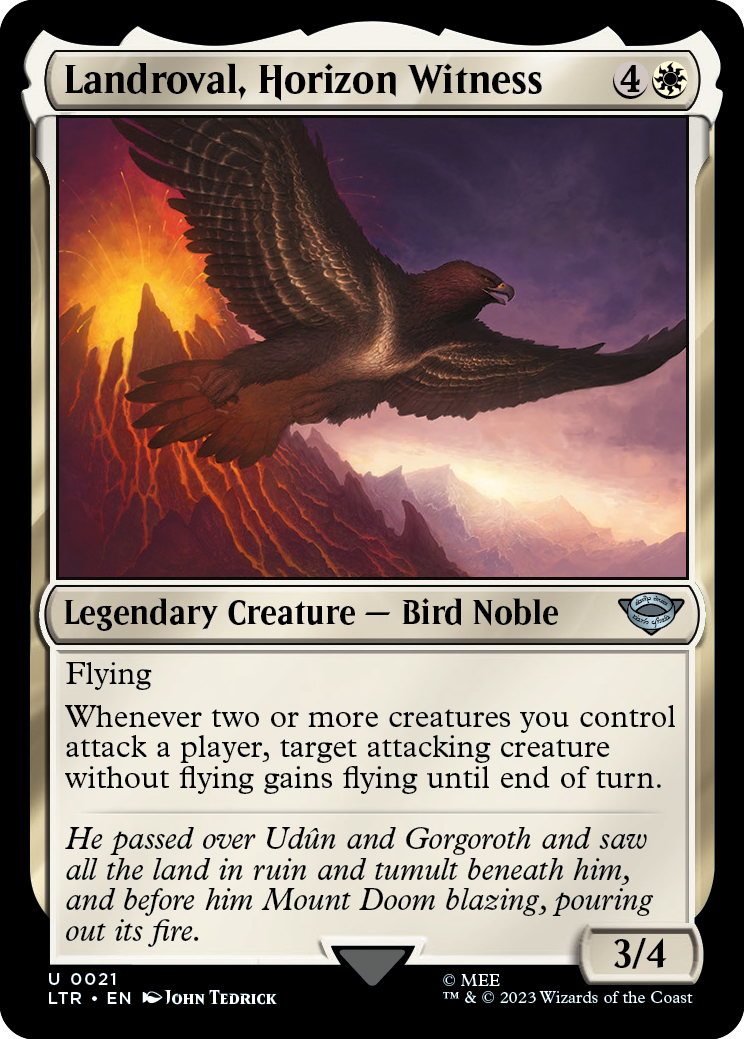
Landroval, Horizon Witness
{4}{W}
Legendary Creature — Bird Noble
3/4
Flying
Whenever two or more creatures you control attack a player, target attacking creature without flying gains flying until end of turn.
- Two or more creatures you control must attack the same player in order for Landroval, Horizon Witness's ability to trigger. Creatures you control that attack planeswalkers that player controls or battles that player is protecting won't count toward Landroval, Horizon Witness's trigger condition.
- In a multiplayer game, Landroval, Horizon Witness's triggered ability triggers once for each player you attack with at least two creatures.
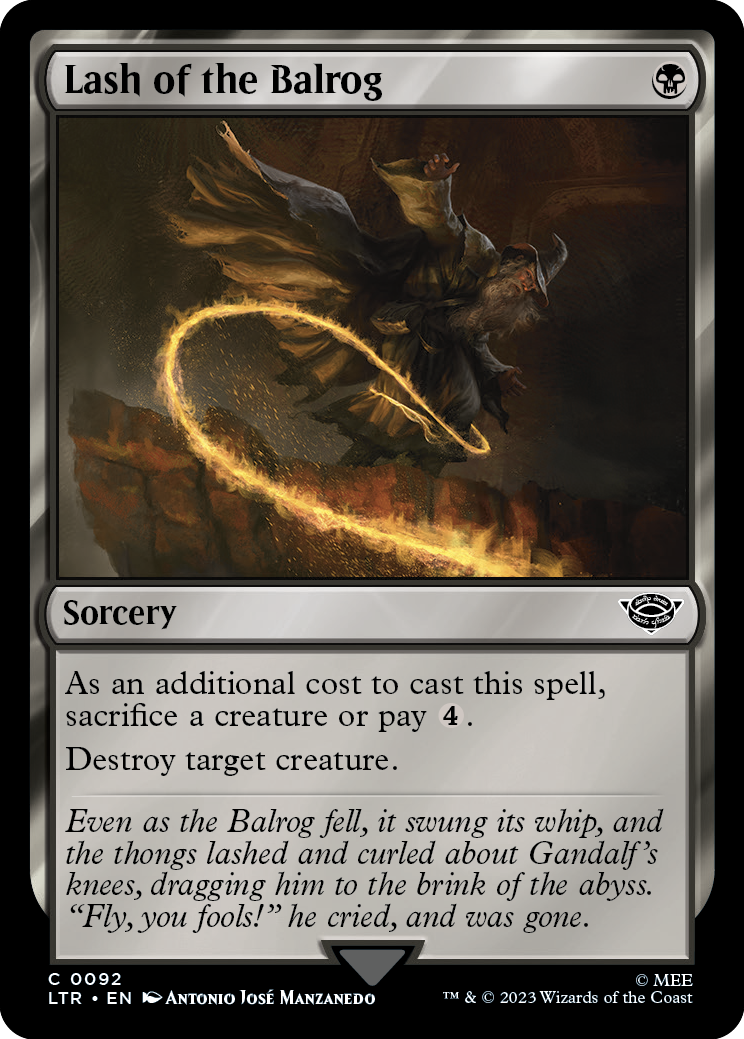
Lash of the Balrog
{B}
Sorcery
As an additional cost to cast this spell, sacrifice a creature or pay {4}.
Destroy target creature.
- You must sacrifice exactly one creature or pay an extra {4} to cast this spell; you can't cast it without paying one of those costs, and you can't pay either multiple times.
- Players can respond to Lash of the Balrog only after it's been cast and all its costs have been paid. No one can try to destroy the creature you sacrificed to stop you from casting this spell or to make it cost more mana.
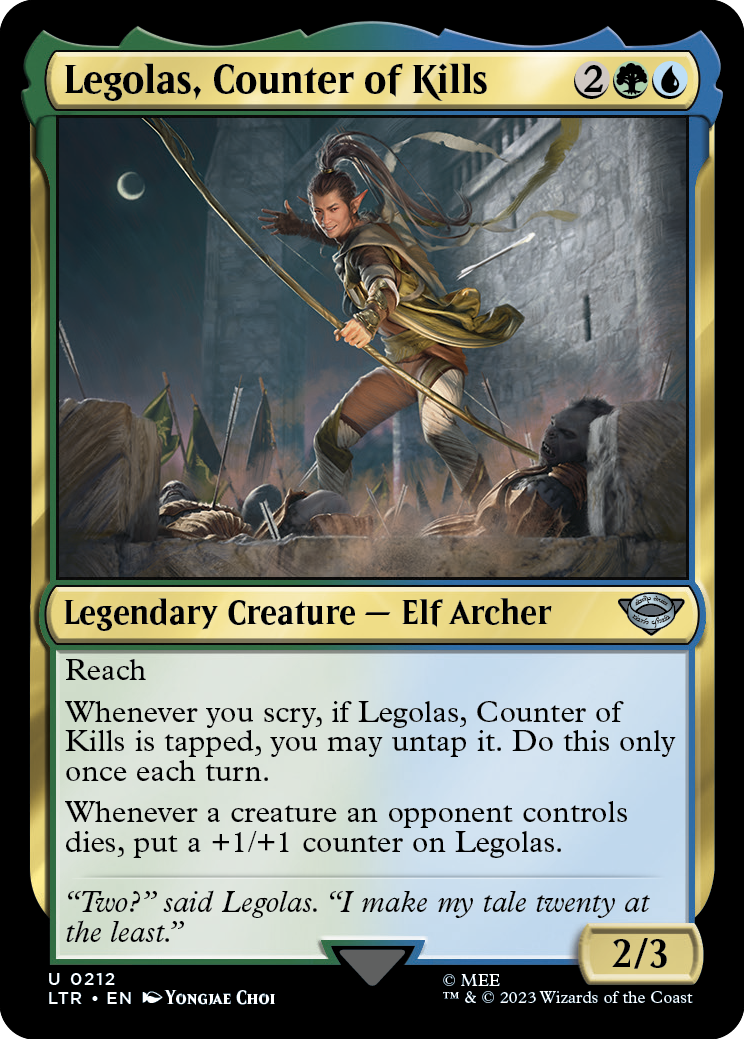
Legolas, Counter of Kills
{2}{G}{U}
Legendary Creature — Elf Archer
2/3
Reach
Whenever you scry, if Legolas, Counter of Kills is tapped, you may untap it. Do this only once each turn.
Whenever a creature an opponent controls dies, put a +1/+1 counter on Legolas.
- "Do this only once each turn" lets you choose whether or not to untap Legolas as the triggered ability resolves. If you don't untap it, the ability will trigger again the next time the condition is met. Once you choose to do so, the ability will no longer trigger for the rest of the turn.
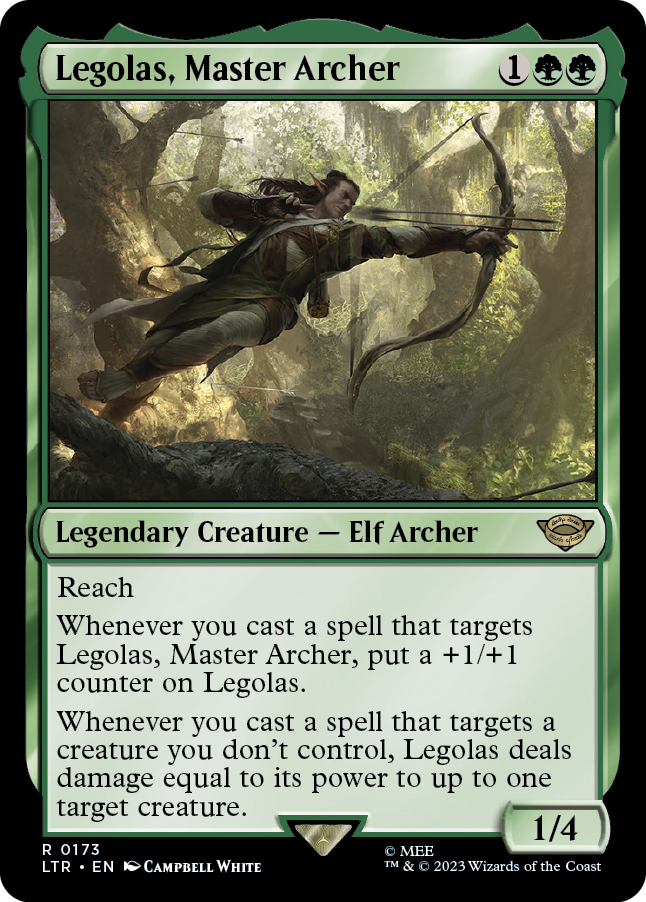
Legolas, Master Archer
{1}{G}{G}
Legendary Creature — Elf Archer
1/4
Reach
Whenever you cast a spell that targets Legolas, Master Archer, put a +1/+1 counter on Legolas.
Whenever you cast a spell that targets a creature you don't control, Legolas deals damage equal to its power to up to one target creature.
- Legolas, Master Archer's triggered abilities resolve before the spells that caused them to trigger. They resolve even if those spells are countered.
- Legolas, Master Archer's last ability triggers when you cast a spell that has multiple targets as long as at least one of those targets is a creature you don't control. It doesn't trigger multiple times if you cast a spell that targets a creature you don't control multiple times or that targets multiple creatures you don't control.
- If you cast a spell that targets Legolas, Master Archer and at least one creature you don't control, both of Legolas, Master Archer's abilities will trigger. You choose the order in which those triggers go on the stack.
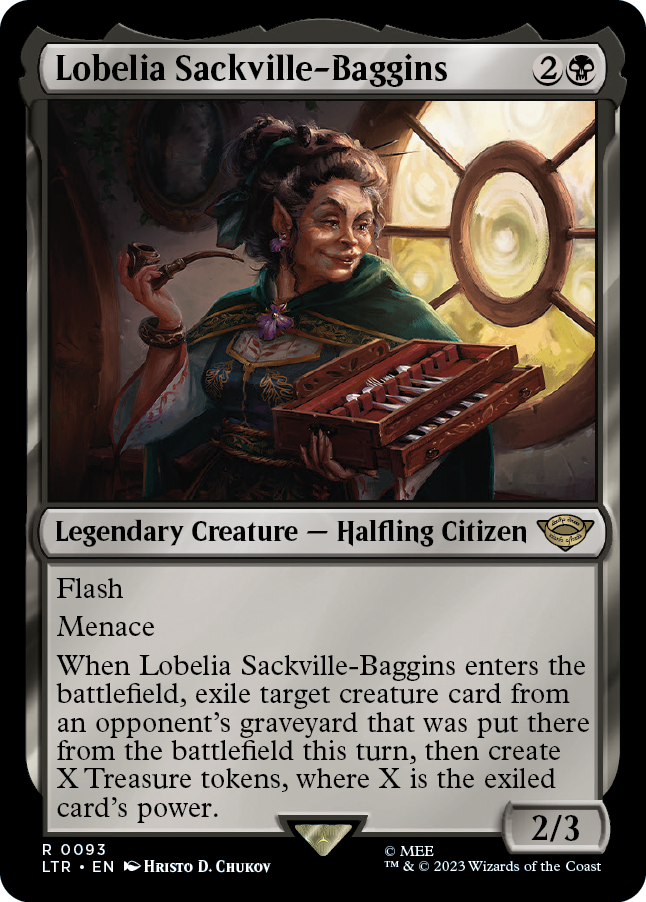
Lobelia Sackville-Baggins
{2}{B}
Legendary Creature — Halfling Citizen
2/3
Flash
Menace
When Lobelia Sackville-Baggins enters the battlefield, exile target creature card from an opponent's graveyard that was put there from the battlefield this turn, then create X Treasure tokens, where X is the exiled card's power.
- Use the card's power as it last existed in the graveyard to determine the value of X.
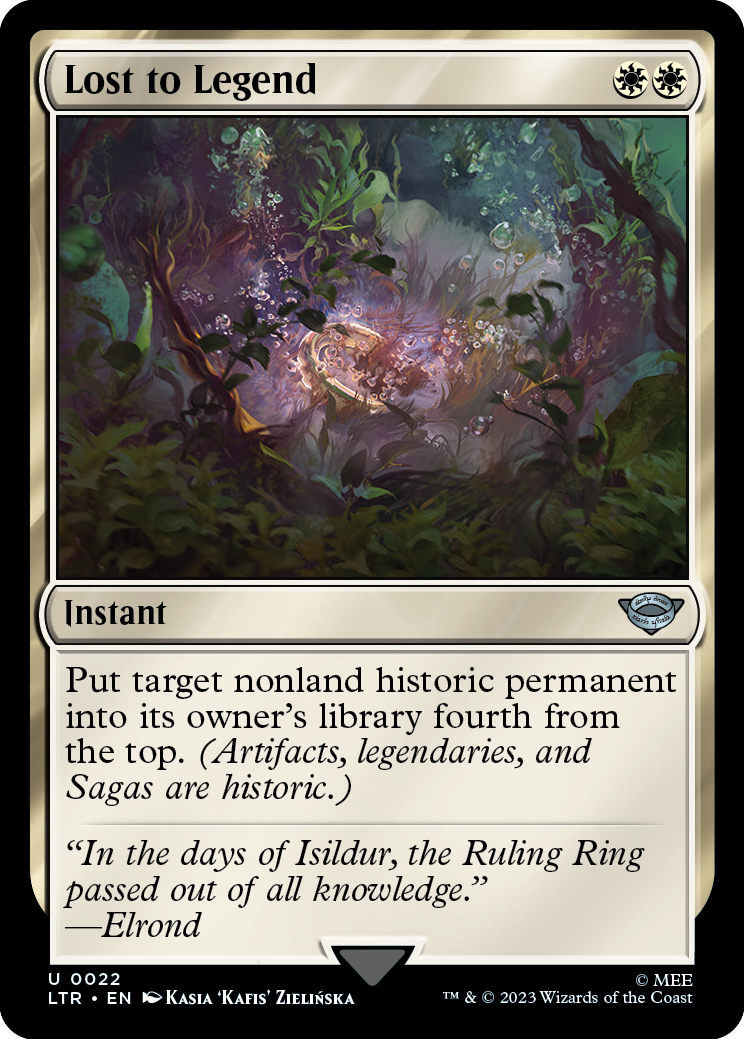
Lost to Legend
{W}{W}
Instant
Put target nonland historic permanent into its owner's library fourth from the top. (Artifacts, legendaries, and Sagas are historic.)
- If the target permanent's controller has two or fewer cards left in their library when Lost to Legend resolves, that permanent becomes the bottom card of their library.
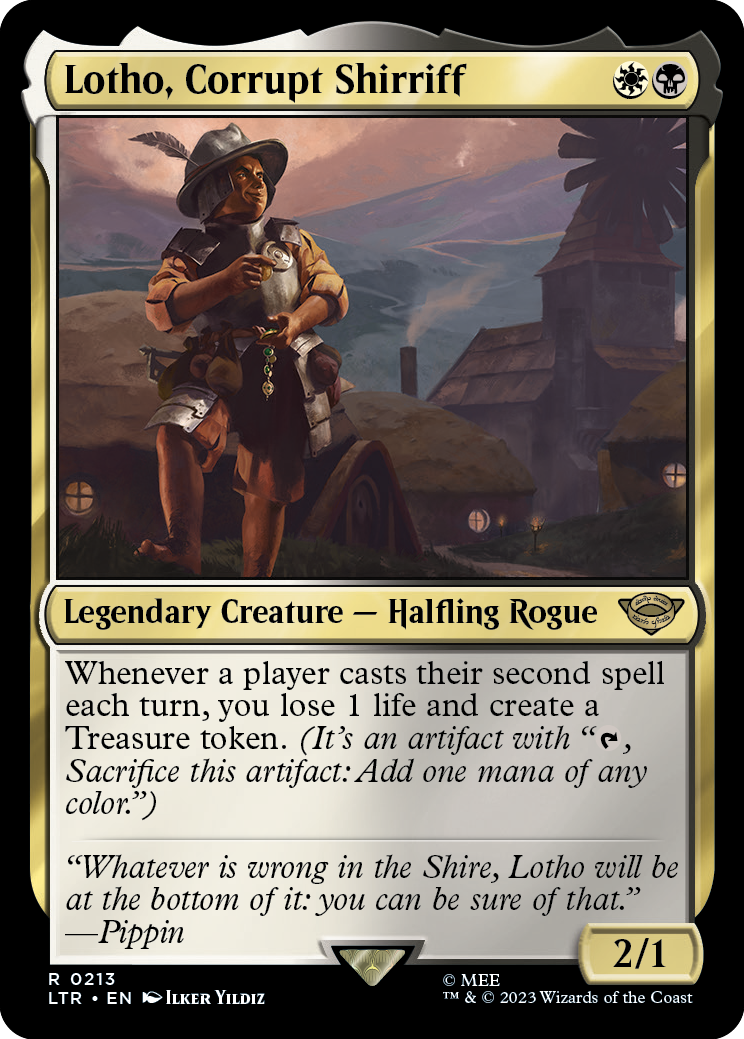
Lotho, Corrupt Shirriff
{W}{B}
Legendary Creature — Halfling Rogue
2/1
Whenever a player casts their second spell each turn, you lose 1 life and create a Treasure token. (It's an artifact with "{T}, Sacrifice this artifact: Add one mana of any color.")
- Spells that were cast before Lotho, Corrupt Shirriff count. If Lotho, Corrupt Shirriff was the first spell you cast this turn, the next spell you cast this turn is your second spell.
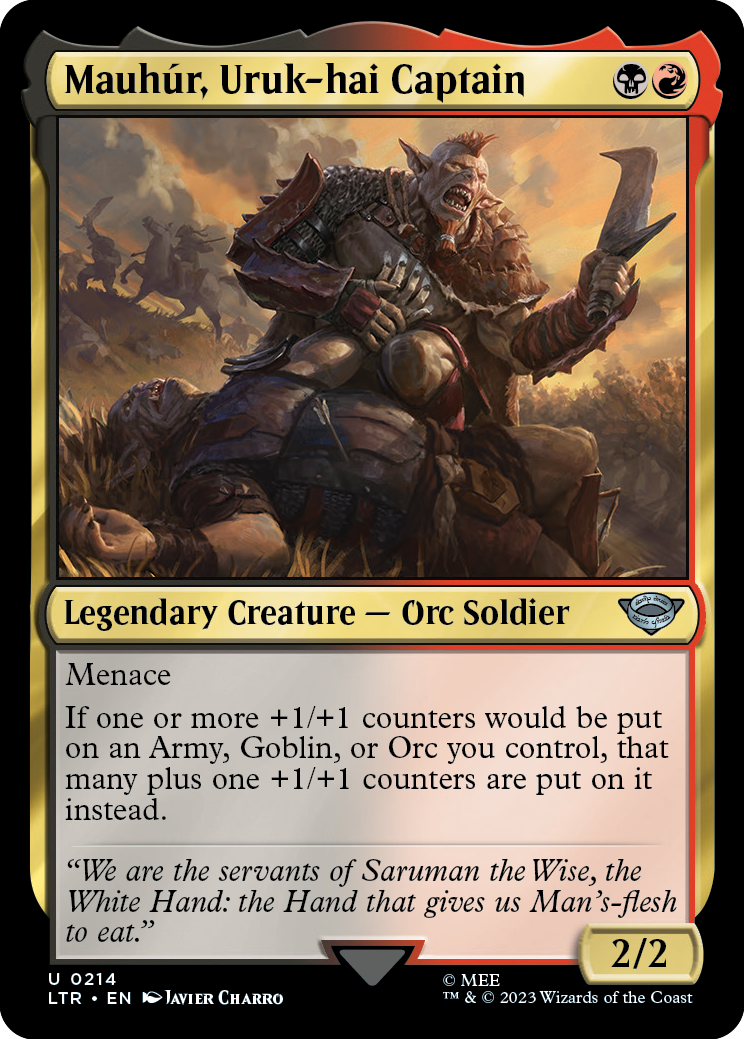
Mauhúr, Uruk-hai Captain
{B}{R}
Legendary Creature — Orc Soldier
2/2
Menace
If one or more +1/+1 counters would be put on an Army, Goblin, or Orc you control, that many plus one +1/+1 counters are put on it instead.
- Mauhúr's last ability applies to counters placed on Army tokens when you amass Orcs (or Zombies, or anything else.)
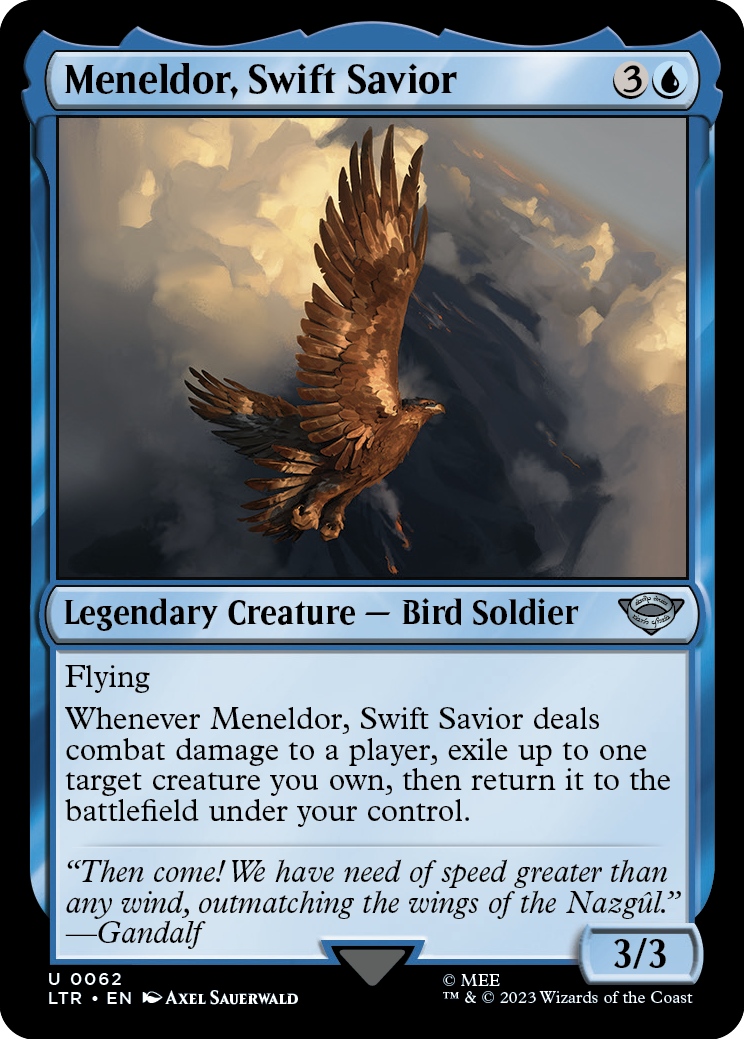
Meneldor, Swift Savior
{3}{U}
Legendary Creature — Bird Soldier
3/3
Flying
Whenever Meneldor, Swift Savior deals combat damage to a player, exile up to one target creature you own, then return it to the battlefield under your control.
- Meneldor's second ability can target any permanent you own, including those another player controls.
- Once the exiled permanent returns, it's considered a new object with no relation to the object that it was. Auras attached to the exiled permanent will be put into their owners' graveyards. Equipment attached to the exiled permanent will become unattached and remain on the battlefield. Any counters on the exiled permanent will cease to exist.
- If a token is exiled this way, it will cease to exist and won't return to the battlefield.
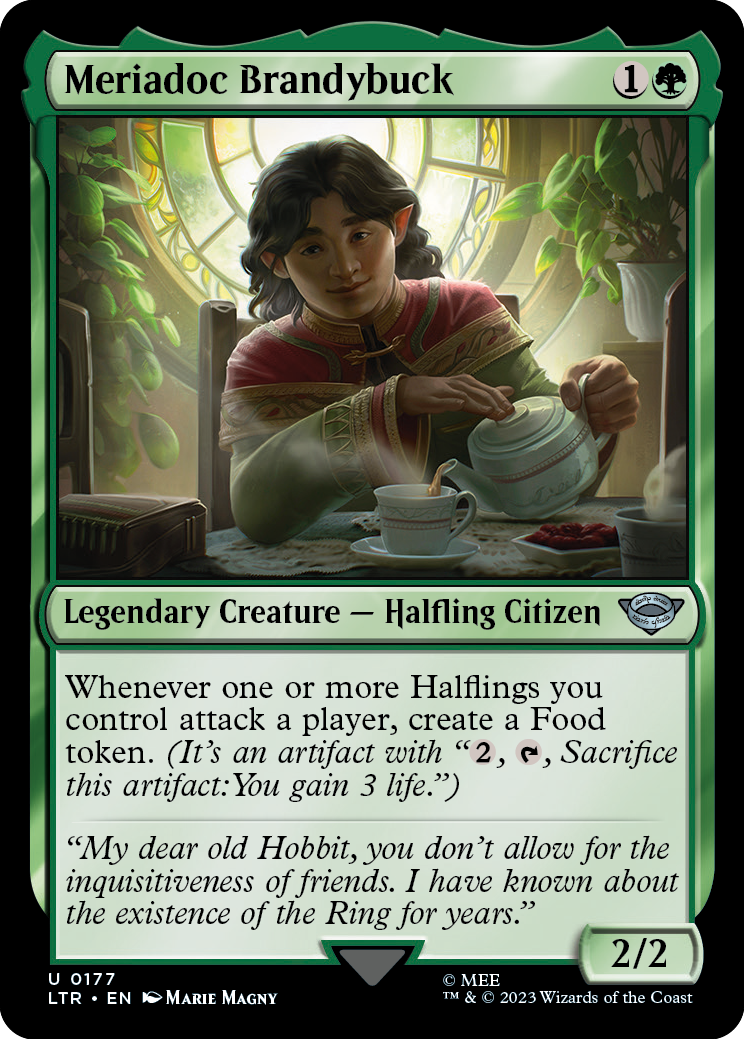
Meriadoc Brandybuck
{1}{G}
Legendary Creature — Halfling Citizen
2/2
Whenever one or more Halflings you control attack a player, create a Food token. (It's an artifact with "{2}, {T}, Sacrifice this artifact: You gain 3 life.")
- Meriadoc Brandybuck's ability has you create just one Food token per player you attack with a Halfling, no matter how many Halflings you attack them with beyond the first.
- Halflings attacking a planeswalker or battle won't cause Meriadoc Brandybuck's ability to trigger.
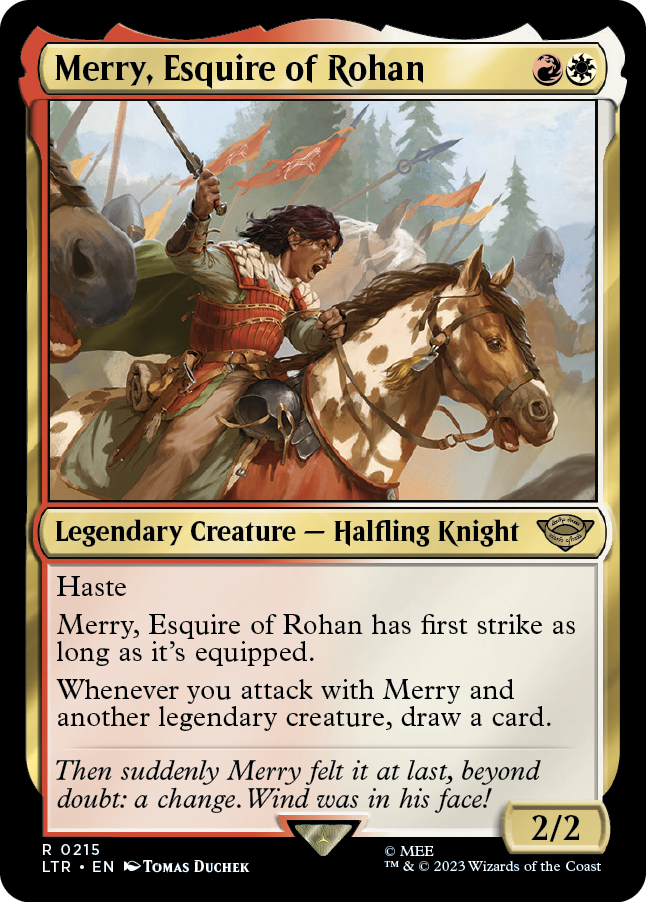
Merry, Esquire of Rohan
{R}{W}
Legendary Creature — Halfling Knight
2/2
Haste
Merry, Esquire of Rohan has first strike as long as it's equipped.
Whenever you attack with Merry and another legendary creature, draw a card.
- Merry and the other attacking legendary creature don't have to be attacking the same player, planeswalker, or battle.
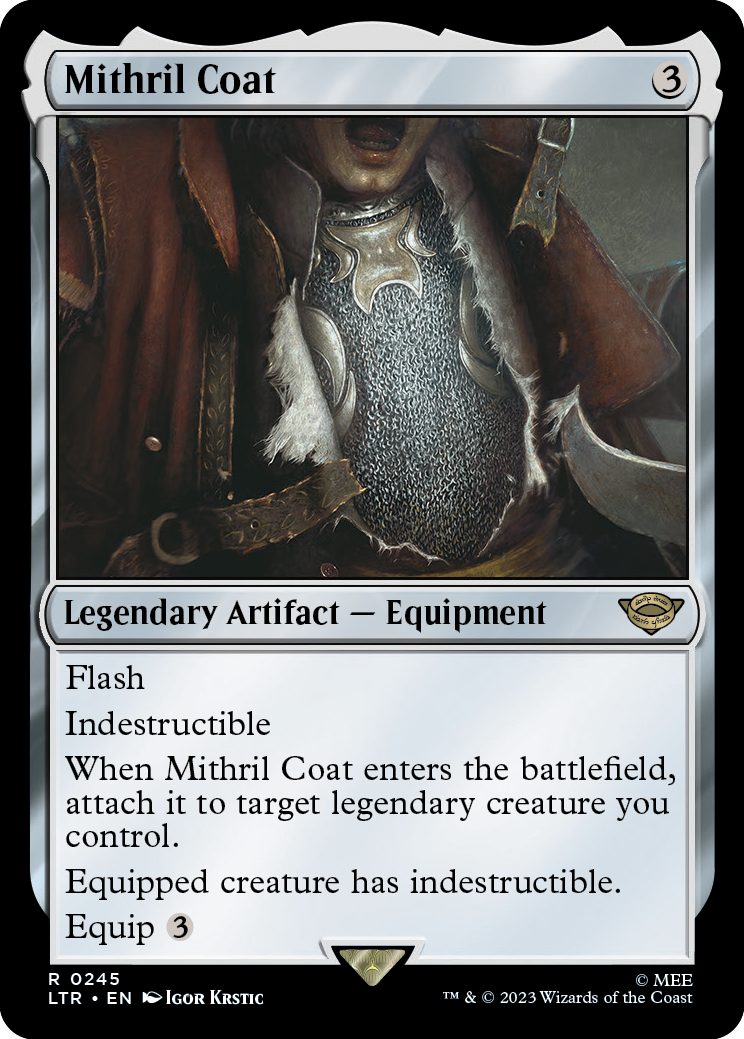
Mithril Coat
{3}
Legendary Artifact — Equipment
Flash
Indestructible
When Mithril Coat enters the battlefield, attach it to target legendary creature you control.
Equipped creature has indestructible.
Equip {3}
- Attaching an Equipment with its enters-the-battlefield triggered ability isn't the same as using its equip ability. You don't pay mana for the attachment, and the timing restrictions for equip abilities don't apply.
- If the target creature becomes an illegal target, the Equipment remains on the battlefield unattached.
- Mithril Coat doesn't enter the battlefield attached to a creature. Instead, the Equipment enters the battlefield and then a triggered ability attaches it to a creature. You may cast Mithril Coat even if you don't control any creatures.
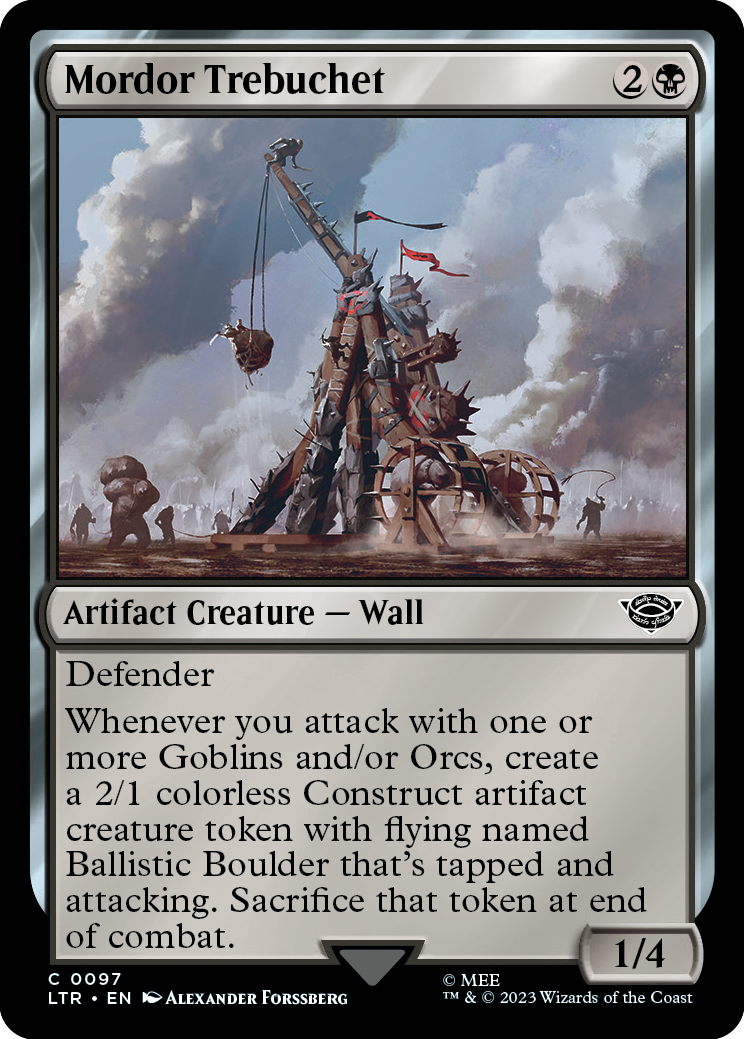
Mordor Trebuchet
{2}{B}
Artifact Creature — Wall
1/4
Defender
Whenever you attack with one or more Goblins and/or Orcs, create a 2/1 colorless Construct artifact creature token with flying named Ballistic Boulder that's tapped and attacking. Sacrifice that token at end of combat.
- Mordor Trebuchet's controller chooses which player, planeswalker, or battle the token is attacking. It doesn't need to be the same player, planeswalker, or battle that any of the Goblins and/or Orcs are attacking.
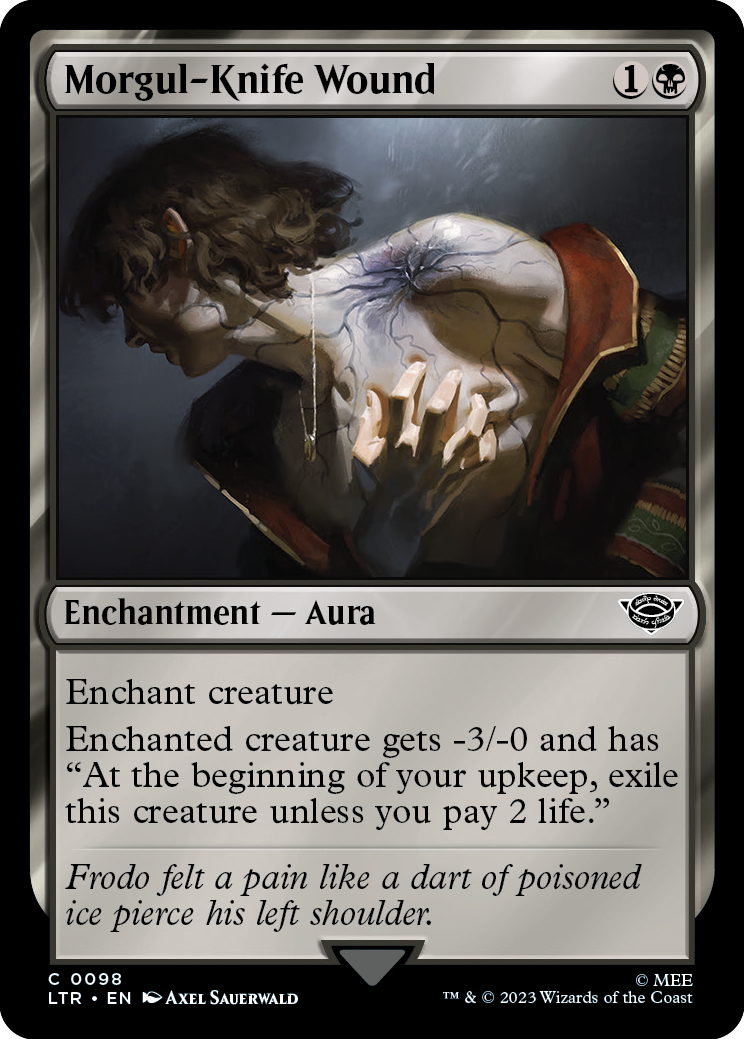
Morgul-Knife Wound
{1}{B}
Enchantment — Aura
Enchant creature
Enchanted creature gets -3/-0 and has "At the beginning of your upkeep, exile this creature unless you pay 2 life."
- The creature's controller chooses whether or not to pay 2 life as the triggered ability resolves.
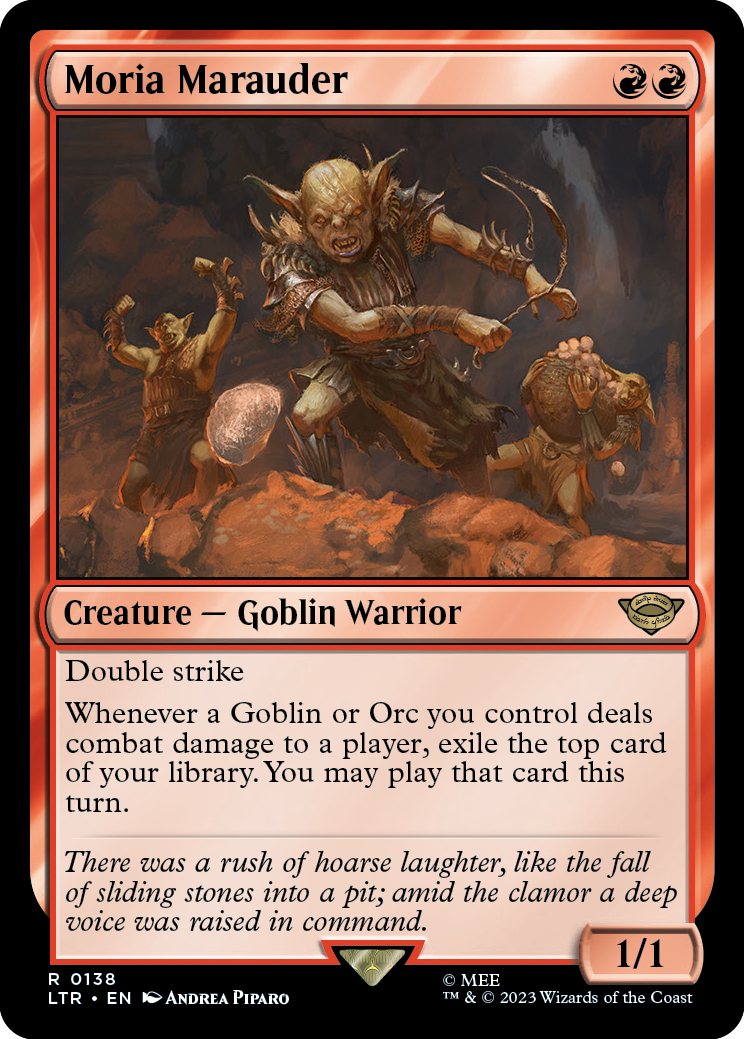
Moria Marauder
{R}{R}
Creature — Goblin Warrior
1/1
Double strike
Whenever a Goblin or Orc you control deals combat damage to a player, exile the top card of your library. You may play that card this turn.
- You must follow all normal timing rules for a card you play using Moria Marauder's last ability and, if it's a spell, you must pay its costs to cast it.
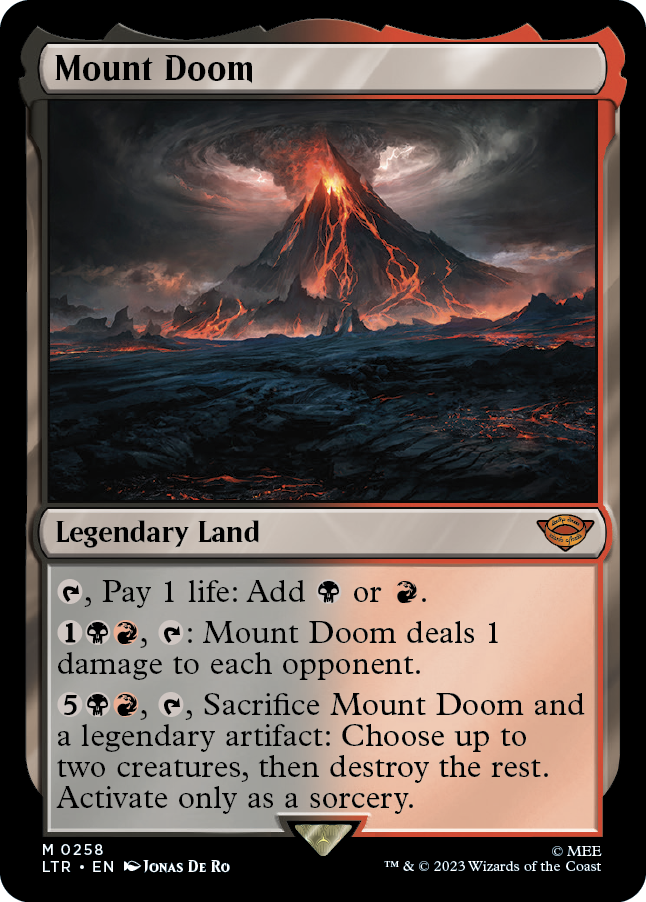
Mount Doom
Legendary Land
{T}, Pay 1 life: Add {B} or {R}.
{1}{B}{R}, {T}: Mount Doom deals 1 damage to each opponent.
{5}{B}{R}, {T}, Sacrifice Mount Doom and a legendary artifact: Choose up to two creatures, then destroy the rest. Activate only as a sorcery.
- For the last ability, none of the chosen creatures are targets of the ability. You may choose creatures with shroud, for example.
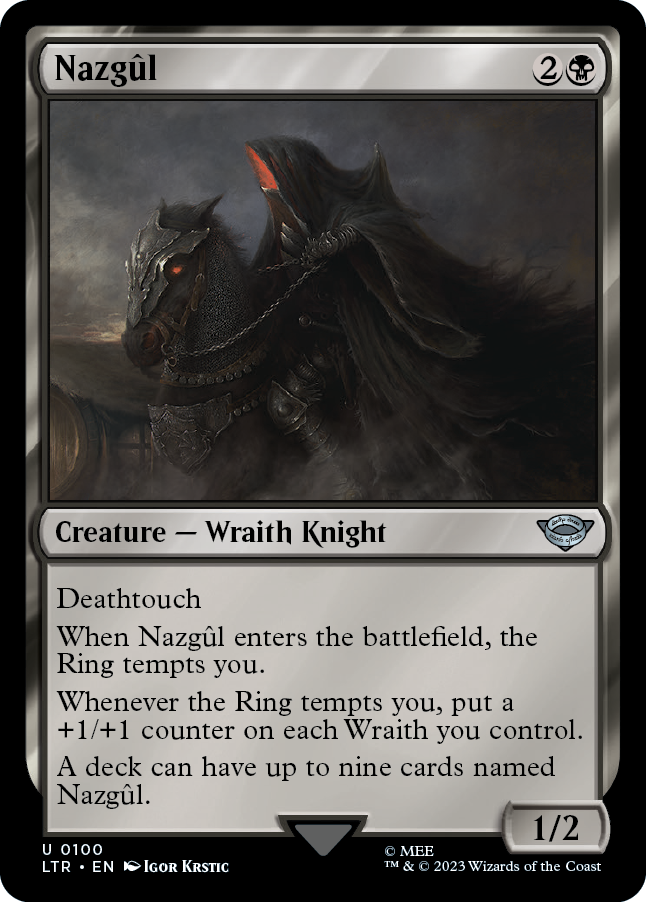
Nazgûl
{2}{B}
Creature — Wraith Knight
1/2
Deathtouch
When Nazgûl enters the battlefield, the Ring tempts you.
Whenever the Ring tempts you, put a +1/+1 counter on each Wraith you control.
A deck can have up to nine cards named Nazgûl.
- The last ability of Nazgûl lets you ignore the "four-of" rule. It doesn't let you ignore format legality. For example, during a The Lord of the Rings: Tales of Middle-earth Limited event, you can't add Nazgûl from your personal collection, no matter how much Sauron might want you to.
- The last ability of Nazgûl also lets you ignore the "singleton" rule in formats like Commander.
- If you're fortunate enough to open or draft ten or more Nazgûl during a Limited event, you can include only nine of them in your deck. The rest remain in your sideboard.
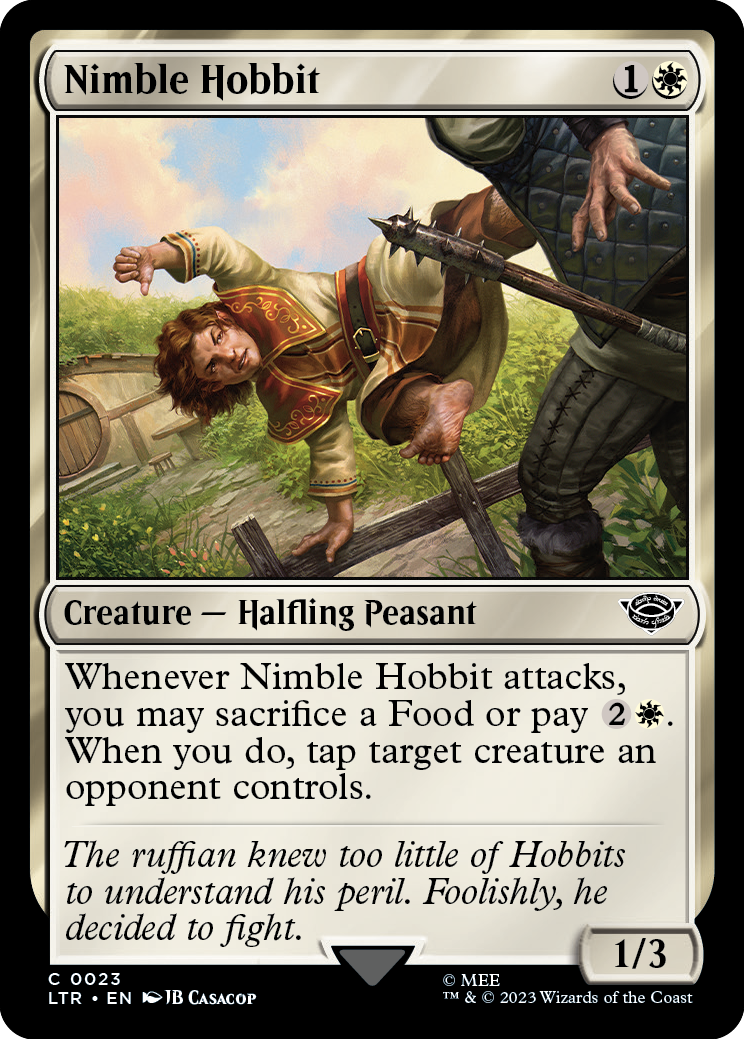
Nimble Hobbit
{1}{W}
Creature — Halfling Peasant
1/3
Whenever Nimble Hobbit attacks, you may sacrifice a Food or pay {2}{W}. When you do, tap target creature an opponent controls.
- You don't choose a target for Nimble Hobbit's ability at the time it triggers. Rather, a second "reflexive" ability triggers when you sacrifice a Food or pay {2}{W} this way. You choose a target for that ability as it goes on the stack. Each player may respond to this triggered ability as normal.
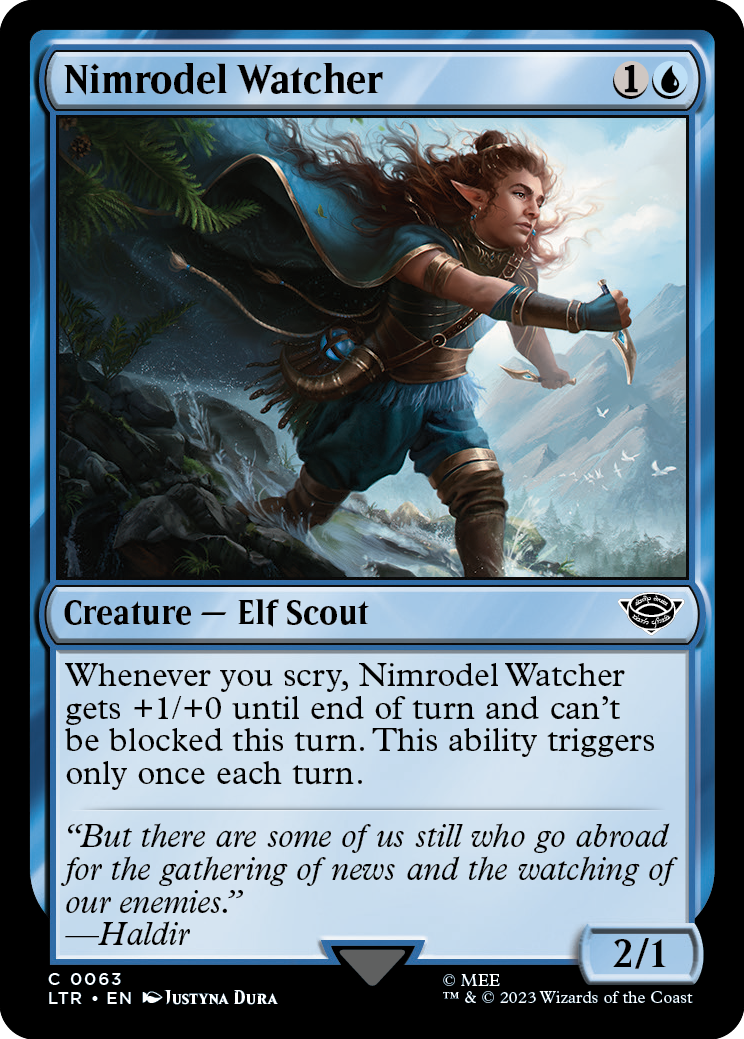
Nimrodel Watcher
{1}{U}
Creature — Elf Scout
2/1
Whenever you scry, Nimrodel Watcher gets +1/+0 until end of turn and can't be blocked this turn. This ability triggers only once each turn.
- Once Nimrodel Watcher has been blocked, resolving its triggered ability won't change or undo that block.
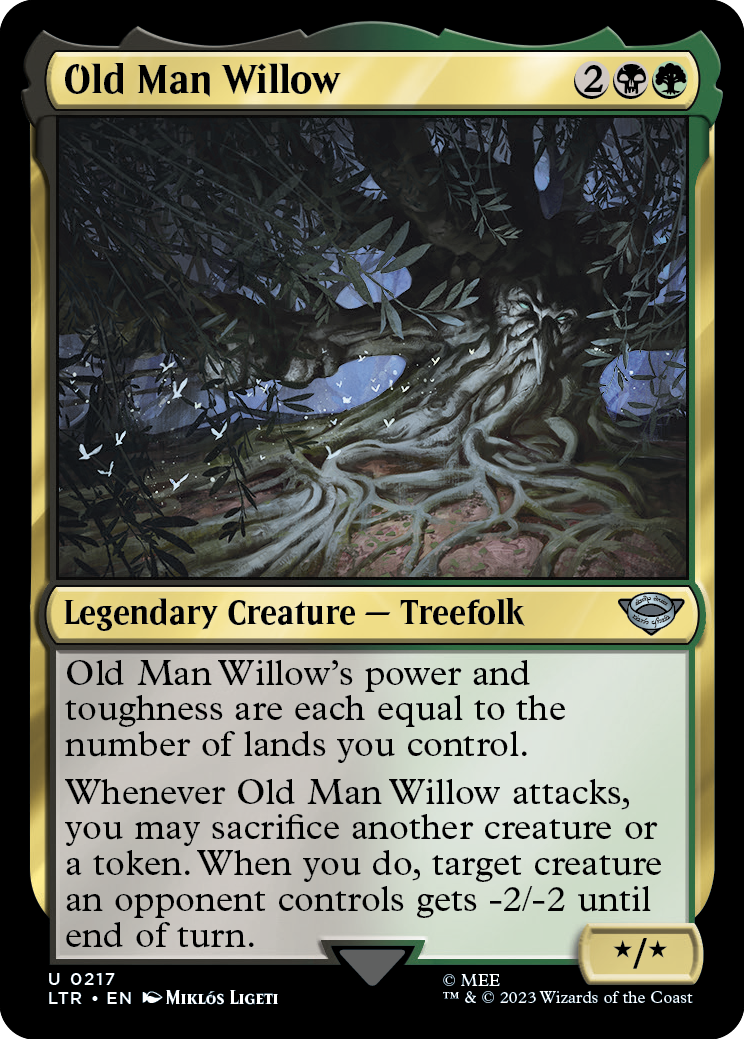
Old Man Willow
{2}{B}{G}
Legendary Creature — Treefolk
*/*
Old Man Willow's power and toughness are each equal to the number of lands you control.
Whenever Old Man Willow attacks, you may sacrifice another creature or a token. When you do, target creature an opponent controls gets -2/-2 until end of turn.
- You don't choose a target for Old Man Willow's last ability at the time it triggers. Rather, a second "reflexive" ability triggers when you sacrifice a creature or token this way. You choose a target for that ability as it goes on the stack. Each player may respond to this triggered ability as normal.
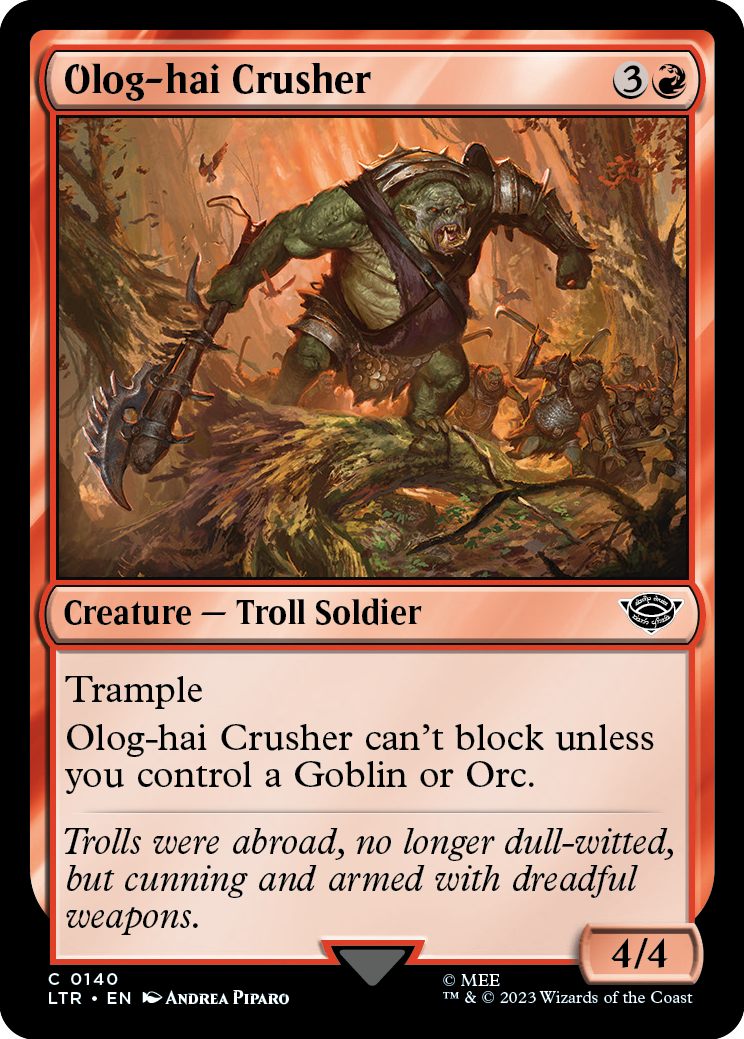
Olog-hai Crusher
{3}{R}
Creature — Troll Soldier
4/4
Trample
Olog-hai Crusher can't block unless you control a Goblin or Orc.
- Whether you control a Goblin or Orc matters only at the time you declare blockers. Once Olog-Hai Crusher blocks a creature, that won't change even if all the Goblins and Orcs you control leave the battlefield.
- The Goblin or Orc you control doesn't have to block.
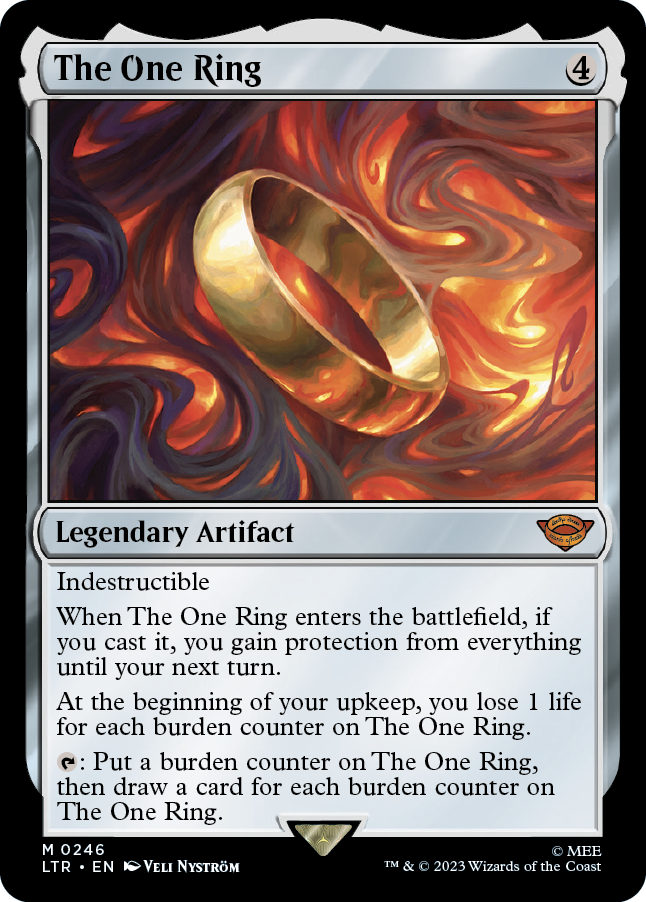
The One Ring
{4}
Legendary Artifact
Indestructible
When The One Ring enters the battlefield, if you cast it, you gain protection from everything until your next turn.
At the beginning of your upkeep, you lose 1 life for each burden counter on The One Ring.
{T}: Put a burden counter on The One Ring, then draw a card for each burden counter on The One Ring.
- If a player has protection from everything, it means three things: 1) All damage that would be dealt to that player is prevented. 2) Auras can't be attached to that player. 3) That player can't be the target of spells or abilities.
- Nothing other than the specified events are prevented or illegal. An effect that doesn't target you could still cause you to discard cards, for example. Creatures can still attack you while you have protection from everything, although combat damage that they would deal to you will be prevented.
- Gaining protection from everything causes a spell or ability on the stack to have an illegal target if it targets you. As a spell or ability tries to resolve, if all its targets are illegal, that spell or ability doesn't resolve and none of its effects happen, including effects unrelated to the target. If at least one target is still legal, the spell or ability does as much as it can to the remaining legal targets, and its other effects still happen.
- Protection from everything will usually prevent damage if it would be dealt to you, but some damage can't be prevented. In this case, that damage reduces your life total as normal.
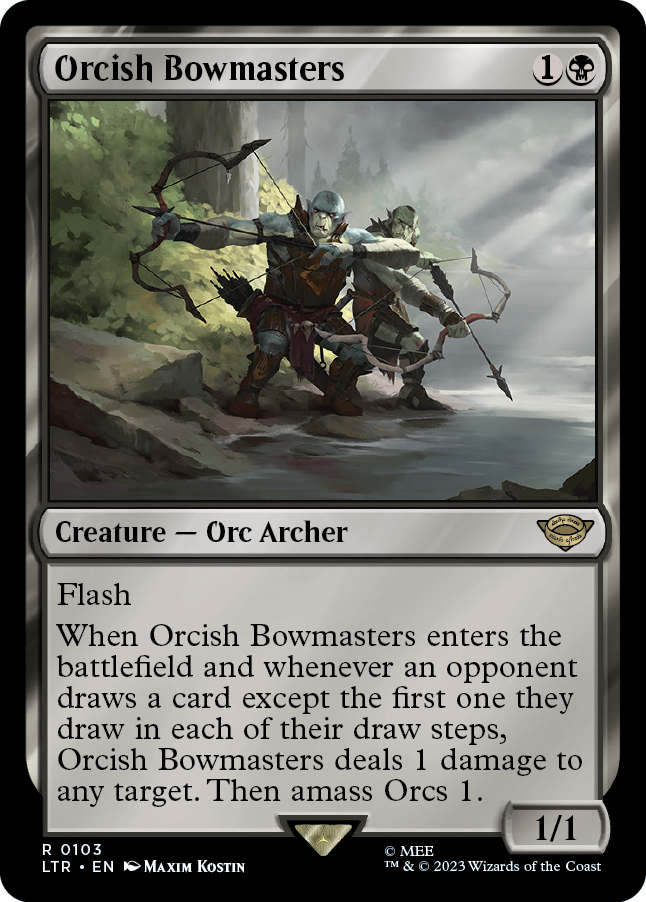
Orcish Bowmasters
{1}{B}
Creature — Orc Archer
1/1
Flash
When Orcish Bowmasters enters the battlefield and whenever an opponent draws a card except the first one they draw in each of their draw steps, Orcish Bowmasters deals 1 damage to any target. Then amass Orcs 1.
- If a spell or ability causes an opponent to put cards into their hand without specifically using the word "draw," it's not a card drawn.
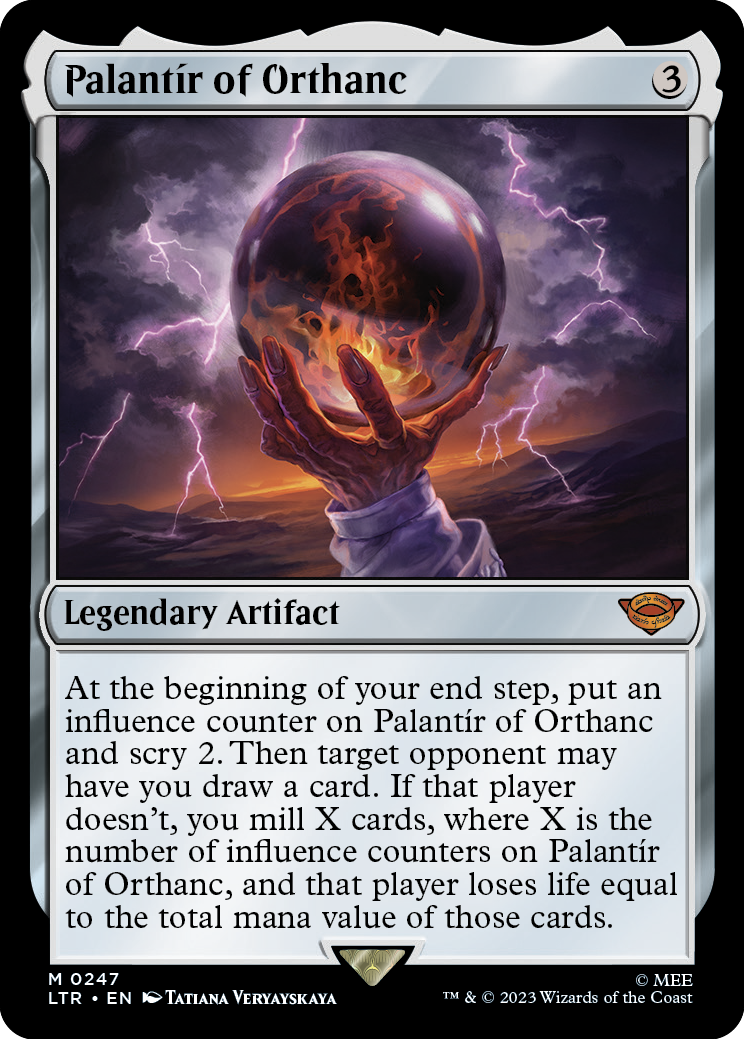
Palantír of Orthanc
{3}
Legendary Artifact
At the beginning of your end step, put an influence counter on Palantír of Orthanc and scry 2. Then target opponent may have you draw a card. If that player doesn't, you mill X cards, where X is the number of influence counters on Palantír of Orthanc, and that player loses life equal to the total mana value of those cards.
- You choose a target for Palantír of Orthanc's ability when it goes on the stack. If that target is illegal as the ability tries to resolve, the ability is removed from the stack. You won't put an influence counter on Palantír of Orthanc, and you won't scry, draw, or mill.
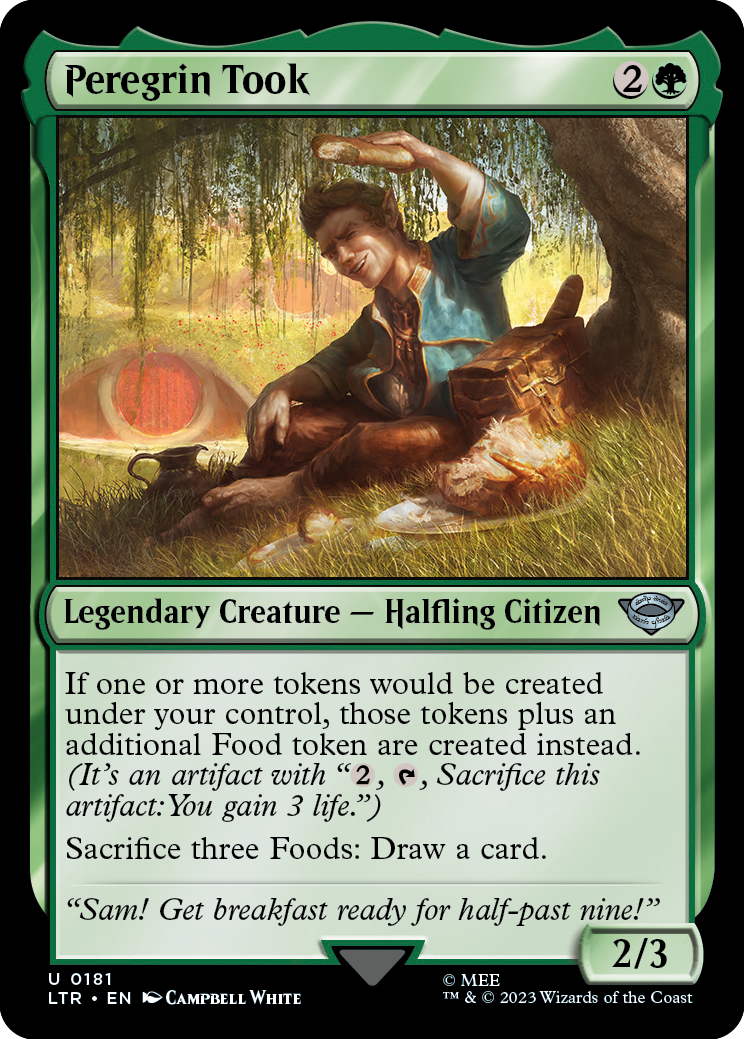
Peregrin Took
{2}{G}
Legendary Creature — Halfling Citizen
2/3
If one or more tokens would be created under your control, those tokens plus an additional Food token are created instead. (It's an artifact with "{2}, {T}, Sacrifice this artifact: You gain 3 life.")
Sacrifice three Foods: Draw a card.
- Peregrin Took's first ability applies to all kinds of tokens that its controller creates, not just Food tokens.
- The additional Food tokens won't have any abilities the other tokens were created with. Anything else specified in the effect creating the token (such as tapped or "Exile that token at end of combat") applies to both the original tokens and the Food.
- You don't need to control the spell or ability that creates the tokens, but you do have to be the one creating the tokens for Peregrin Took's ability to apply.
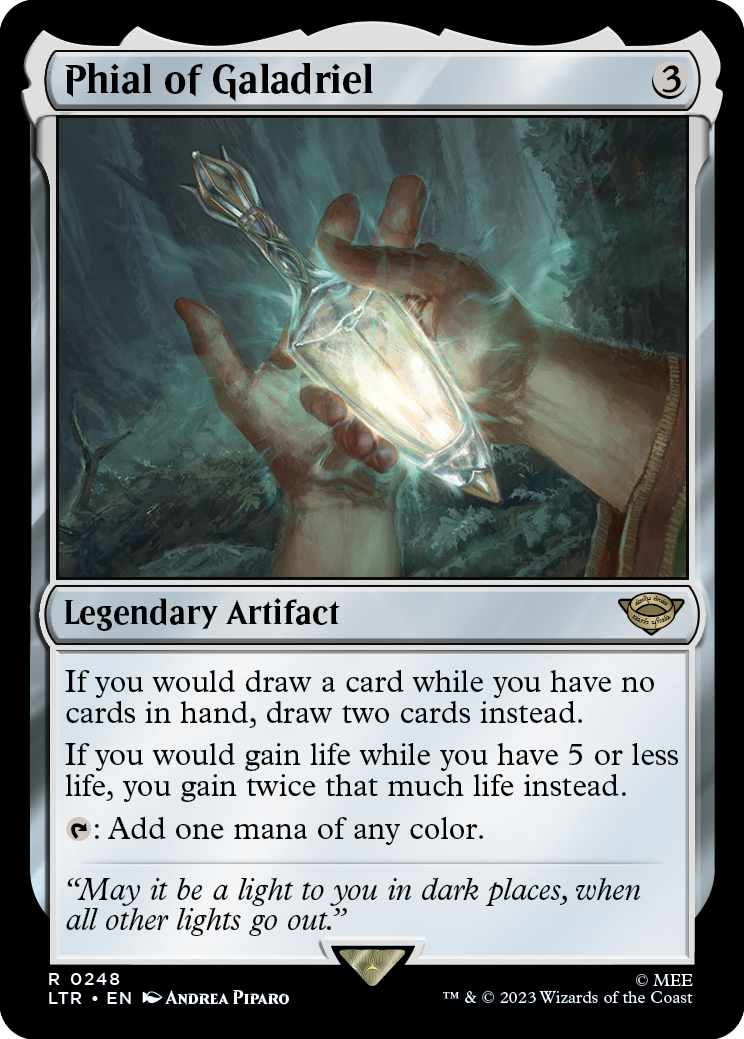
Phial of Galadriel
{3}
Legendary Artifact
If you would draw a card while you have no cards in hand, draw two cards instead.
If you would gain life while you have 5 or less life, you gain twice that much life instead.
{T}: Add one mana of any color.
- If two or more replacement effects would apply to a card-drawing event, the player drawing the card chooses the order in which to apply them.
- Any time you are instructed to draw more than one card, you draw them one at a time. For example, if you control Phial of Galadriel and have no cards in hand and you're instructed to "draw two cards," your first card draw is replaced by drawing two cards, then you'll draw the second card from the original instruction. In total, you'll draw three cards.
- If you somehow control more than one Phial of Galadriel, each one will effectively add one card. For example, if you control two Phials of Galadriel and would draw a card while you have no cards in hand, the effect of one Phial of Galadriel will replace the event "draw a card" with "draw two cards." The effect of the other Phial of Galadriel will replace the drawing of the first of those two cards with "draw two cards." In total, you would draw three cards.
- The second abilities of multiple Phials of Galadriel are cumulative. If you control two, life gained while you have 5 or less life will be multiplied by 4. Three Phials will multiply that life gain by 8. And so on.
- If an effect would set your life total to a specific number that's higher than your current life total, that effect causes you to gain life equal to the difference. If your life total is 5 or less, Phial of Galadriel will then double the amount of life that effect would cause you to gain. For example, if you have 3 life and an effect says that your life total "becomes 10," you would gain 7 life which Phial doubles to 14, so your life total will actually become 17.
- In a Two-Headed Giant game, life gained by your teammate won't cause Phial of Galadriel's second ability to apply, even though it will cause your team's life total to increase.
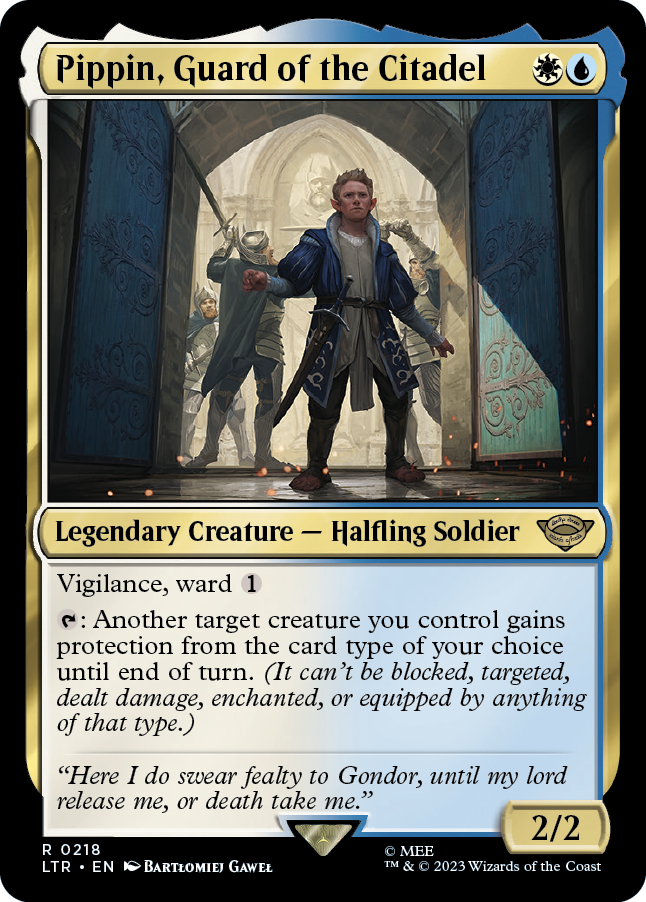
Pippin, Guard of the Citadel
{W}{U}
Legendary Creature — Halfling Soldier
2/2
Vigilance, ward {1}
{T}: Another target creature you control gains protection from the card type of your choice until end of turn. (It can't be blocked, targeted, dealt damage, enchanted, or equipped by anything of that type.)
- You may choose any card type. The ones that may appear in a normal game of Magic are artifact, battle, creature, enchantment, instant, land, planeswalker, sorcery, and tribal (a card type found on some older cards). Supertypes such as legendary and basic may not be chosen. Subtypes such as Halfling, Aura, and Forest also may not be chosen.
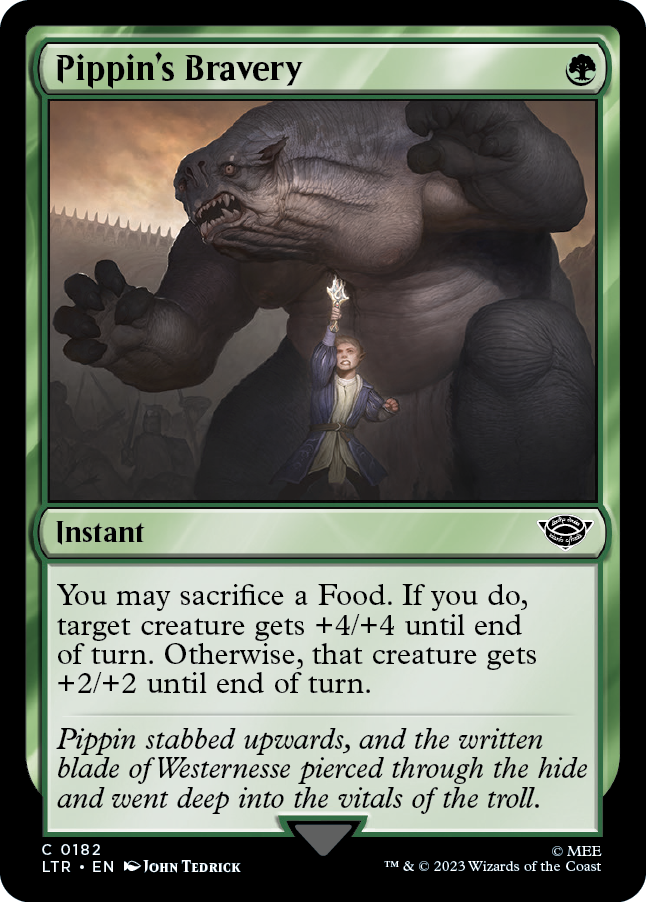
Pippin's Bravery
{G}
Instant
You may sacrifice a Food. If you do, target creature gets +4/+4 until end of turn. Otherwise, that creature gets +2/+2 until end of turn.
- You choose a target creature as you cast Pippin's Bravery, but you don't choose whether to sacrifice a Food until the spell resolves.
- If the target creature is an illegal target by the time Pippin's Bravery tries to resolve, Pippin's Bravery is removed from the stack. You won't be able to sacrifice a Food to it.
- If an effect refers to a Food, it means any Food artifact, not just a Food artifact token. For example, you can sacrifice Lembas to Pippin's Bravery.
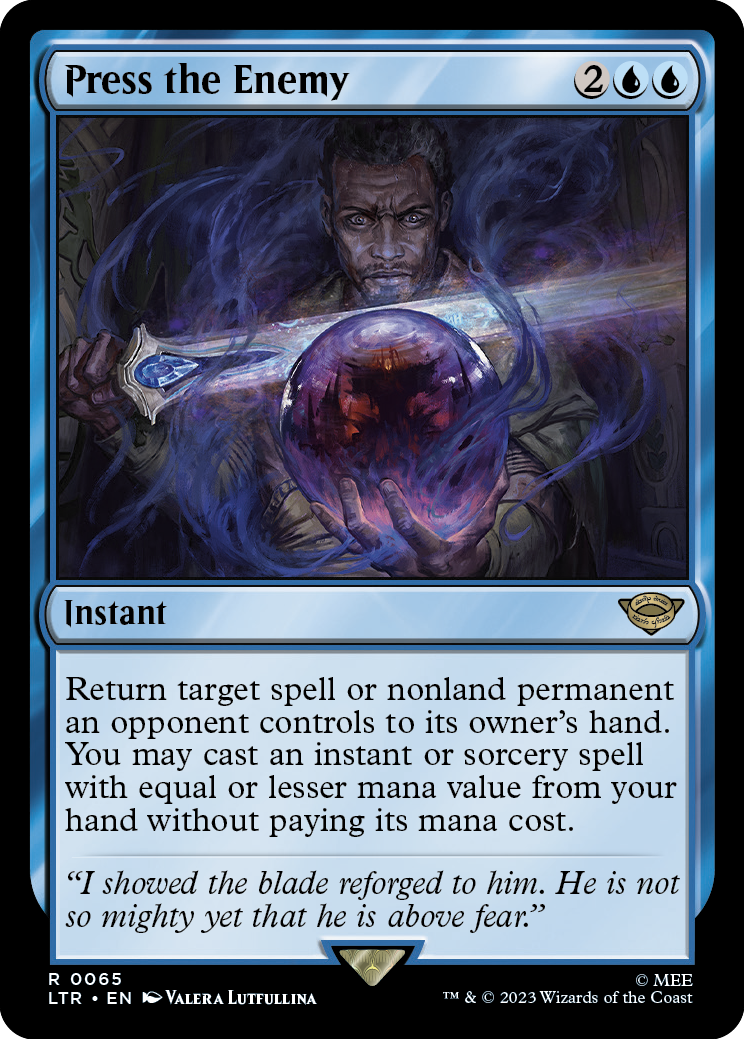
Press the Enemy
{2}{U}{U}
Instant
Return target spell or nonland permanent an opponent controls to its owner's hand. You may cast an instant or sorcery spell with equal or lesser mana value from your hand without paying its mana cost.
- If a spell is returned to its owner's hand, it's removed from the stack and thus will not resolve. The spell isn't countered; it just no longer exists. This works against a spell that can't be countered.
- If a spell with {X} in its mana cost is returned to a player's hand this way, {X} is the value chosen as the spell was cast for the purpose of evaluating the spell's mana value.
- If a permanent with {X} in its mana cost is returned to a player's hand this way, {X} is 0 for the purpose of evaluating its mana value.
- If you cast a spell "without paying its mana cost," you can't pay any alternative costs. You can, however, pay additional costs, such as kicker costs. If the card has any mandatory additional costs, you must pay those.
- If the spell you cast has {X} in its mana cost, you must choose 0 as the value of X.
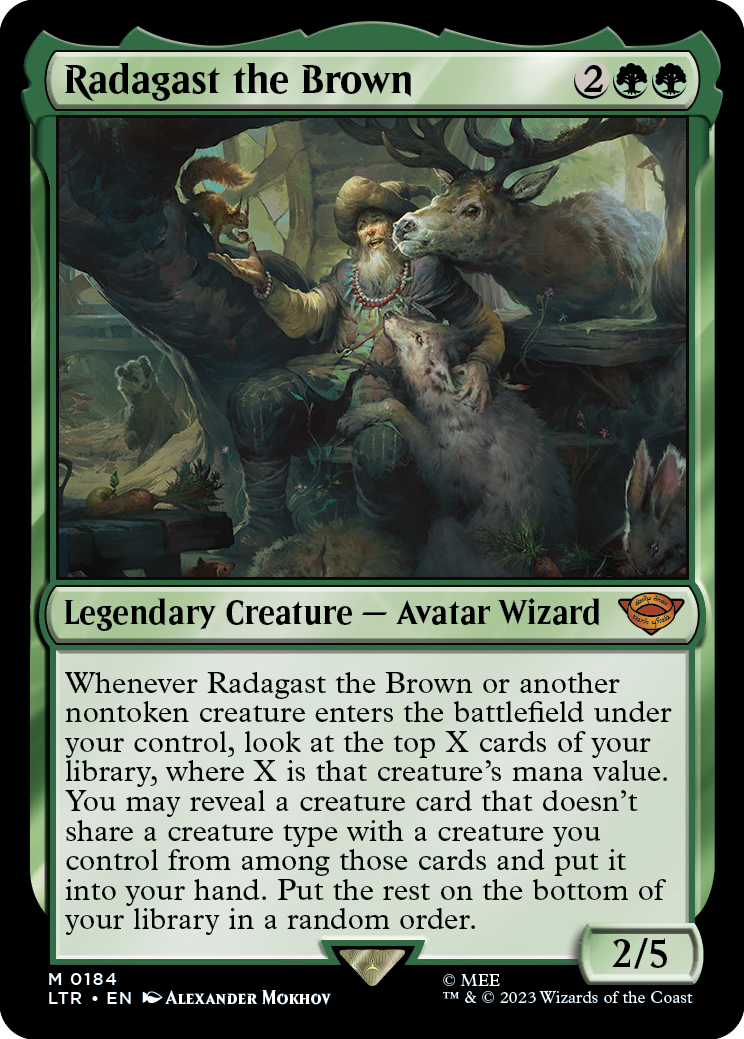
Radagast the Brown
{2}{G}{G}
Legendary Creature — Avatar Wizard
2/5
Whenever Radagast the Brown or another nontoken creature enters the battlefield under your control, look at the top X cards of your library, where X is that creature's mana value. You may reveal a creature card that doesn't share a creature type with a creature you control from among those cards and put it into your hand. Put the rest on the bottom of your library in a random order.
- If the top X cards of your library don't contain a creature card that doesn't share a creature type with a creature you control, you won't get to put a card into your hand. Apologies to Mistform Ultimus fans everywhere.
- If a token copy of Radagast the Brown enters the battlefield, its own ability will trigger.
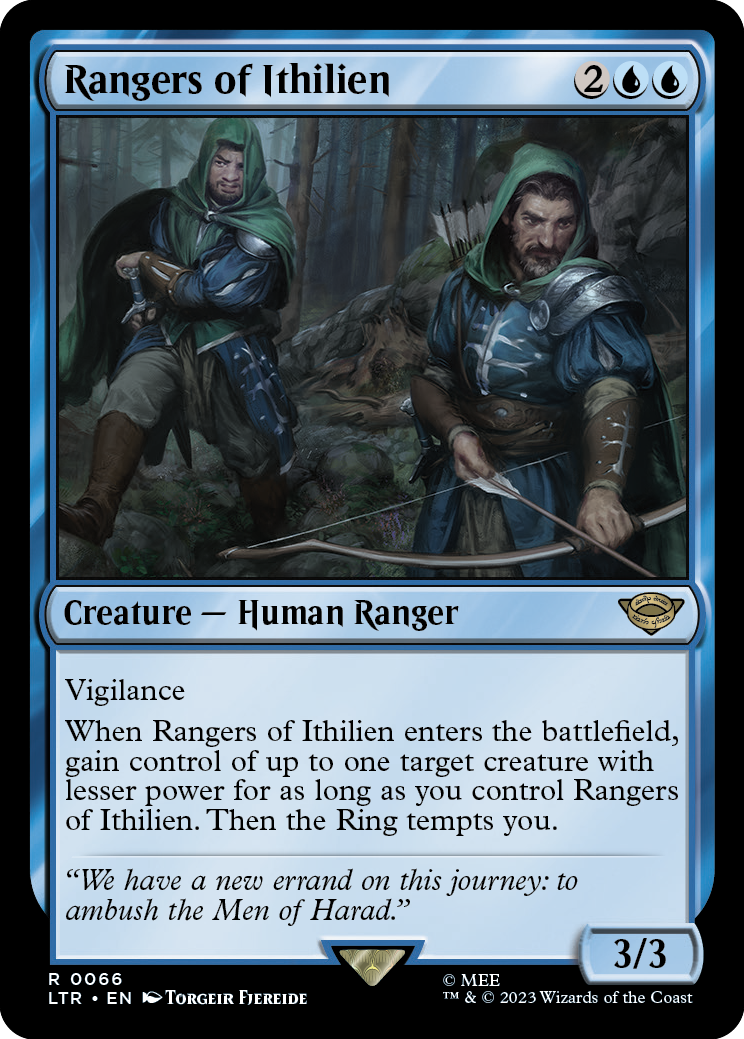
Rangers of Ithilien
{2}{U}{U}
Creature — Human Ranger
3/3
Vigilance
When Rangers of Ithilien enters the battlefield, gain control of up to one target creature with lesser power for as long as you control Rangers of Ithilien. Then the Ring tempts you.
- When Rangers of Ithilien's ability triggers, you can choose not to target a creature just to have the Ring tempt you. However, if you do choose a target, and that target is illegal at the time the ability tries to resolve, the ability won't resolve and none of its effects will happen. The Ring won't tempt you.
- Rangers of Ithilien's triggered ability lets you gain control of a creature if it has lesser power than Rangers of Ithilien at the time that you choose the target and at the time that the ability resolves. After that, it no longer matters what the creature's power is; you will continue to control it for as long as you control Rangers of Ithilien.
- If you gain control of a creature with the triggered ability, you can immediately choose that creature as your Ring-bearer as the Ring tempts you.
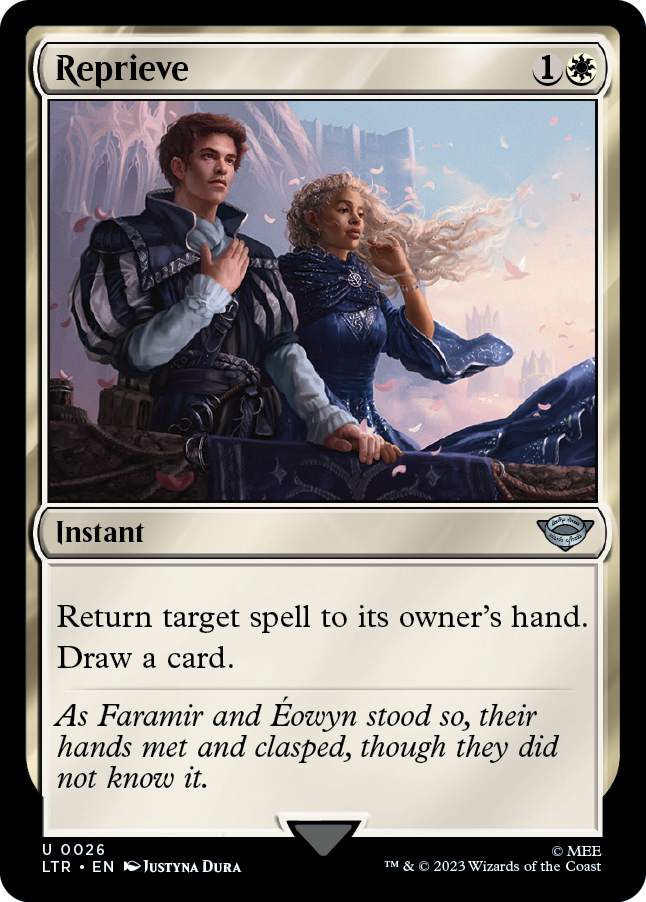
Reprieve
{1}{W}
Instant
Return target spell to its owner's hand.
Draw a card.
- If a spell is returned to its owner's hand, it's removed from the stack and thus will not resolve. The spell isn't countered; it just no longer exists. This works against a spell that can't be countered.
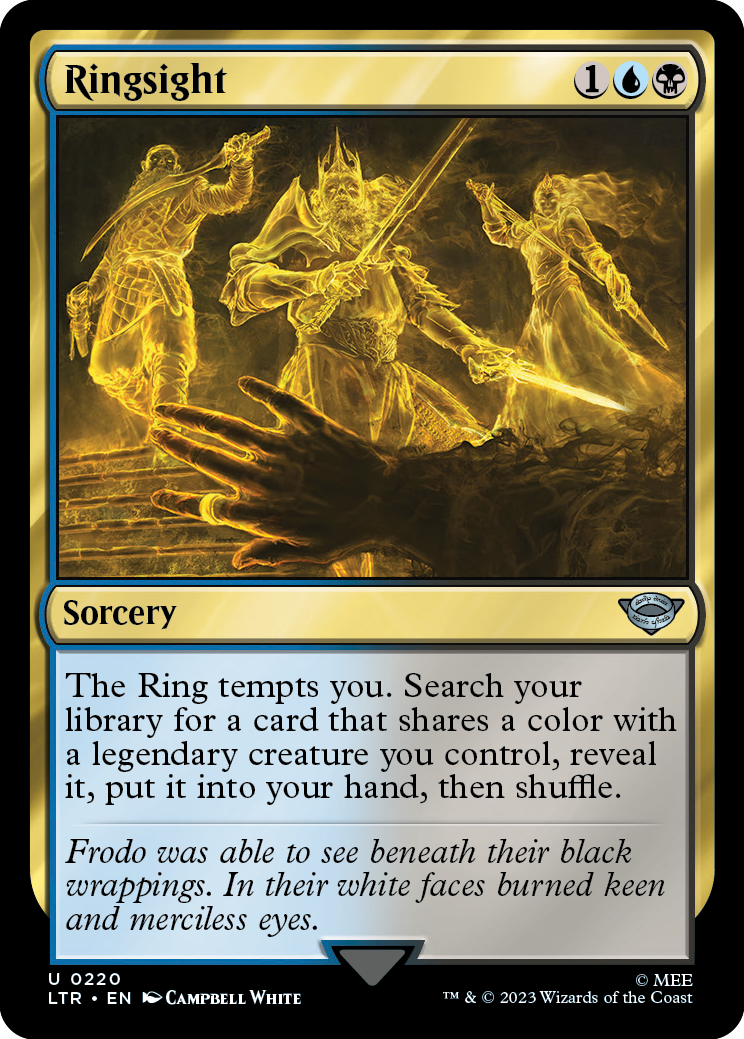
Ringsight
{1}{U}{B}
Sorcery
The Ring tempts you. Search your library for a card that shares a color with a legendary creature you control, reveal it, put it into your hand, then shuffle.
- Ringsight won't let you search for a colorless card, even if you control a colorless legendary creature.
- Your Ring-bearer is legendary, so you can search for a card that shares a color with the Ring-bearer that you chose as the Ring tempted you.
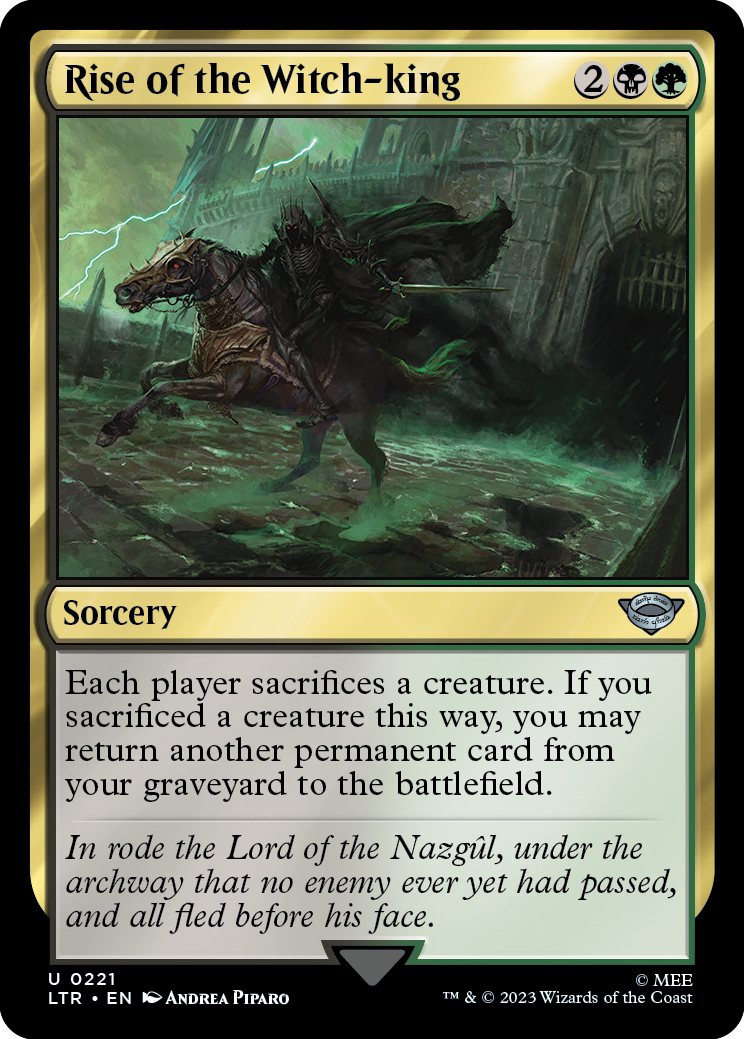
Rise of the Witch-king
{2}{B}{G}
Sorcery
Each player sacrifices a creature. If you sacrificed a creature this way, you may return another permanent card from your graveyard to the battlefield.
- First the active player chooses which creature they'll sacrifice, then each other player in turn order does the same, knowing choices made before their choice. Then all those creatures are sacrificed simultaneously.
- You choose which permanent card you're returning to the battlefield, if any, as Rise of the Witch-King resolves, after permanents are sacrificed.
- You cannot return the same permanent card that you sacrificed.
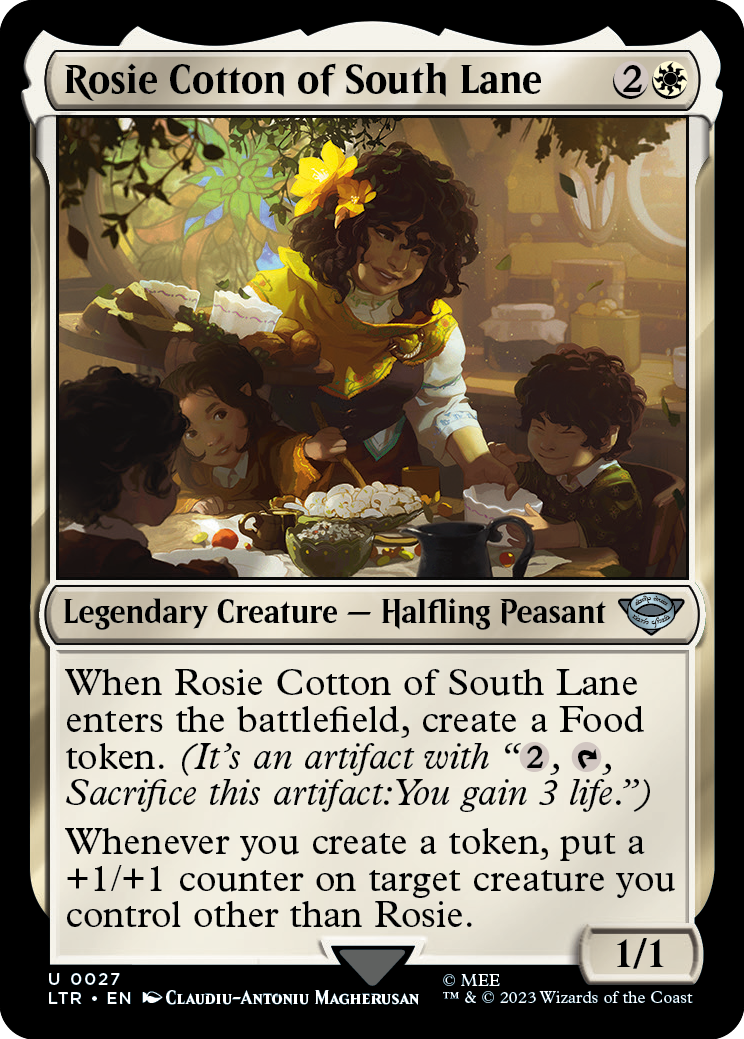
Rosie Cotton of South Lane
{2}{W}
Legendary Creature — Halfling Peasant
1/1
When Rosie Cotton of South Lane enters the battlefield, create a Food token. (It's an artifact with "{2}, {T}, Sacrifice this artifact: You gain 3 life.")
Whenever you create a token, put a +1/+1 counter on target creature you control other than Rosie.
- If you create multiple tokens at once, Rosie Cotton of South Lane's last ability will trigger once for each token you created.
- If you create a creature token, you can target it with Rosie Cotton of South Lane's last ability.
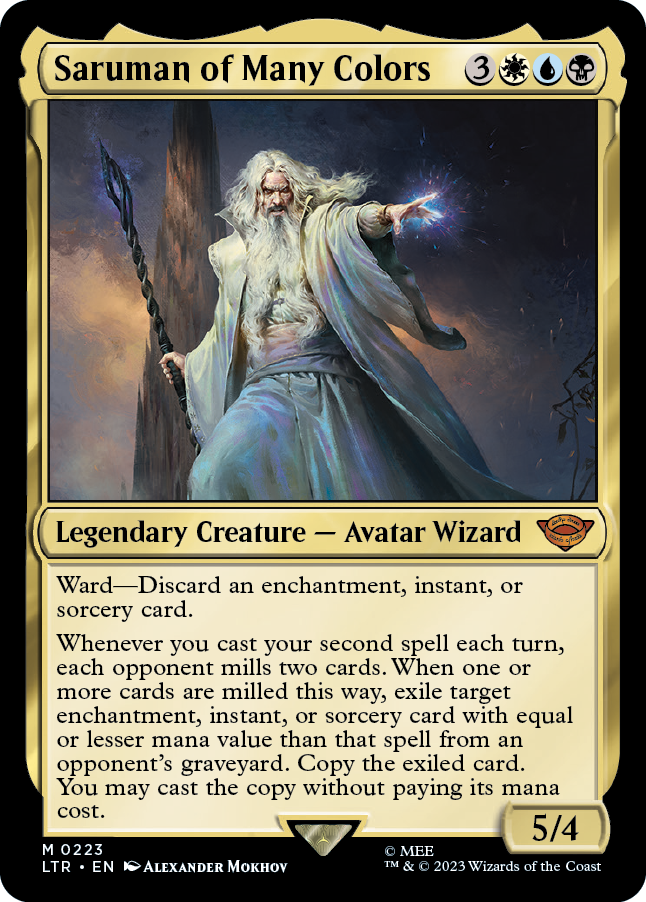
Saruman of Many Colors
{3}{W}{U}{B}
Legendary Creature — Avatar Wizard
5/4
Ward—Discard an enchantment, instant, or sorcery card.
Whenever you cast your second spell each turn, each opponent mills two cards. When one or more cards are milled this way, exile target enchantment, instant, or sorcery card with equal or lesser mana value than that spell from an opponent's graveyard. Copy the exiled card. You may cast the copy without paying its mana cost.
- If you don't have an enchantment, instant, or sorcery card in your hand, you won't be able to pay Saruman of Many Colors's ward cost.
- You don't choose a target for Saruman of Many Colors's ability at the time it triggers. Rather, a second "reflexive" ability triggers when one or more cards are milled this way. You choose a target for that ability as it goes on the stack. Each player may respond to this triggered ability as normal.
- You cast the copy while the ability is resolving and still on the stack. You can't wait to cast it later in the turn.
- If you cast a spell "without paying its mana cost," you can't pay any alternative costs. You can, however, pay additional costs, such as kicker costs. If the card has any mandatory additional costs, you must pay those.
- If the spell you cast has {X} in its mana cost, you must choose 0 as the value of X when casting it without paying its mana cost.
- If you don't want to cast the copy, you can choose not to; the copy ceases to exist the next time state-based actions are checked.
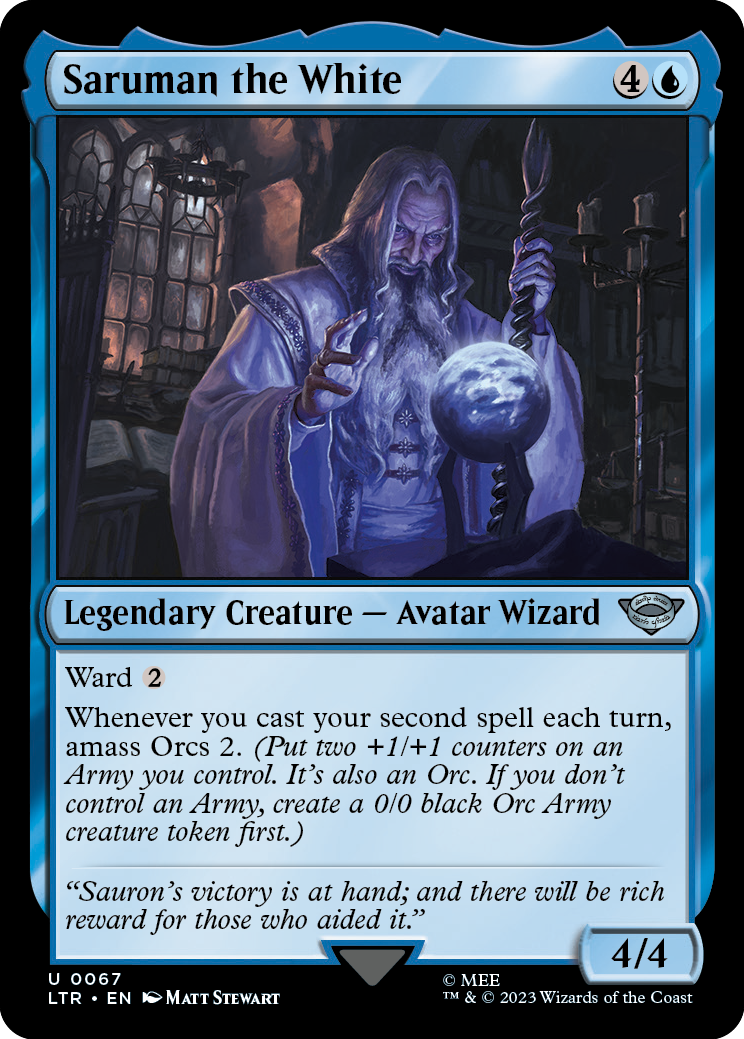
Saruman the White
{4}{U}
Legendary Creature — Avatar Wizard
4/4
Ward {2}
Whenever you cast your second spell each turn, amass Orcs 2. (Put two +1/+1 counters on an Army you control. It's also an Orc. If you don't control an Army, create a 0/0 black Orc Army creature token first.)
- Spells that were cast before Saruman the White count. If Saruman the White was the first spell you cast this turn, the next spell you cast this turn is your second spell.
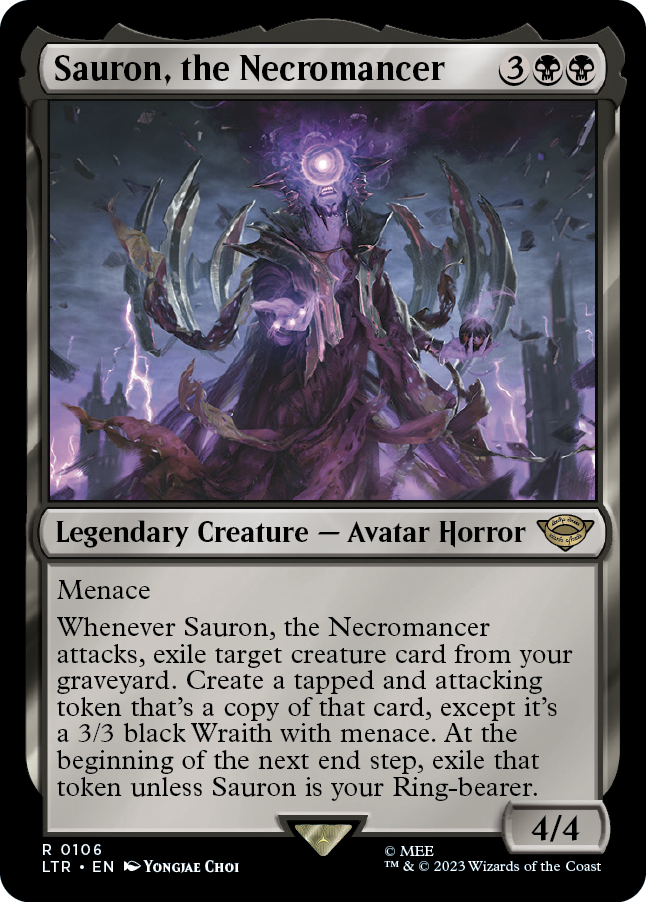
Sauron, the Necromancer
{3}{B}{B}
Legendary Creature — Avatar Horror
4/4
Menace
Whenever Sauron, the Necromancer attacks, exile target creature card from your graveyard. Create a tapped and attacking token that's a copy of that card, except it's a 3/3 black Wraith with menace. At the beginning of the next end step, exile that token unless Sauron is your Ring-bearer.
- The token copies exactly what was printed on the original card and nothing else, except the characteristics it specifically modifies. It doesn't copy any information about the object the card was before it was put into your graveyard.
- The token is a Wraith instead of its other creature types (and other subtypes if it has any) and is black instead of its other colors. Its base power and toughness are 3/3. These are copiable values of the token that other effects may copy.
- If the card copied by the token had any "when [this permanent] enters the battlefield" abilities, then the token also has those abilities and will trigger them when it's created. Similarly, any "as [this permanent] enters the battlefield" or "[this permanent] enters the battlefield with" abilities that the token has copied will also work.
- If the exiled card has {X} in its mana cost, X is 0.
- The delayed triggered ability will exile the token at the beginning of your next end step unless Sauron, the Necromancer is your Ring-bearer at the time that the ability resolves. If Sauron, the Necromancer leaves the battlefield before the delayed triggered ability resolves, that ability will exile the token, even if Sauron, the Necromancer later returns to the battlefield or you control another copy of Sauron, the Necromancer as your Ring-bearer.
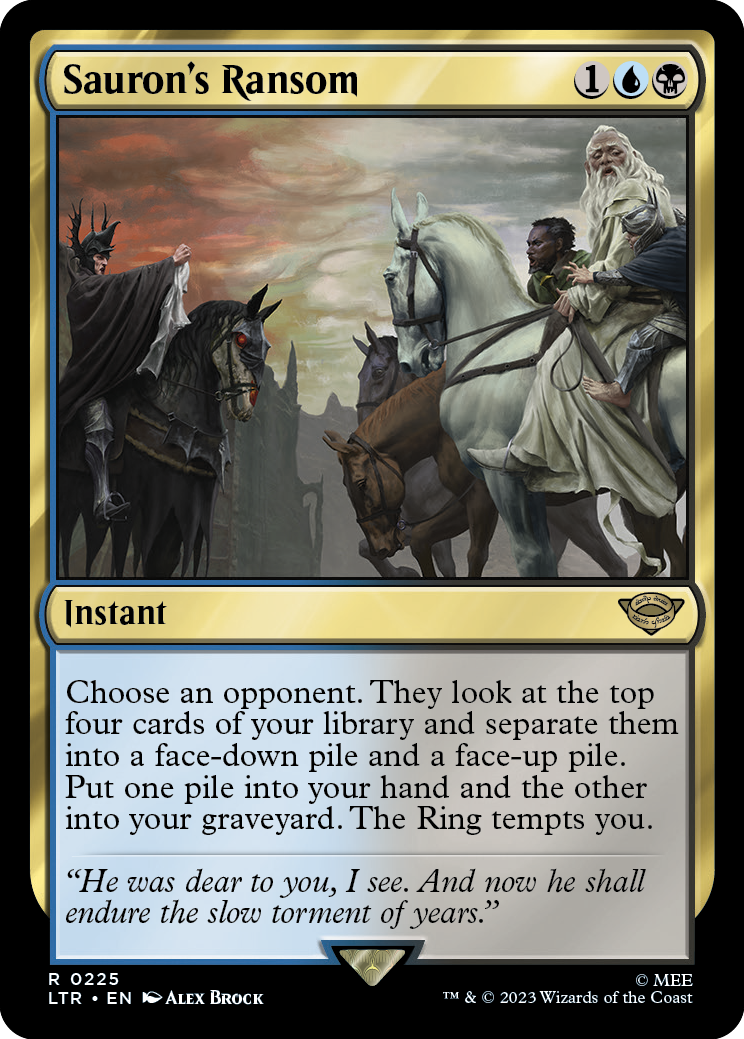
Sauron's Ransom
{1}{U}{B}
Instant
Choose an opponent. They look at the top four cards of your library and separate them into a face-down pile and a face-up pile. Put one pile into your hand and the other into your graveyard. The Ring tempts you.
- You choose just one opponent to look at the top four cards of your library and put them into piles. Other players can't look, but they may attempt to offer advice without knowing what cards are there. The player who looks may choose what information to share with others if that player wants advice on how to split the cards, but that player doesn't have to share any information at all.
- You don't have to reveal the cards in the face-down pile if you put it into your hand.
- The opponent may split the cards into one pile of four and one pile of zero. The pile of four cards could be the face-up pile or the face-down pile.
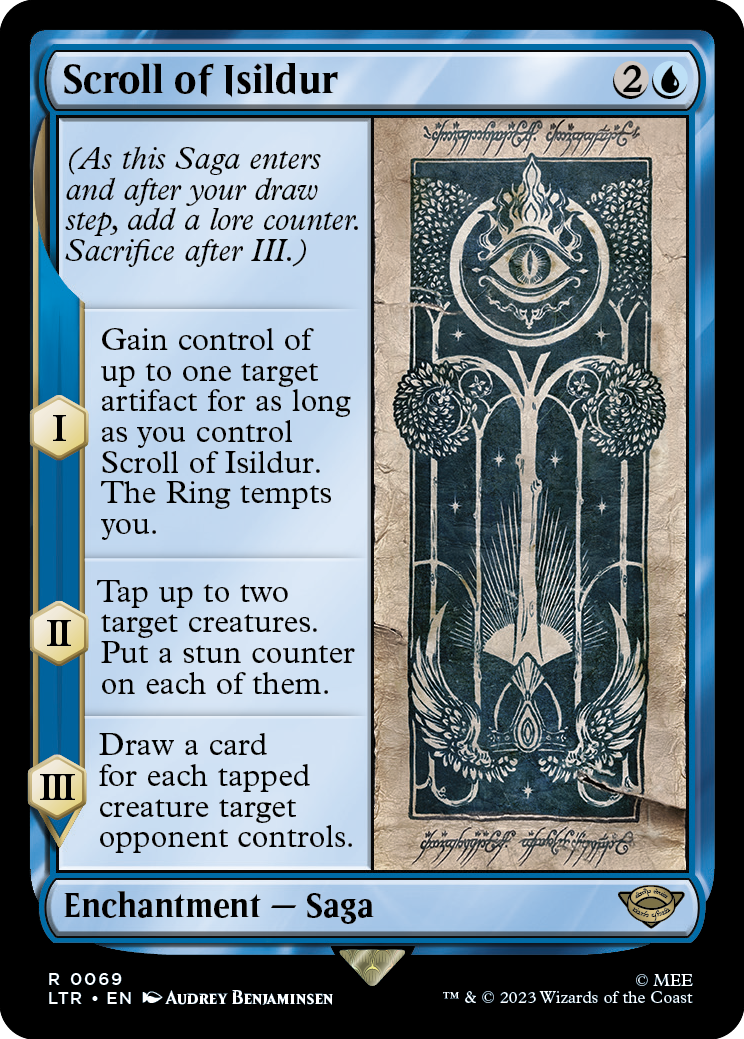
Scroll of Isildur
{2}{U}
Enchantment — Saga
(As this Saga enters and after your draw step, add a lore counter. Sacrifice after III.)
I — Gain control of up to one target artifact for as long as you control Scroll of Isildur. The Ring tempts you.
II — Tap up to two target creatures. Put a stun counter on each of them.
III — Draw a card for each tapped creature target opponent controls.
- If the target is not legal as Scroll of Isildur's first chapter ability tries to resolve, the ability is removed from the stack. The Ring won't tempt you.
- If Scroll of Isildur leaves the battlefield or you lose control of it before its first chapter ability resolves, control of the target artifact doesn't change at all.
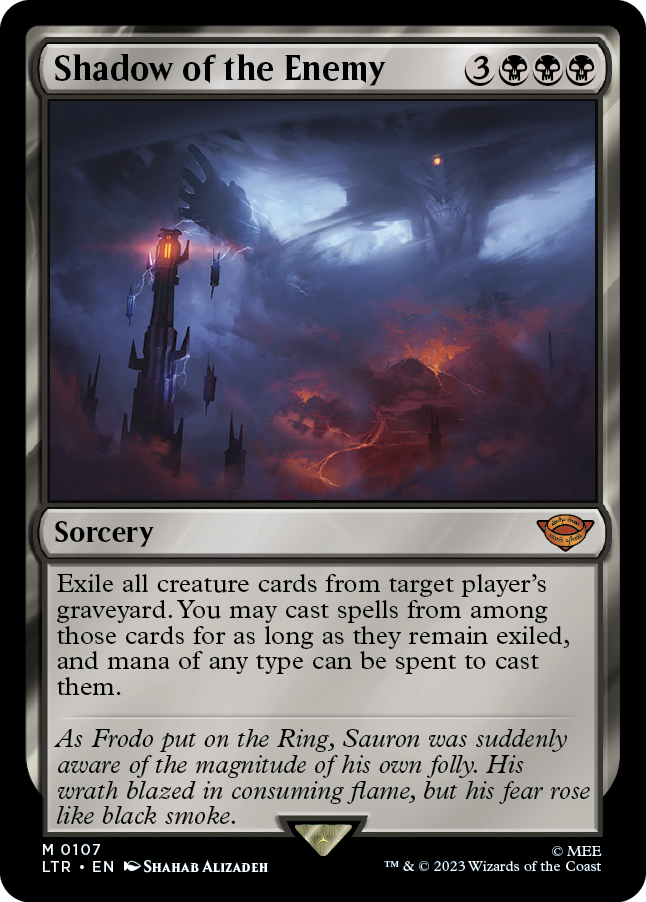
Shadow of the Enemy
{3}{B}{B}{B}
Sorcery
Exile all creature cards from target player's graveyard. You may cast spells from among those cards for as long as they remain exiled, and mana of any type can be spent to cast them.
- You pay all costs and follow all normal timing rules for spells cast this way.
- Shadow of the Enemy uses a new template indicating that you may spend mana as though it were mana of any type to cast the exiled cards. The six types of mana are white, blue, black, red, green, and colorless.
- Snow mana is not a type of mana. Shadow of the Enemy won't let you pay a snow cost using mana produced by a nonsnow source.
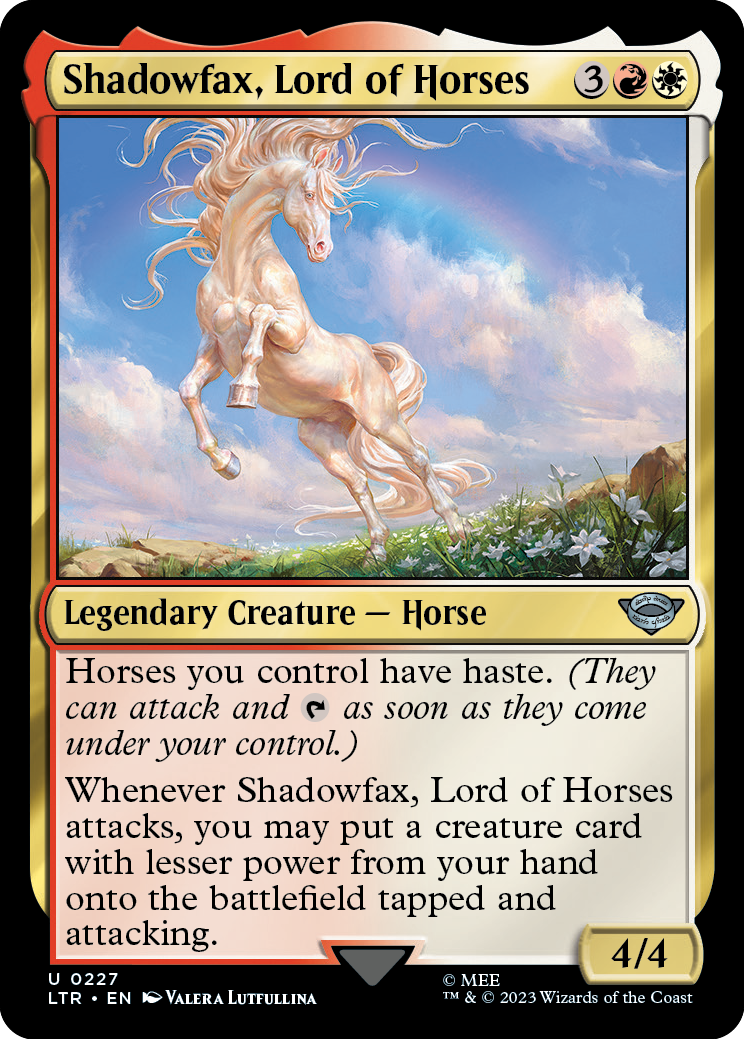
Shadowfax, Lord of Horses
{3}{R}{W}
Legendary Creature — Horse
4/4
Horses you control have haste. (They can attack and {T} as soon as they come under your control.)
Whenever Shadowfax, Lord of Horses attacks, you may put a creature card with lesser power from your hand onto the battlefield tapped and attacking.
- Haste reminder text isn't normally included in most card sets these days, but we felt explaining what haste means was important for this card.
- Although the creature you put onto the battlefield is an attacking creature, it was never declared as an attacking creature. This means that abilities that trigger whenever a creature attacks won't trigger when it enters the battlefield attacking.
- The creature card you put onto the battlefield needs to have lesser power in your hand than the Shadowfax, Lord of Horses on the battlefield. The creature that enters the battlefield doesn't need to have lesser power than Shadowfax (this can happen if it enters with +1/+1 counters on it, for example).
- If Shadowfax, Lord of Horses leaves the battlefield before its triggered ability resolves, compare the power of the creature card in your hand with Shadowfax's power as it last existed on the battlefield.
- You choose which player, planeswalker, or battle the creature you put onto the battlefield is attacking as it enters the battlefield. It doesn't have to be attacking the same player, planeswalker, or battle that Shadowfax, Lord of Horses is attacking.
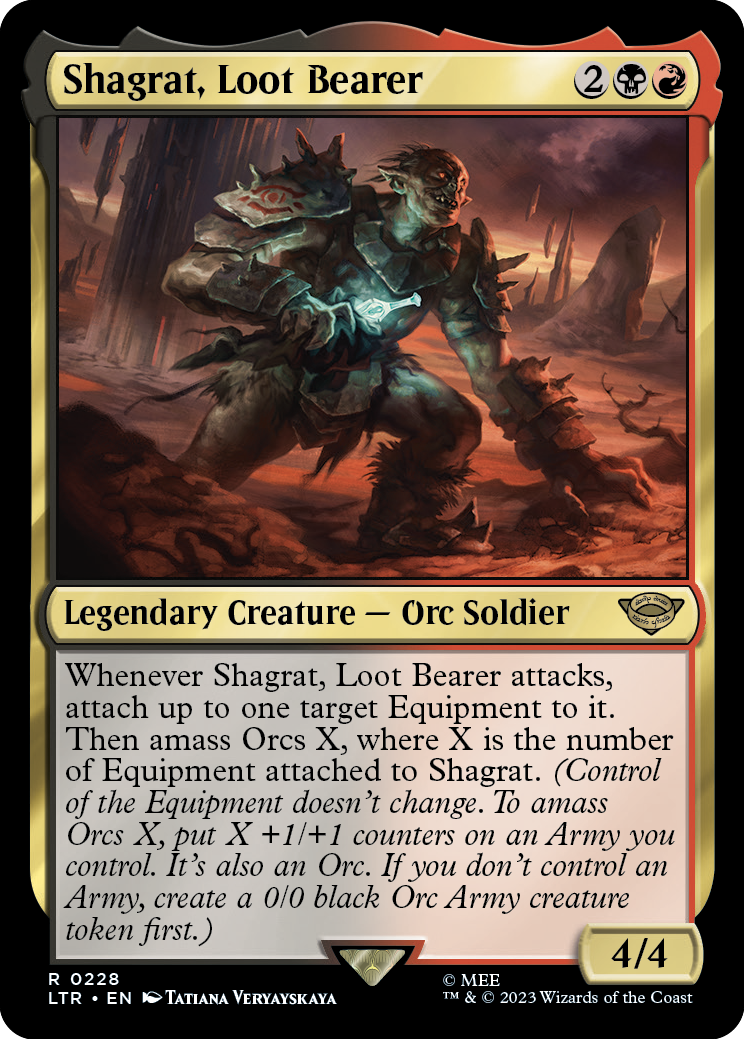
Shagrat, Loot Bearer
{2}{B}{R}
Legendary Creature — Orc Soldier
4/4
Whenever Shagrat, Loot Bearer attacks, attach up to one target Equipment to it. Then amass Orcs X, where X is the number of Equipment attached to Shagrat. (Control of the Equipment doesn't change. To amass Orcs X, put X +1/+1 counters on an Army you control. It's also an Orc. If you don't control an Army, create a 0/0 black Orc Army creature token first.)
- When Shagrat, Loot Bearer's ability triggers, you can choose not to target an Equipment just to amass Orcs. However, if you do choose a target, and that target is illegal at the time the ability tries to resolve, the ability won't resolve and none of its effects will happen. You won't amass Orcs.
- Control of the Equipment doesn't change. If you target an Equipment an opponent controls, you won't be able to activate its equip ability, for example, and they can activate its equip ability as a sorcery to reattach it to a creature they control.
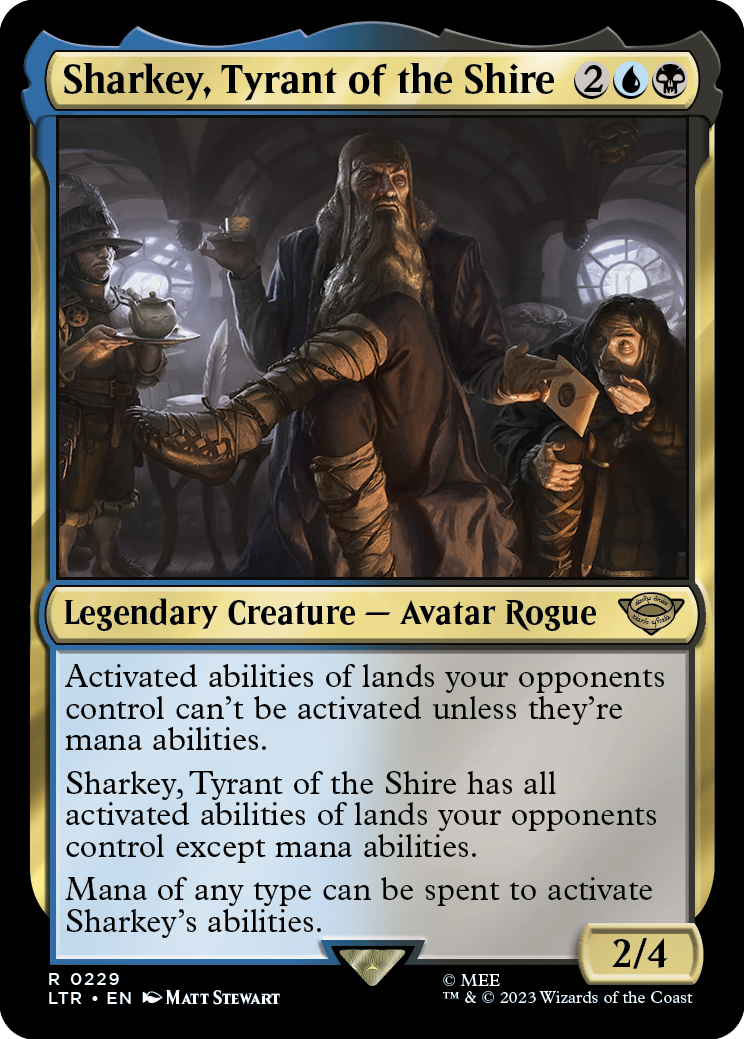
Sharkey, Tyrant of the Shire
{2}{U}{B}
Legendary Creature — Avatar Rogue
2/4
Activated abilities of lands your opponents control can't be activated unless they're mana abilities.
Sharkey, Tyrant of the Shire has all activated abilities of lands your opponents control except mana abilities.
Mana of any type can be spent to activate Sharkey's abilities.
- Sharkey, Tyrant of the Shire gains only activated abilities, excluding activated mana abilities. It doesn't gain keyword abilities (unless those keyword abilities are activated), triggered abilities, or static abilities.
- Activated abilities contain a colon. They're generally written "[Cost]: [Effect]." Some keywords are activated abilities; they have colons in their reminder text.
- If an activated ability of a land an opponent controls references the card it's printed on by name, treat Sharkey, Tyrant of the Shire's version of that ability as though it referenced Sharkey, Tyrant of the Shire by name instead.
- An activated mana ability is one that produces mana as it resolves, not one that costs mana to activate.
- Sharkey, Tyrant of the Shire's last ability uses a new template indicating that you may spend mana as though it were mana of any type to activate Sharkey, Tyrant of the Shire's abilities. The six types of mana are white, blue, black, red, green, and colorless.
- Snow mana is not a type of mana. Sharkey, Tyrant of the Shire's last ability won't let you pay a snow cost using mana produced by a nonsnow source.
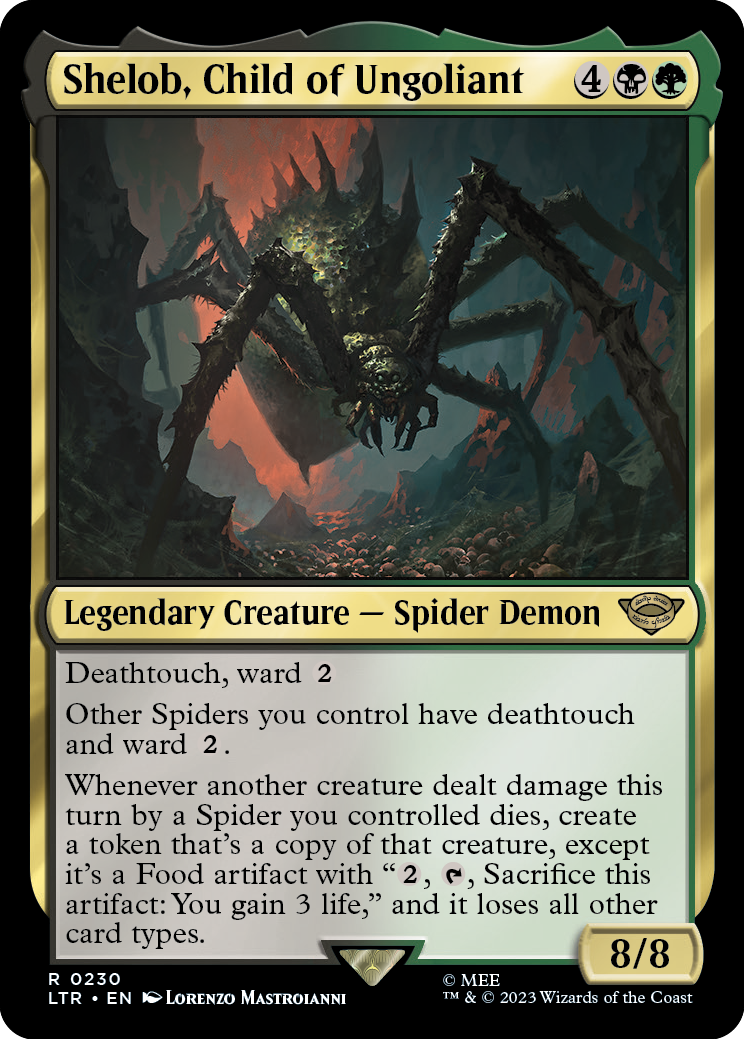
Shelob, Child of Ungoliant
{4}{B}{G}
Legendary Creature — Spider Demon
8/8
Deathtouch, ward {2}
Other Spiders you control have deathtouch and ward {2}.
Whenever another creature dealt damage this turn by a Spider you controlled dies, create a token that's a copy of that creature, except it's a Food artifact with "{2}, {T}, Sacrifice this artifact: You gain 3 life," and it loses all other card types.
- The token copies the creature as it last existed on the battlefield before it died, not as it exists in the graveyard.
- Except for being a Food artifact, having the listed activated ability, and losing all other card types and subtypes, the token copies only what was printed on the original creature (unless that creature is copying something else; see below). It doesn't copy whether that creature was tapped or untapped, whether it had any counters on it or Auras or Equipment attached to it, or any non-copy effects that had changed its power, toughness, types, color, or so on.
- If the copied creature has {X} in its mana cost, X is considered to be 0.
- If the copied creature is a token, the new token that's created copies the original characteristics of that token as stated by the effect that created that token, with the exceptions noted above.
- If the copied creature is copying something else, then the token enters the battlefield as whatever that creature copied, with the exceptions noted above.
- Any enters-the-battlefield abilities of the copied creature will trigger when the token enters the battlefield. Any "as [this creature] enters the battlefield" or "[this creature] enters the battlefield with" abilities of the chosen creature will also work.
- Since the token is a Food artifact and not a creature, it can't attack or block unless it becomes a creature somehow.
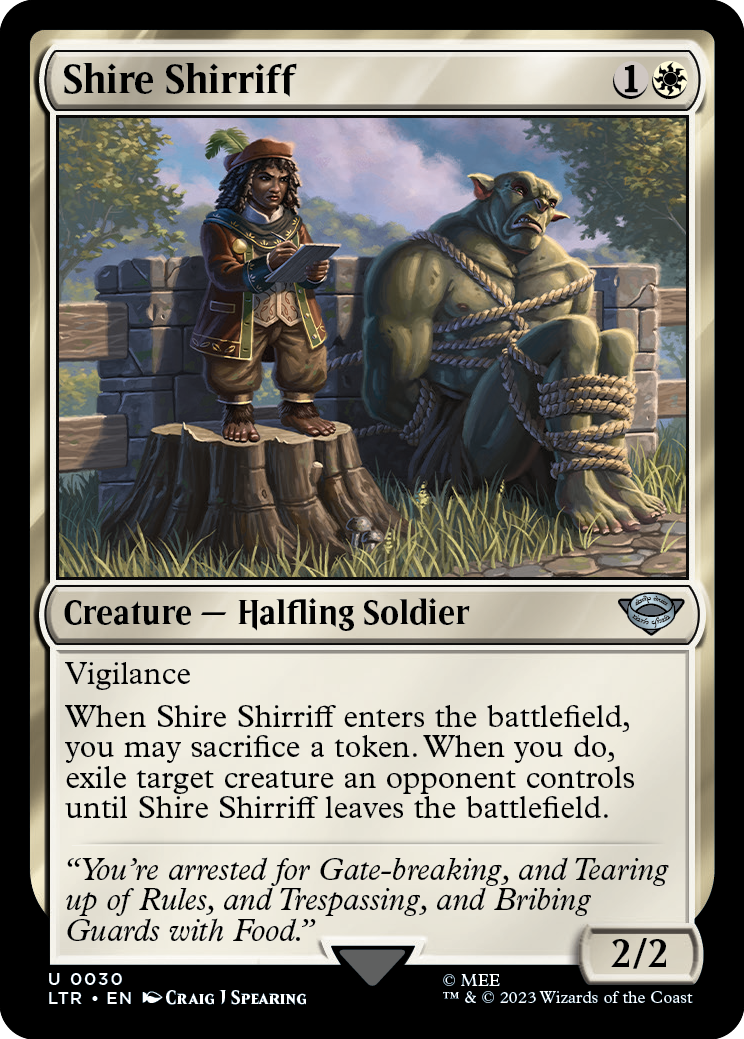
Shire Shirriff
{1}{W}
Creature — Halfling Soldier
2/2
Vigilance
When Shire Shirriff enters the battlefield, you may sacrifice a token. When you do, exile target creature an opponent controls until Shire Shirriff leaves the battlefield.
- You don't choose a target for Shire Shirriff's last ability at the time it triggers. Rather, a second "reflexive" ability triggers when you sacrifice a token this way. You choose a target for that ability as it goes on the stack. Each player may respond to this triggered ability as normal.
- If Shire Shirriff leaves the battlefield before its last ability resolves, you can still sacrifice a token. However, when you do, the target creature won't be exiled when the "reflexive" triggered ability resolves. Similarly, if Shire Shirriff leaves the battlefield while the "reflexive" ability is still on the stack, the target creature won't be exiled.
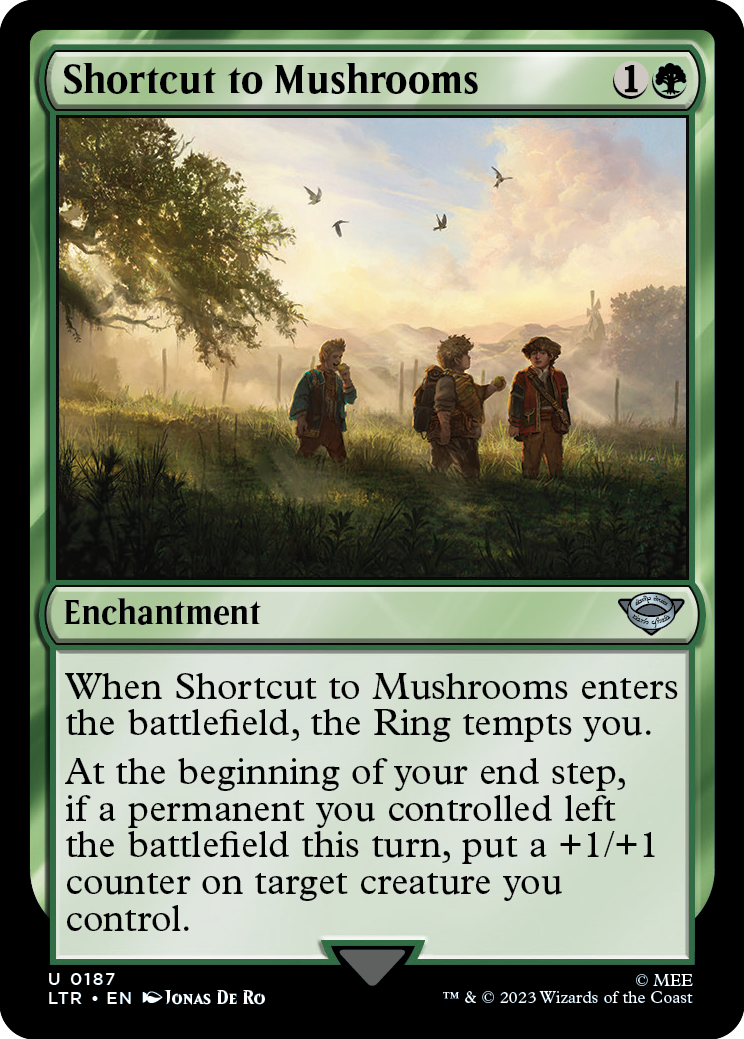
Shortcut to Mushrooms
{1}{G}
Enchantment
When Shortcut to Mushrooms enters the battlefield, the Ring tempts you.
At the beginning of your end step, if a permanent you controlled left the battlefield this turn, put a +1/+1 counter on target creature you control.
- Shortcut to Mushrooms doesn't need to have been on the battlefield when the permanent you controlled left the battlefield. For example, if a creature dies during combat on your turn and you cast Shortcut to Mushrooms during your second main phase, its last ability will trigger at the beginning of your end step.
- Shortcut to Mushrooms's last ability will trigger only once during your end step, no matter how many permanents you controlled left the battlefield this turn. However, if no permanents you control have left the battlefield so far this turn as your end step begins, the ability won't trigger at all. It's not possible to cause a permanent you control to leave the battlefield during the end step in time to have the ability trigger.
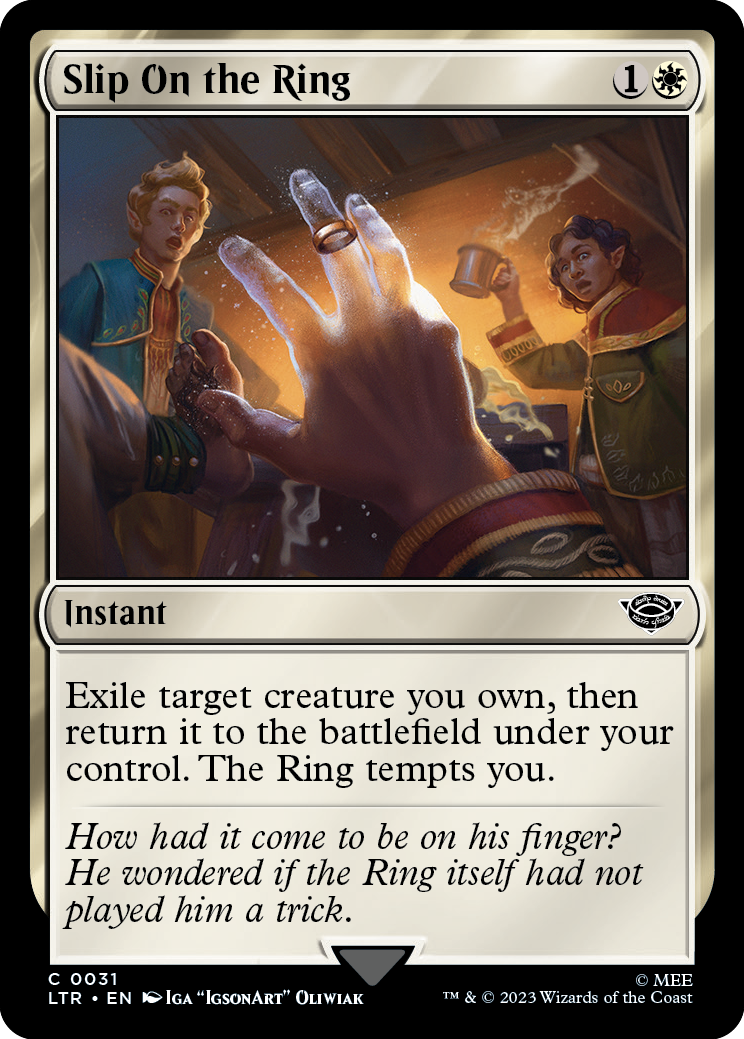
Slip On the Ring
{1}{W}
Instant
Exile target creature you own, then return it to the battlefield under your control. The Ring tempts you.
- Once the exiled creature returns, it's considered a new object with no relation to the object that it was. Auras attached to the exiled creatures will be put into their owners' graveyards. Equipment attached to the exiled creatures will become unattached and remain on the battlefield. Any counters on the exiled creatures will cease to exist.
- If a token is exiled this way, it will cease to exist and won't return to the battlefield.
- You can target a creature you own but don't control with Slip On the Ring.
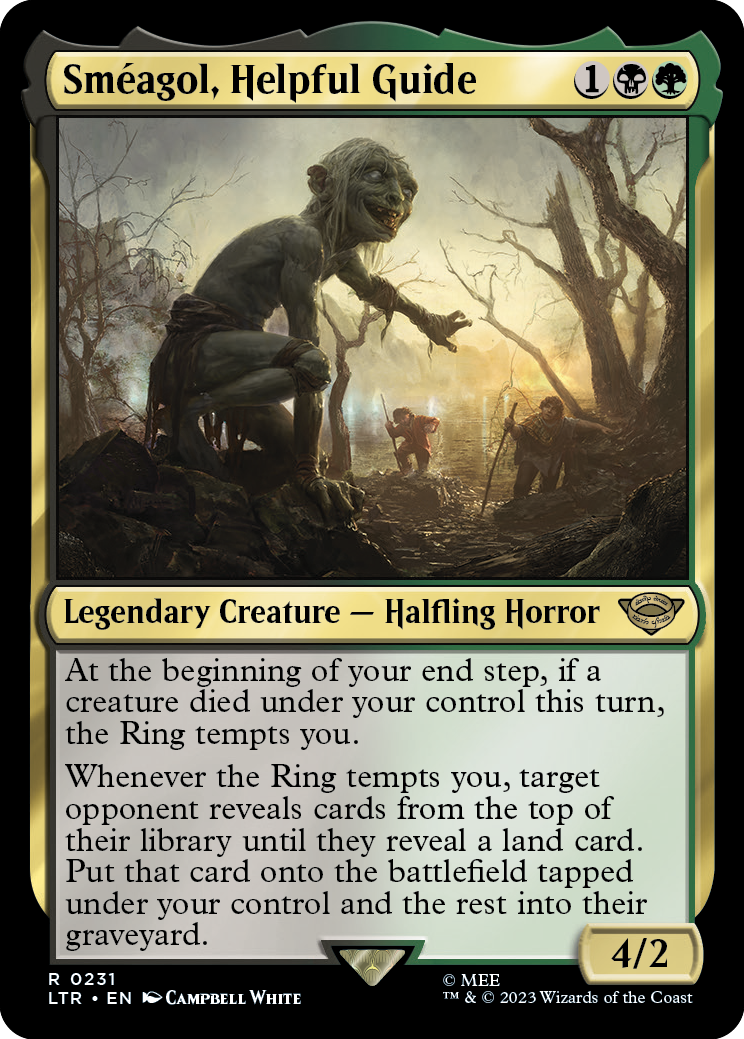
Sméagol, Helpful Guide
{1}{B}{G}
Legendary Creature — Halfling Horror
4/2
At the beginning of your end step, if a creature died under your control this turn, the Ring tempts you.
Whenever the Ring tempts you, target opponent reveals cards from the top of their library until they reveal a land card. Put that card onto the battlefield tapped under your control and the rest into their graveyard.
- Sméagol, Helpful Guide doesn't need to have been on the battlefield when the creature died. For example, if a creature dies under your control during combat on your turn and you cast Sméagol, Helpful Guide during your second main phase, its first ability will trigger at the beginning of your end step.
- Sméagol, Helpful Guide's first ability will trigger only once during your end step, no matter how many creatures died under your control this turn. However, if no creatures have died under your control so far this turn as your end step begins, the ability won't trigger at all. It's not possible to cause a creature to die under your control during the end step in time to have the ability trigger.
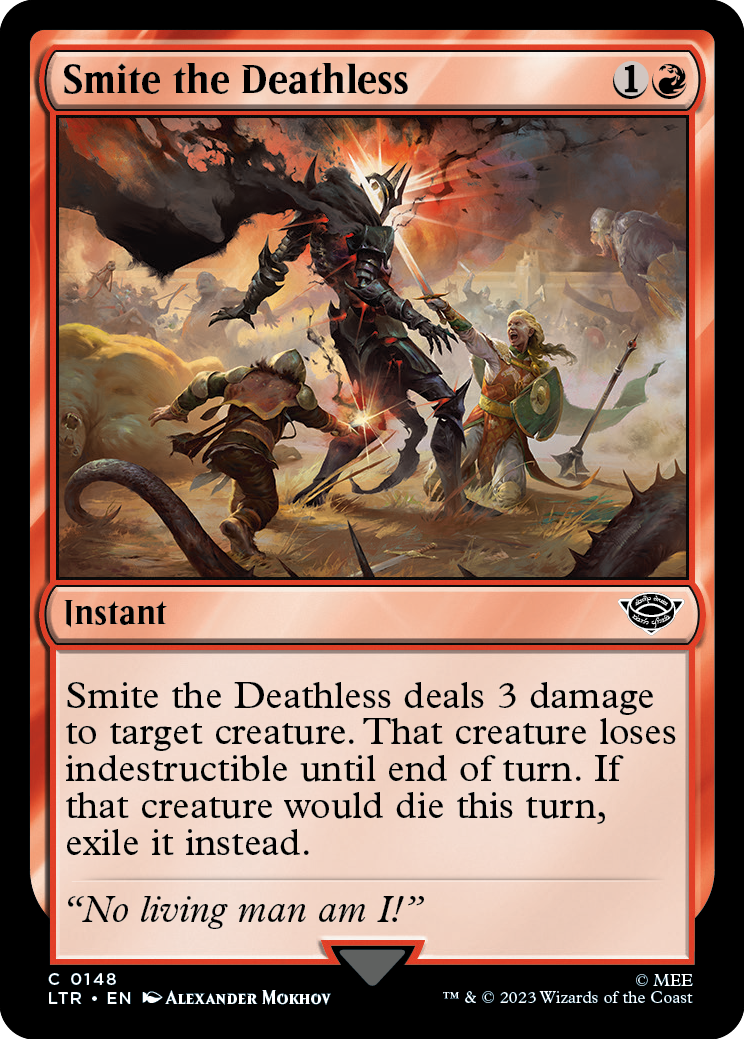
Smite the Deathless
{1}{R}
Instant
Smite the Deathless deals 3 damage to target creature. That creature loses indestructible until end of turn. If that creature would die this turn, exile it instead.
- The damaged creature will be exiled if it would die for any reason that turn, not just if it dies due to damage from Smite the Deathless.
- If Smite the Deathless doesn't deal damage to the target creature (perhaps because that damage was prevented), the additional effects will still apply. It will still lose indestructible, and it will be exiled instead of dying that turn.
- You can target a creature that doesn't have indestructible with Smite the Deathless. It will still be exiled if it would die this turn.
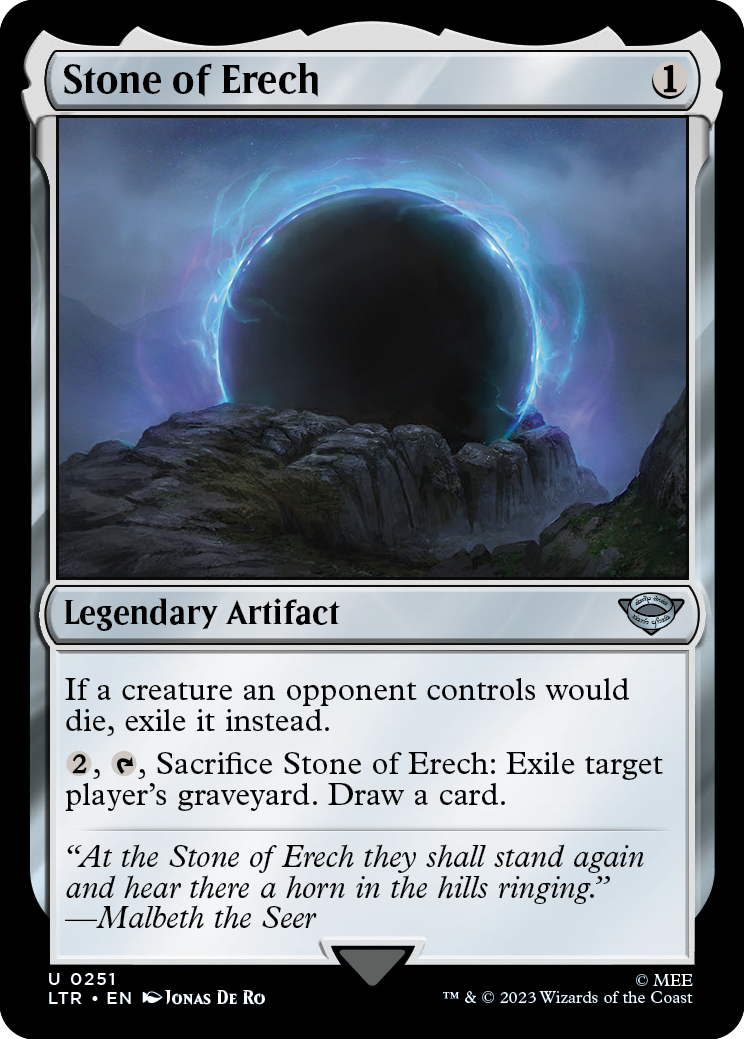
Stone of Erech
{1}
Legendary Artifact
If a creature an opponent controls would die, exile it instead.
{2}, {T}, Sacrifice Stone of Erech: Exile target player's graveyard. Draw a card.
- Because creatures controlled by opponents aren't being put into a graveyard, any "when [this creature] dies" triggered abilities those creatures have won't trigger.
- If the target is not legal as Stone of Erech's activated ability tries to resolve, the ability is removed from the stack. You won't draw a card.
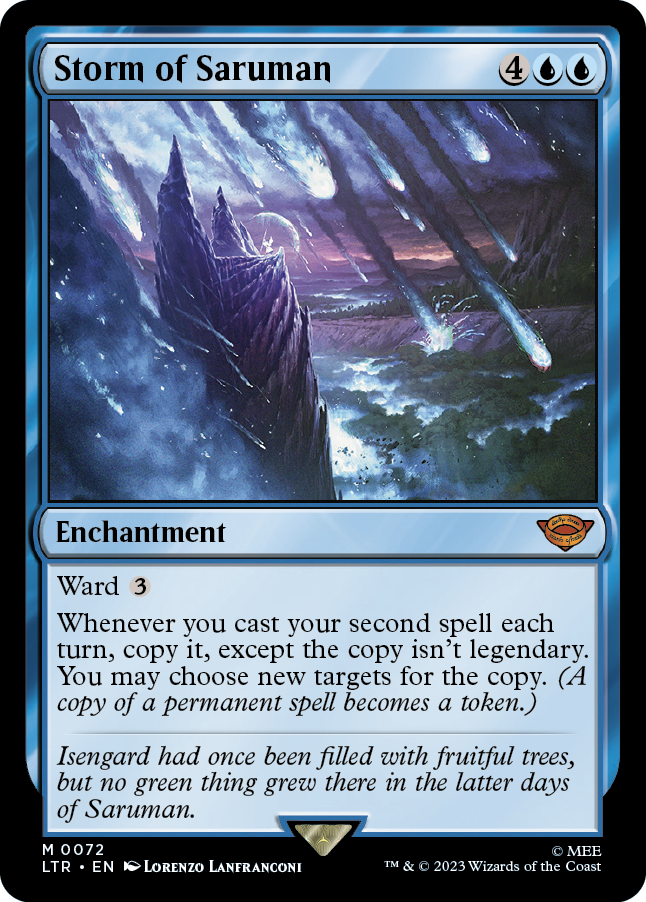
Storm of Saruman
{4}{U}{U}
Enchantment
Ward {3}
Whenever you cast your second spell each turn, copy it, except the copy isn't legendary. You may choose new targets for the copy. (A copy of a permanent spell becomes a token.)
- Spells that were cast before Storm of Saruman count. If Storm of Saruman was the first spell you cast this turn, the next spell you cast this turn is your second spell.
- The copy is created on the stack, so it's not "cast." Creating the copy won't cause abilities that trigger when a player casts a spell to trigger.
- If the spell that's copied is modal (that is, it says "Choose one —" or the like), the copy will have the same mode or modes. You can't choose different ones.
- If the spell that's copied has an X whose value was determined as it was cast, the copy has the same value of X.
- You can't choose to pay any additional costs for a copied spell. However, effects based on any additional costs that were paid for the original spell are copied as though those same costs were paid for the copy too.
- If the spell has damage divided as it was put onto the stack, the division can't be changed, although the targets receiving that damage still can. The same is true of spells that distribute counters.
- Any choices made when the spell resolves won't have been made yet when it's copied. Any such choices will be made separately when the copy resolves.
- The copy will have the same targets as the spell it's copying unless you choose new ones. You may change any number of the targets, including all of them or none of them. If the spell is a permanent spell with targets, such as an Aura, you may also choose a new target for that spell. The new targets must be legal. If, for any target, you can't choose a new legal target, then it remains unchanged (even if the current target is illegal).
- If a permanent spell is copied, it's put onto the battlefield as a token as the spell resolves rather than putting the copy of the spell onto the battlefield. The rules that apply to a permanent spell becoming a permanent apply to a copy of a spell becoming a token.
- The token that a resolving copy of a permanent spell becomes isn't said to have been "created" and won't interact with abilities that care about tokens being created, such as that of Rosie Cotton of South Lane.
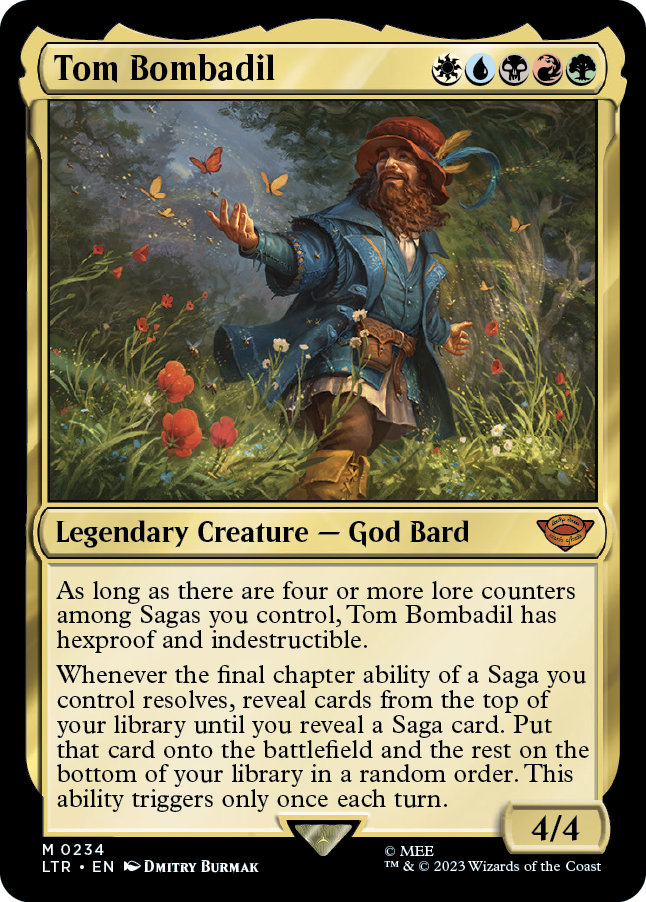
Tom Bombadil
{W}{U}{B}{R}{G}
Legendary Creature — God Bard
4/4
As long as there are four or more lore counters among Sagas you control, Tom Bombadil has hexproof and indestructible.
Whenever the final chapter ability of a Saga you control resolves, reveal cards from the top of your library until you reveal a Saga card. Put that card onto the battlefield and the rest on the bottom of your library in a random order. This ability triggers only once each turn.
- Damage dealt to creatures remains on those creatures until the cleanup step or until an effect removes that damage. If you control Tom Bombadil with at least 4 damage on it as well as a single Saga which has four or more lore counters on it, and that Saga leaves the battlefield later in the turn, Tom Bombadil will be destroyed. This will be true even if that Saga leaves the battlefield as a result of its final chapter ability leaving the stack; state-based actions will be checked before Tom Bombadil's triggered ability could get you another Saga.
- The final chapter ability of a Saga is the ability with the greatest chapter number among chapter abilities that Saga has.
- An ability that triggers when another ability resolves, such as Tom Bombadil's triggered ability, triggers when all of its instructions (as modified by applicable replacement effects) have been followed and it has been removed from the stack. For example, if Tom Bombadil is returned to the battlefield by the final chapter ability of Elspeth Conquers Death, it will be on the battlefield in time to see that final chapter ability finish resolving and get removed from the stack, and thus Tom Bombadil's last ability will trigger.
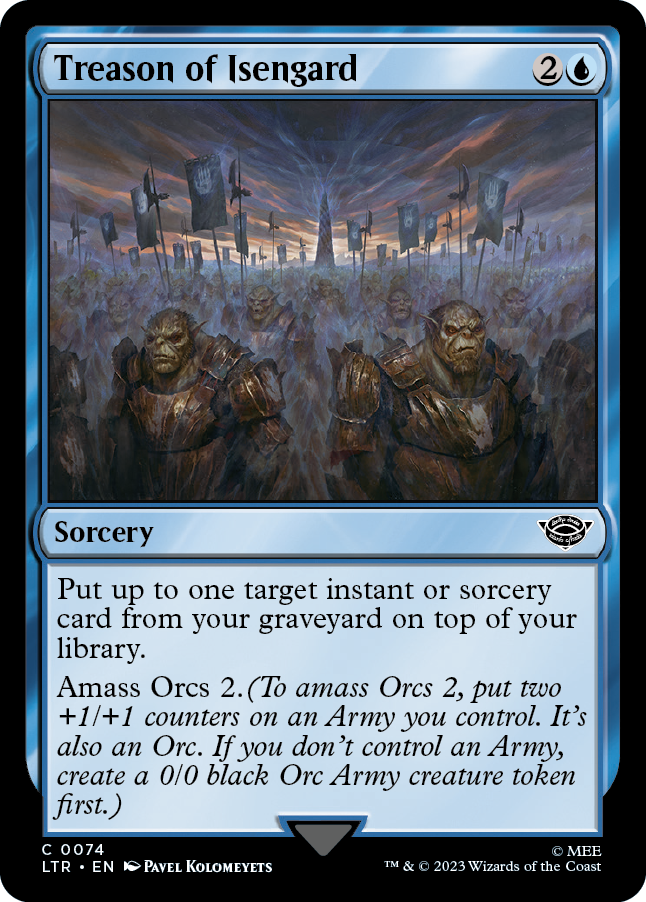
Treason of Isengard
{2}{U}
Sorcery
Put up to one target instant or sorcery card from your graveyard on top of your library.
Amass Orcs 2. (To amass Orcs 2, put two +1/+1 counters on an Army you control. It's also an Orc. If you don't control an Army, create a 0/0 black Orc Army creature token first.)
- You can cast Treason of Isengard without a target just to amass Orcs. However, if you do choose a target, and that target is illegal at the time Treason of Isengard tries to resolve, Treason of Isengard won't resolve and none of its effects will happen. You won't amass Orcs.
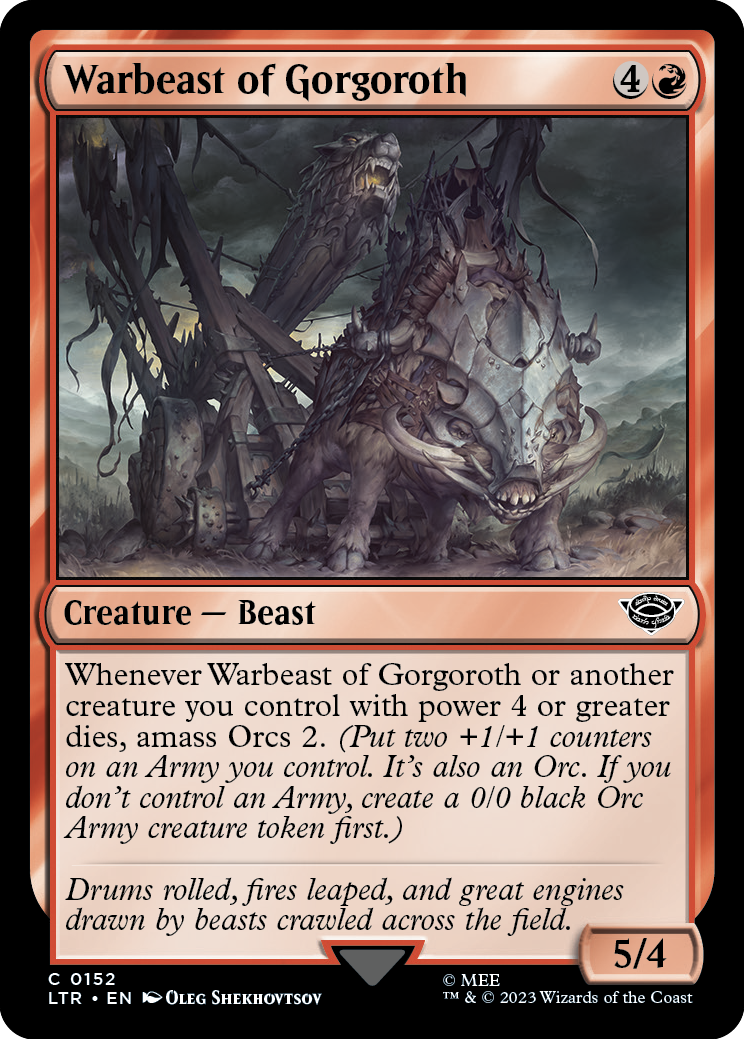
Warbeast of Gorgoroth
{4}{R}
Creature — Beast
5/4
Whenever Warbeast of Gorgoroth or another creature you control with power 4 or greater dies, amass Orcs 2. (Put two +1/+1 counters on an Army you control. It's also an Orc. If you don't control an Army, create a 0/0 black Orc Army creature token first.)
- If Warbeast of Gorgoroth and one or more other creatures you control with power 4 or greater die at the same time, its ability will trigger once for each of them.
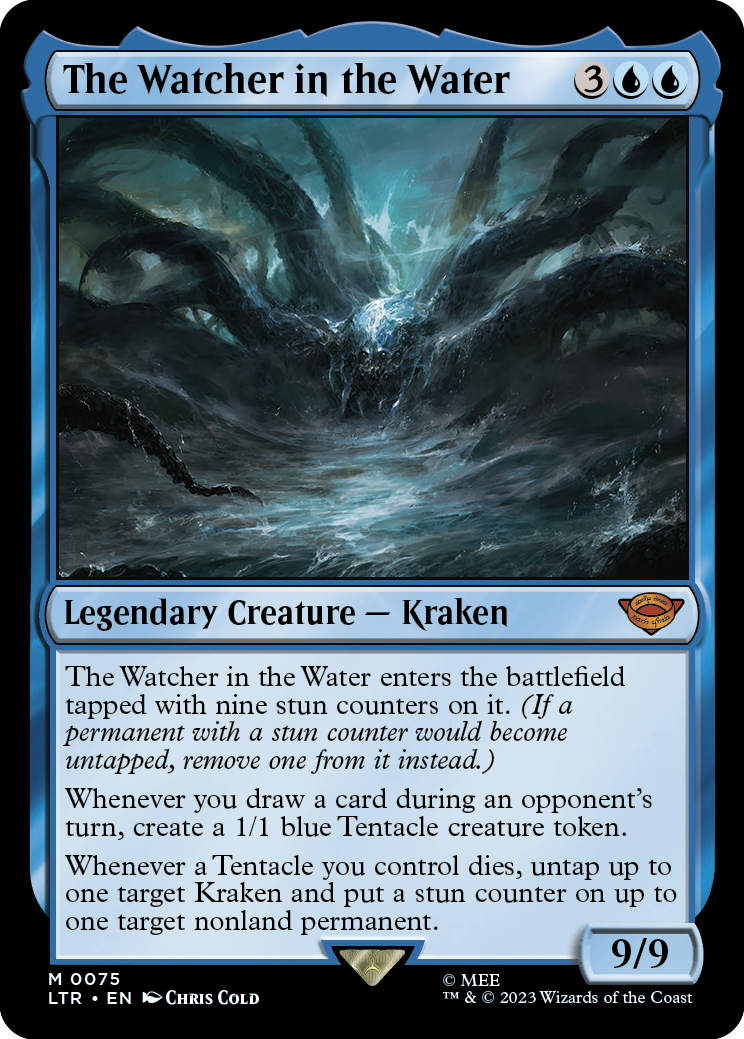
The Watcher in the Water
{3}{U}{U}
Legendary Creature — Kraken
9/9
The Watcher in the Water enters the battlefield tapped with nine stun counters on it. (If a permanent with a stun counter would become untapped, remove one from it instead.)
Whenever you draw a card during an opponent's turn, create a 1/1 blue Tentacle creature token.
Whenever a Tentacle you control dies, untap up to one target Kraken and put a stun counter on up to one target nonland permanent.
- For the last ability, the target Kraken can (and probably will) be The Watcher in the Water. If it is, and if it has at least one stun counter on it, you'll remove a stun counter from it instead of untapping it.
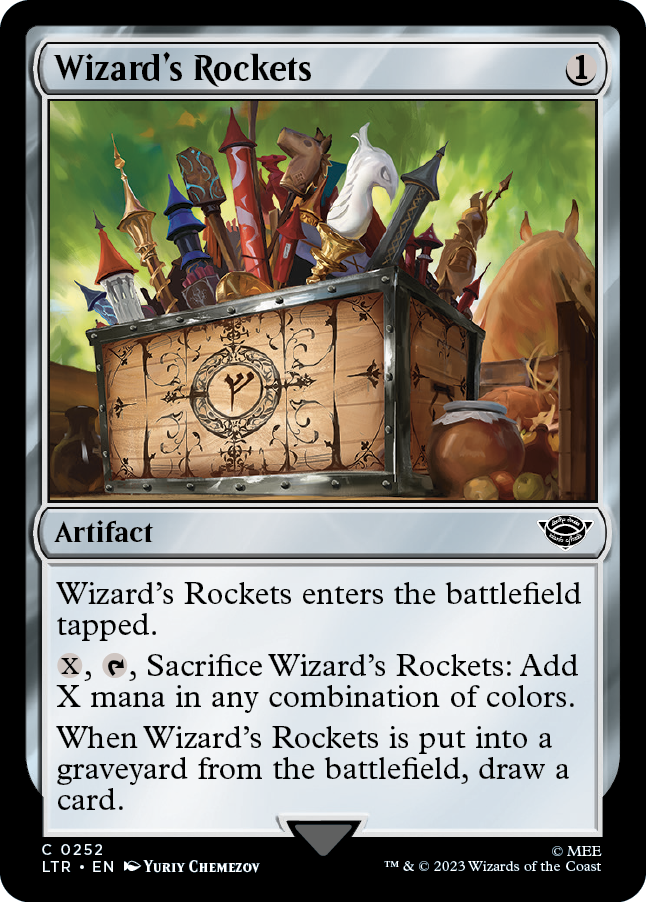
Wizard's Rockets
{1}
Artifact
Wizard's Rockets enters the battlefield tapped.
{X}, {T}, Sacrifice Wizard's Rockets: Add X mana in any combination of colors.
When Wizard's Rockets is put into a graveyard from the battlefield, draw a card.
- You must choose the colors of mana Wizard's Rockets produces before its last ability has you draw a card.
- Wizard's Rockets last ability triggers no matter how it's put into a graveyard from the battlefield.
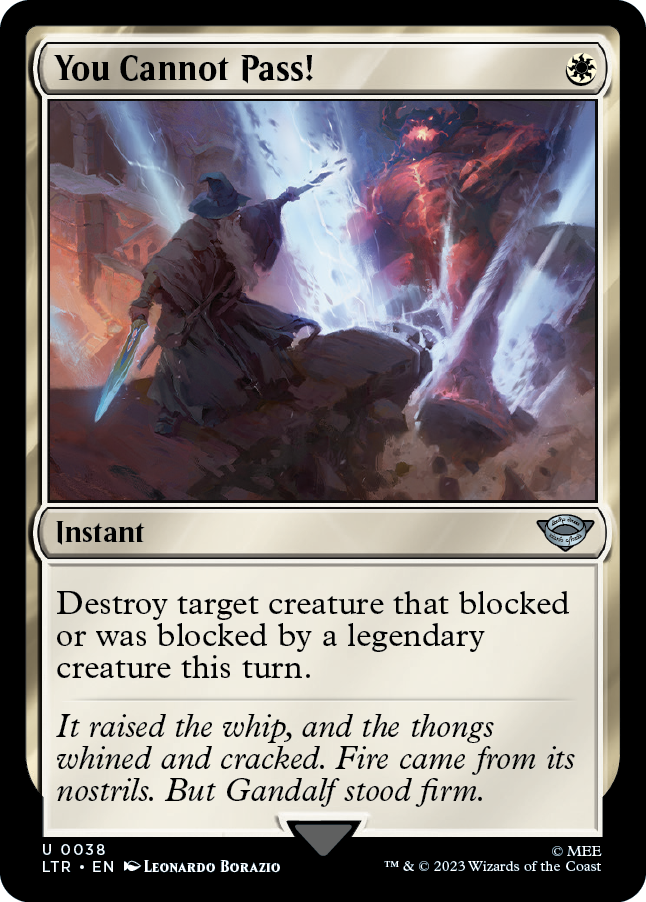
You Cannot Pass!
{W}
Instant
Destroy target creature that blocked or was blocked by a legendary creature this turn.
- You Cannot Pass! can target a creature that's currently blocking or being blocked by a legendary creature, or one that blocked or was blocked by a legendary creature earlier in the turn.
- You Cannot Pass! only cares that the second creature was a legendary creature at the moment it blocked or became blocked by the target creature. If that legendary creature has become a nonlegendary creature (perhaps because it's no longer your Ring-bearer) or left the battlefield, You Cannot Pass! can still target the first creature.
THE LORD OF THE RINGS: TALES OF MIDDLE-EARTH JUMPSTART CARD-SPECIFIC NOTES
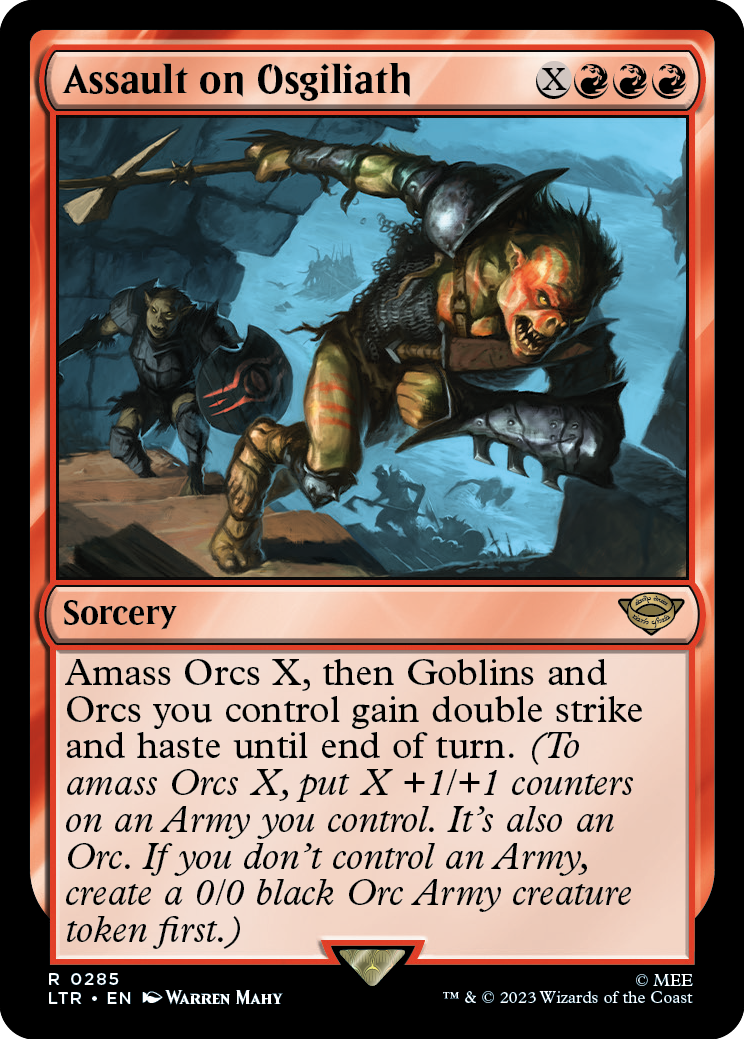
Assault on Osgiliath
{X}{R}{R}{R}
Sorcery
Amass Orcs X, then Goblins and Orcs you control gain double strike and haste until end of turn. (To amass Orcs X, put X +1/+1 counters on an Army you control. It's also an Orc. If you don't control an Army, create a 0/0 black Orc Army creature token first.)
- If you choose a value of 0 for X while you don't control an Army, you will create a 0/0 Orc Army creature token and won't put any counters on it. In most cases, that 0/0 token will die immediately.
- If you choose a value of 0 for X while you control a non-Orc Army, you won't put any counters on it, but it will become an Orc in addition to its other types.
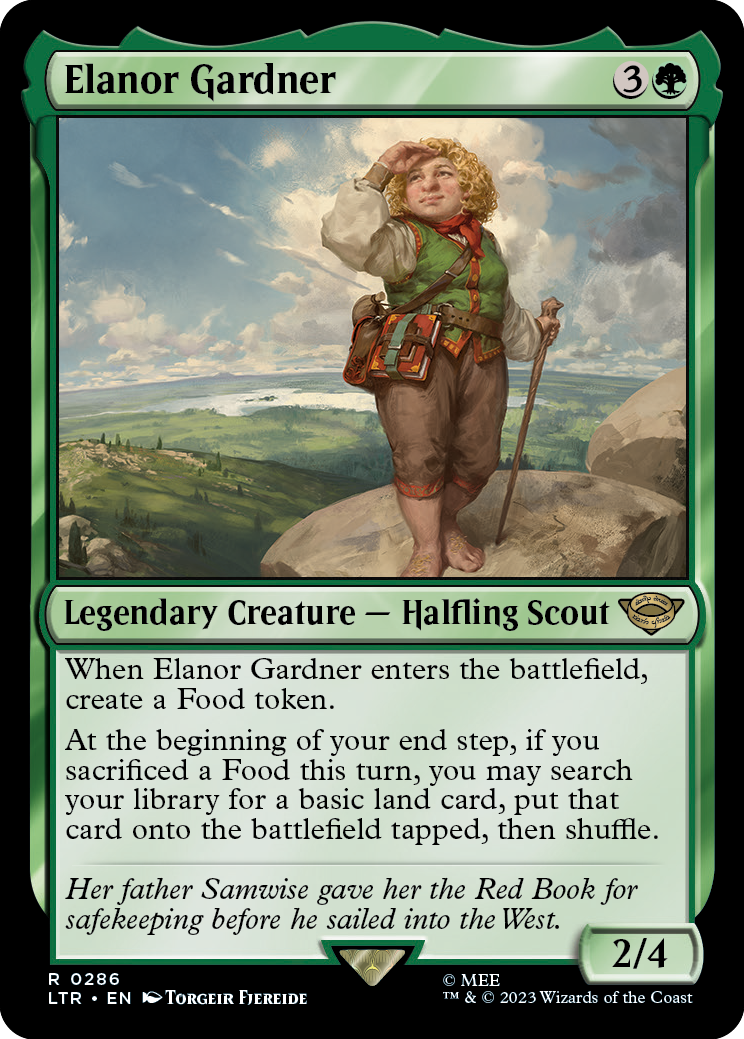
Elanor Gardner
{3}{G}
Legendary Creature — Halfling Scout
2/4
When Elanor Gardner enters the battlefield, create a Food token.
At the beginning of your end step, if you sacrificed a Food this turn, you may search your library for a basic land card, put that card onto the battlefield tapped, then shuffle.
- Elanor Gardner doesn't need to have been on the battlefield when you sacrificed a Food this turn. For example, if you sacrifice a Food during your first main phase and you cast Elanor Gardner during your second main phase, its last ability will trigger at the beginning of your end step.
- Elanor Gardner's last ability will trigger only once during your end step, no matter how many Foods you sacrificed this turn. However, if you haven't sacrificed any Foods this turn as your end step begins, the ability won't trigger at all. It's not possible to sacrifice a Food during the end step in time to have the ability trigger.
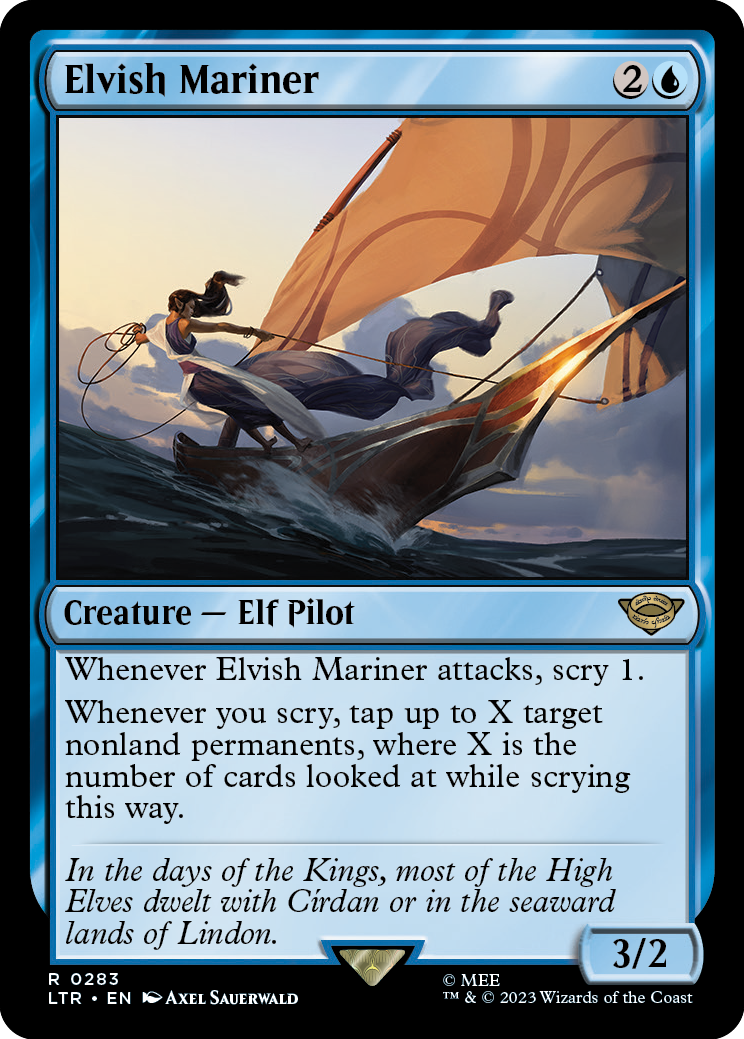
Elvish Mariner
{2}{U}
Creature — Elf Pilot
3/2
Whenever Elvish Mariner attacks, scry 1.
Whenever you scry, tap up to X target nonland permanents, where X is the number of cards looked at while scrying this way.
- Elvish Mariner's last ability cares about the number of cards you actually looked at. For example, if you were supposed to scry 3 but only had two cards in your library, X would be 2.
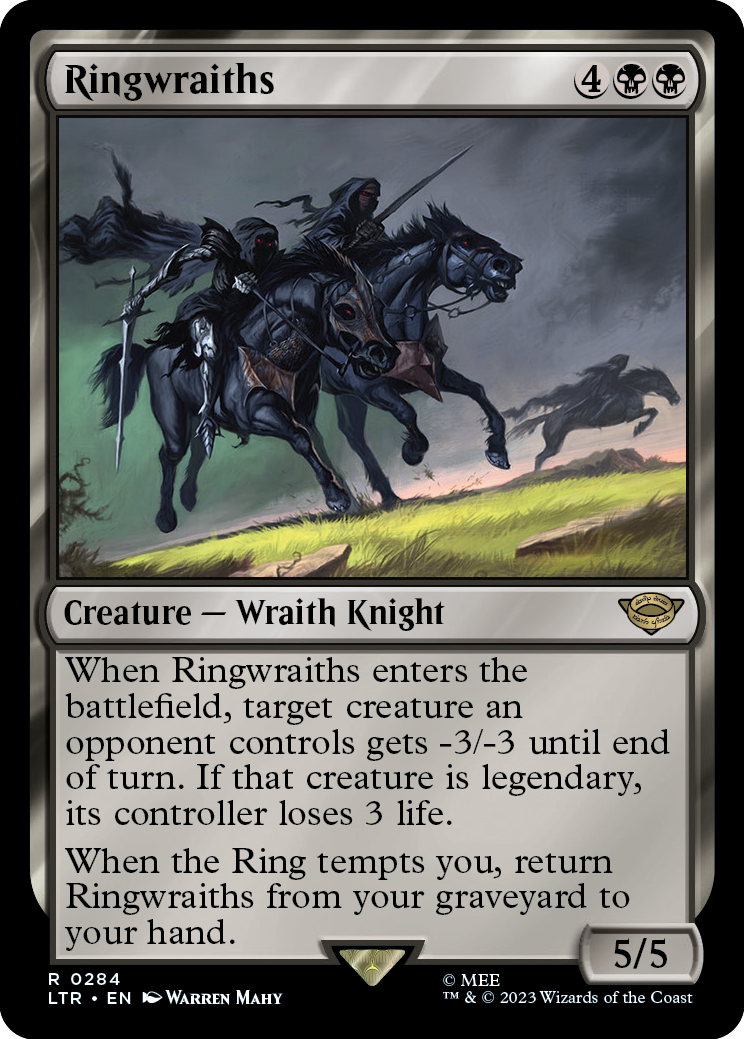
Ringwraiths
{4}{B}{B}
Creature — Wraith Knight
5/5
When Ringwraiths enters the battlefield, target creature an opponent controls gets -3/-3 until end of turn. If that creature is legendary, its controller loses 3 life.
When the Ring tempts you, return Ringwraiths from your graveyard to your hand.
- If the target is not legal as Ringwraiths's first ability tries to resolve, the ability is removed from the stack. The creature's controller won't lose life.
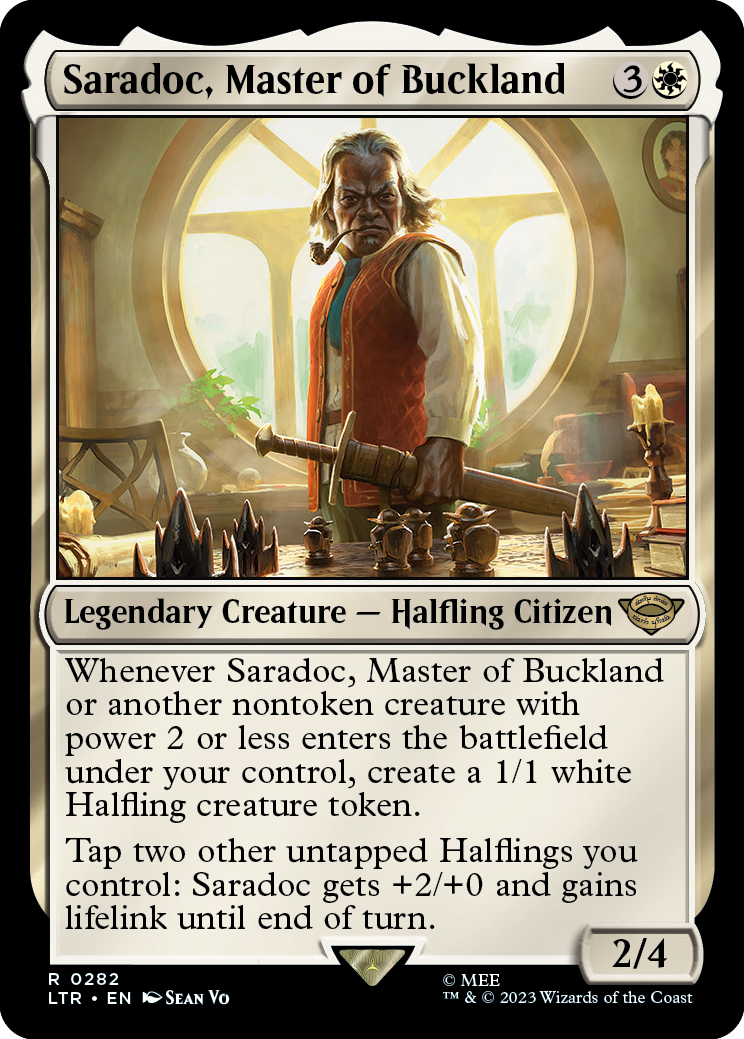
Saradoc, Master of Buckland
{3}{W}
Legendary Creature — Halfling Citizen
2/4
Whenever Saradoc, Master of Buckland or another nontoken creature with power 2 or less enters the battlefield under your control, create a 1/1 white Halfling creature token.
Tap two other untapped Halflings you control: Saradoc gets +2/+0 and gains lifelink until end of turn.
- If Saradoc, Master of Buckland's power is greater than 2 as it enters the battlefield, its first ability will still trigger.
THE LORD OF THE RINGS: TALES OF MIDDLE-EARTH STARTER KIT CARD-SPECIFIC NOTES
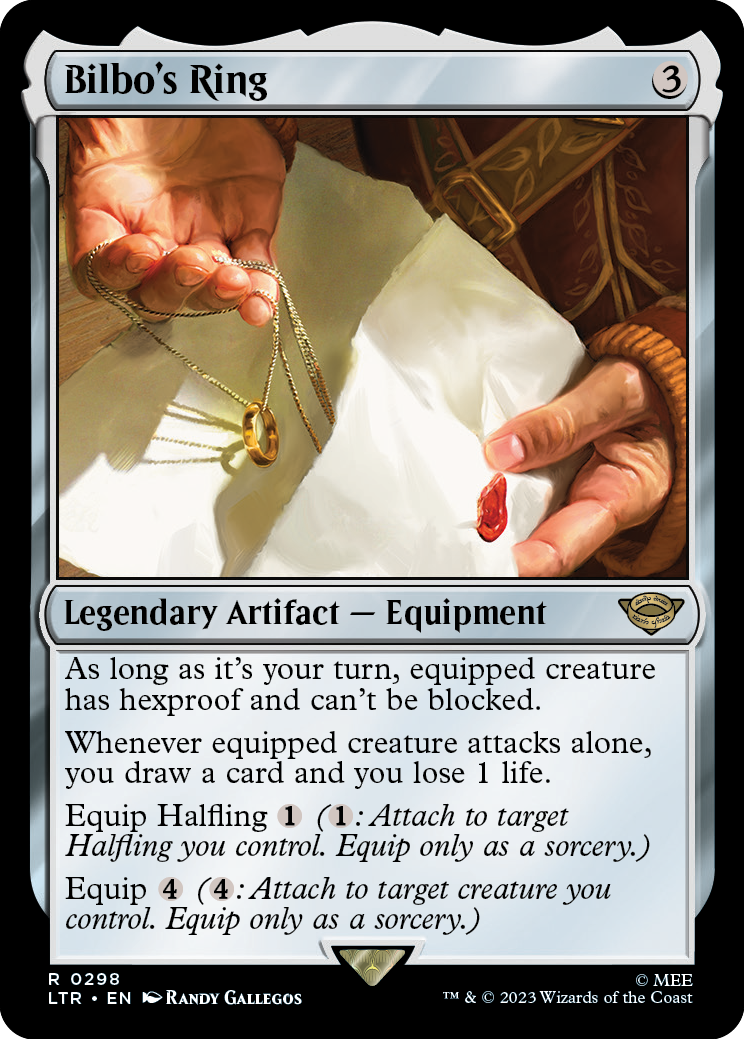
Bilbo's Ring
{3}
Legendary Artifact — Equipment
As long as it's your turn, equipped creature has hexproof and can't be blocked.
Whenever equipped creature attacks alone, you draw a card and you lose 1 life.
Equip Halfling {1} ({1}: Attach to target Halfling you control. Equip only as a sorcery.)
Equip {4} ({4}: Attach to target creature you control. Equip only as a sorcery.)
- A creature attacks alone if it's the only creature declared as an attacker during the declare attackers step. For example, Bilbo's Ring's second ability won't trigger if you attack with multiple creatures and all but one of them are removed from combat.
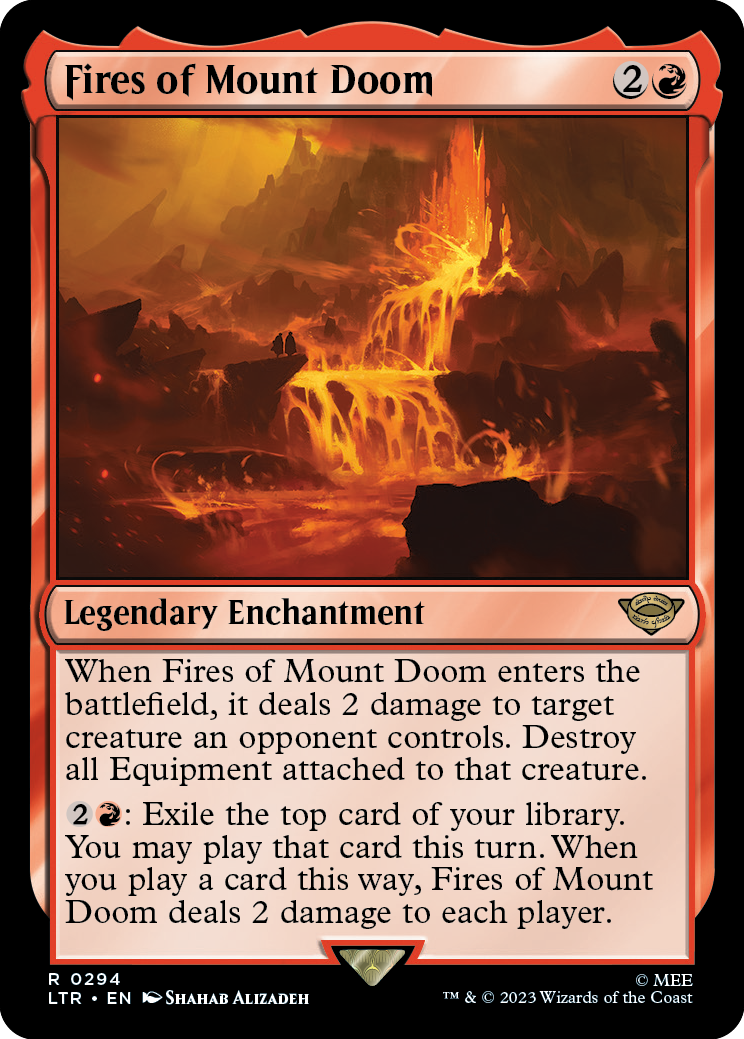
Fires of Mount Doom
{2}{R}
Legendary Enchantment
When Fires of Mount Doom enters the battlefield, it deals 2 damage to target creature an opponent controls. Destroy all Equipment attached to that creature.
{2}{R}: Exile the top card of your library. You may play that card this turn. When you play a card this way, Fires of Mount Doom deals 2 damage to each player.
- Fires of Mount Doom's first ability can target a creature that has no Equipment attached to it.
- If the target of Fires of Mount Doom's first ability is illegal by the time the ability tries to resolve, it's removed from the stack. You won't destroy any Equipment.
- If you activate Fires of Mount Doom's last ability but don't play the exiled card this turn using that casting permission, Fires of Mount Doom won't deal damage to each player.
- You pay all costs and follow all normal timing rules for a card played this way. For example, if the exiled card is a land card, you may play it only during your main phase while the stack is empty.
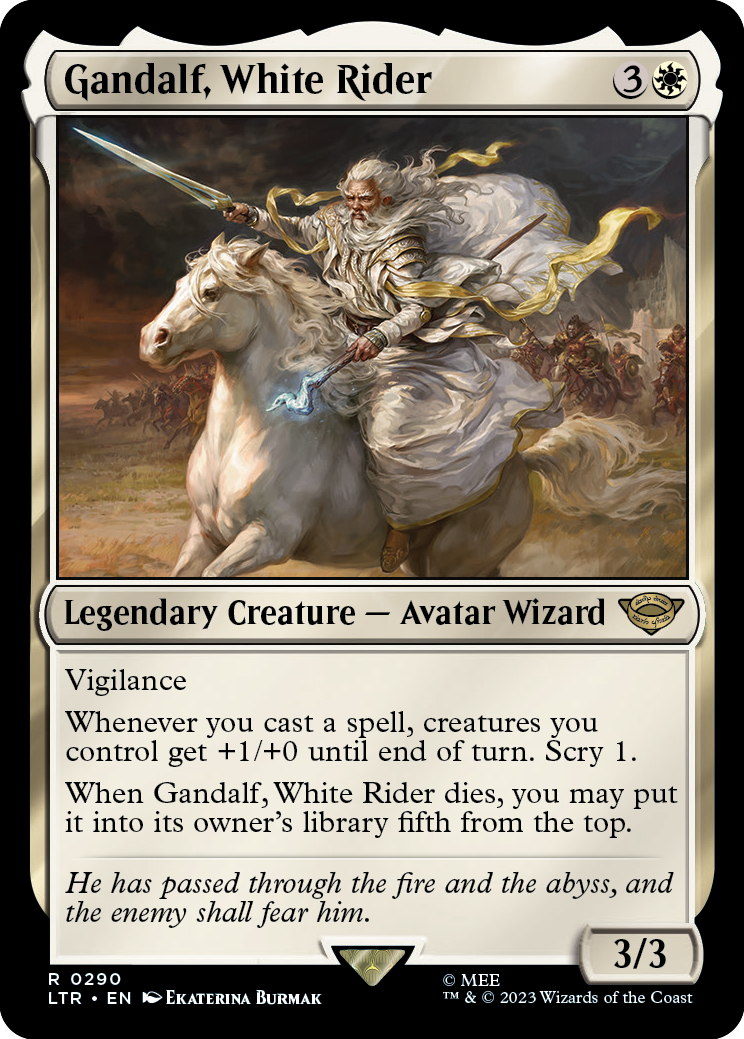
Gandalf, White Rider
{3}{W}
Legendary Creature — Avatar Wizard
3/3
Vigilance
Whenever you cast a spell, creatures you control get +1/+0 until end of turn. Scry 1.
When Gandalf, White Rider dies, you may put it into its owner's library fifth from the top.
- If Gandalf, White Rider's owner has three or fewer cards left in their library when the last ability resolves, you may have it become the bottom card of their library.
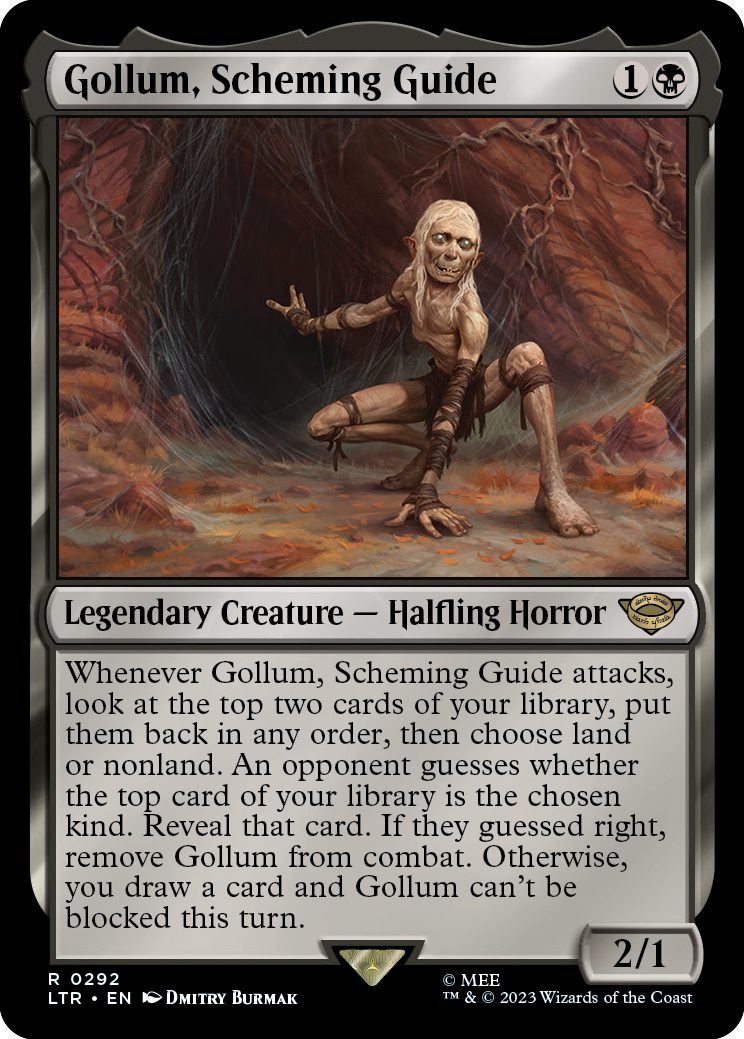
Gollum, Scheming Guide
{1}{B}
Legendary Creature — Halfling Horror
2/1
Whenever Gollum, Scheming Guide attacks, look at the top two cards of your library, put them back in any order, then choose land or nonland. An opponent guesses whether the top card of your library is the chosen kind. Reveal that card. If they guessed right, remove Gollum from combat. Otherwise, you draw a card and Gollum can't be blocked this turn.
- You reveal the card even if your opponent guessed correctly.
- If you only have one card in your library as Gollum, Scheming Guide's ability resolves, you'll look at that card, put it back on top of your library, and then continue with the ability as normal.
- If you have no cards in your library as Gollum, Scheming Guide's ability resolves, your opponent's guess will not be right no matter what they guess. That means you'll draw a card, or more accurately, attempt to draw a card from your empty library and therefore (usually) lose the game.
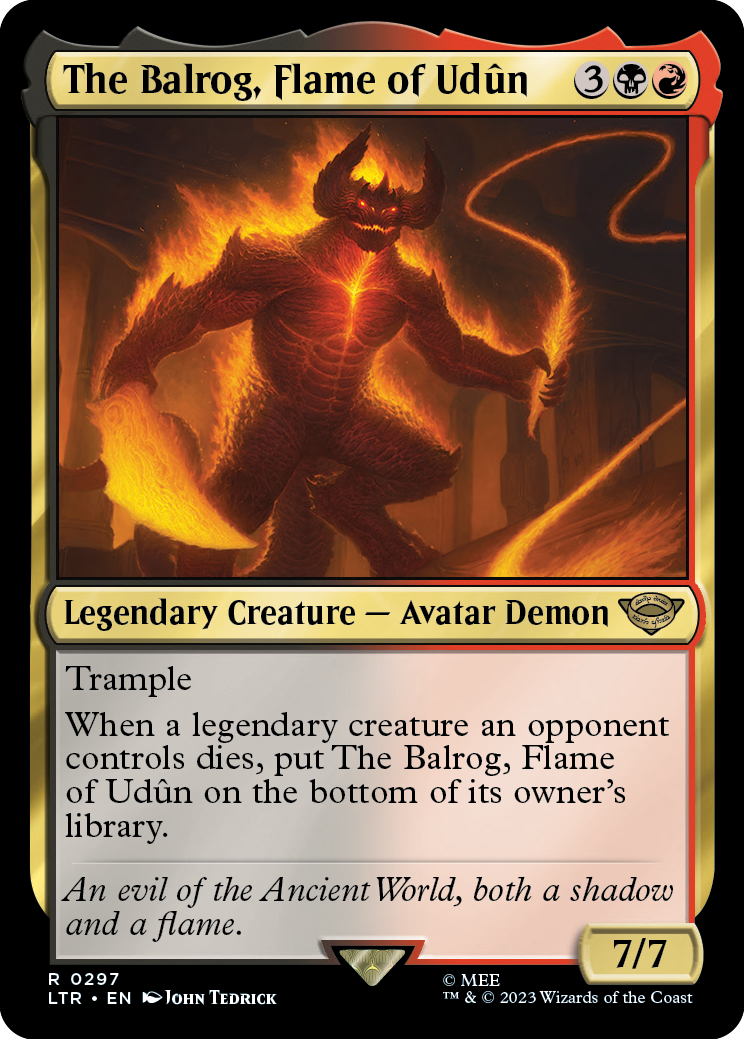
The Balrog, Flame of Udûn
{3}{B}{R}
Legendary Creature — Avatar Demon
7/7
Trample
When a legendary creature an opponent controls dies, put The Balrog, Flame of Udûn on the bottom of its owner's library.
- The Balrog, Flame of Udûn will be put on the bottom of its owner's library only if it's still on the battlefield when the ability resolves. If it leaves the battlefield before that point, it will stay in whatever zone it's in, even if it's returned to the battlefield before the ability resolves.
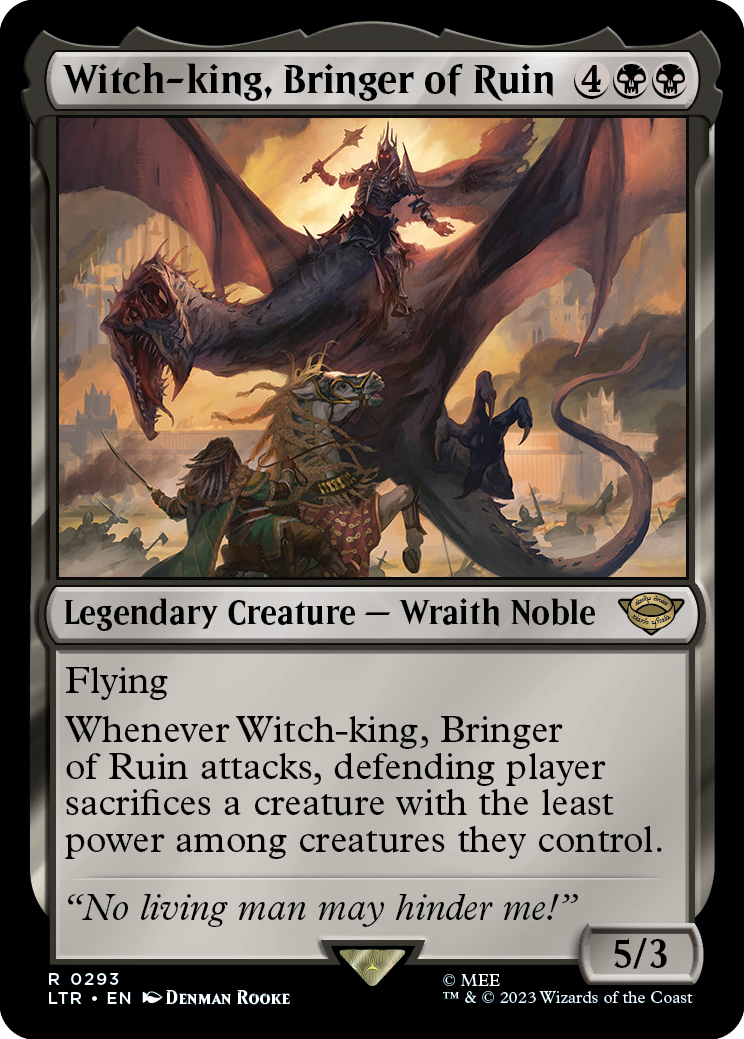
Witch-king, Bringer of Ruin
{4}{B}{B}
Legendary Creature — Wraith Noble
5/3
Flying
Whenever Witch-king, Bringer of Ruin attacks, defending player sacrifices a creature with the least power among creatures they control.
- If the defending player controls two or more creatures tied for the least power among creatures they control, that player chooses one of them to sacrifice.
THE LORD OF THE RINGS: TALES OF MIDDLE-EARTH COMMANDER CARD-SPECIFIC NOTES

Aragorn, King of Gondor
{1}{U}{R}{W}
Legendary Creature — Human Noble
4/4
Vigilance, lifelink
When Aragorn, King of Gondor enters the battlefield, you become the monarch.
Whenever Aragorn attacks, up to one target creature can't block this turn. If you're the monarch, creatures can't block this turn.
- When Aragorn, King of Gondor's last ability triggers, you can choose not to target a creature, probably because you're the monarch and just want creatures to be unable to block this turn. However, if you do choose a target, and that target is illegal at the time the ability tries to resolve, the ability won't resolve and none of its effects will happen. Creatures will still be able to block this turn, even if you're the monarch.
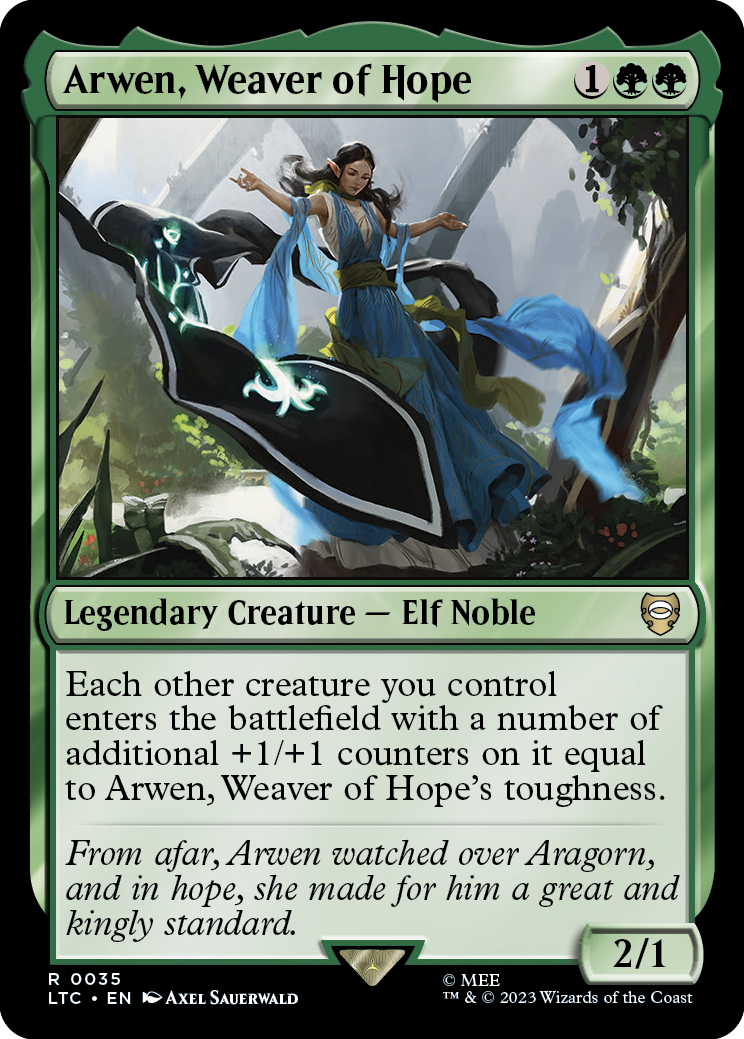
Arwen, Weaver of Hope
{1}{G}{G}
Legendary Creature — Elf Noble
2/1
Each other creature you control enters the battlefield with a number of additional +1/+1 counters on it equal to Arwen, Weaver of Hope's toughness.
- To determine how many additional +1/+1 counters a creature enters the battlefield with, use Arwen, Weaver of Hope's toughness as that creature is entering the battlefield.
- If Arwen, Weaver of Hope and another creature you control enter the battlefield at the same time, Arwen's ability won't cause that creature to enter with additional +1/+1 counters on it.
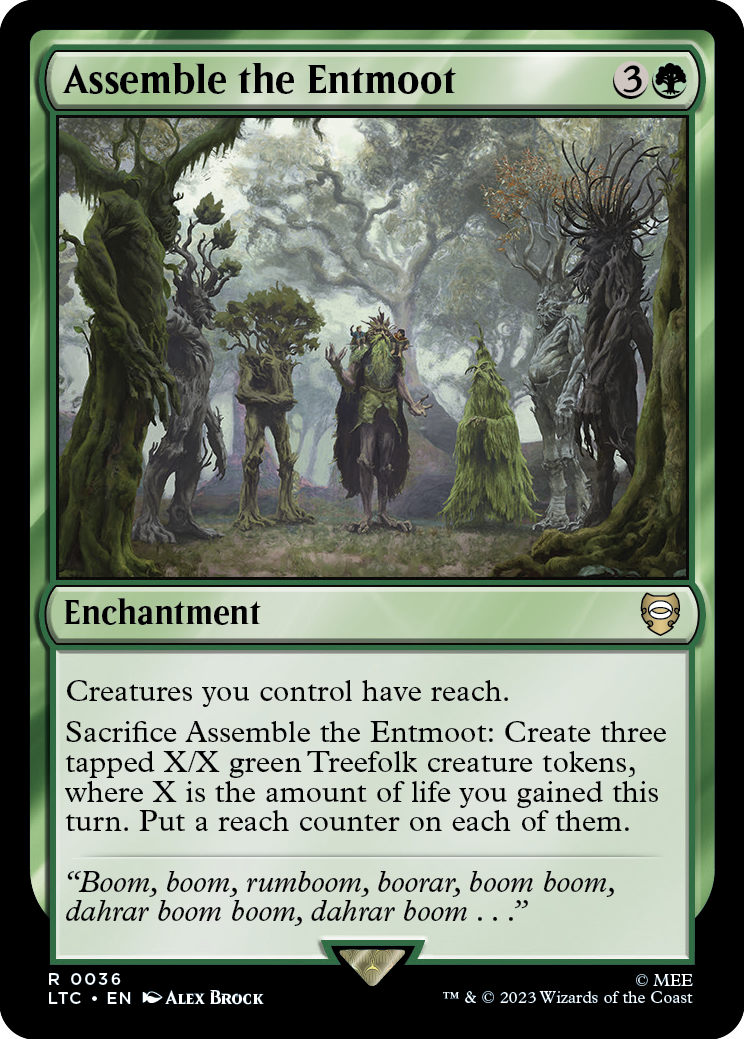
Assemble the Entmoot
{3}{G}
Enchantment
Creatures you control have reach.
Sacrifice Assemble the Entmoot: Create three tapped X/X green Treefolk creature tokens, where X is the amount of life you gained this turn. Put a reach counter on each of them.
- Assemble the Entmoot's activated ability counts the total amount of life you gained without taking into account any life you lost during that turn. For example, if you gained 3 life and lost 3 life earlier in the turn, you'll create three tapped 3/3 green Treefolk creature tokens, then put a reach counter on each of them.
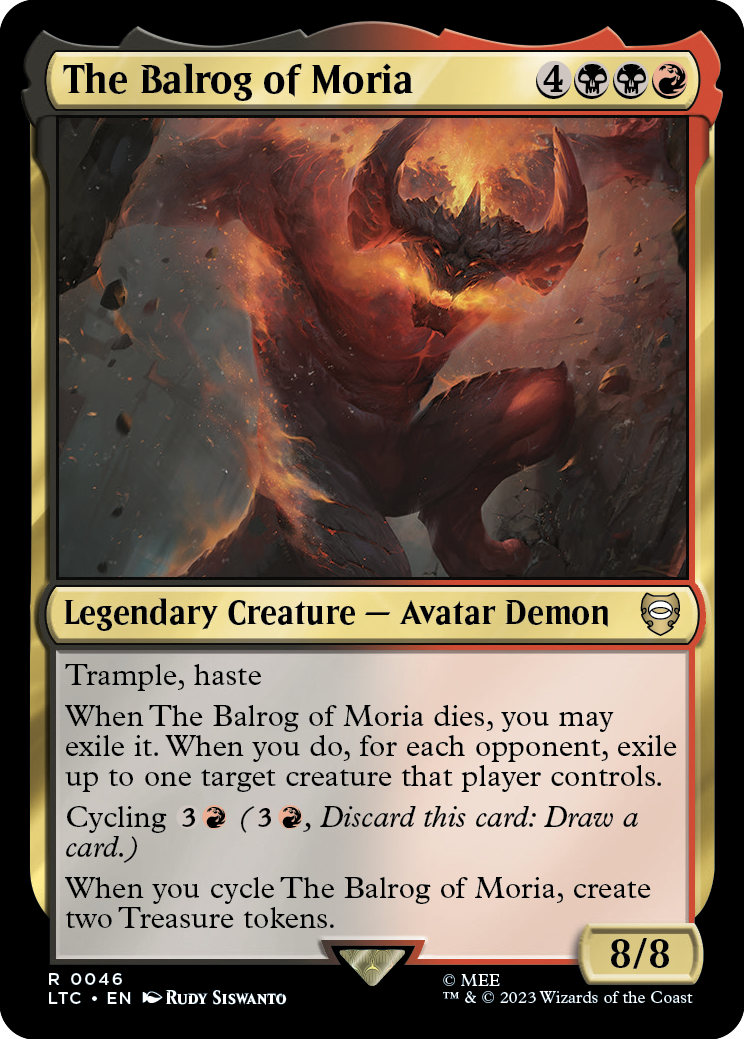
The Balrog of Moria
{4}{B}{B}{R}
Legendary Creature — Avatar Demon
8/8
Trample, haste
When The Balrog of Moria dies, you may exile it. When you do, for each opponent, exile up to one target creature that player controls.
Cycling {3}{R} ({3}{R}, Discard this card: Draw a card.)
When you cycle The Balrog of Moria, create two Treasure tokens.
- Some cards with cycling have an ability that triggers when you cycle them, and some cards have an ability that triggers whenever you cycle any card. These triggered abilities resolve before you draw from the cycling ability.
- Triggered abilities from cycling a card and the cycling ability itself aren't spells. Effects that interact with spells (such as Saruman's Trickery) won't affect them.
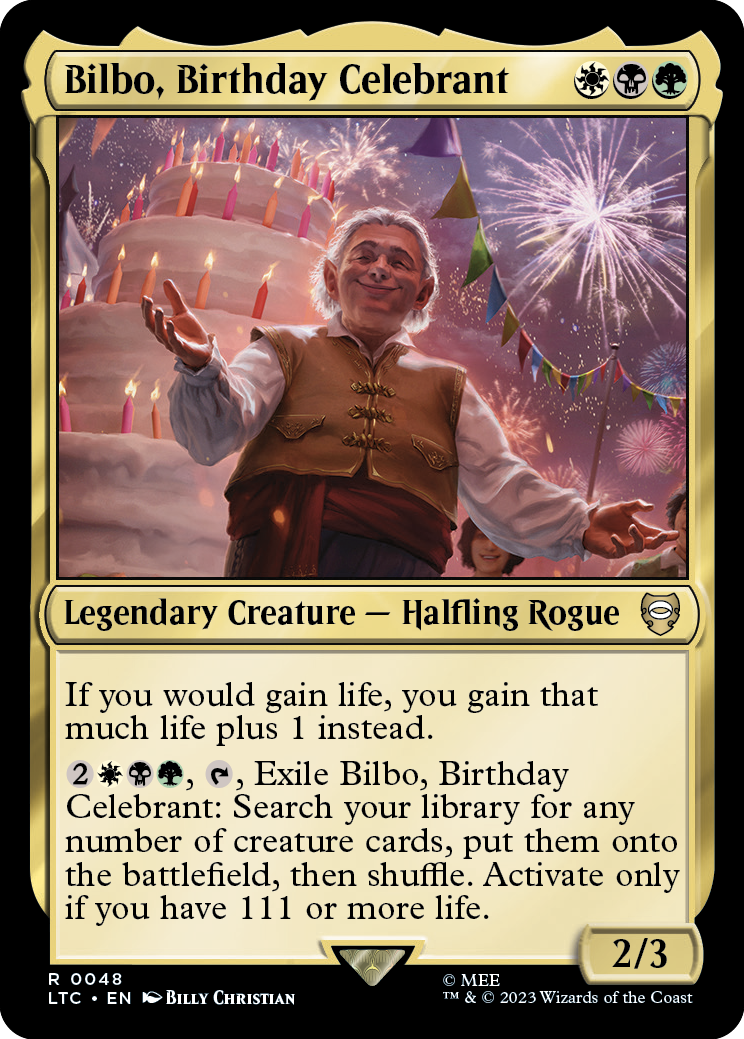
Bilbo, Birthday Celebrant
{W}{B}{G}
Legendary Creature — Halfling Rogue
2/3
If you would gain life, you gain that much life plus 1 instead.
{2}{W}{B}{G}, {T}, Exile Bilbo, Birthday Celebrant: Search your library for any number of creature cards, put them onto the battlefield, then shuffle. Activate only if you have 111 or more life.
- If you somehow control two Bilbo, Birthday Celebrants and you would gain life, you gain that much life plus 2. A third Bilbo, Birthday Celebrant has you gain that much life plus 3, and so on.
- Bilbo, Birthday Celebrant's first ability applies just once to each life-gaining event, no matter how much life is gained. If you gain an amount of life "for each" of something or "equal to the number" of something, that life is gained as one event and the ability of Bilbo, Birthday Celebrant applies only once.
- Each creature with lifelink dealing combat damage causes a separate life-gaining event. For example, if two creatures you control with lifelink deal combat damage at the same time, Bilbo, Birthday Celebrant's first ability will apply to those two events separately. However, if a single creature you control with lifelink deals combat damage to multiple creatures, players, and/or planeswalkers at the same time (perhaps because it has trample or was blocked by more than one creature), the ability will apply only once.
- In a Two-Headed Giant game, life gained by your teammate won't cause Bilbo, Birthday Celebrant's first ability to apply, even though it will cause your team's life total to increase.
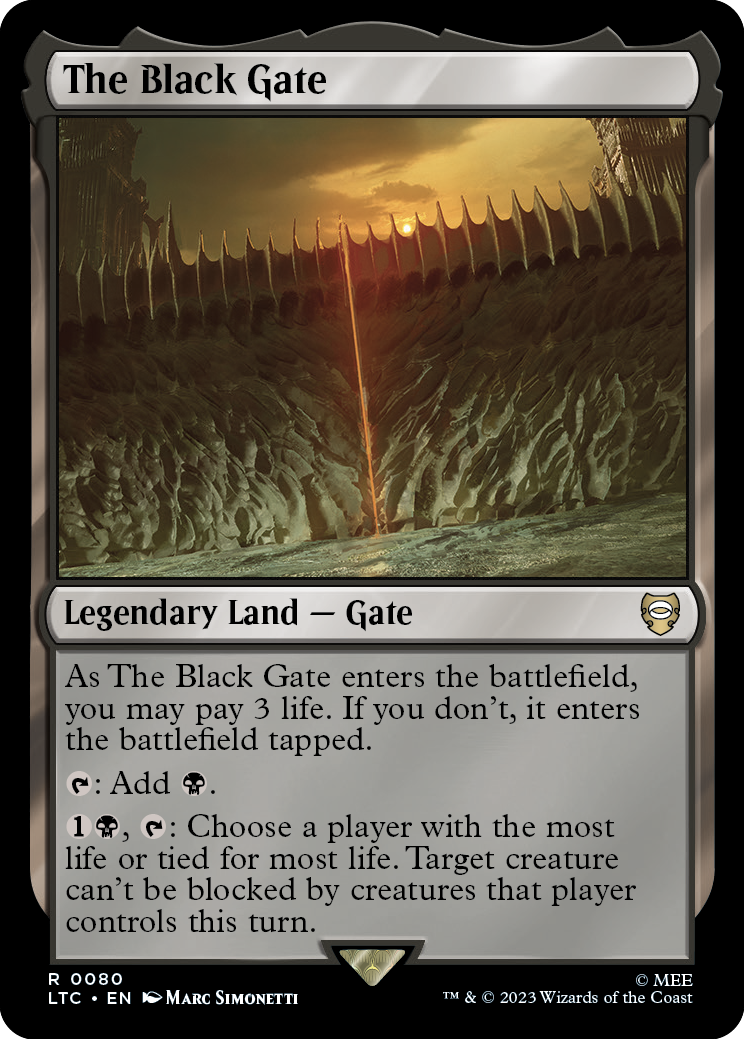
The Black Gate
Legendary Land — Gate
As The Black Gate enters the battlefield, you may pay 3 life. If you don't, it enters the battlefield tapped.
{T}: Add {B}.
{1}{B}, {T}: Choose a player with the most life or tied for most life. Target creature can't be blocked by creatures that player controls this turn.
- The chosen player needs only to have the most life or tied for most life as The Black Gate's last ability resolves. After the ability resolves, any changes in life total won't affect which creatures can block or be blocked that turn.
- The creature that was targeted by The Black Gate's last ability can't be blocked by any creature the chosen player controls, including creatures that weren't on the battlefield when The Black Gate's ability resolved.
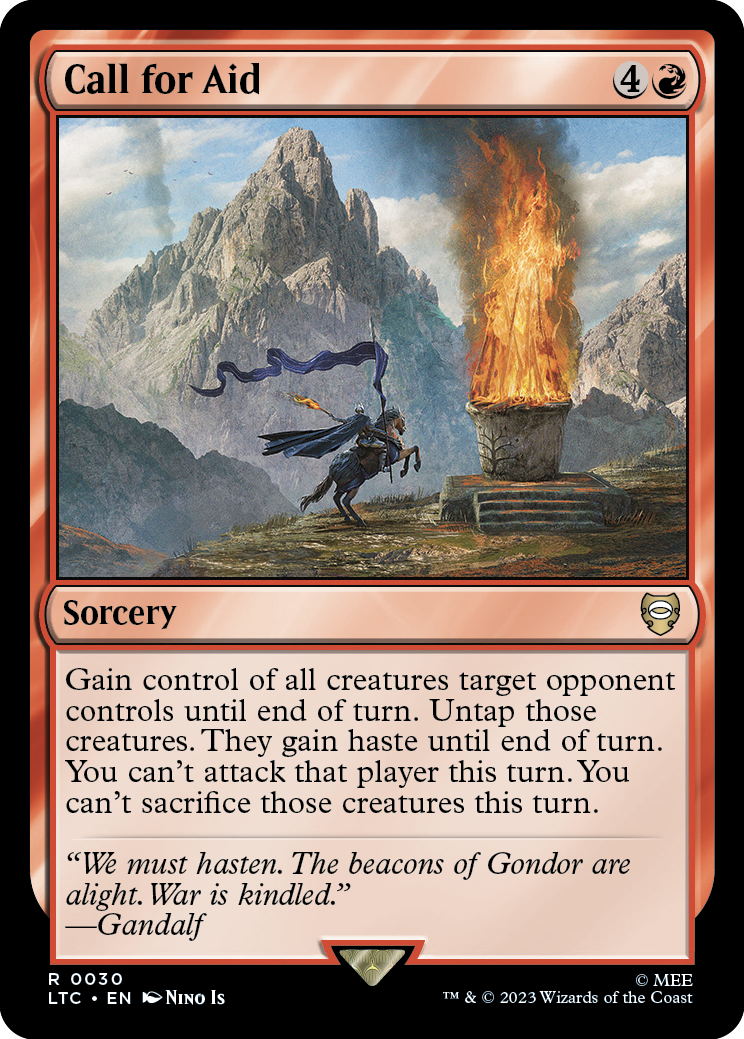
Call for Aid
{4}{R}
Sorcery
Gain control of all creatures target opponent controls until end of turn. Untap those creatures. They gain haste until end of turn. You can't attack that player this turn. You can't sacrifice those creatures this turn.
- You can't sacrifice the creatures you gained control of with Call for Aid this turn for any reason. If an effect instructs you to sacrifice one of them, you can't and it remains on the battlefield. You also can't sacrifice any of them to pay a cost that requires you to sacrifice a creature.
- If an effect instructs you to sacrifice a creature, and you control any creatures other than the ones you gained control of with Call for Aid this turn, you must sacrifice one of them. You can't try to sacrifice one of the creatures you gained control of, fail, and therefore ignore the effect.
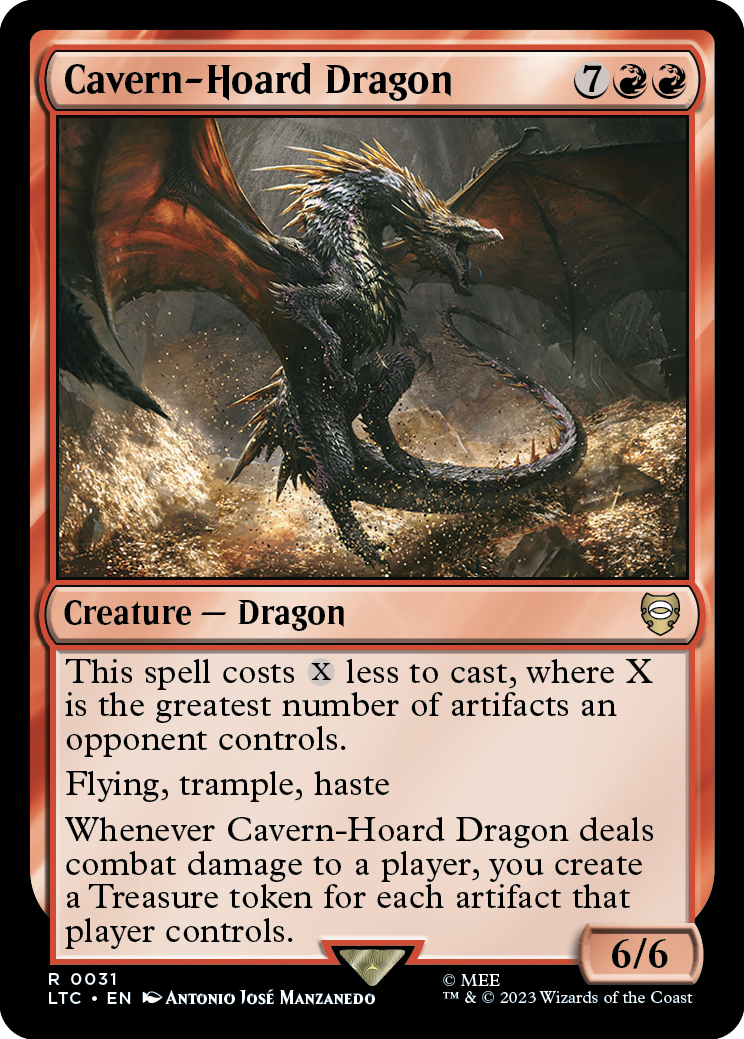
Cavern-Hoard Dragon
{7}{R}{R}
Creature — Dragon
6/6
This spell costs {X} less to cast, where X is the greatest number of artifacts an opponent controls.
Flying, trample, haste
Whenever Cavern-Hoard Dragon deals combat damage to a player, you create a Treasure token for each artifact that player controls.
- Once a player has announced that they are casting Cavern-Hoard Dragon, no player may take actions to try and change the greatest number of artifacts an opponent controls before Cavern-Hoard Dragon's cost is locked in.
- Cavern-Hoard Dragon's first ability counts only the artifacts controlled by the opponent who controls the greatest number of artifacts among your opponents. If you have an opponent who controls two artifacts and another opponent who controls three artifacts, Cavern-Hoard Dragon's mana cost would be reduced by {3}.
- If the greatest number of artifacts an opponent controls is seven or more, Cavern-Hoard Dragon costs {R}{R} to cast.
- Cavern-Hoard Dragon's last ability cares about the number of artifacts that player controls as the ability resolves.
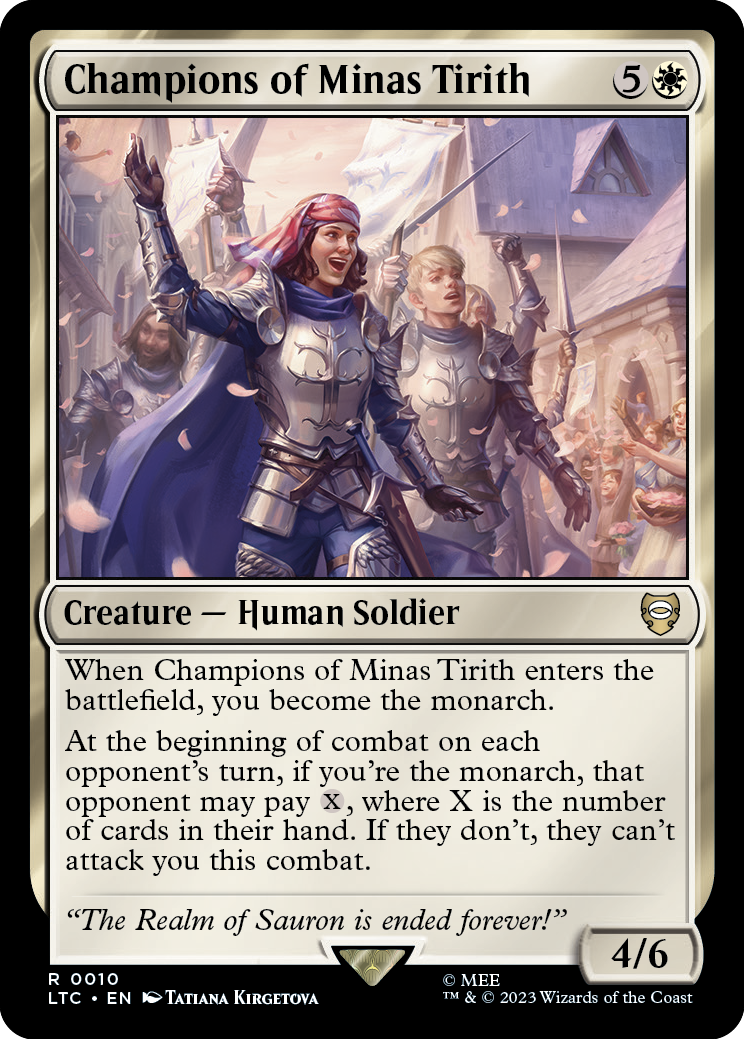
Champions of Minas Tirith
{5}{W}
Creature — Human Soldier
4/6
When Champions of Minas Tirith enters the battlefield, you become the monarch.
At the beginning of combat on each opponent's turn, if you're the monarch, that opponent may pay {X}, where X is the number of cards in their hand. If they don't, they can't attack you this combat.
- An opponent who chooses not to pay {X} for Champions of Minas Tirith's last ability can still attack planeswalkers you control or battles you're protecting.
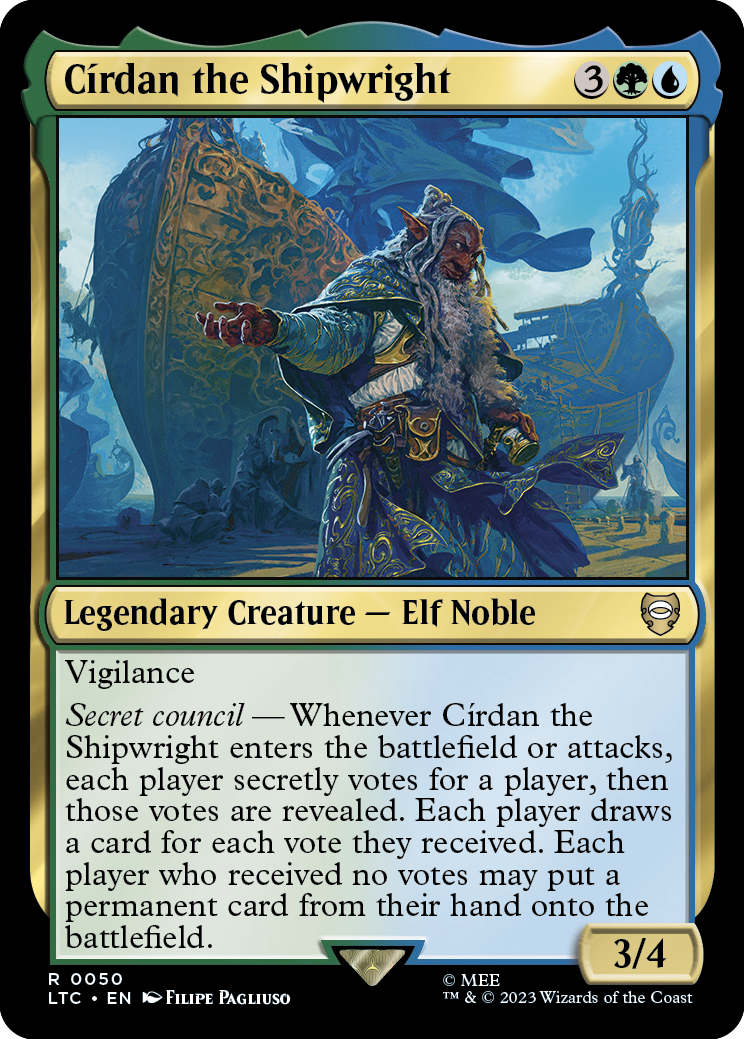
Círdan the Shipwright
{3}{G}{U}
Legendary Creature — Elf Noble
3/4
Vigilance
Secret council — Whenever Círdan the Shipwright enters the battlefield or attacks, each player secretly votes for a player, then those votes are revealed. Each player draws a card for each vote they received. Each player who received no votes may put a permanent card from their hand onto the battlefield.
- After the votes are revealed, first the player whose turn it is draws a card for each vote they received, then each other player in turn order does so. Then, if the first player received no votes, they may put a permanent card from their hand onto the battlefield. Then each other player in turn order does the same.
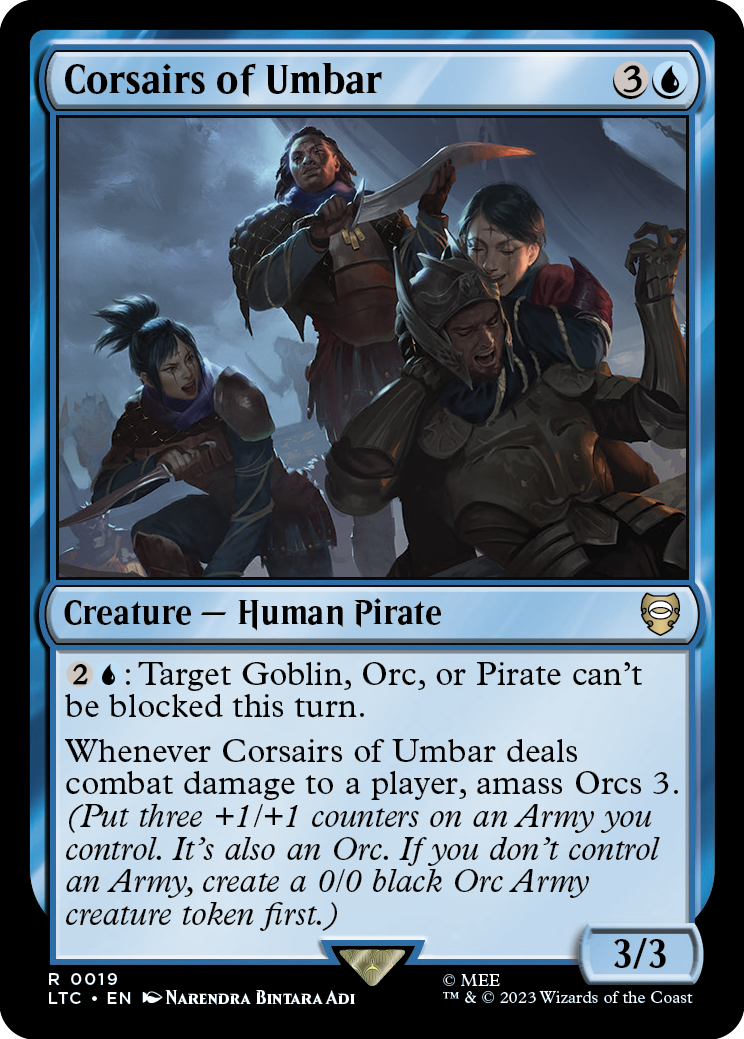
Corsairs of Umbar
{3}{U}
Creature — Human Pirate
3/3
{2}{U}: Target Goblin, Orc, or Pirate can't be blocked this turn.
Whenever Corsairs of Umbar deals combat damage to a player, amass Orcs 3. (Put three +1/+1 counters on an Army you control. It's also an Orc. If you don't control an Army, create a 0/0 black Orc Army creature token first.)
- Activating Corsairs of Umbar's first ability after a Goblin, Orc, or Pirate has become blocked won't cause that creature to become unblocked.

Elrond of the White Council
{3}{G}{U}
Legendary Creature — Elf Noble
3/3
Secret council — When Elrond of the White Council enters the battlefield, each player secretly votes for fellowship or aid, then those votes are revealed. For each fellowship vote, the voter chooses a creature they control. You gain control of each creature chosen this way, and they gain "This creature can't attack its owner." Then for each aid vote, put a +1/+1 counter on each creature you control.
- After the votes are revealed, starting with the player whose turn it is and proceeding in turn order, each player who voted fellowship chooses a creature they control for each of their fellowship votes. Then the controller of Elrond of the White Council's ability gains control of those creatures and they gain the listed ability. Finally, that player puts a +1/+1 counter on each creature they control for each aid vote.
- If you have multiple votes, you can vote for fellowship multiple times. If you do, you can choose the same creature each time.
- If you control Elrond of the Secret Council's ability, it is usually best to vote for aid. Gaining control of a creature you already control is only occasionally helpful.
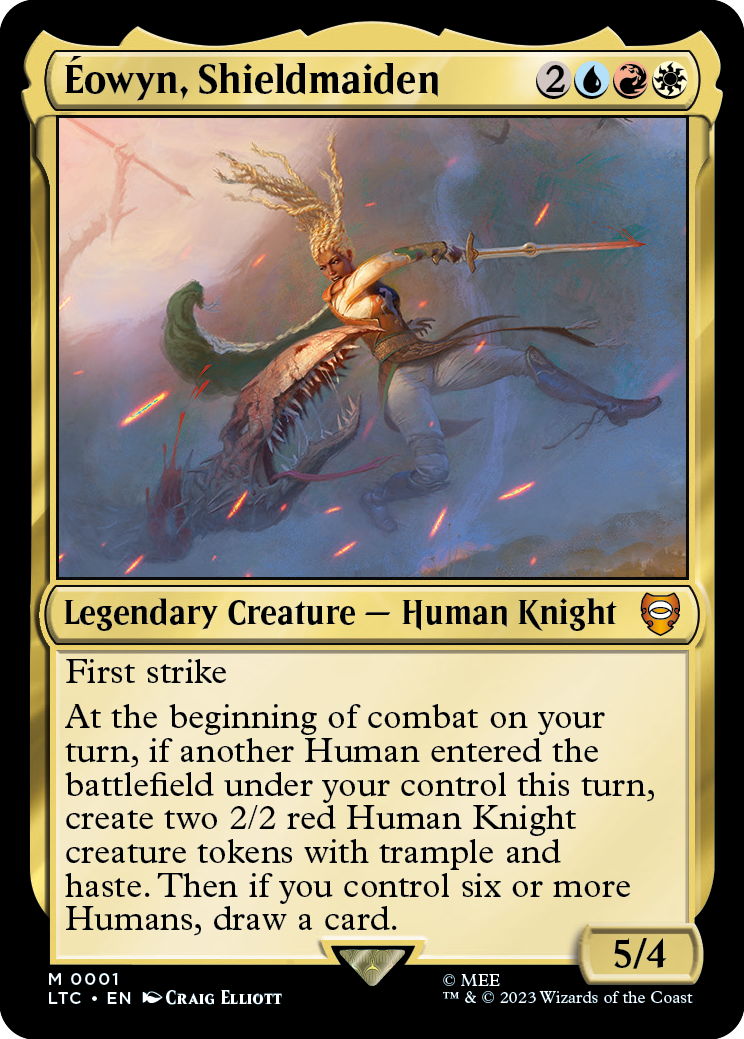
Éowyn, Shieldmaiden
{2}{U}{R}{W}
Legendary Creature — Human Knight
5/4
First strike
At the beginning of combat on your turn, if another Human entered the battlefield under your control this turn, create two 2/2 red Human Knight creature tokens with trample and haste. Then if you control six or more Humans, draw a card.
- If another Human didn't enter the battlefield before your beginning of combat step, Éowyn, Shieldmaiden's ability won't trigger. You won't draw a card even if you control six or more Humans.
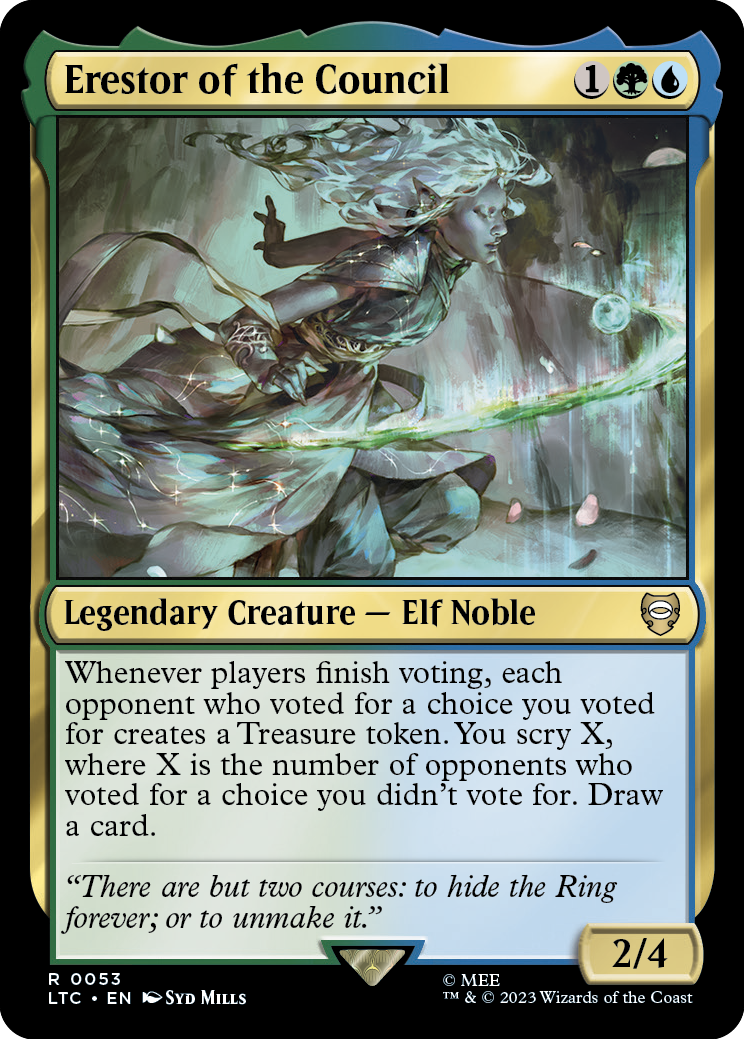
Erestor of the Council
{1}{G}{U}
Legendary Creature — Elf Noble
2/4
Whenever players finish voting, each opponent who voted for a choice you voted for creates a Treasure token. You scry X, where X is the number of opponents who voted for a choice you didn't vote for. Draw a card.
- When Erestor of the Council's ability resolves, you'll draw a card at the end no matter how other players voted.
- If an opponent has multiple votes, it's possible for them to count as both an opponent who voted for a choice you voted for and an opponent who voted for a choice you didn't vote for.
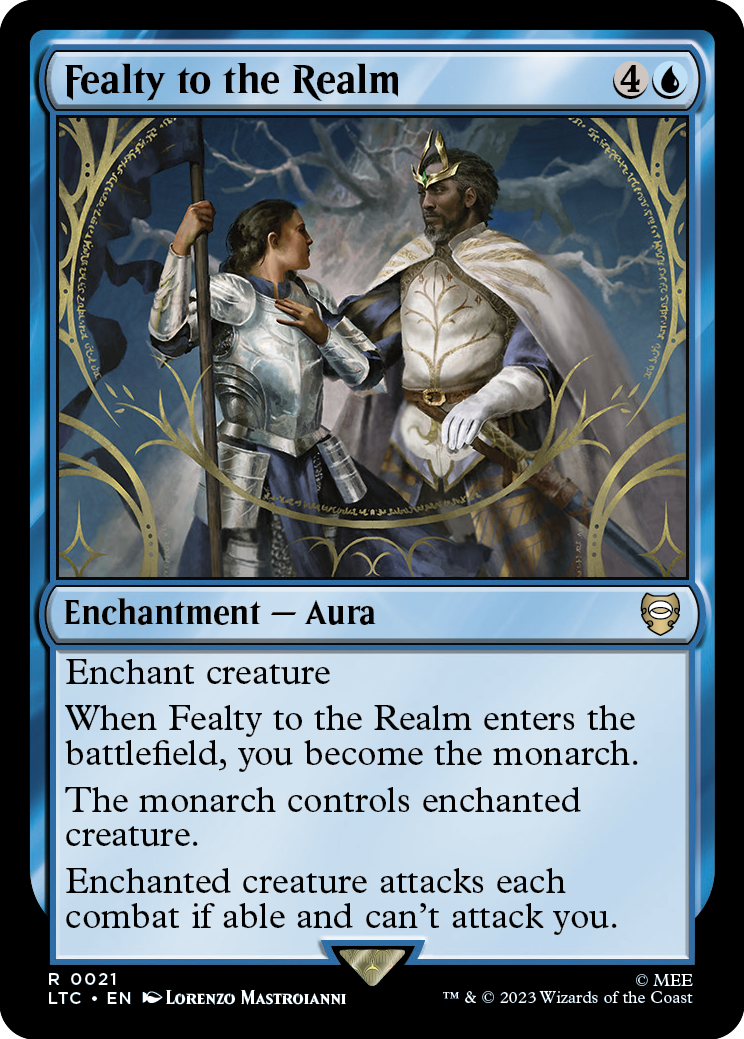
Fealty to the Realm
{4}{U}
Enchantment — Aura
Enchant creature
When Fealty to the Realm enters the battlefield, you become the monarch.
The monarch controls enchanted creature.
Enchanted creature attacks each combat if able and can't attack you.
- The timestamp of Fealty to the Realm's control-changing effect is the time at which it entered the battlefield and won't change when another player becomes the monarch. This means that, if another player gains control of the creature enchanted with Fealty to the Realm, they won't lose control of it when another player becomes the monarch. When (or if) that control-changing effect ends, the enchanted creature will then be controlled by the current monarch, which might be a different player than it was when that control-changing effect began.
- In the case where Fealty to the Realm is enchanting a creature but there is no monarch, the second ability will create a control-changing effect with the timestamp mentioned above, but that effect won't do anything until a player becomes the monarch.
- If the monarch leaves the game, and that player is not the owner of Fealty to the Realm, the active player or the next player in turn order becomes the monarch and thus gains control of the enchanted creature.
- If the monarch leaves the game, and that player is the owner of Fealty to the Realm, the active player or the next player in turn order becomes the monarch. That player gains control of the enchanted creature for a very brief moment. At the same time, Fealty to the Realm leaves the game, and control of the enchanted creature reverts to its owner (unless another control-changing effect applies.)
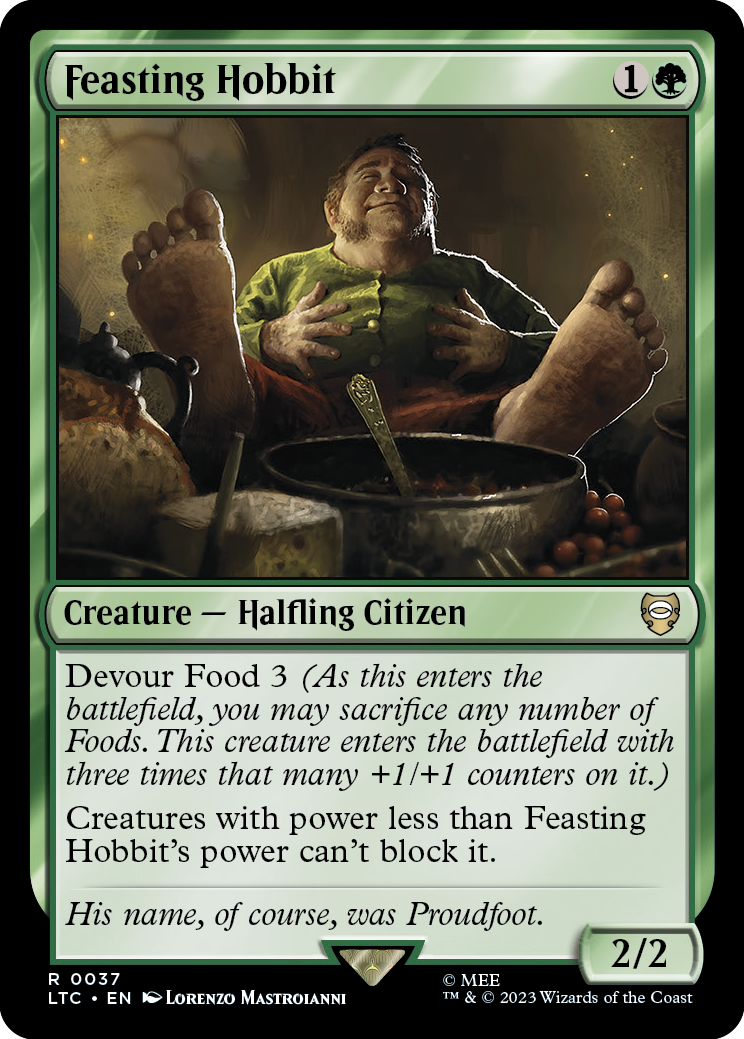
Feasting Hobbit
{1}{G}
Creature — Halfling Citizen
2/2
Devour Food 3 (As this enters the battlefield, you may sacrifice any number of Foods. This creature enters the battlefield with three times that many +1/+1 counters on it.)
Creatures with power less than Feasting Hobbit's power can't block it.
- Devour Food is a variant of the devour ability. It allows you to sacrifice Foods rather than creatures, but otherwise functions identically to devour.
- You may choose not to sacrifice any Foods for the devour Food ability.
- If you cast this spell, you choose how many and which Foods to devour as part of the resolution of the spell. (It can't be countered at that point.)
- The comparison of power is done only when blockers are declared. Decreasing the power of a creature blocking Feasting Hobbit or increasing the power of Feasting Hobbit after this point won't cause Feasting Hobbit to become unblocked.
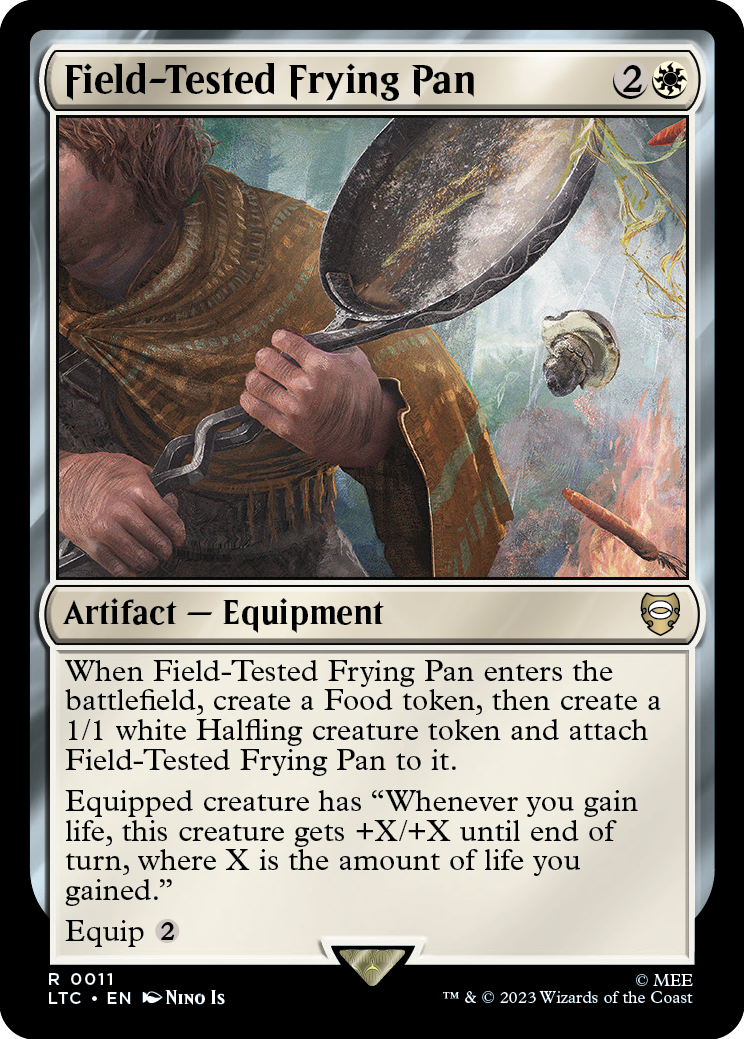
Field-Tested Frying Pan
{2}{W}
Artifact — Equipment
When Field-Tested Frying Pan enters the battlefield, create a Food token, then create a 1/1 white Halfling creature token and attach Field-Tested Frying Pan to it.
Equipped creature has "Whenever you gain life, this creature gets +X/+X until end of turn, where X is the amount of life you gained."
Equip {2}
- No player may take any actions between the time you create the Halfling token and the time Field-Tested Frying Pan becomes attached to it.
- If the triggered ability causes more than one creature token to be created (due to an effect such as that of Doubling Season), Field-Tested Frying Pan becomes attached to one of them of your choice.

Frodo, Adventurous Hobbit
{W}{B}
Legendary Creature — Halfling Scout
1/3
Partner with Sam, Loyal Attendant
Vigilance
Whenever Frodo, Adventurous Hobbit attacks, if you gained 3 or more life this turn, the Ring tempts you. Then if Frodo is your Ring-bearer and the Ring has tempted you two or more times this game, draw a card.
- The Ring tempts you just once, no matter how much life you've gained past 3 life.
- Frodo, Adventurous Hobbit's ability looks at how much life you've gained in the turn, even if it wasn't on the battlefield when you gained life. It doesn't care if you also lost life, even if you lost more life than you gained.
- If you haven't gained 3 or more life by the time Frodo, Adventurous Hobbit attacks, the ability won't trigger at all.
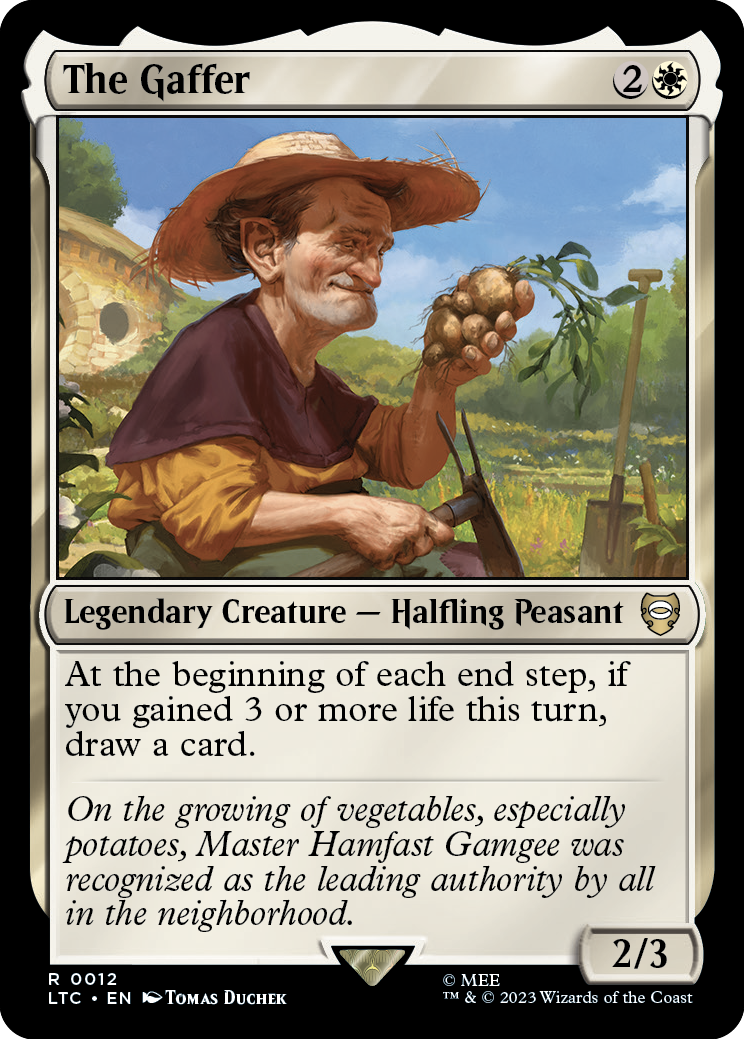
The Gaffer
{2}{W}
Legendary Creature — Halfling Peasant
2/3
At the beginning of each end step, if you gained 3 or more life this turn, draw a card.
- You draw just one card, no matter how much life you've gained past 3 life.
- The Gaffer's ability looks at how much life you've gained in the turn, even if it wasn't on the battlefield when you gained life. It doesn't care if you also lost life, even if you lost more life than you gained.
- If you haven't gained 3 or more life by the time an end step begins, The Gaffer's ability won't trigger at all.
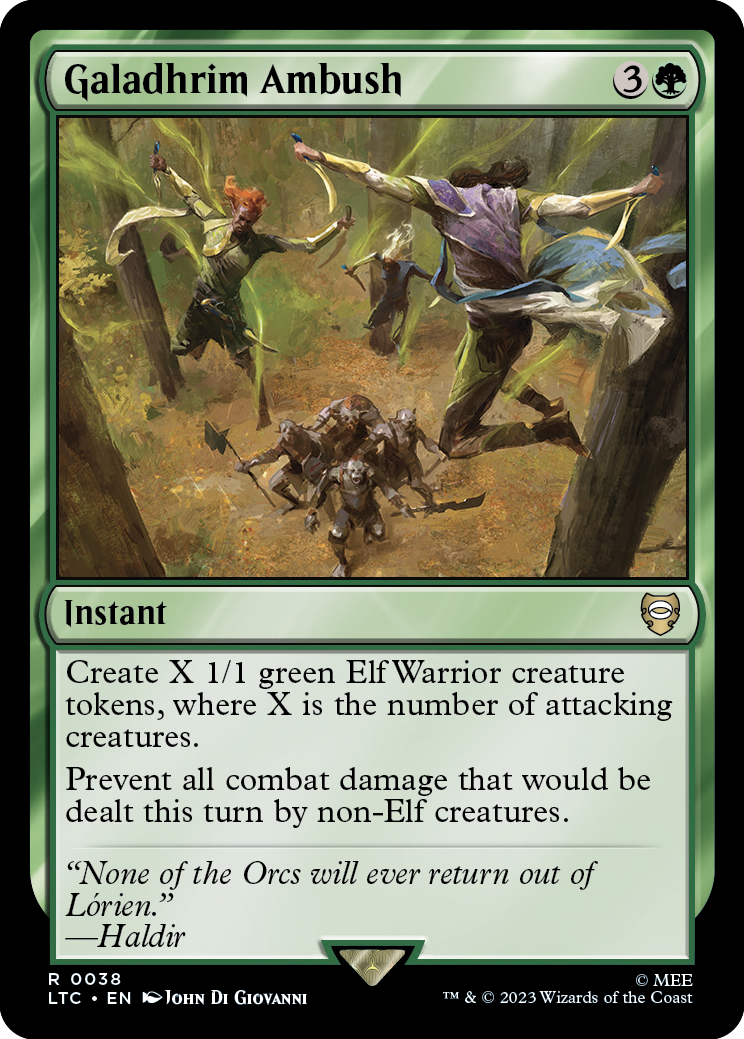
Galadhrim Ambush
{3}{G}
Instant
Create X 1/1 green Elf Warrior creature tokens, where X is the number of attacking creatures.
Prevent all combat damage that would be dealt this turn by non-Elf creatures.
- Galadhrim Ambush counts all attacking creatures no matter which player, planeswalker, or battle they're attacking, including attacking creatures you control if Galadhrim Ambush is cast during your combat phase.

Galadriel, Elven-Queen
{2}{G}{U}
Legendary Creature — Elf Noble
4/5
Will of the council — At the beginning of combat on your turn, if another Elf entered the battlefield under your control this turn, starting with you, each player votes for dominion or guidance. If dominion gets more votes, the Ring tempts you, then you put a +1/+1 counter on your Ring-bearer. If guidance gets more votes or the vote is tied, draw a card.
- If another Elf hasn't entered the battlefield under your control this turn as your beginning of combat step starts, Galadriel, Elven-Queen's ability won't trigger. No one will vote, and none of the other effects will happen. Putting another Elf onto the battlefield during the beginning of combat step won't cause the ability to trigger.
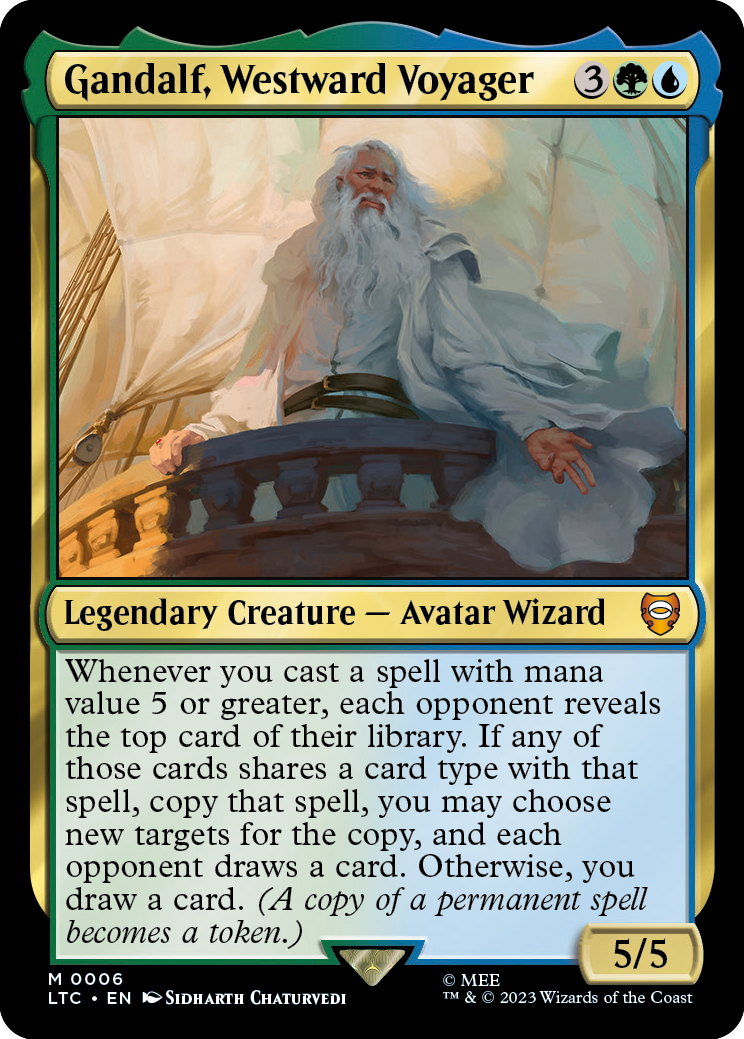
Gandalf, Westward Voyager
{3}{G}{U}
Legendary Creature — Avatar Wizard
5/5
Whenever you cast a spell with mana value 5 or greater, each opponent reveals the top card of their library. If any of those cards shares a card type with that spell, copy that spell, you may choose new targets for the copy, and each opponent draws a card. Otherwise, you draw a card. (A copy of a permanent spell becomes a token.)
- While a spell with {X} in its mana cost is on the stack, use the value of X that was chosen when it was cast to determine its mana value.
- You copy the spell you cast, not any of the revealed cards.
- You create only one copy, no matter how many revealed cards share a card type with the spell you cast or how many card types those cards share with the spell you cast.
- The triggered ability and the copy it creates will resolve before the spell that caused the ability to trigger.
- The copy is created on the stack, so it's not "cast." Creating the copy won't cause abilities that trigger when a player casts a spell to trigger.
- If the spell that's copied is modal (that is, it says "Choose one —" or the like), the copy will have the same mode or modes. You can't choose different ones.
- If the spell that's copied has an X whose value was determined as it was cast, the copy has the same value of X.
- You can't choose to pay any additional costs for a copied spell. However, effects based on any additional costs that were paid for the original spell are copied as though those same costs were paid for the copy too.
- If the spell has damage divided as it was put onto the stack, the division can't be changed, although the targets receiving that damage still can. The same is true of spells that distribute counters to targets.
- Any choices made when the spell resolves won't have been made yet when it's copied. Any such choices will be made separately when the copy resolves.
- The copy will have the same targets as the spell or ability it's copying unless you choose new ones. You may change any number of the targets, including all of them or none of them. If the spell is a permanent spell with targets, such as an Aura, you may also choose a new target for that spell. The new targets must be legal. If, for any target, you can't choose a new legal target, then it remains unchanged (even if the current target is illegal).
- If a permanent spell is copied, it's put onto the battlefield as a token as the spell resolves rather than putting the copy of the spell onto the battlefield. The rules that apply to a permanent spell becoming a permanent apply to a copy of a spell becoming a token.
- The token that a resolving copy of a spell becomes isn't said to have been "created" and won't interact with abilities that care about tokens being created, such as that of Rosie Cotton of South Lane.
- Except in some very rare cases, the card each opponent draws will be the card revealed from the top of their library.
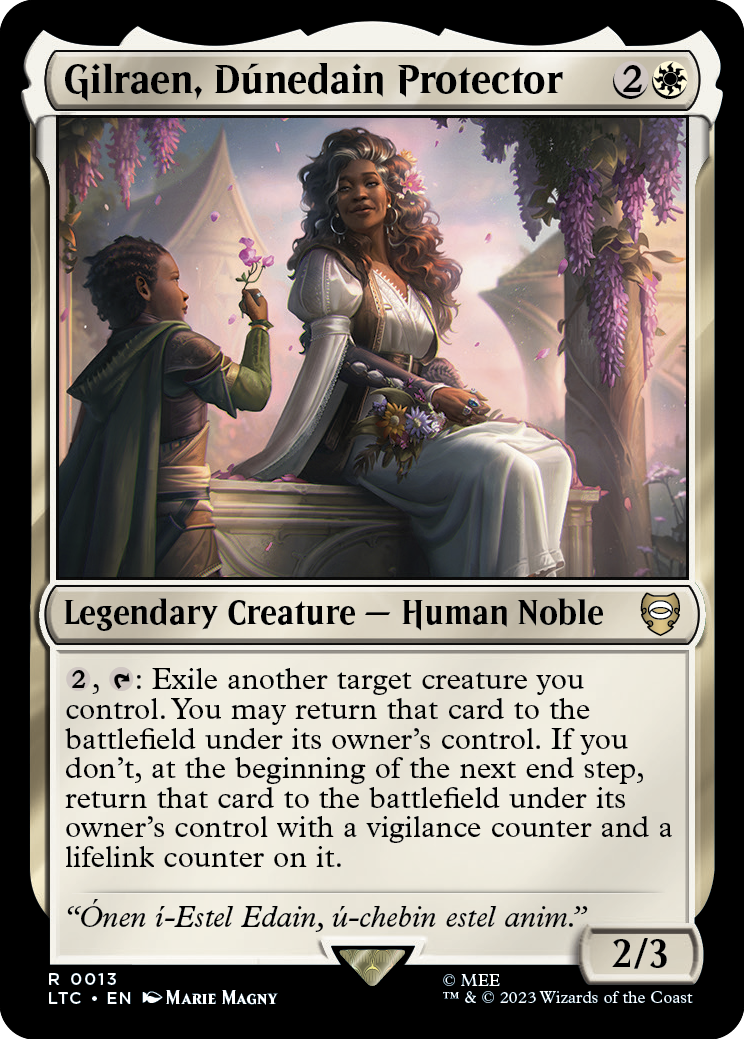
Gilraen, Dúnedain Protector
{2}{W}
Legendary Creature — Human Noble
2/3
{2}, {T}: Exile another target creature you control. You may return that card to the battlefield under its owner's control. If you don't, at the beginning of the next end step, return that card to the battlefield under its owner's control with a vigilance counter and a lifelink counter on it.
- When the card returns to the battlefield, it will be a new object with no connection to the card that was exiled. Auras attached to the exiled creature will be put into their owners' graveyards. Any Equipment will become unattached and remain on the battlefield. Any counters on the exiled creature will cease to exist.
- If a token is exiled this way, it will cease to exist and won't return to the battlefield.
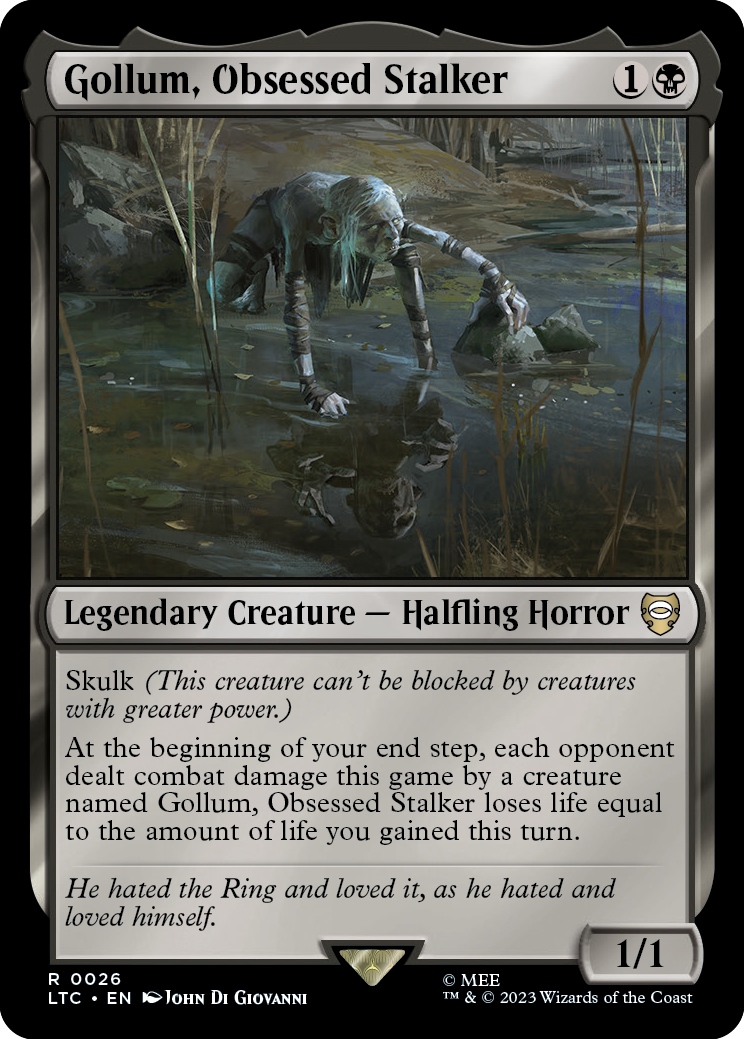
Gollum, Obsessed Stalker
{1}{B}
Legendary Creature — Halfling Horror
1/1
Skulk (This creature can't be blocked by creatures with greater power.)
At the beginning of your end step, each opponent dealt combat damage this game by a creature named Gollum, Obsessed Stalker loses life equal to the amount of life you gained this turn.
- Gollum, Obsessed Stalker's last ability counts players who were dealt combat damage by any creature named Gollum, Obsessed Stalker. It doesn't matter who controlled those creatures.
- Gollum, Obsessed Stalker's last ability counts the total amount of life you gained without taking into account any life you lost during that turn. For example, if you gained 3 life and lost 3 life earlier in the turn, each opponent dealt combat damage this game by a creature named Gollum, Obsessed Stalker loses 3 life.
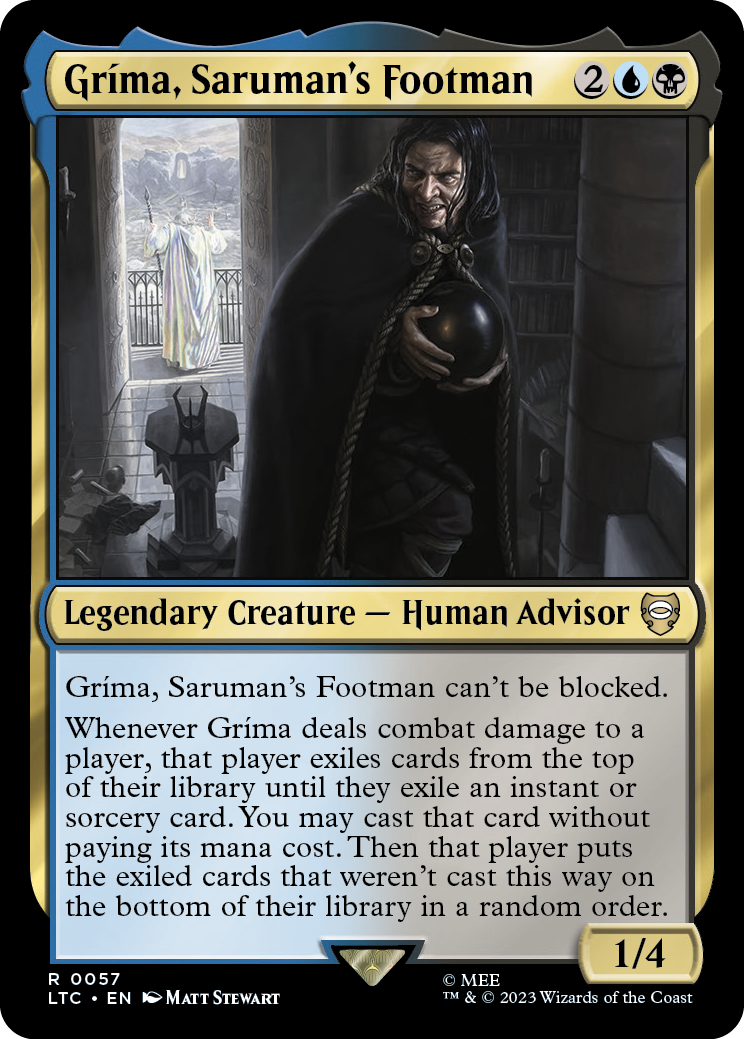
Gríma, Saruman's Footman
{2}{U}{B}
Legendary Creature — Human Advisor
1/4
Gríma, Saruman's Footman can't be blocked.
Whenever Gríma deals combat damage to a player, that player exiles cards from the top of their library until they exile an instant or sorcery card. You may cast that card without paying its mana cost. Then that player puts the exiled cards that weren't cast this way on the bottom of their library in a random order.
- The cards are exiled face up. All players will be able to see them.
- You cast the card while the ability is resolving and still on the stack. You can't wait to cast it later in the turn.
- If you cast a spell "without paying its mana cost," you can't pay any alternative costs. You can, however, pay additional costs, such as kicker costs. If the card has any mandatory additional costs, you must pay those.
- If the spell you cast has {X} in its mana cost, you must choose 0 as the value of X when casting it without paying its mana cost.
- If you choose not to cast the card, it is put on the bottom of its owner's library in a random order along with the other exiled cards.
- If that player exiles their entire library without exiling an instant or sorcery card, they will randomize the order of the exiled cards, and the cards then become that player's library, ending the effect. They will not continue to exile and randomize their library forever.
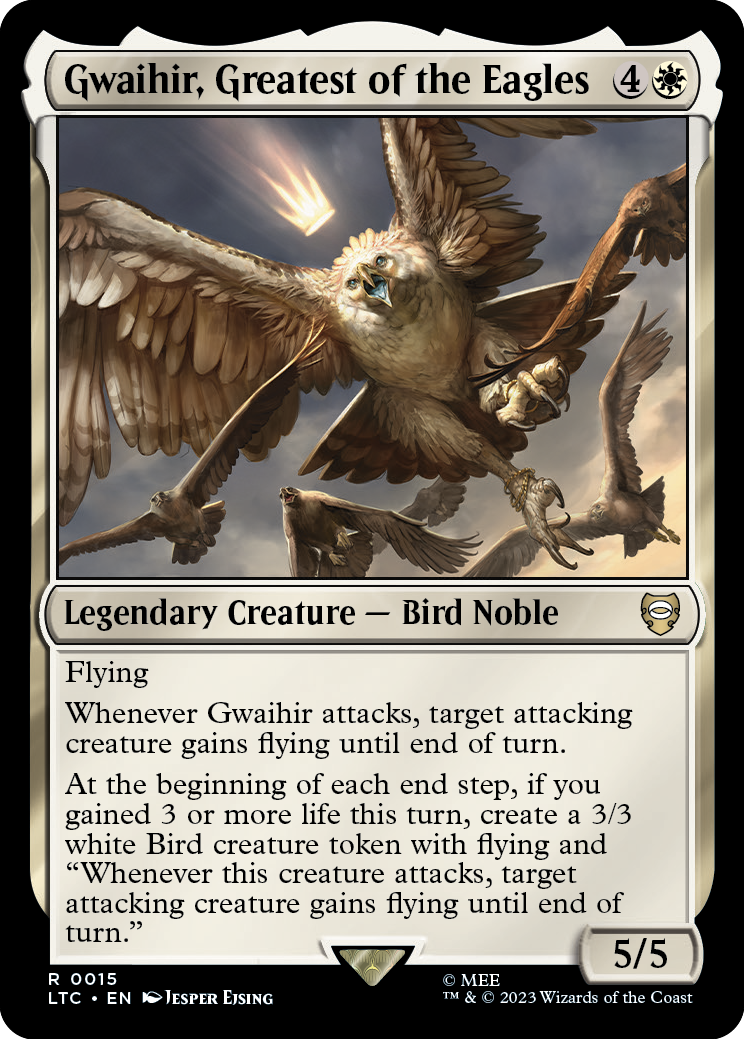
Gwaihir, Greatest of the Eagles
{4}{W}
Legendary Creature — Bird Noble
5/5
Flying
Whenever Gwaihir attacks, target attacking creature gains flying until end of turn.
At the beginning of each end step, if you gained 3 or more life this turn, create a 3/3 white Bird creature token with flying and "Whenever this creature attacks, target attacking creature gains flying until end of turn."
- You create just one Bird token, no matter how much life you've gained past 3 life.
- Gwaihir, Greatest of the Eagles's ability looks at how much life you've gained in the turn, even if it wasn't on the battlefield when you gained life. It doesn't care if you also lost life, even if you lost more life than you gained.
- If you haven't gained 3 or more life by the time an end step begins, Gwaihir, Greatest of the Eagles's ability won't trigger at all.
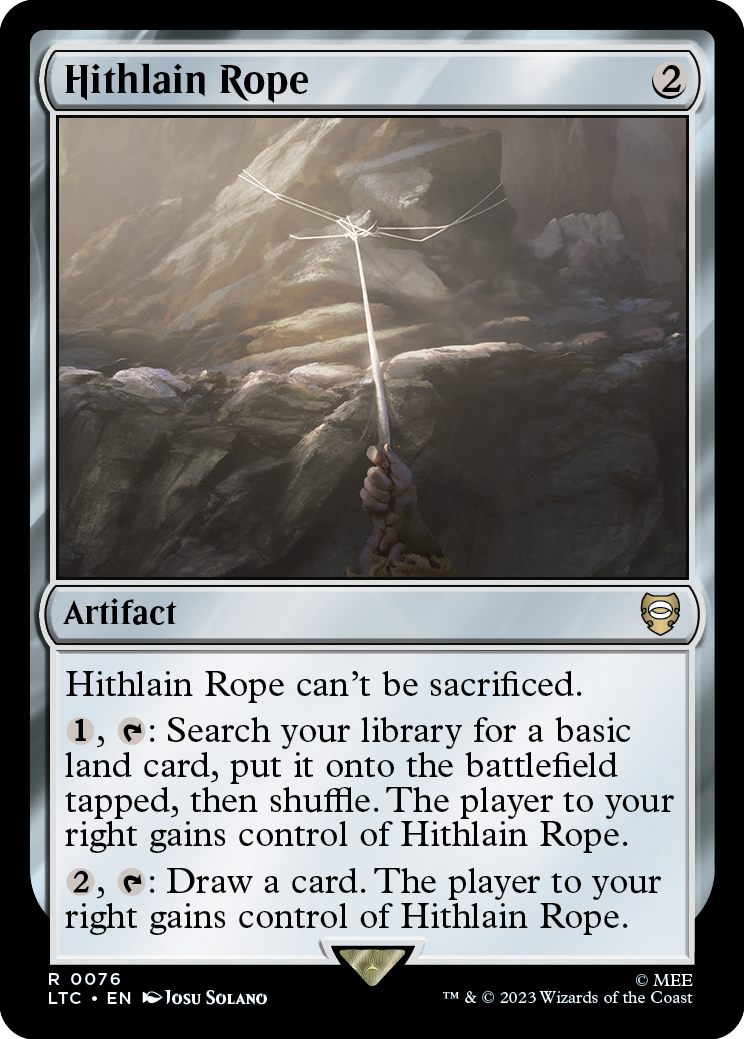
Hithlain Rope
{2}
Artifact
Hithlain Rope can't be sacrificed.
{1}, {T}: Search your library for a basic land card, put it onto the battlefield tapped, then shuffle. The player to your right gains control of Hithlain Rope.
{2}, {T}: Draw a card. The player to your right gains control of Hithlain Rope.
- In a two-player game, the other player is the player to your right. (They're also the player to your left. Funny how that works.)
- In some formats, such as Two-Headed Giant, the player to your right might be a teammate. In that case, that teammate gains control of Hithlain Rope as either ability resolves.
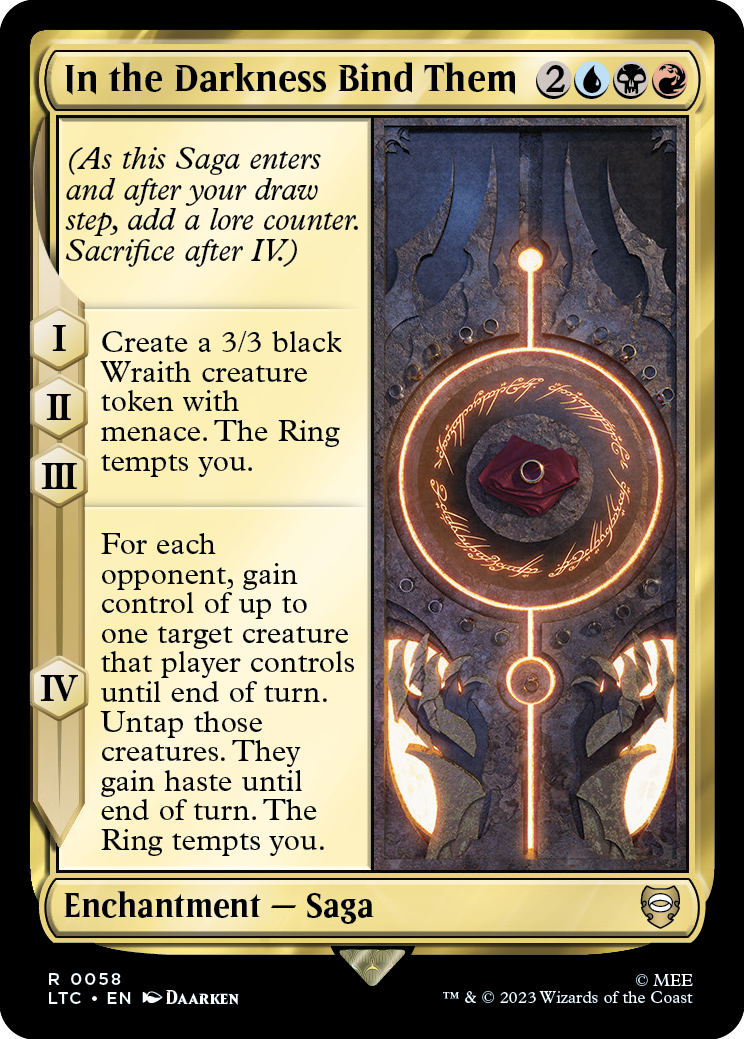
In the Darkness Bind Them
{2}{U}{B}{R}
Enchantment — Saga
(As this Saga enters and after your draw step, add a lore counter. Sacrifice after IV.)
I, II, III — Create a 3/3 black Wraith creature token with menace. The Ring tempts you.
IV — For each opponent, gain control of up to one target creature that player controls until end of turn. Untap those creatures. They gain haste until end of turn. The Ring tempts you.
- While resolving In the Darkness Bind Them's first three chapter abilities, you can choose the Wraith token you just created to be your Ring-bearer as the Ring tempts you.
- If a creature targeted by In the Darkness Bind Them's final chapter ability changes controllers before the ability resolves, that creature is no longer a legal target.
- When In the Darkness Bind Them's final chapter ability triggers, you can choose to target no creatures just so that the Ring tempts you. However, if you do choose at least one target, and all of those targets are illegal at the time the ability tries to resolve, the ability won't resolve and none of its effects will happen. The Ring won't tempt you.
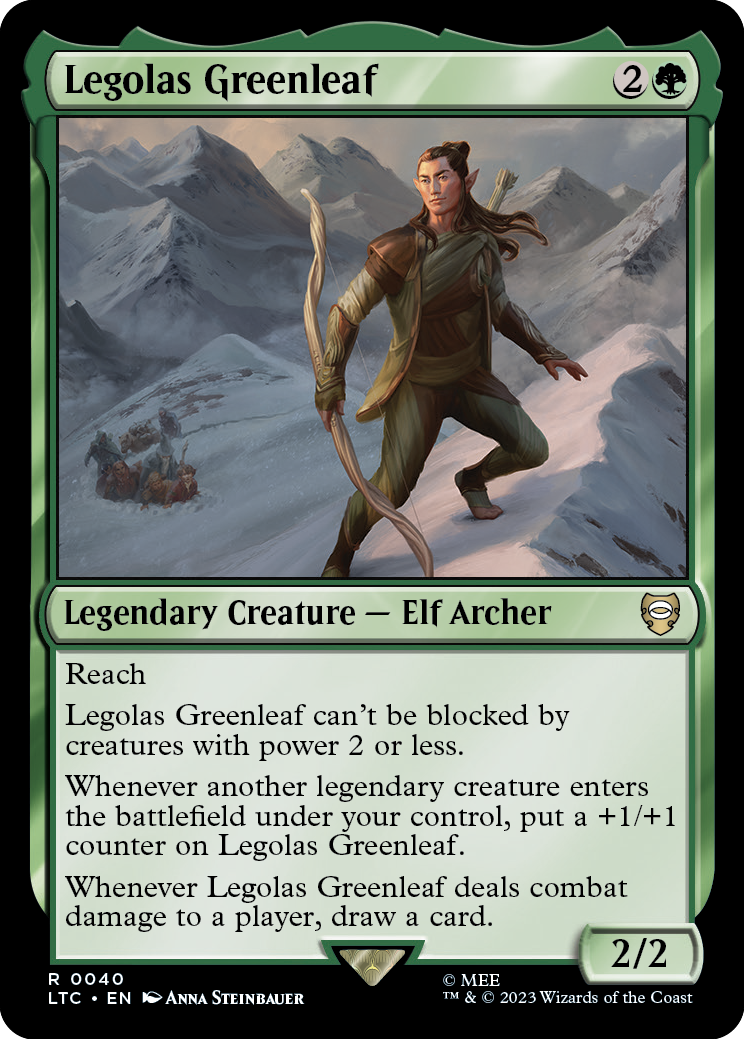
Legolas Greenleaf
{2}{G}
Legendary Creature — Elf Archer
2/2
Reach
Legolas Greenleaf can't be blocked by creatures with power 2 or less.
Whenever another legendary creature enters the battlefield under your control, put a +1/+1 counter on Legolas Greenleaf.
Whenever Legolas Greenleaf deals combat damage to a player, draw a card.
- Reducing a creature's power after it has blocked Legolas Greenleaf will not remove that blocking creature from combat or make Legolas Greenleaf unblocked.
- If Legolas Greenleaf enters the battlefield at the same time as another legendary creature you control, Legolas's Greenleaf's third ability will trigger and put a +1/+1 counter on it.
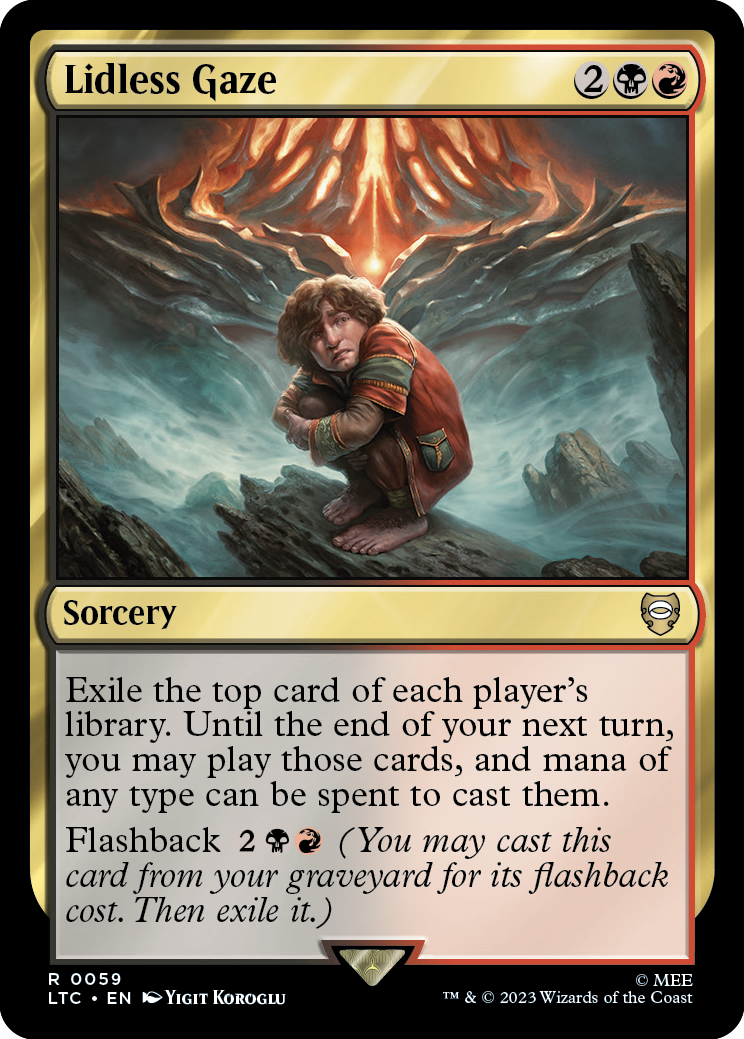
Lidless Gaze
{2}{B}{R}
Sorcery
Exile the top card of each player's library. Until the end of your next turn, you may play those cards, and mana of any type can be spent to cast them.
Flashback {2}{B}{R} (You may cast this card from your graveyard for its flashback cost. Then exile it.)
- Lidless Gaze uses a new template indicating that you may spend mana as though it were mana of any type to cast the exiled cards. The six types of mana are white, blue, black, red, green, and colorless.
- Snow mana is not a type of mana. Lidless Gaze won't let you pay a snow cost using mana produced by a nonsnow source.
Lobelia, Defender of Bag End
{2}{B}
Legendary Creature — Halfling Citizen
2/2
When Lobelia enters the battlefield, look at the top card of each opponent's library and exile those cards face down.
{T}, Sacrifice an artifact: Choose one —
• Until end of turn, you may play a card exiled with Lobelia without paying its mana cost.
• Each opponent loses 2 life and you gain 2 life.
- You may look at these face-down exiled cards any time you wish. No other player may look at the face-down cards you exiled with Lobelia, Defender of Bag End, even if another player takes control of it.
- If Lobelia, Defender of Bag End leaves the battlefield, and later another Lobelia, Defender of Bag End enters the battlefield, it is a new object (even if the two were represented by the same card). You can't play cards exiled by the original Lobelia, Defender of Bag End with the second ability of the new Lobelia, Defender of Bag End.
- To play a card using the permission granted by the first mode of Lobelia, Defender of Bag End's activated ability, you must still follow any timing restrictions and permissions, including those based on the card's type. For instance, you can play a land from exile this way only during your main phase while the stack is empty, and only if you have an available land play remaining for the turn.
- If you cast a spell "without paying its mana cost", you can't choose to cast it for any alternative costs. You can, however, pay additional costs, such as kicker costs. If the card has any mandatory additional costs, those must be paid to cast the spell.
- If the spell has {X} in its mana cost, you must choose 0 as the value of X when casting it without paying its mana cost.
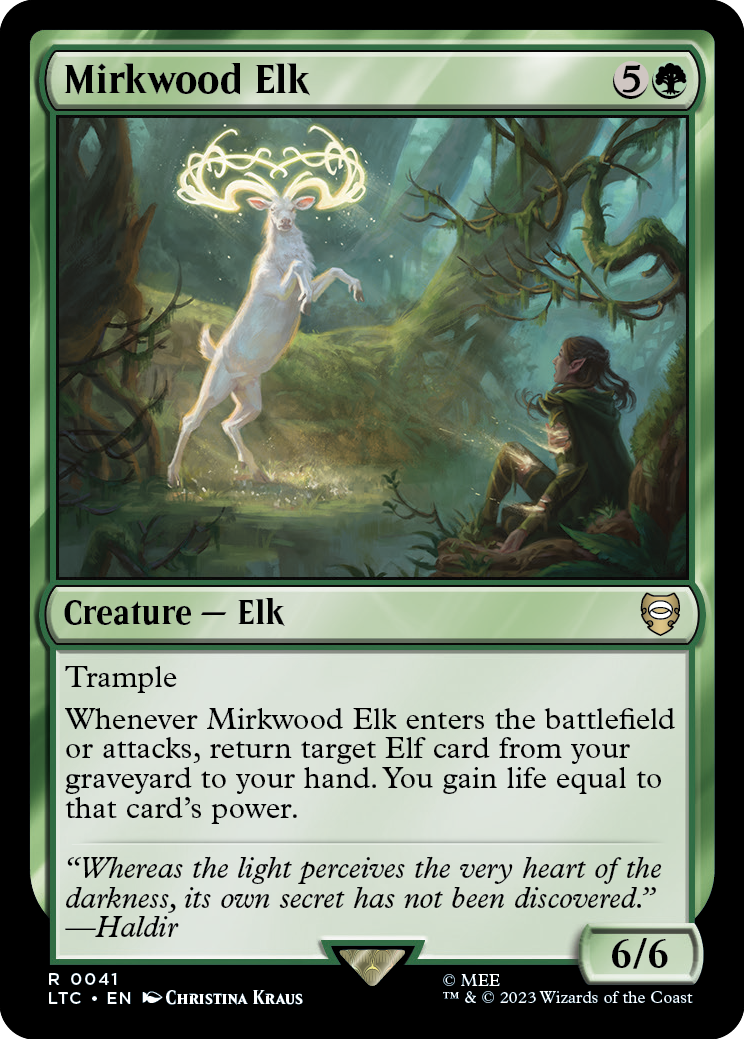
Mirkwood Elk
{5}{G}
Creature — Elk
6/6
Trample
Whenever Mirkwood Elk enters the battlefield or attacks, return target Elf card from your graveyard to your hand. You gain life equal to that card's power.
- In the rare case that the Elf card you return to your hand doesn't have power, you'll gain 0 life.
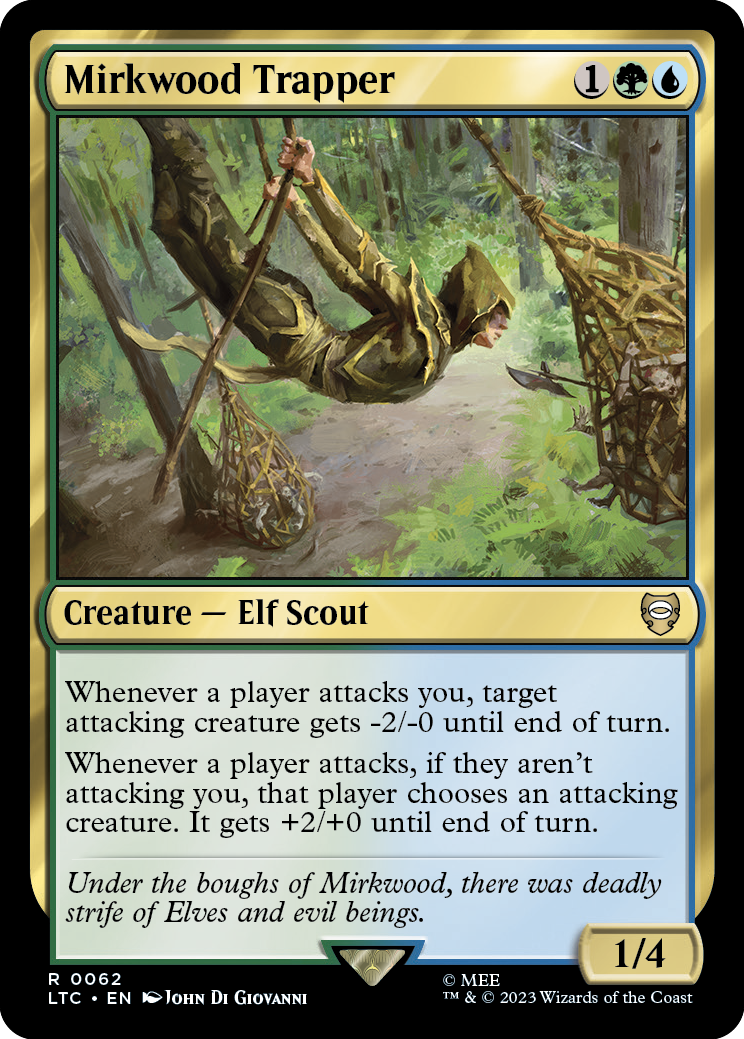
Mirkwood Trapper
{1}{G}{U}
Creature — Elf Scout
1/4
Whenever a player attacks you, target attacking creature gets -2/-0 until end of turn.
Whenever a player attacks, if they aren't attacking you, that player chooses an attacking creature. It gets +2/+0 until end of turn.
- If a player is attacking a planeswalker you control or a battle you're protecting but not attacking you, Mirkwood Trapper's last ability will still trigger.
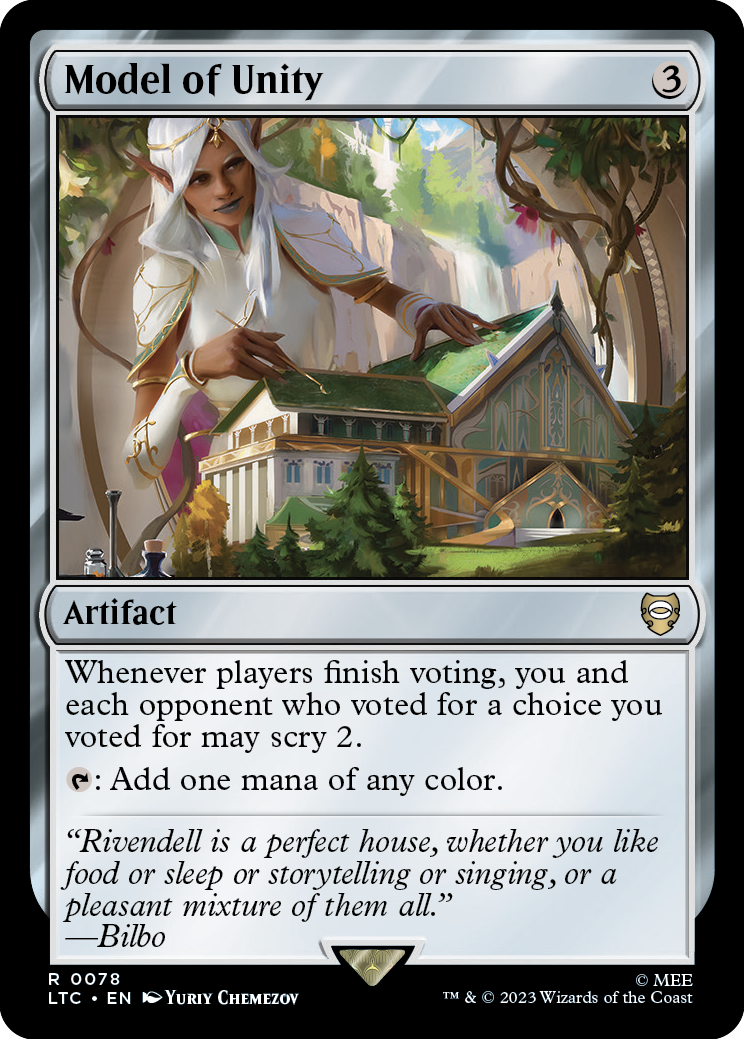
Model of Unity
{3}
Artifact
Whenever players finish voting, you and each opponent who voted for a choice you voted for may scry 2.
{T}: Add one mana of any color.
- If multiple players are instructed to scry at once, those players each look at the top cards of their library at the same time, then they choose in turn order whether to put those cards on the top or bottom of their library and in what order.
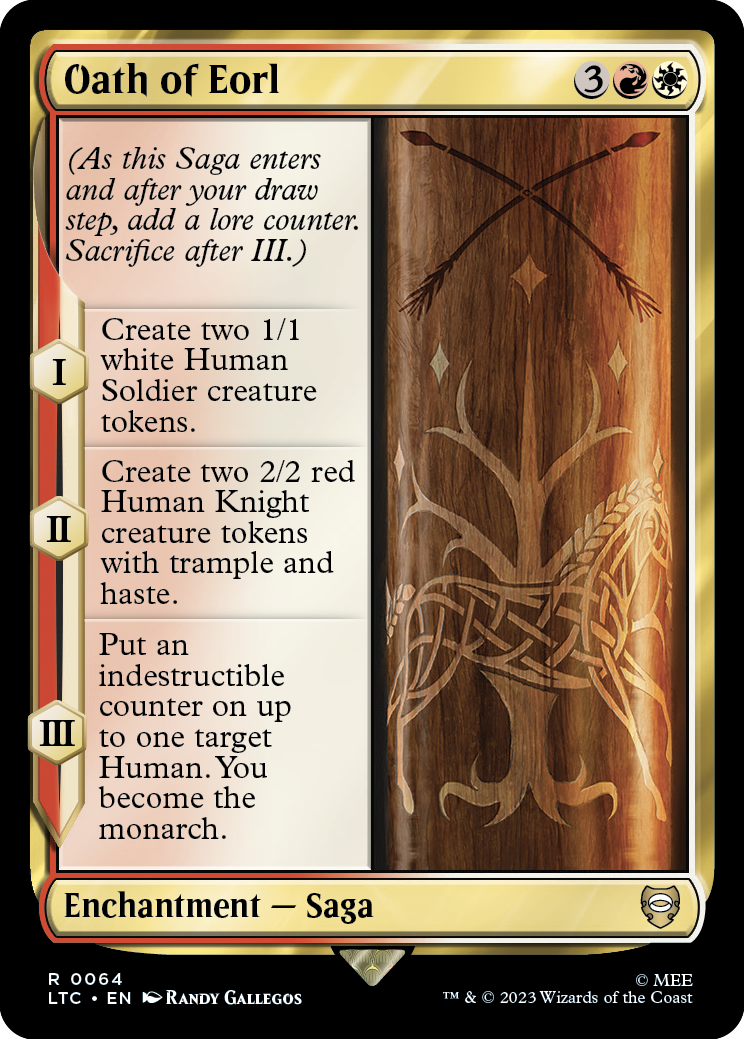
Oath of Eorl
{3}{R}{W}
Enchantment — Saga
(As this Saga enters and after your draw step, add a lore counter. Sacrifice after III.)
I — Create two 1/1 white Human Soldier creature tokens.
II — Create two 2/2 red Human Knight creature tokens with trample and haste.
III — Put an indestructible counter on up to one target Human. You become the monarch.
- When Oath of Eorl's final chapter ability triggers, you can choose not to target a Human just to become the monarch. However, if you do choose a target, and that target is illegal at the time the ability tries to resolve, the ability won't resolve and none of its effects will happen. You won't become the monarch.
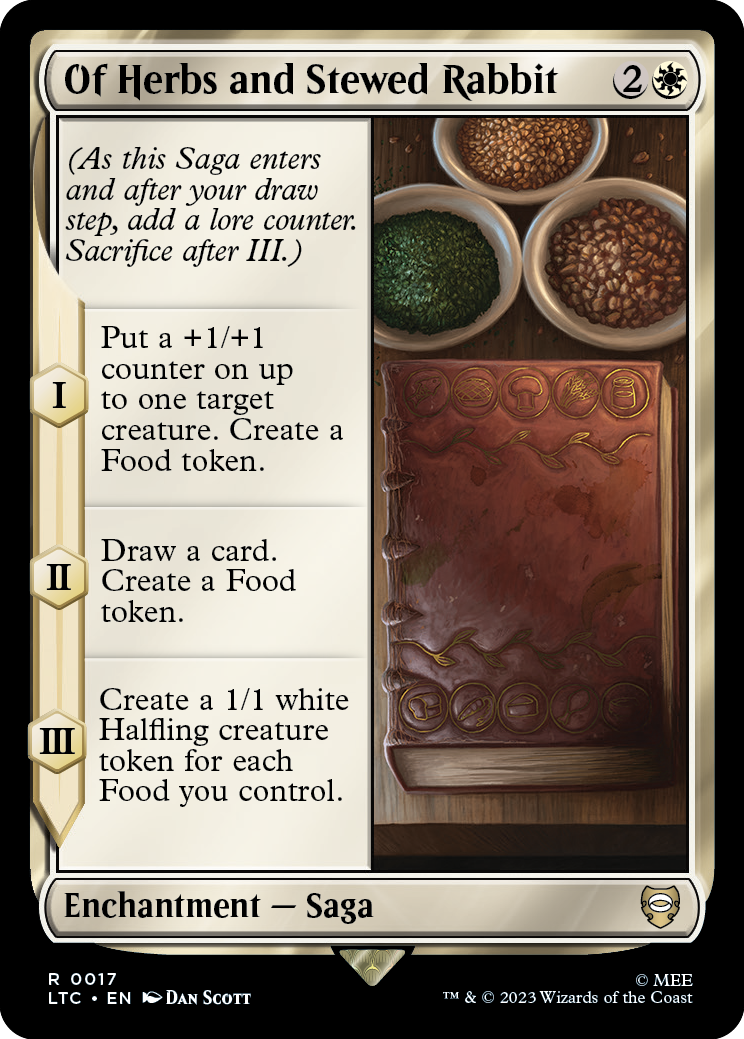
Of Herbs and Stewed Rabbit
{2}{W}
Enchantment — Saga
(As this Saga enters and after your draw step, add a lore counter. Sacrifice after III.)
I — Put a +1/+1 counter on up to one target creature. Create a Food token.
II — Draw a card. Create a Food token.
III — Create a 1/1 white Halfling creature token for each Food you control.
- When Of Herbs and Stewed Rabbit's first chapter ability triggers, you can choose not to target a creature just to create a Food token. However, if you do choose a target, and that target is illegal at the time the ability tries to resolve, the ability won't resolve and none of its effects will happen. You won't create a Food token.
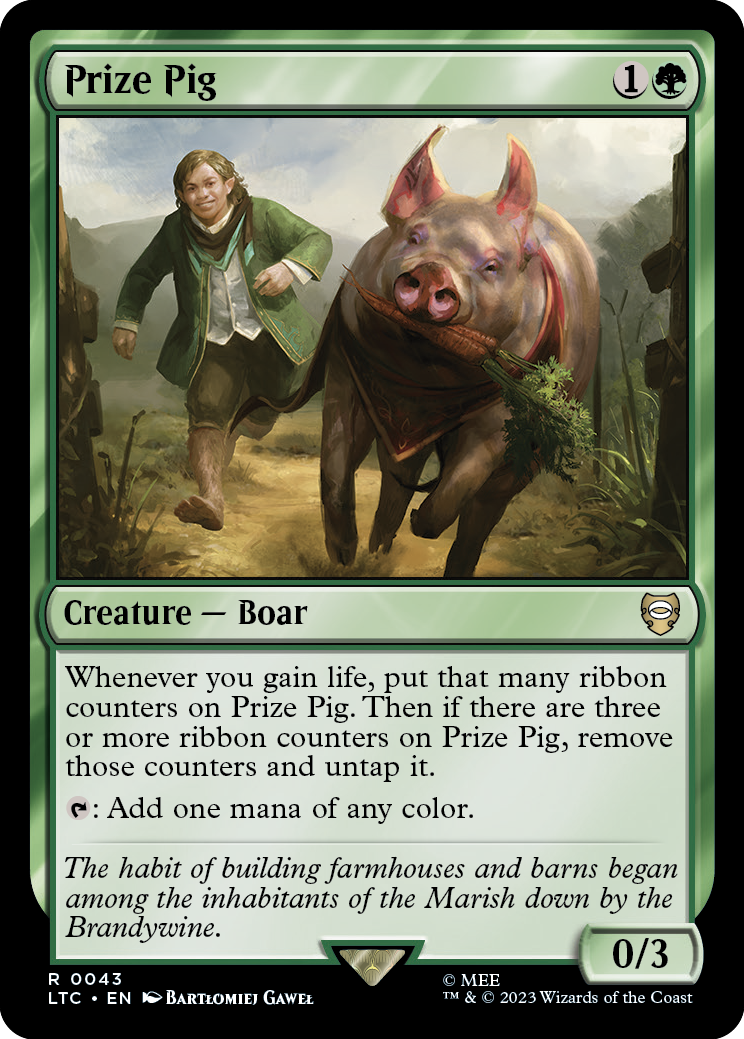
Prize Pig
{1}{G}
Creature — Boar
0/3
Whenever you gain life, put that many ribbon counters on Prize Pig. Then if there are three or more ribbon counters on Prize Pig, remove those counters and untap it.
{T}: Add one mana of any color.
- If there are three or more ribbon counters on Prize Pig after you put ribbon counters on it, all of the counters will be removed. It does not matter whether or not Prize Pig is already untapped.
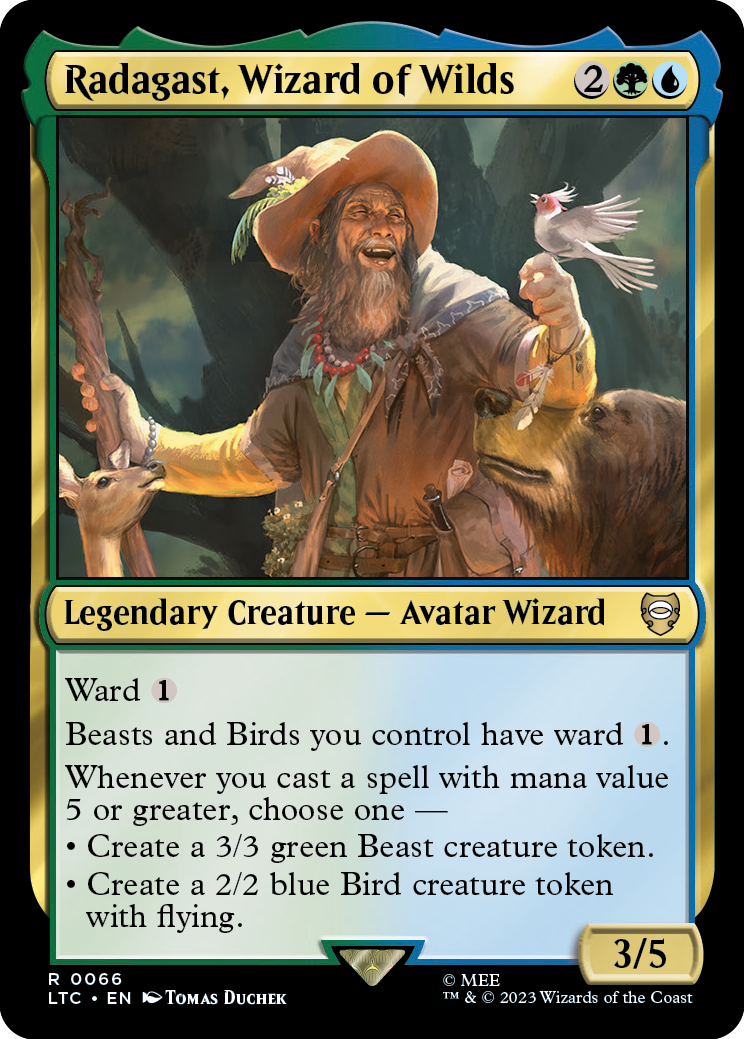
Radagast, Wizard of Wilds
{2}{G}{U}
Legendary Creature — Avatar Wizard
3/5
Ward {1}
Beasts and Birds you control have ward {1}.
Whenever you cast a spell with mana value 5 or greater, choose one —
• Create a 3/3 green Beast creature token.
• Create a 2/2 blue Bird creature token with flying.
- A creature that is both a Beast and a Bird still only gets one instance of ward {1} from Radagast, Wizard of Wilds's first ability.
- If Radagast, Wizard of Wilds is a Beast or a Bird, it will have two instances of ward {1}.
- Radagast, Wizard of the Wilds's last triggered ability will resolve before the spell that caused it to trigger resolves. It will resolve even if the spell that caused it to trigger is countered or has otherwise left the stack.
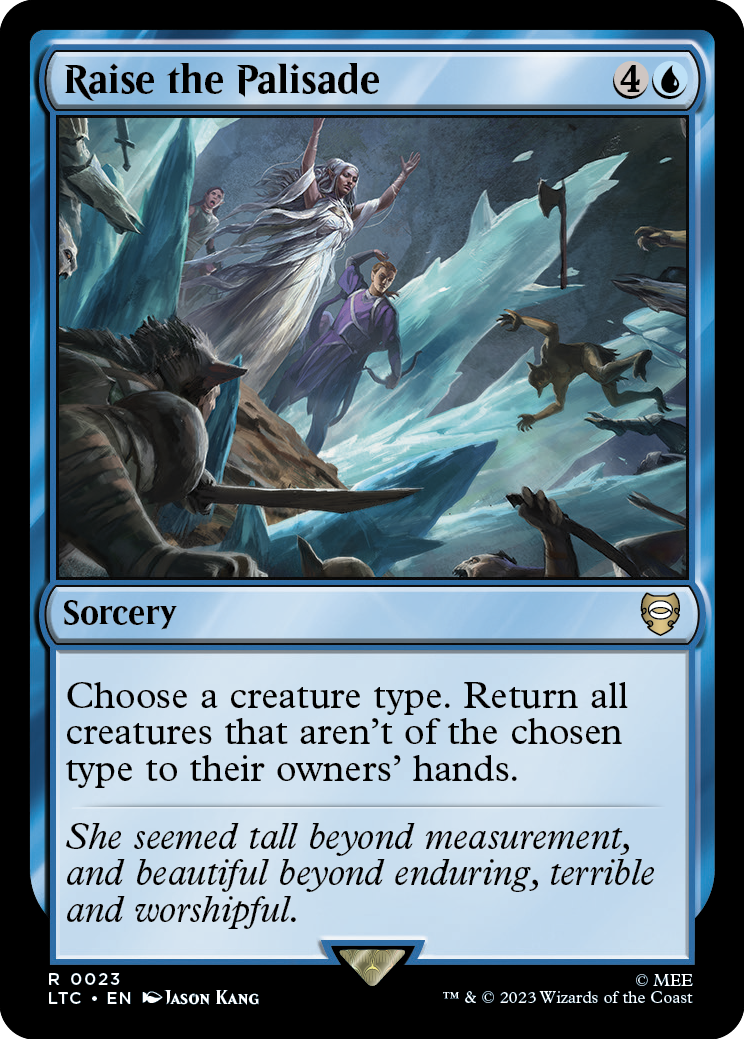
Raise the Palisade
{4}{U}
Sorcery
Choose a creature type. Return all creatures that aren't of the chosen type to their owners' hands.
- To choose a creature type, you must choose an existing creature type, such as Halfling or Scout. You can't choose multiple creature types, such as "Halfling Scout." Card types such as artifacts can't be chosen, nor can subtypes that aren't creature types, such as Forest, Equipment, or Food.
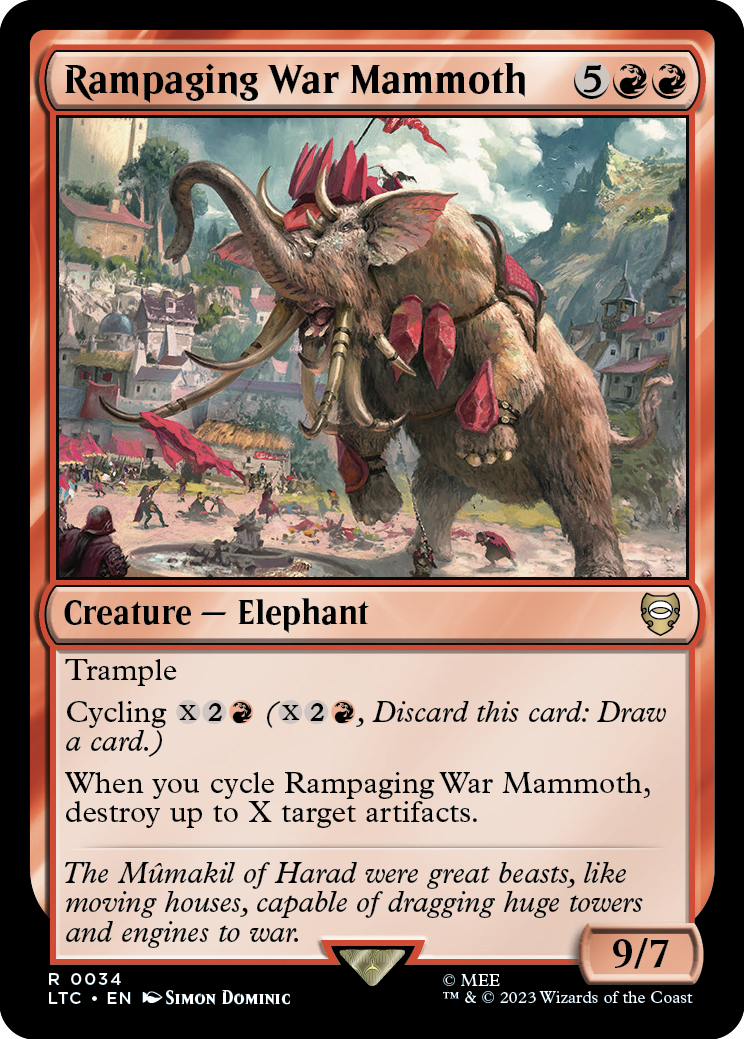
Rampaging War Mammoth
{5}{R}{R}
Creature — Elephant
9/7
Trample
Cycling {X}{2}{R} ({X}{2}{R}, Discard this card: Draw a card.)
When you cycle Rampaging War Mammoth, destroy up to X target artifacts.
- Some cards with cycling have an ability that triggers when you cycle them, and some cards have an ability that triggers whenever you cycle any card. These triggered abilities resolve before you draw from the cycling ability.
- Triggered abilities from cycling a card and the cycling ability itself aren't spells. Effects that interact with spells (such as Saruman's Trickery) won't affect them.
- You can choose 0 as the value of X in Rampaging War Mammoth's cycling cost. In that case, its triggered ability won't have any targets and won't destroy any artifacts.
- You can cycle a card even if it has a triggered ability from cycling that won't have a legal target. This is because the cycling ability and the triggered ability are separate. This also means that if either ability is countered, the other ability will still resolve.
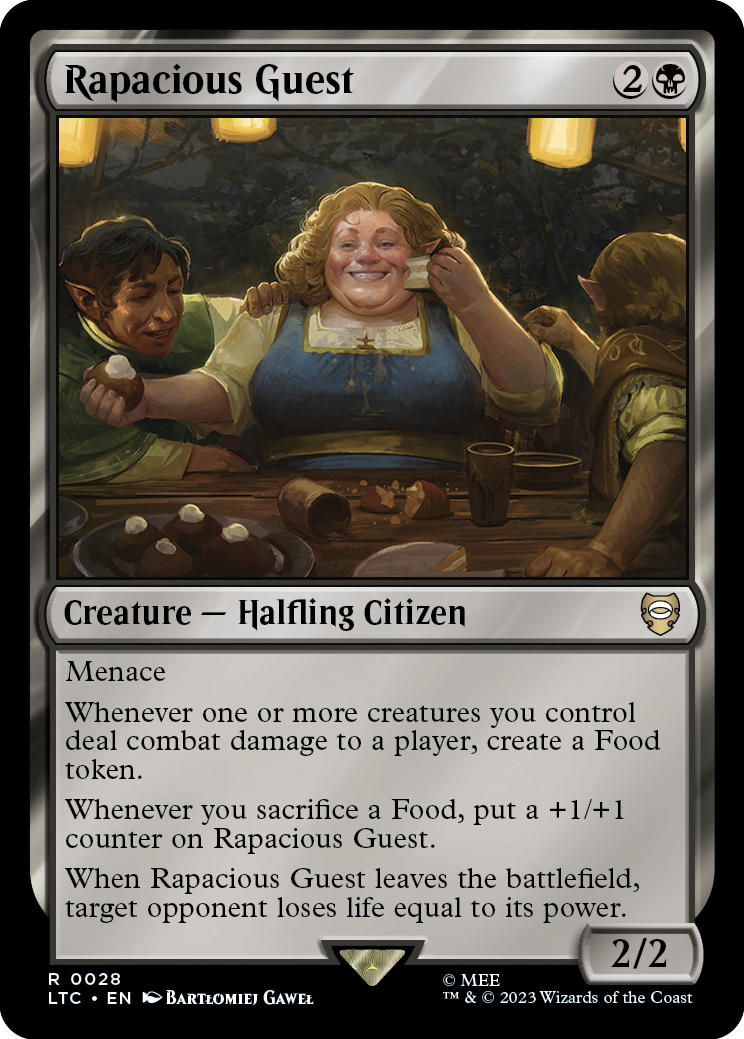
Rapacious Guest
{2}{B}
Creature — Halfling Citizen
2/2
Menace
Whenever one or more creatures you control deal combat damage to a player, create a Food token.
Whenever you sacrifice a Food, put a +1/+1 counter on Rapacious Guest.
When Rapacious Guest leaves the battlefield, target opponent loses life equal to its power.
- Rapacious Guest's third ability triggers whenever you sacrifice a Food for any reason, not just to activate a Food's activated ability.
- To determine the amount of life the target opponent loses from Rapacious Guest's last ability, use Rapacious Guest's power as it last existed on the battlefield, not its power in the graveyard.
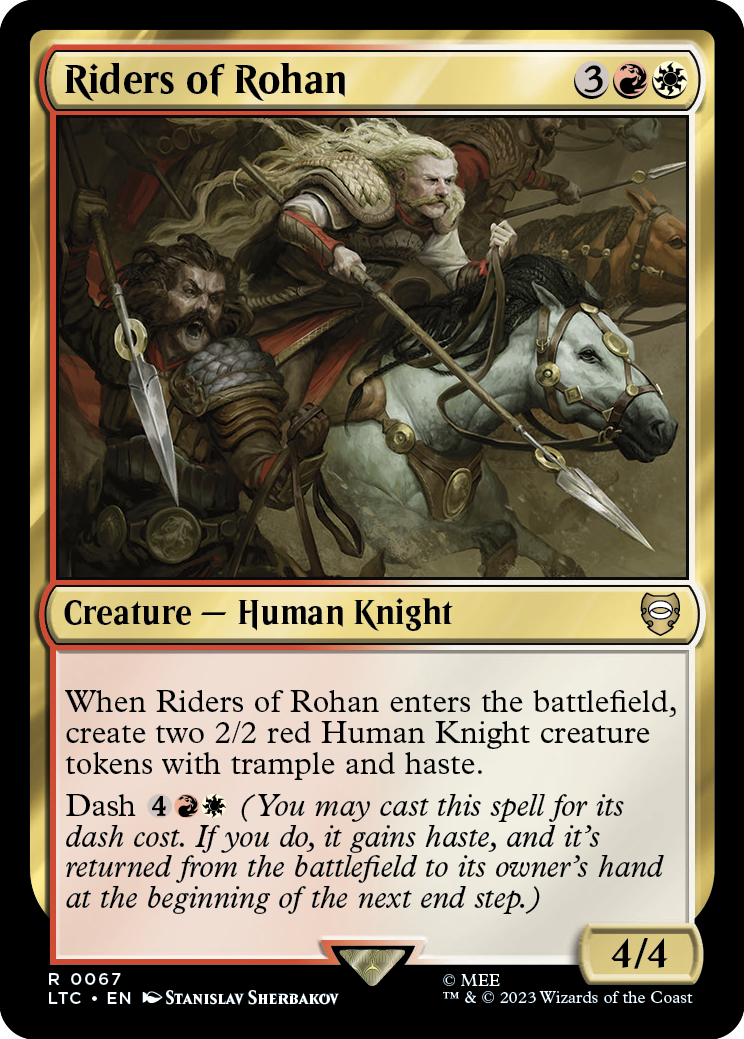
Riders of Rohan
{3}{R}{W}
Creature — Human Knight
4/4
When Riders of Rohan enters the battlefield, create two 2/2 red Human Knight creature tokens with trample and haste.
Dash {4}{R}{W} (You may cast this spell for its dash cost. If you do, it gains haste, and it's returned from the battlefield to its owner's hand at the beginning of the next end step.)
- If you pay the dash cost to cast a creature spell, that card will be returned to its owner's hand only if it's still on the battlefield when its triggered ability resolves. If it dies or goes to another zone before then, it will stay where it is.
- You don't have to attack with the creature with dash unless another ability says you do.
- If a creature enters the battlefield as a copy of or becomes a copy of a creature whose dash cost was paid, the copy won't have haste and won't be returned to its owner's hand.
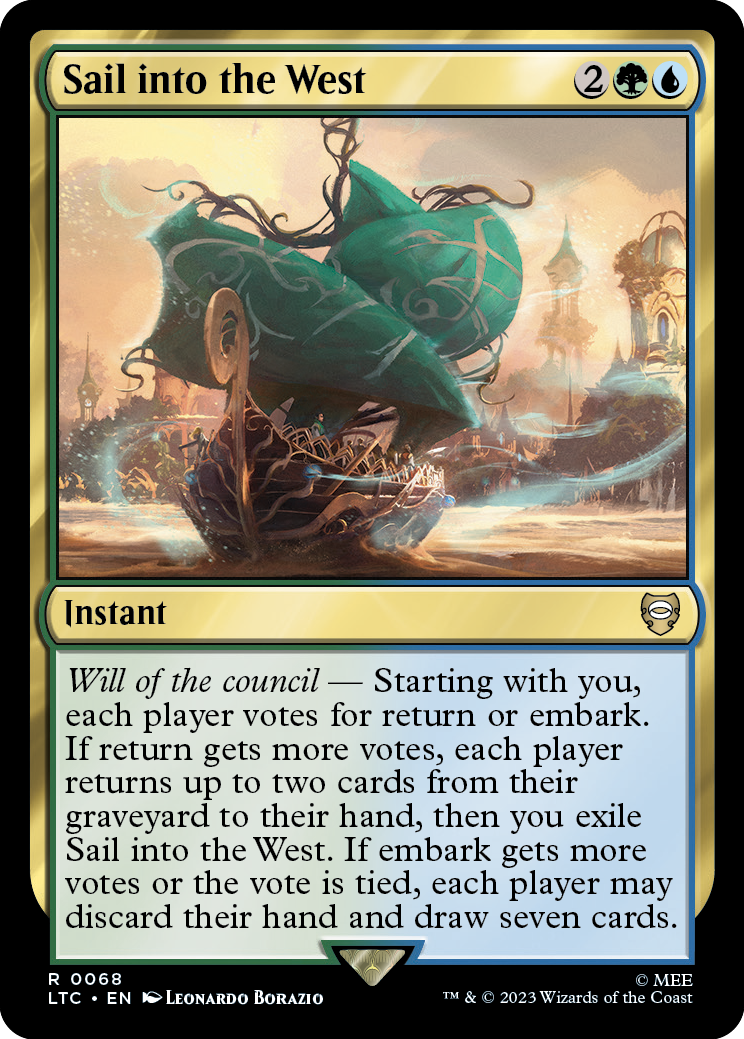
Sail into the West
{2}{G}{U}
Instant
Will of the council — Starting with you, each player votes for return or embark. If return gets more votes, each player returns up to two cards from their graveyard to their hand, then you exile Sail into the West. If embark gets more votes or the vote is tied, each player may discard their hand and draw seven cards.
- If return gets more votes, first the active player chooses which cards they'll return from their graveyard to their hand, then each other player in turn order does the same, knowing choices made before their choice. Then all those cards are returned from graveyards to hands simultaneously.
- If embark gets more votes or the vote is tied, players decide and announce in turn order, starting with the active player, whether or not they want to discard their hand. Then, all players who chose to do so discard their hands and draw seven cards. Players later in the turn order will know if players before them are discarding, but they don't get to see what those players will discard to help them decide whether to discard themselves.
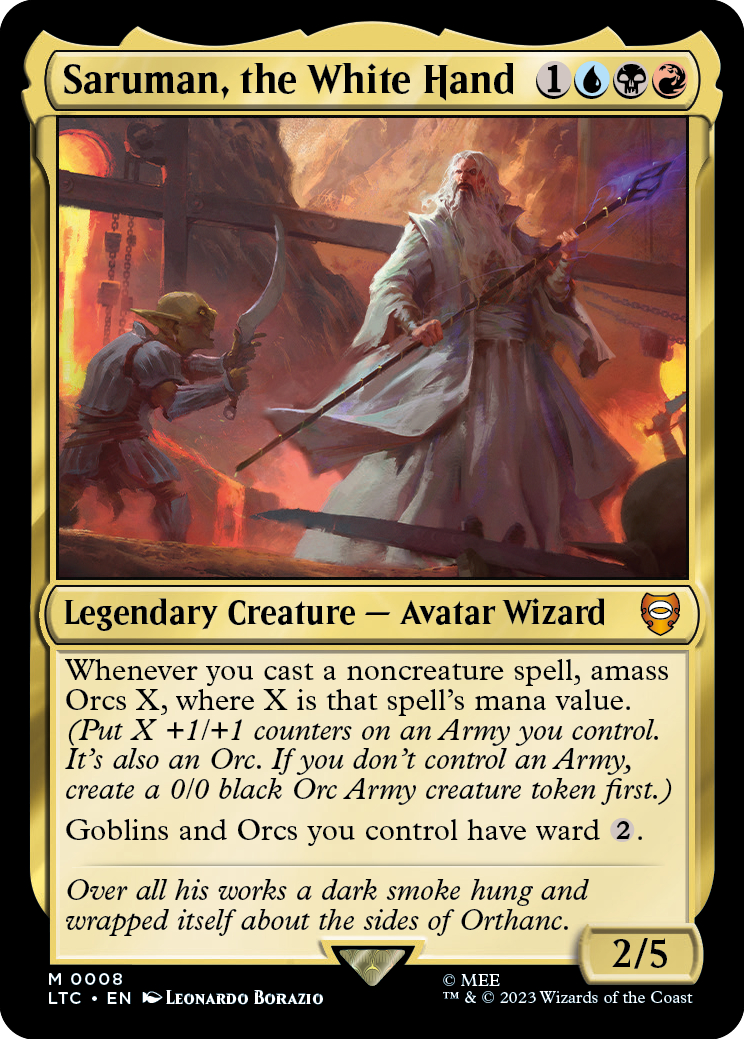
Saruman, the White Hand
{1}{U}{B}{R}
Legendary Creature — Avatar Wizard
2/5
Whenever you cast a noncreature spell, amass Orcs X, where X is that spell's mana value. (Put X +1/+1 counters on an Army you control. It's also an Orc. If you don't control an Army, create a 0/0 black Orc Army creature token first.)
Goblins and Orcs you control have ward {2}.
- A creature that is both a Goblin and an Orc still only gets one instance of ward {2} from Saruman, the White Hand's last ability.
- If Saruman, the White Hand is a Goblin or an Orc, it will have ward {2}.
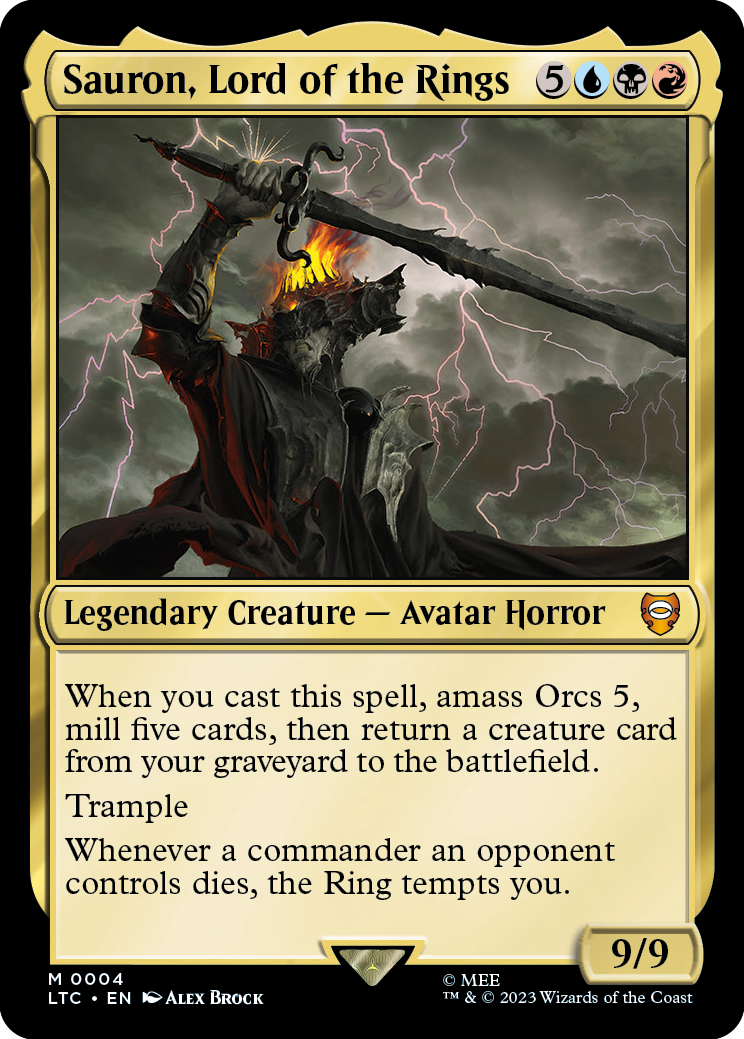
Sauron, Lord of the Rings
{5}{U}{B}{R}
Legendary Creature — Avatar Horror
9/9
When you cast this spell, amass Orcs 5, mill five cards, then return a creature card from your graveyard to the battlefield.
Trample
Whenever a commander an opponent controls dies, the Ring tempts you.
- The creature card you choose doesn't need to be a card you milled. You may choose a creature card that was already in your graveyard before you milled.
- Sauron, Lord of the Rings's last ability will trigger even if the owner of the commander that died chooses to return it to the command zone after it dies.
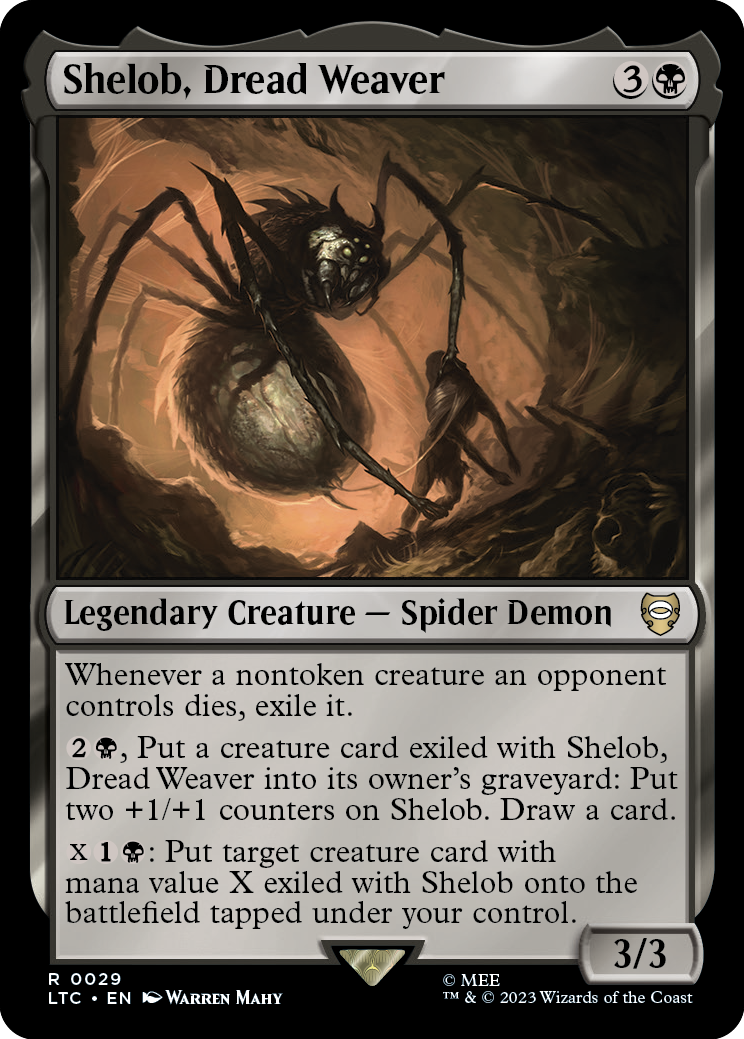
Shelob, Dread Weaver
{3}{B}
Legendary Creature — Spider Demon
3/3
Whenever a nontoken creature an opponent controls dies, exile it.
{2}{B}, Put a creature card exiled with Shelob, Dread Weaver into its owner's graveyard: Put two +1/+1 counters on Shelob. Draw a card.
{X}{1}{B}: Put target creature card with mana value X exiled with Shelob onto the battlefield tapped under your control.
- If Shelob, Dread Weaver and a nontoken creature an opponent controls die at the same time, the opponent's creature will be exiled.
- Cards exiled with Shelob, Dread Weaver that would go to the graveyard but have that replaced by an effect such as Leyline of the Void are considered new objects. They are no longer considered to have been exiled with Shelob, Dread Weaver for the purposes of its activated abilities.
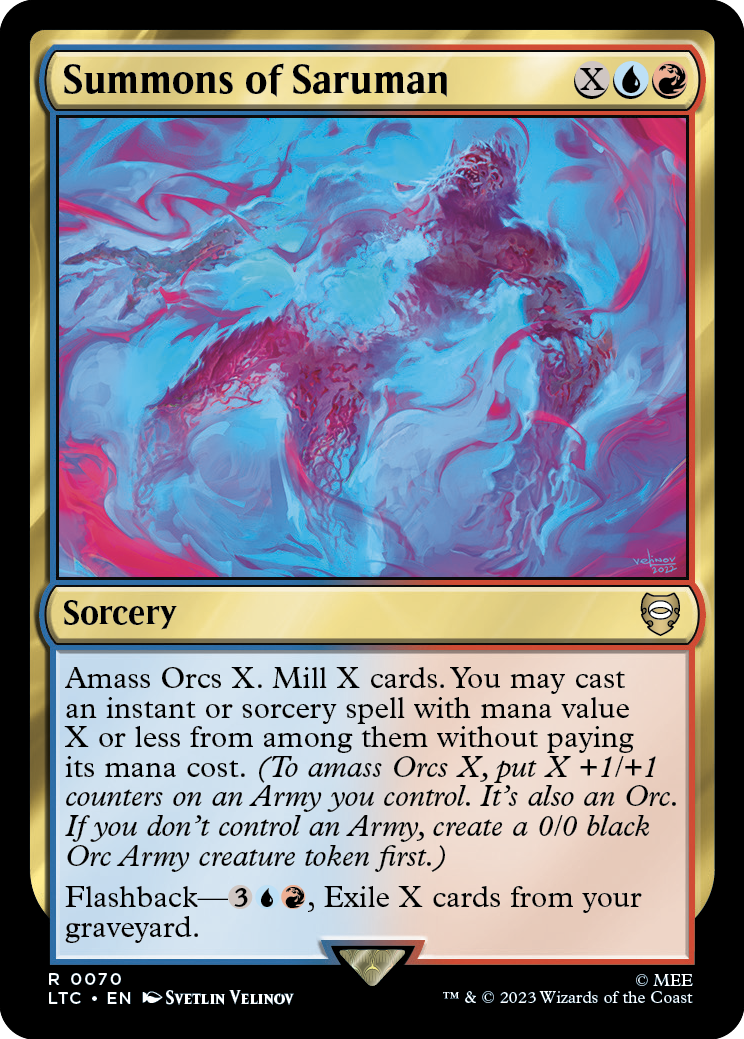
Summons of Saruman
{X}{U}{R}
Sorcery
Amass Orcs X. Mill X cards. You may cast an instant or sorcery spell with mana value X or less from among them without paying its mana cost. (To amass Orcs X, put X +1/+1 counters on an Army you control. It's also an Orc. If you don't control an Army, create a 0/0 black Orc Army creature token first.)
Flashback—{3}{U}{R}, Exile X cards from your graveyard.
- If you want to cast one of the milled cards, you cast it as part of the resolution of Summons of Saruman. You can't wait to cast the spell later in the turn. Timing permissions based on the card's type are ignored.
- If you cast a spell "without paying its mana cost", you can't choose to cast it for any alternative costs. You can, however, pay additional costs, such as kicker costs. If the card has any mandatory additional costs, those must be paid to cast the spell.
- If the spell has {X} in its mana cost, you must choose 0 as the value of X.
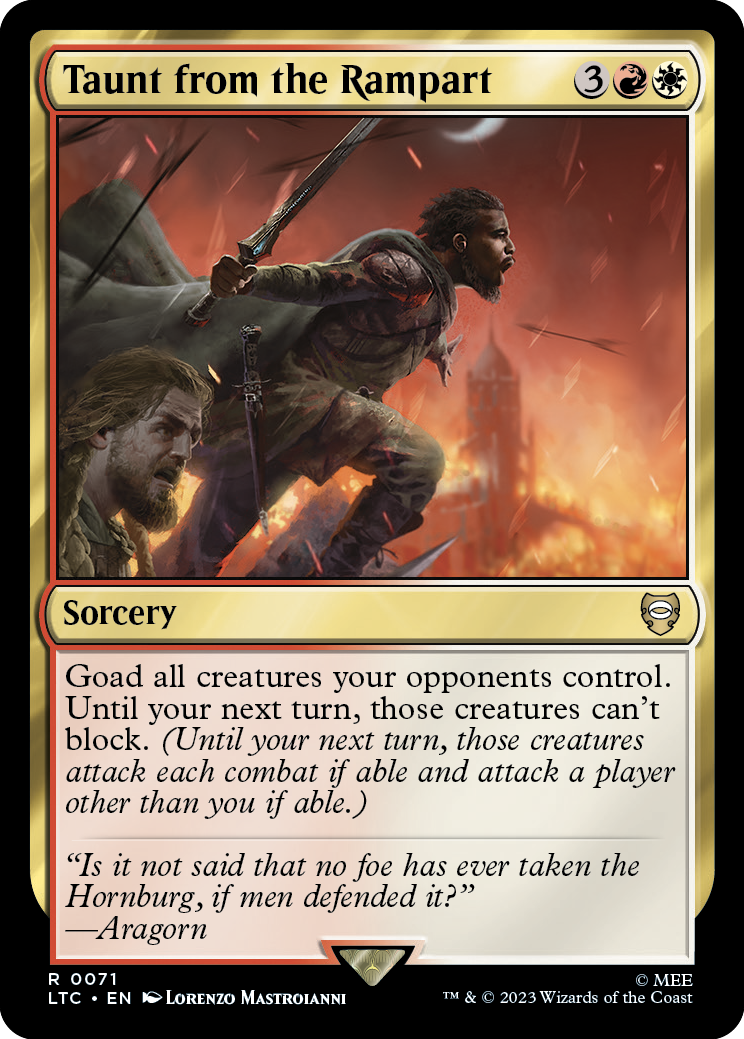
Taunt from the Rampart
{3}{R}{W}
Sorcery
Goad all creatures your opponents control. Until your next turn, those creatures can't block. (Until your next turn, those creatures attack each combat if able and attack a player other than you if able.)
- If, during a player's declare attackers step, a creature that player controls that's been goaded is tapped, is affected by a spell or ability that says it can't attack, or hasn't been under that player's control continuously since the turn began (and doesn't have haste), then it doesn't attack. If there's a cost associated with having a creature attack a player, its controller isn't forced to pay that cost, so it doesn't have to attack that player.
- If the creature doesn't meet any of the above exceptions and can attack, it must attack a player other than the controller of the spell or ability that goaded it if able. If the creature can't attack any of those players but could otherwise attack, it must attack an opposing planeswalker (controlled by any opponent) or the player that goaded it.
- Being goaded isn't an ability the creature has. Once it's been goaded, it must attack as detailed above even if it loses all abilities.
- Attacking with a goaded creature doesn't cause it to stop being goaded. If there is an additional combat phase that turn, or if another player gains control of it before it stops being goaded, it must attack again if able.
- If a creature you control has been goaded by multiple opponents, it must attack one of your opponents that hasn't goaded it, as that fulfills the maximum number of goad requirements. If a creature you control has been goaded by each of your opponents, you choose which opponent it attacks.
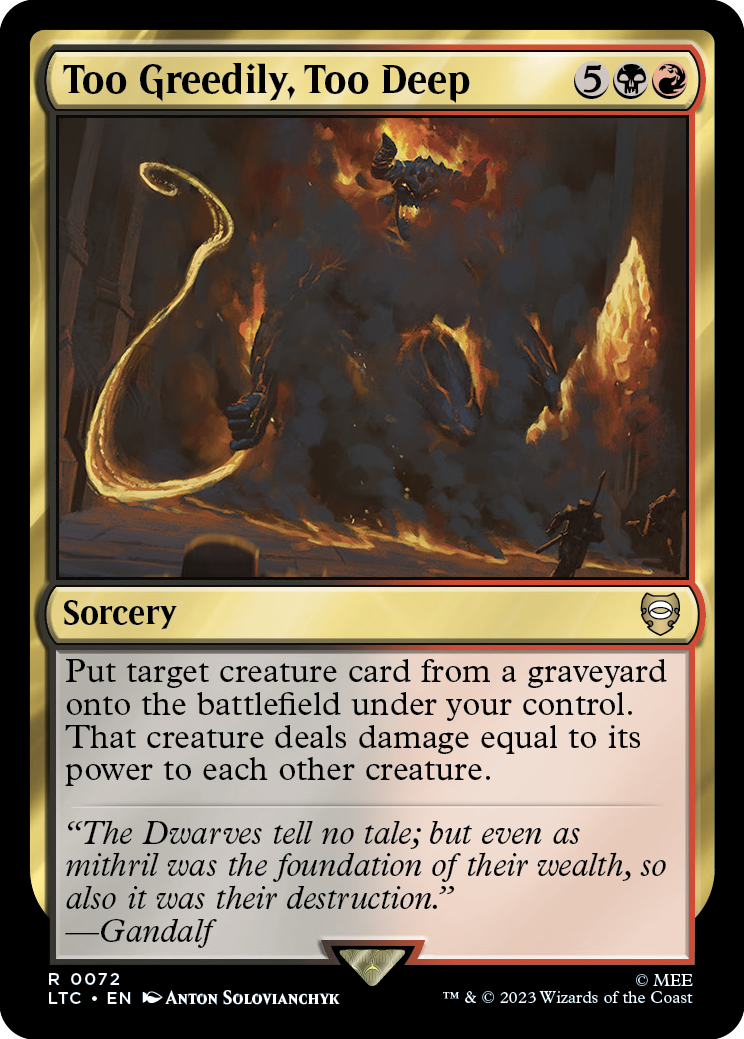
Too Greedily, Too Deep
{5}{B}{R}
Sorcery
Put target creature card from a graveyard onto the battlefield under your control. That creature deals damage equal to its power to each other creature.
- If the card you return to the battlefield isn't a creature on the battlefield, it has no power and therefore deals no damage.
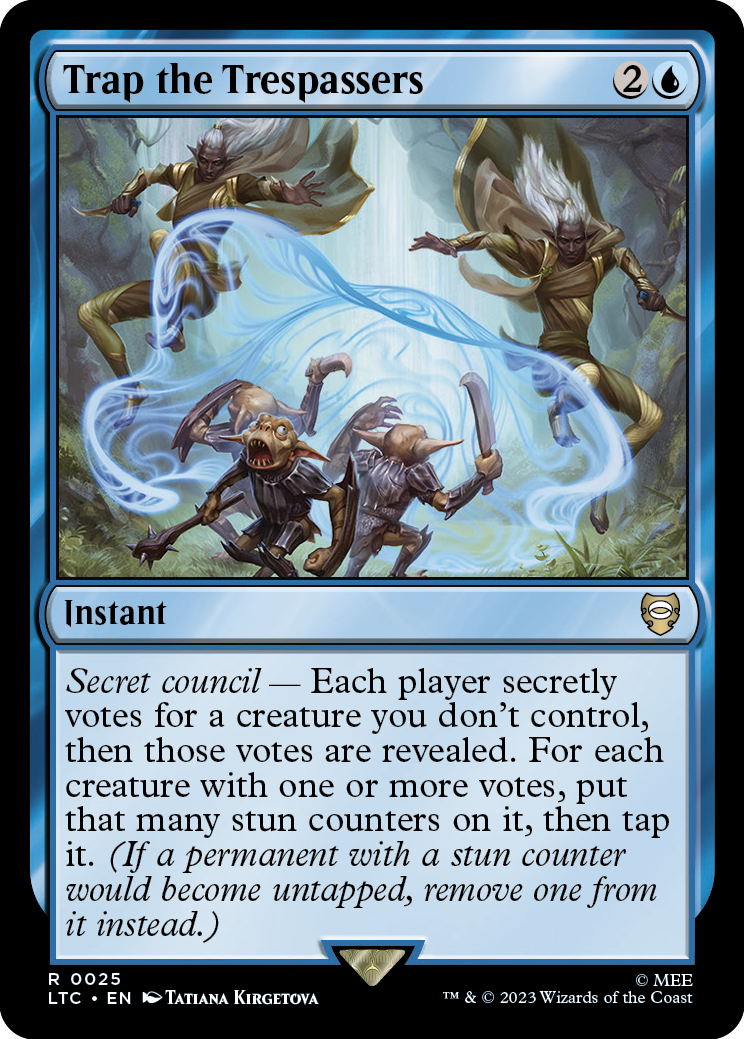
Trap the Trespassers
{2}{U}
Instant
Secret council — Each player secretly votes for a creature you don't control, then those votes are revealed. For each creature with one or more votes, put that many stun counters on it, then tap it. (If a permanent with a stun counter would become untapped, remove one from it instead.)
- None of the creatures are targeted. Players may vote for a creature with hexproof, protection from blue, or similar.
- Players may vote for creatures that are already tapped.
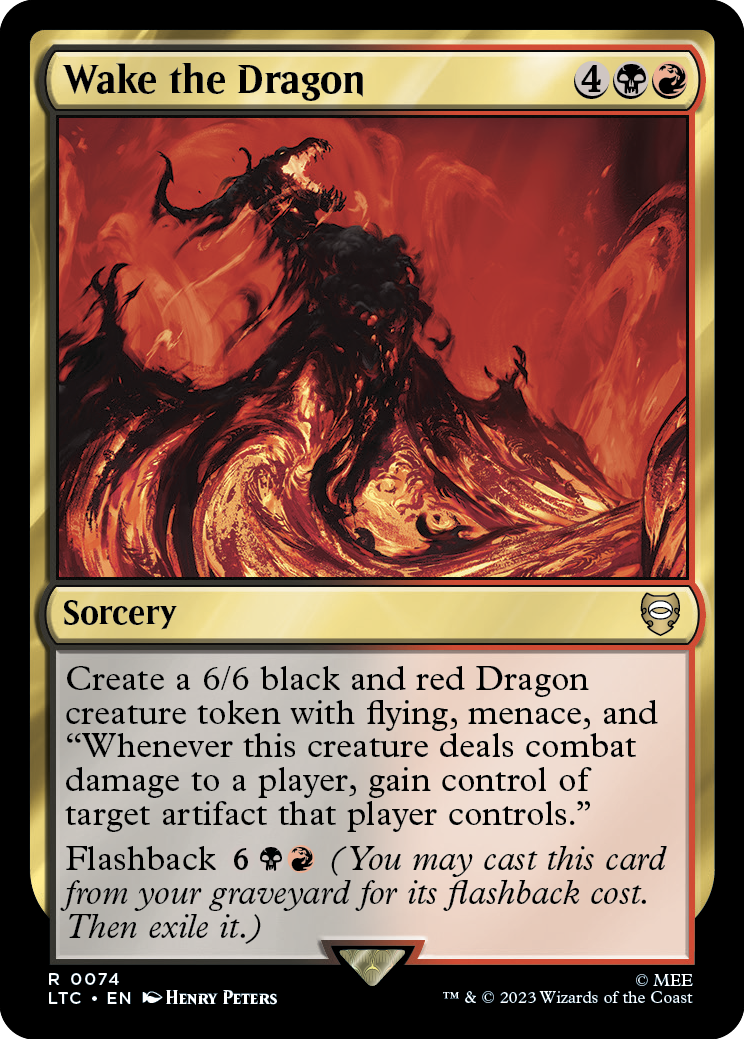
Wake the Dragon
{4}{B}{R}
Sorcery
Create a 6/6 black and red Dragon creature token with flying, menace, and "Whenever this creature deals combat damage to a player, gain control of target artifact that player controls."
Flashback {6}{B}{R} (You may cast this card from your graveyard for its flashback cost. Then exile it.)
- "Flashback [cost]" means "You may cast this card from your graveyard by paying [cost] rather than paying its mana cost" and "If the flashback cost was paid, exile this card instead of putting it anywhere else any time it would leave the stack."
- You must still follow any timing restrictions and permissions, including those based on the card's type. For instance, you can cast a sorcery using flashback only when you could normally cast a sorcery.
- To determine the total cost of a spell, start with the mana cost or alternative cost (such as a flashback cost) you're paying, add any cost increases, then apply any cost reductions. The mana value of the spell is determined only by its mana cost, no matter what the total cost to cast the spell was.
- A spell cast using flashback will always be exiled afterward, whether it resolves, is countered, or leaves the stack in some other way.
- You can cast a spell using flashback even if it was somehow put into your graveyard without having been cast.
- If a card with flashback is put into your graveyard during your turn, you can cast it if it's legal to do so before any other player can take any actions.
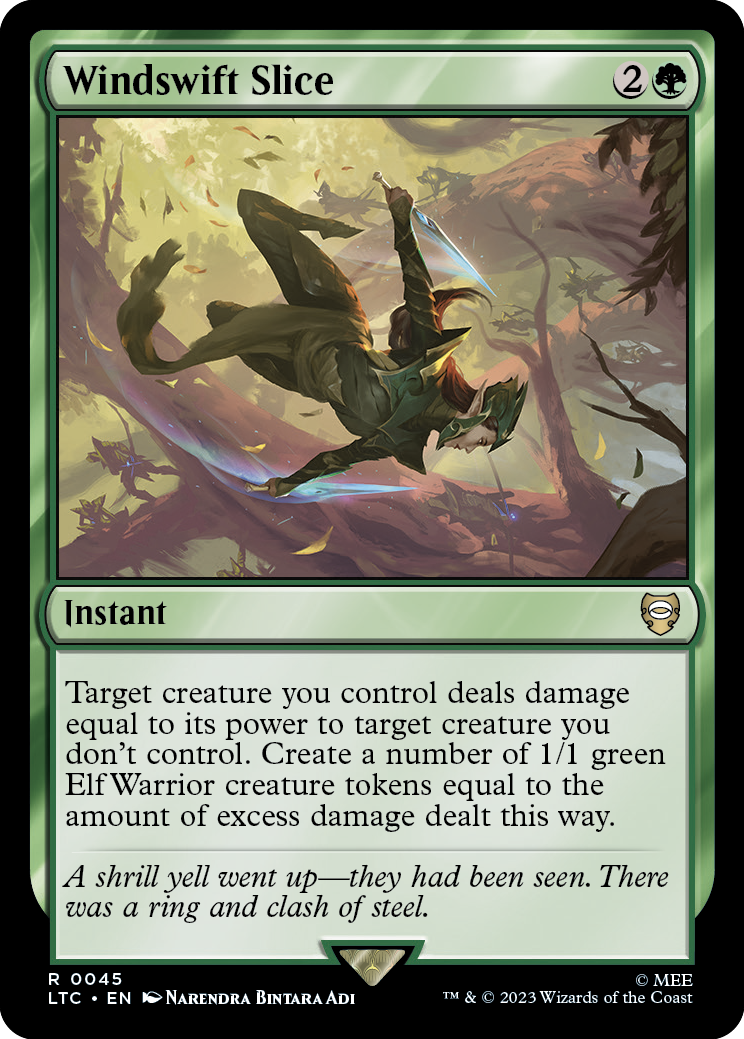
Windswift Slice
{2}{G}
Instant
Target creature you control deals damage equal to its power to target creature you don't control. Create a number of 1/1 green Elf Warrior creature tokens equal to the amount of excess damage dealt this way.
- Excess damage has been dealt to a creature if the damage dealt to it is greater than lethal damage. Usually, this means damage greater than its toughness, although damage already marked on the creature is taken into account.
- Even 1 damage dealt to a creature from a source with deathtouch is considered lethal damage, so any amount greater than that will cause excess damage to be dealt, even if the total amount of damage isn't greater than the creature's toughness. Note that a source of damage having deathtouch has no effect on damage dealt to planeswalkers.
The Lord of the Rings: Tales of Middle-earth™ November 2023 Release Notes
Compiled by Eric Levine
Document last modified August 30, 2023
PDF Download Links:
English
The Release Notes include information concerning the release of a new Magic: The Gathering set, as well as a collection of clarifications and rulings involving that set's cards. It's intended to make playing with the new cards more fun by clearing up the common misconceptions and confusion inevitably caused by new mechanics and interactions. As future sets are released, updates to the Magic rules may cause some of this information to become outdated. Go to Magic.Wizards.com/Rules to find the most up-to-date rules.
The "General Notes" section includes information about card legality and explains some of the mechanics and concepts in the set.
The "Card-Specific Notes" sections contain answers to the most important, most common, and most confusing questions players might ask about cards in the set. Items in the "Card-Specific Notes" sections include full card text for your reference. Not all cards in the set are listed.
GENERAL NOTES
Card Legality
The Lord of the Rings: Tales of Middle-earth™ cards with the LTR set code are permitted in the Modern format, as well as in Commander, Legacy, and Vintage.
New The Lord of the Rings: Tales of Middle-earth Commander cards with the LTC set code are permitted in the Commander, Legacy, and Vintage formats. Reprinted cards with the LTC set code are legal for play in any format where a card with the same name is permitted.
Go to Magic.Wizards.com/Formats for a complete list of formats and their permitted card sets and banned lists.
Go to Magic.Wizards.com/Commander for more information on the Commander variant.
Go to Locator.Wizards.com to find an event or store near you.
THE LORD OF THE RINGS: TALES OF MIDDLE-EARTH JUMPSTART VOLUME 2 CARD-SPECIFIC NOTES
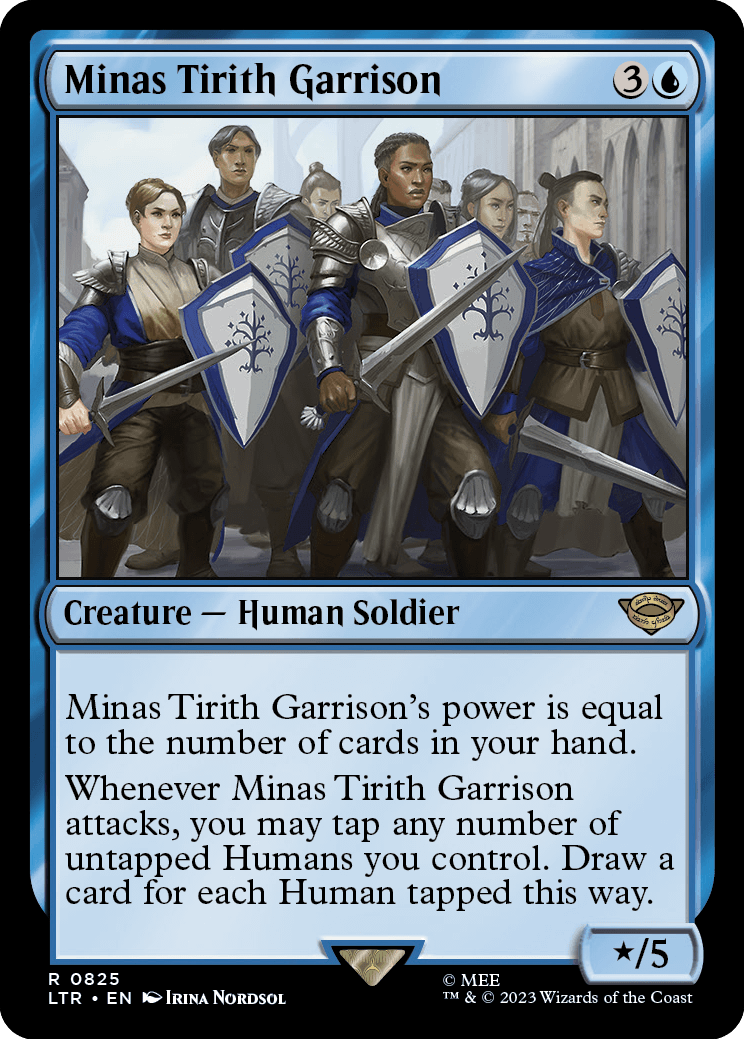
Minas Tirith Garrison
{3}{U}
Creature — Human Soldier
*/5
Minas Tirith Garrison's power is equal to the number of cards in your hand.
Whenever Minas Tirith Garrison attacks, you may tap any number of untapped Humans you control. Draw a card for each Human tapped this way.
- The ability that defines Minas Tirith Garrison's power applies in all zones, not just the battlefield.
- You choose how many and which creatures to tap while Minas Tirith Garrison's last ability is resolving. No player may take any other actions between the time you make this choice and the time at which you draw cards.
- If an attacking Human is tapped for Minas Tirith Garrison's ability (perhaps because it has vigilance or it was untapped after being declared as an attacker), that Human remains an attacking creature.
- If Minas Tirith Garrison is untapped as its last ability resolves, it can be tapped for its own last ability.
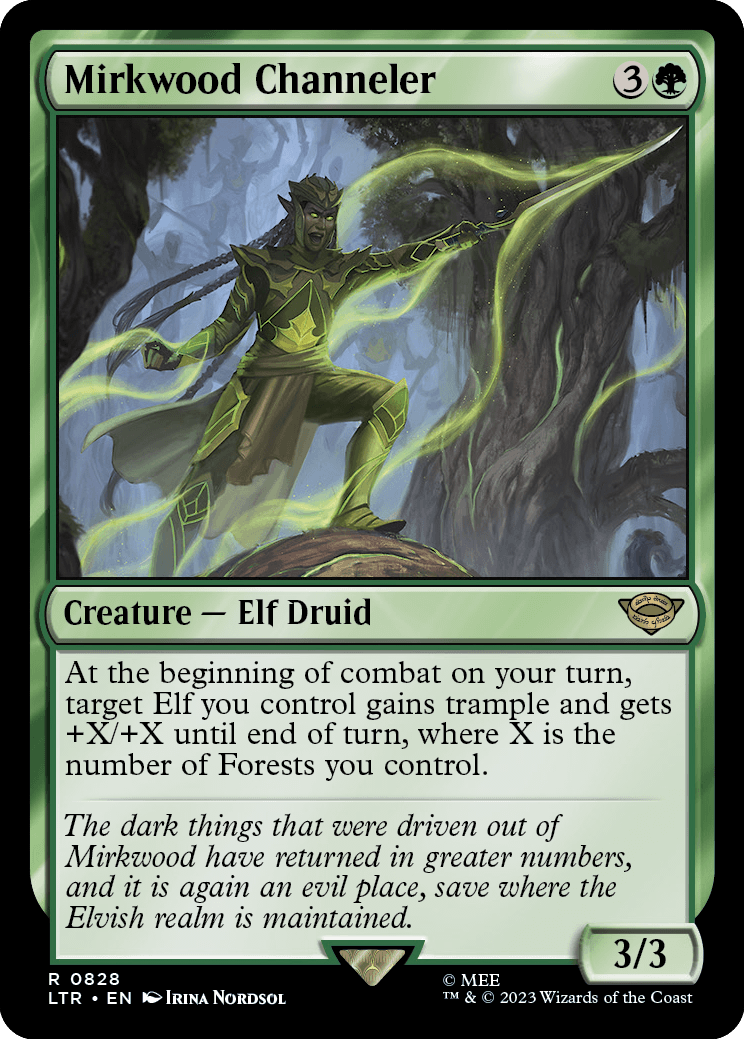
Mirkwood Channeler
{3}{G}
Creature — Elf Druid
3/3
At the beginning of combat on your turn, target Elf you control gains trample and gets +X/+X until end of turn, where X is the number of Forests you control.
- Count the number of Forests you control as Mirkwood Channeler's ability resolves to determine the value of X.
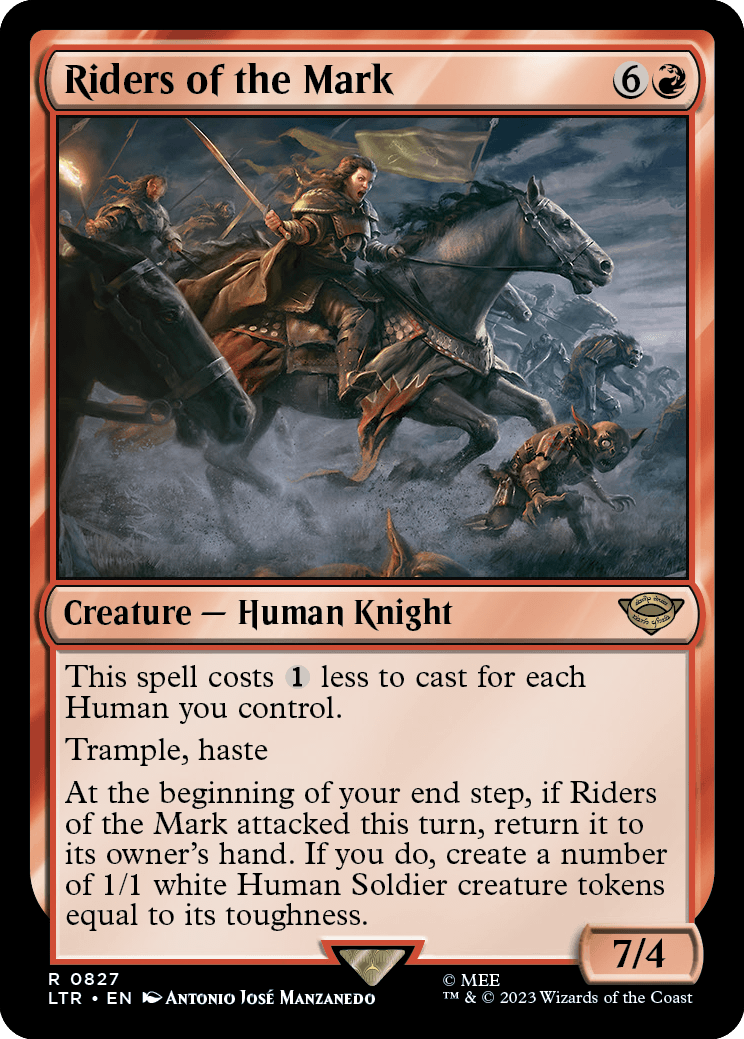
Riders of the Mark
{6}{R}
Creature — Human Knight
7/4
This spell costs {1} less to cast for each Human you control.
Trample, haste
At the beginning of your end step, if Riders of the Mark attacked this turn, return it to its owner's hand. If you do, create a number of 1/1 white Human Soldier creature tokens equal to its toughness.
- If Riders of the Mark leaves the battlefield before its triggered ability resolves, you can't return it to its owner's hand from its new zone.
- Use Riders of the Mark's toughness as it last existed on the battlefield to determine how many 1/1 white Human Soldier creature tokens to create.
- You won't create tokens if Riders of the Mark is returned to your hand by an effect other than its own triggered ability.
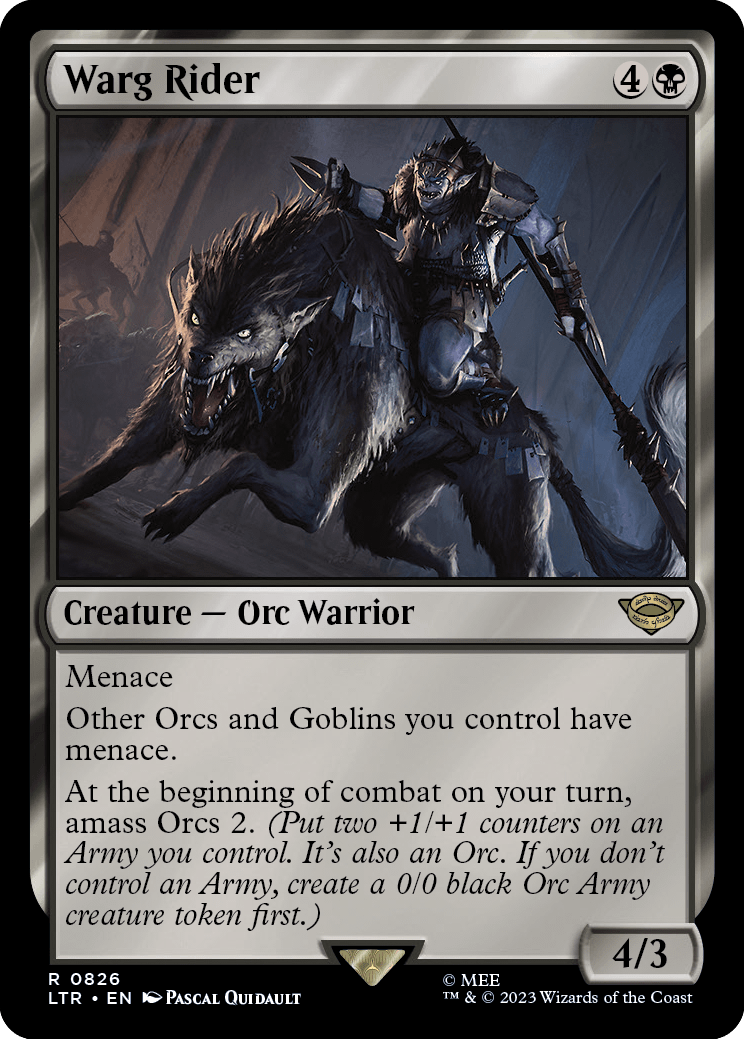
Warg Rider
{4}{B}
Creature — Orc Warrior
4/3
Menace
Other Orcs and Goblins you control have menace.
At the beginning of combat on your turn, amass Orcs 2. (Put two +1/+1 counters on an Army you control. It's also an Orc. If you don't control an Army, create a 0/0 black Orc Army creature token first.)
- To amass Orcs N, if you don't control an Army creature, create a 0/0 black Orc Army creature token. Then you choose an Army creature you control and put N +1/+1 counters on it. If that Army isn't already an Orc, it becomes an Orc in addition to its other types.
- In the rare case that you control multiple Army creatures (perhaps because you cast a creature with changeling) while you amass Orcs, you choose which of your Army creatures to put the +1/+1 counters on. If that creature isn't an Orc, it becomes an Orc in addition to its other types.
- If you don't control an Army, the Orc Army token you create enters the battlefield as a 0/0 creature before receiving counters. Any abilities that trigger when a creature with a certain power enters the battlefield, such as that of Mentor of the Meek, will see the token enter as a 0/0 creature before it gets +1/+1 counters.
THE LORD OF THE RINGS: TALES OF MIDDLE-EARTH SCENE BOX CARD-SPECIFIC NOTES
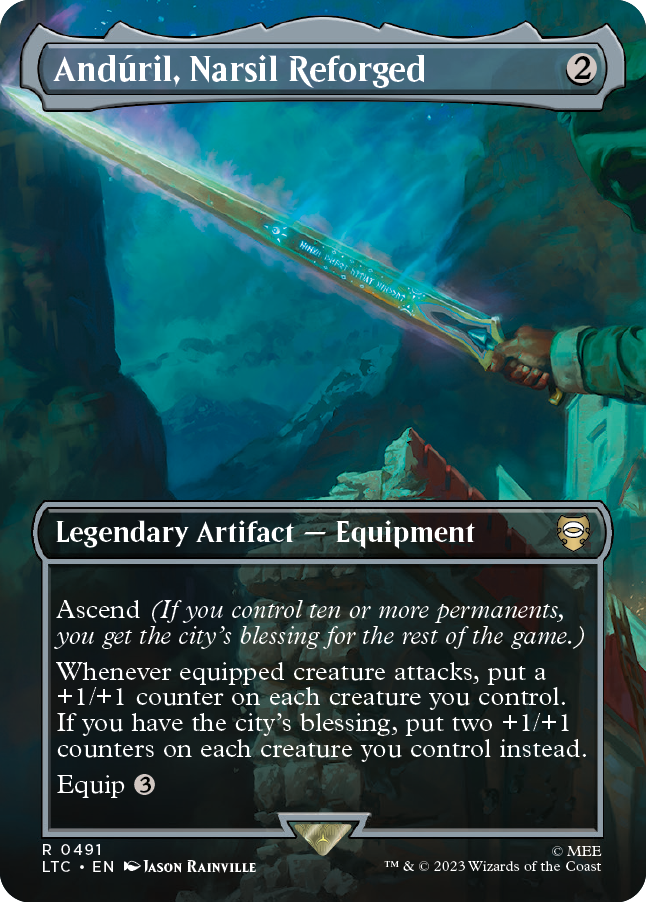
Andúril, Narsil Reforged
{2}
Legendary Artifact — Equipment
Ascend (If you control ten or more permanents, you get the city's blessing for the rest of the game.)
Whenever equipped creature attacks, put a +1/+1 counter on each creature you control. If you have the city's blessing, put two +1/+1 counters on each creature you control instead.
Equip {3}
- If you cast a spell with ascend, you don't get the city's blessing until it resolves. Players may respond to that spell by trying to change whether you get the city's blessing.
- Once you have the city's blessing, you have it for the rest of the game, even if you lose control of some or all your permanents. The city's blessing isn't a permanent itself and can't be removed by any effect.
- A permanent is any object on the battlefield, including tokens and lands. Spells and emblems aren't permanents.
- If you control ten permanents but don't control a permanent or resolving spell with ascend, you don't get the city's blessing. For example, if you control ten permanents, lose control of two, then cast Andúril, Narsil Reforged, you won't have the city's blessing.
- If your tenth permanent enters the battlefield and then a permanent leaves the battlefield immediately afterwards (most likely due to the "legend rule" or due to being a creature with 0 toughness), you get the city's blessing before it leaves the battlefield.
- Ascend on a permanent isn't a triggered ability and doesn't use the stack. Players can respond to a spell that will give you your tenth permanent, but they can't respond to you getting the city's blessing once you control that tenth permanent. This means that if your tenth permanent is a land you play, players can't respond before you get the city's blessing.
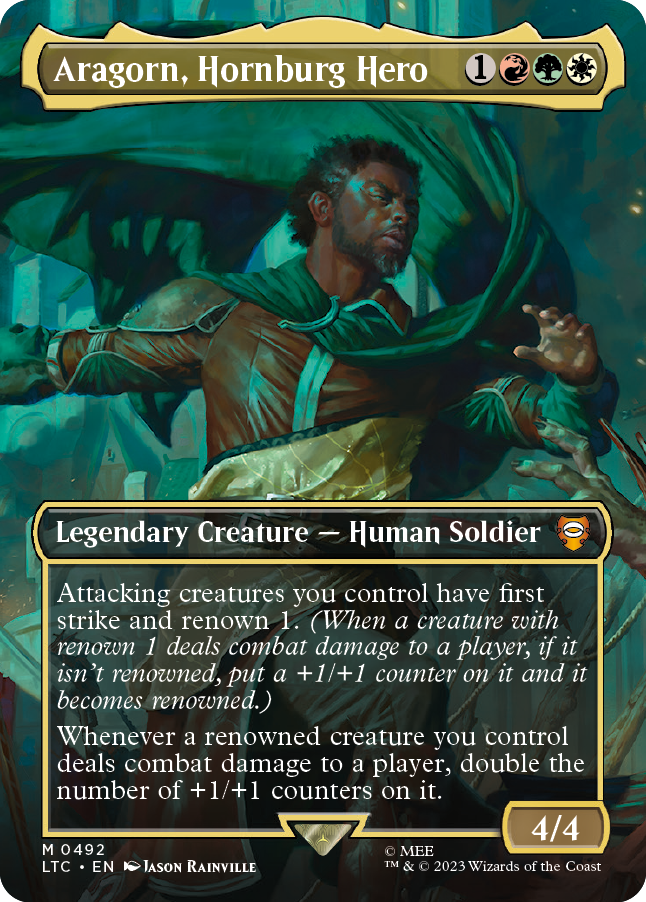
Aragorn, Hornburg Hero
{1}{R}{G}{W}
Legendary Creature — Human Soldier
4/4
Attacking creatures you control have first strike and renown 1. (When a creature with renown 1 deals combat damage to a player, if it isn't renowned, put a +1/+1 counter on it and it becomes renowned.)
Whenever a renowned creature you control deals combat damage to a player, double the number of +1/+1 counters on it.
- If a creature has multiple instances of renown, each triggers separately. The first one that resolves causes the creature to become renowned, which means any additional renown abilities that creature has will have no effect. The creature's controller chooses what order to put those renown abilities on the stack, so they can choose to have the ability with the higher renown number resolve first.
- When a creature you control that isn't renowned deals combat damage to a player, you'll put a +1/+1 counter on it and it will become renowned. Since it wasn't renowned when it dealt combat damage, Aragorn, Hornburg Hero's last ability won't trigger, and you won't double the number of +1/+1 counters on it.
- Renown won't trigger when a creature deals damage to a planeswalker, a battle, or another creature. It also won't trigger when a creature deals noncombat damage to a player.
- If Aragorn, Hornburg Hero leaves the battlefield after first strike damage is dealt but before regular combat damage, creatures you control that dealt first strike damage but no longer have first strike won't also deal regular combat damage (unless they have double strike for some reason).
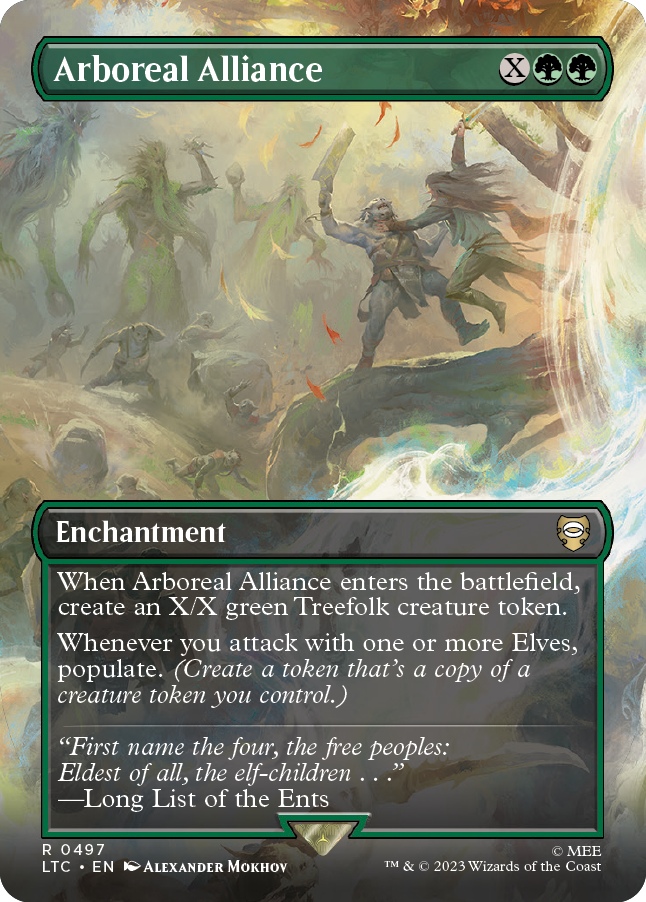
Arboreal Alliance
{X}{G}{G}
Enchantment
When Arboreal Alliance enters the battlefield, create an X/X green Treefolk creature token.
Whenever you attack with one or more Elves, populate. (Create a token that's a copy of a creature token you control.)
- If Arboreal Alliance enters the battlefield without being cast, or if you cast it with X equal to 0, you'll create a 0/0 green Treefolk creature token. Unless something else is raising its toughness, it will immediately die.
- Arboreal Alliance's last ability triggers whenever you attack with at least one Elf. You populate exactly once as it resolves, no matter how many Elves you attacked with.
- If you control no creature tokens when you populate, nothing will happen.
- The new creature token copies the characteristics of the original token as stated by the effect that created the original token.
- The new token doesn't copy whether the original token is tapped or untapped, whether it has any counters on it or Auras and Equipment attached to it, or any non-copy effects that have changed its power, toughness, color, and so on.
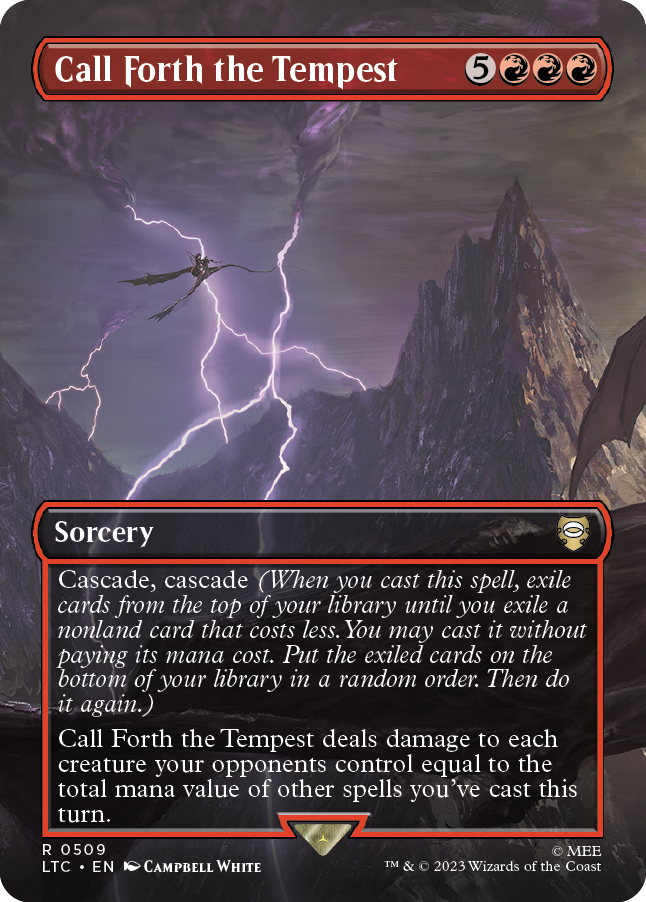
Call Forth the Tempest
{5}{R}{R}{R}
Sorcery
Cascade, cascade (When you cast this spell, exile cards from the top of your library until you exile a nonland card that costs less. You may cast it without paying its mana cost. Put the exiled cards on the bottom of your library in a random order. Then do it again.)
Call Forth the Tempest deals damage to each creature your opponents control equal to the total mana value of other spells you've cast this turn.
- Count the mana values of all other spells you've cast this turn before Call Forth the Tempest resolved, including any spells that you've cast due to Call Forth the Tempest's cascade abilities. It doesn't matter whether those spells resolved; you only need to have cast them. Conversely, if you copy a spell without casting it, you won't include that copy's mana value in the amount of damage Call Forth the Tempest deals.
- Each instance of cascade triggers and resolves separately. The spell you cast due to the first cascade ability will go on the stack on top of the second cascade ability. That spell will resolve before you exile cards for the second cascade ability.
- No matter what spell you cast with the first cascade ability (or with any cascade abilities that result from casting that spell), the second cascade ability will look for a card with mana value less than Call Forth the Tempest's mana value of 8.
- A spell's mana value is determined only by its mana cost. Ignore any alternative costs, additional costs, cost increases, or cost reductions.
- Cascade triggers when you cast the spell, meaning that it resolves before that spell. If you end up casting the exiled card, it will go on the stack above the spell with cascade.
- When the cascade ability resolves, you must exile cards. The only optional part of the ability is whether or not you cast the last card exiled.
- If a spell with cascade is countered, the cascade ability will still resolve normally.
- You exile the cards face up. All players will be able to see them.
- If you cast a card "without paying its mana cost," you can't choose to cast it for any alternative costs. You can, however, pay additional costs. If the card has any mandatory additional costs, you must pay those to cast the card.
- If the card has {X} in its mana cost, you must choose 0 as the value of X when casting it without paying its mana cost.
- Due to a 2021 rules change to cascade, not only do you stop exiling cards if you exile a nonland card with lesser mana value than the spell with cascade, but the resulting spell you cast must also have lesser mana value. Previously, in cases where a card's mana value differed from the resulting spell, such as with some modal double-faced cards or cards with an Adventure, you could cast a spell with a higher mana value than the exiled card.
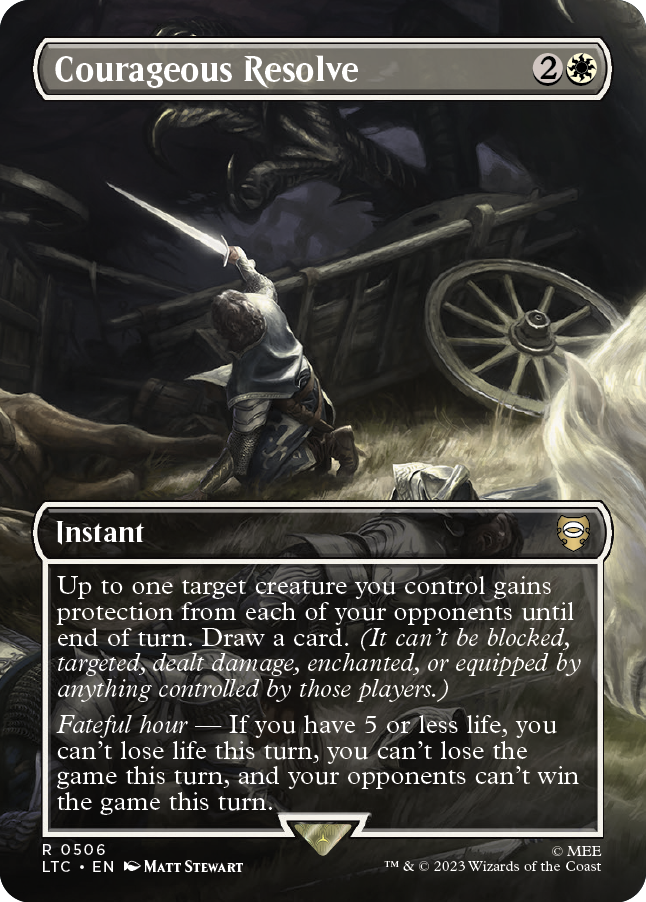
Courageous Resolve
{2}{W}
Instant
Up to one target creature you control gains protection from each of your opponents until end of turn. Draw a card. (It can't be blocked, targeted, dealt damage, enchanted, or equipped by anything controlled by those players.)
Fateful hour — If you have 5 or less life, you can't lose life this turn, you can't lose the game this turn, and your opponents can't win the game this turn.
- Protection from your opponents means that the target creature has protection from each object controlled by those opponents. If an object has no controller (such as a card in a graveyard), its owner is considered its controller for this purpose.
- If you cast Courageous Resolve and your life total is 5 or less when it resolves, for the rest of that turn, no game effect can cause you to lose the game or cause any opponent to win the game. It doesn't matter whether you have 0 or less life, you're forced to draw a card while your library is empty, you have ten or more poison counters, you're at the end of your Nine Lives, your opponent is a Triskaidekaphile, and so on. You keep playing.
- Courageous Resolve checks your life total only at the time it resolves. If it's 5 or less at that time, even if you gain life later in the turn, you'll still be unable to lose life or lose the game that turn, and your opponents will still be unable to win the game that turn.
- Other circumstances can still cause you to lose the game. For example, you will lose a game if you concede or if you're penalized with a Game Loss or a Match Loss during a sanctioned tournament due to a tournament rules infraction.
- If you cast Courageous Resolve in a Two-Headed Giant game and your team's life total is 5 or less when it resolves, your team can't lose the game that turn and the opposing team can't win the game that turn.
- Courageous Resolve doesn't prevent damage. Rather, it changes the results of that damage. For example, if a creature with lifelink deals damage to you, you won't lose any life, but its controller will still gain that much life. Similarly, if a creature with infect deals damage to you, you'll still receive that many poison counters.
- Abilities that trigger whenever damage is dealt to you will still trigger because that damage is still dealt, even though your life total won't change as a result.
- Spells and abilities that would normally cause you to lose life still resolve, but the life-loss part simply has no effect.
- You can't pay a cost that includes the payment of any amount of life other than 0 life. However, you can choose to be dealt damage, even though that damage won't result in your life total changing.
- Effects that replace an event with having you lose life (such as Tainted Remedy) will end up replacing the event with nothing.
- If an effect says to set your life total to a certain number and that number is less than your current life total, that part of the effect won't do anything.
- If an effect would cause you to exchange life totals with another player whose life total is lower than yours, the exchange won't happen. Neither player's life total changes.
- In a Commander game, combat damage you're dealt by a commander is still tracked, even if you don't lose life as a result.
- You can choose not to target a creature just to draw a card and, if you have 5 or less life, to get the additional effects listed. However, if you do choose a target, and that target is illegal at the time Courageous Resolve tries to resolve, it won't resolve and none of its effects will happen. You won't draw a card, and the additional effects won't occur even if you have 5 or less life.
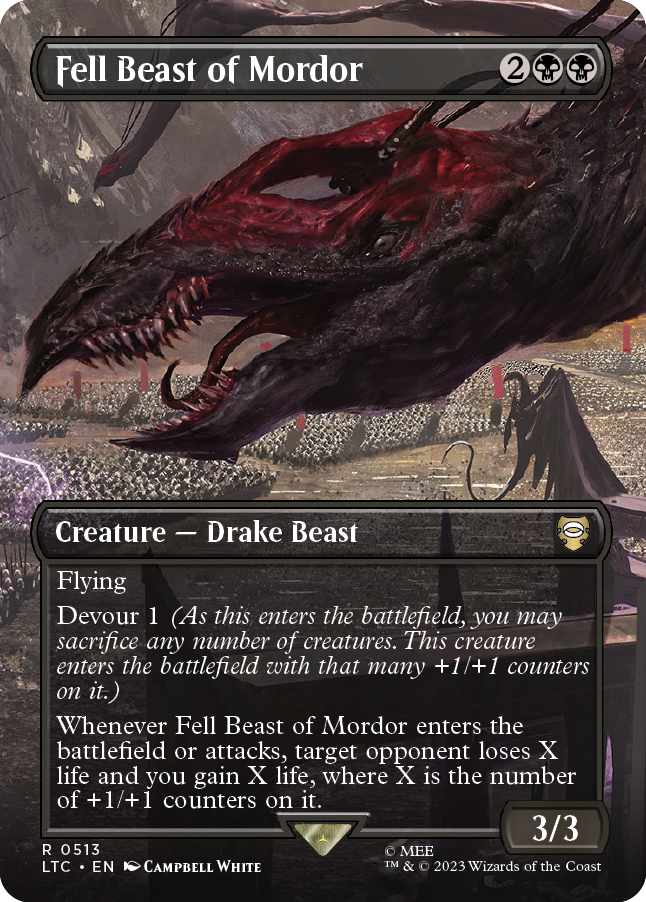
Fell Beast of Mordor
{2}{B}{B}
Creature — Drake Beast
3/3
Flying
Devour 1 (As this enters the battlefield, you may sacrifice any number of creatures. This creature enters the battlefield with that many +1/+1 counters on it.)
Whenever Fell Beast of Mordor enters the battlefield or attacks, target opponent loses X life and you gain X life, where X is the number of +1/+1 counters on it.
- Fell Beast of Mordor can't devour creatures entering the battlefield at the same time as it.
- If Fell Beast of Mordor isn't on the battlefield as its ability resolves, use the number of +1/+1 counters that were on it when it was last on the battlefield to determine the value of X.
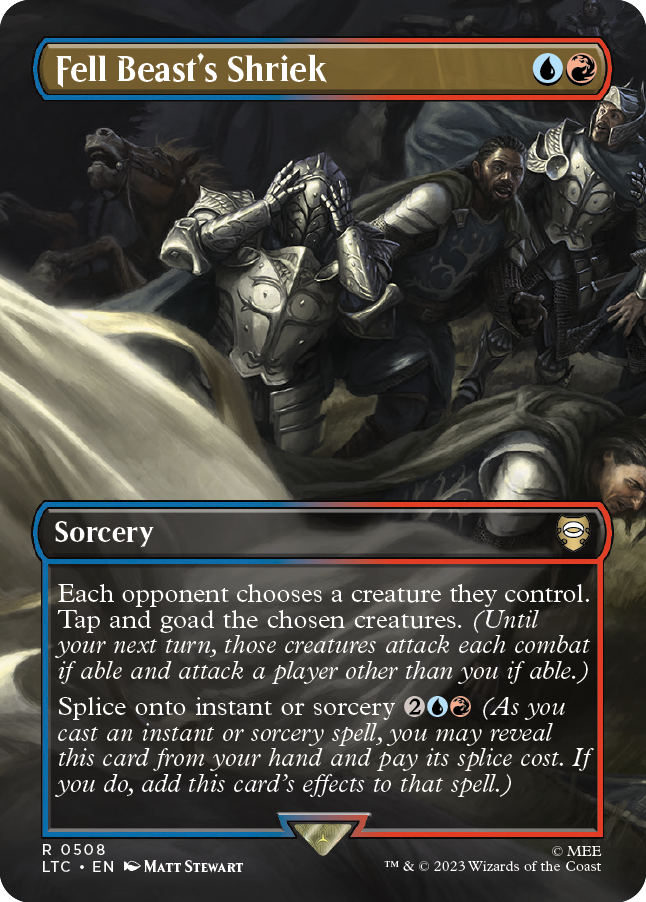
Fell Beast's Shriek
{U}{R}
Sorcery
Each opponent chooses a creature they control. Tap and goad the chosen creatures. (Until your next turn, those creatures attack each combat if able and attack a player other than you if able.)
Splice onto instant or sorcery {2}{U}{R} (As you cast an instant or sorcery spell, you may reveal this card from your hand and pay its splice cost. If you do, add this card's effects to that spell.)
- If, during a player's declare attackers step, a creature that player controls that's been goaded is tapped, is affected by a spell or ability that says it can't attack, or hasn't been under that player's control continuously since the turn began (and doesn't have haste), then it doesn't attack. If there's a cost associated with having a creature attack a player, its controller isn't forced to pay that cost, so it doesn't have to attack that player.
- If the creature doesn't meet any of the above exceptions and can attack, it must attack a player other than the controller of the spell or ability that goaded it if able. If the creature can't attack any of those players but could otherwise attack, it must attack a planeswalker an opponent controls, a battle an opponent protects, or a player who goaded it.
- Being goaded isn't an ability the creature has. Once it's been goaded, it must attack as detailed above even if it loses all abilities.
- Attacking with a goaded creature doesn't cause it to stop being goaded. If there is an additional combat phase that turn, or if another player gains control of it before it stops being goaded, it must attack again if able.
- If a creature you control has been goaded by multiple opponents, it must attack one of your opponents that hasn't goaded it, as that fulfills the maximum number of goad requirements. If a creature you control has been goaded by each of your opponents, the creature must attack an opponent (rather than a planeswalker or battle), but you choose which opponent it attacks.
- The abilities spliced onto the spell happen last, after all of that spell's other effects.
- You reveal all cards you intend to splice at the same time. Each individual card can be spliced only once onto any spell, although multiple cards with the same name may be spliced onto one spell.
- If a spell is copied, choices made while casting it are copied, so the copy will have the same abilities spliced onto it as the original.
- Any cards you splice onto a spell remain in your hand, regardless of what happens to the spell after you cast it.
- If all of the spell's targets are illegal when the spell tries to resolve, it won't resolve and none of its effects will happen, including those from cards spliced onto it.
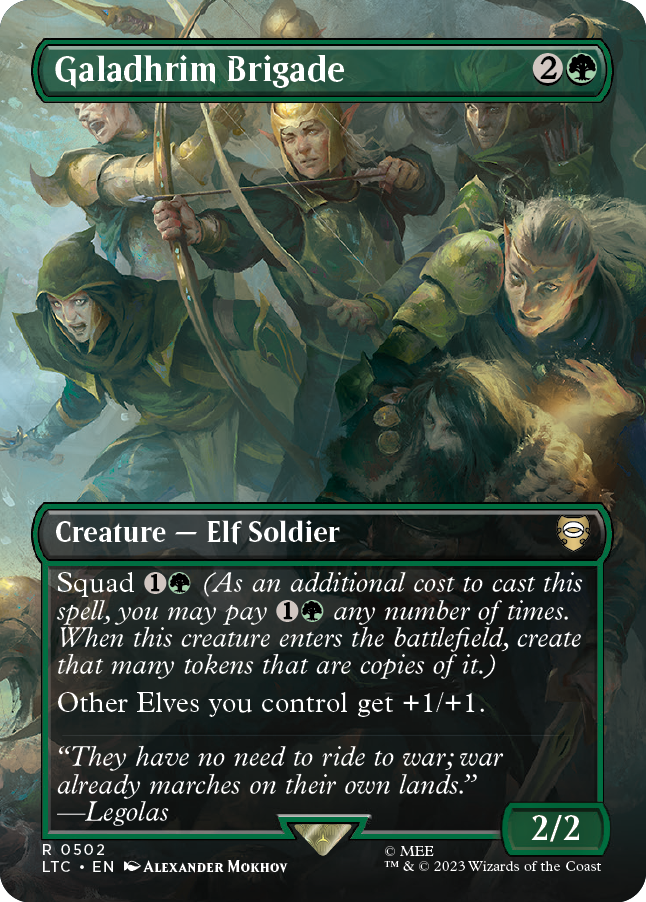
Galadhrim Brigade
{2}{G}
Creature — Elf Soldier
2/2
Squad {1}{G} (As an additional cost to cast this spell, you may pay {1}{G} any number of times. When this creature enters the battlefield, create that many tokens that are copies of it.)
Other Elves you control get +1/+1.
- You may pay the squad cost any number of times. You will get a token that is a copy of that permanent for each time you paid the squad cost. If you paid the squad cost multiple times, the tokens will all enter the battlefield simultaneously.
- If the spell is countered, the squad ability will not trigger, and no tokens will be created.
- The tokens created by the squad ability aren't "cast," so any abilities that trigger when a spell is cast won't trigger for the copies.
- If, for some reason, the creature doesn't have the squad ability when it's on the battlefield, the ability won't trigger, even if you've paid the squad cost one or more times.
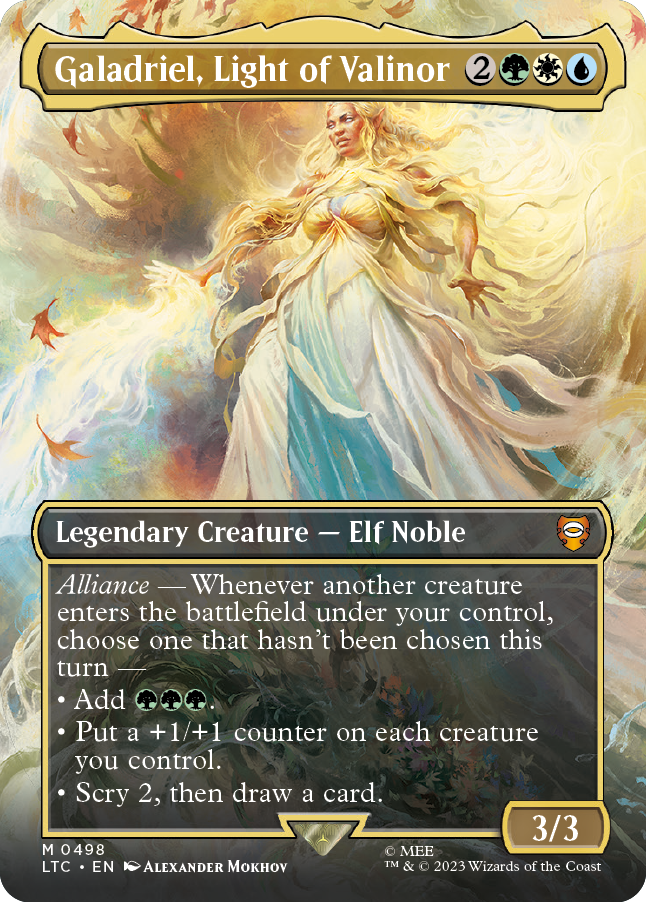
Galadriel, Light of Valinor
{2}{G}{W}{U}
Legendary Creature — Elf Noble
3/3
Alliance — Whenever another creature enters the battlefield under your control, choose one that hasn't been chosen this turn —
• Add {G}{G}{G}.
• Put a +1/+1 counter on each creature you control.
• Scry 2, then draw a card.
- If multiple creatures enter the battlefield simultaneously, you must still choose different modes for each instance of the triggered ability that's put onto the stack. If more than three creatures enter the battlefield simultaneously, that choice is made only for the first three.
- If all three modes have been chosen this turn, Galadriel, Light of Valinor's triggered ability is removed from the stack with no effect.
- The phrase "that hasn't been chosen this turn" refers only to that specific Galadriel, Light of Valinor. If Galadriel leaves the battlefield and then returns to the battlefield later in the turn, it will be a new object with no memory of the modes chosen when it was previously on the battlefield.
- It doesn't matter who has chosen any particular mode. For example, say you control Galadriel, Light of Valinor and have chosen the first two modes this turn. If an opponent gains control of Galadriel, that player can choose only the third mode this turn.
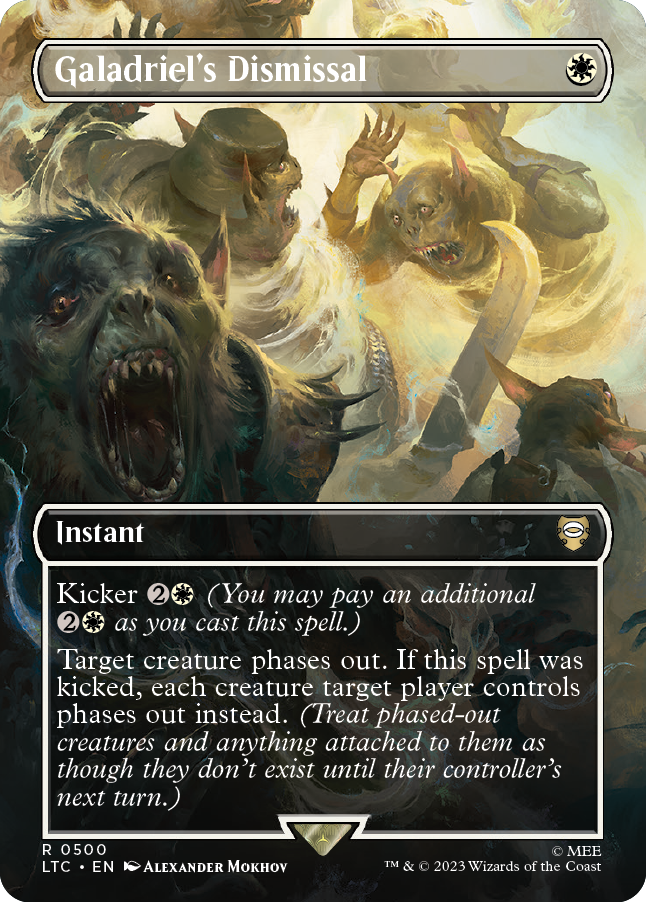
Galadriel's Dismissal
{W}
Instant
Kicker {2}{W} (You may pay an additional {2}{W} as you cast this spell.)
Target creature phases out. If this spell was kicked, each creature target player controls phases out instead. (Treat phased-out creatures and anything attached to them as though they don't exist until their controller's next turn.)
- Phased-out permanents are treated as though they don't exist. They can't be the targets of spells or abilities, their static abilities have no effect on the game, their triggered abilities can't trigger, they can't attack or block, and so on.
- As a permanent is phased out, Auras and Equipment attached to it also phase out at the same time. Those Auras and Equipment will phase in at the same time that creature does, and they'll phase in still attached to that permanent.
- Permanents phase back in during their controller's untap step, immediately before that player untaps their permanents. Creatures that phase in this way are able to attack during that turn, and their activated abilities with {T} in their costs can be activated. If a permanent had counters on it when it phased out, it will have those counters when it phases back in.
- An attacking or blocking creature that phases out is removed from combat.
- Phasing out doesn't cause any "leaves the battlefield" abilities to trigger. Similarly, phasing in won't cause any "enters the battlefield" abilities to trigger.
- Any continuous effects with a "for as long as" duration ignore phased-out objects. If ignoring those objects causes the effect's conditions to no longer be met, the duration will expire.
- Choices made for permanents as they entered the battlefield are remembered when they phase in.
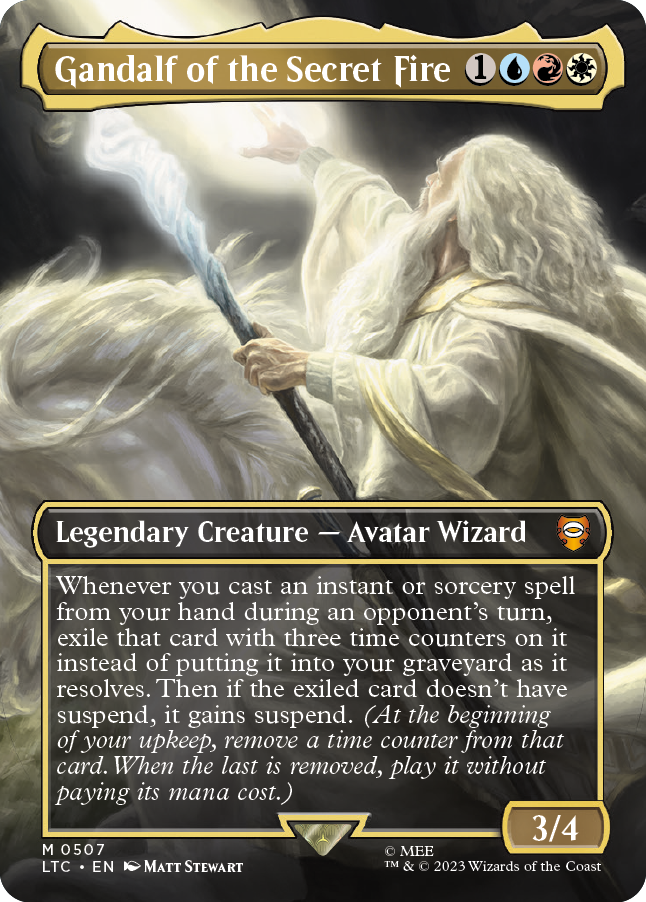
Gandalf of the Secret Fire
{1}{U}{R}{W}
Legendary Creature — Avatar Wizard
3/4
Whenever you cast an instant or sorcery spell from your hand during an opponent's turn, exile that card with three time counters on it instead of putting it into your graveyard as it resolves. Then if the exiled card doesn't have suspend, it gains suspend. (At the beginning of your upkeep, remove a time counter from that card. When the last is removed, play it without paying its mana cost.)
- When the last time counter is removed from the exiled card, it's cast as a completely new spell. Modes and targets are chosen again. If the spell has any mandatory additional costs, they must be paid again. If they can't be, the spell can't be cast and stays exiled.
- Cards exiled with suspend are exiled face up.
- If an effect refers to a "suspended card," that means a card that (1) has suspend, (2) is in exile, and (3) has one or more time counters on it.
- If the first triggered ability of suspend (the one that removes time counters) is countered, no time counter is removed. The ability will trigger again at the beginning of the card's owner's next upkeep.
- When the last time counter is removed, the second triggered ability of suspend (the one that lets you cast the card) triggers. It doesn't matter why the last time counter was removed or what effect removed it.
- If the second triggered ability is countered, the card can't be cast. It remains exiled with no time counters on it, and it's no longer suspended.
- If you cast a card "without paying its mana cost," such as with suspend, you can't choose to cast it for any alternative costs. You can, however, pay additional costs. If the card has any mandatory additional costs, you must pay those if you want to cast the card.
- You are never forced to activate mana abilities to pay costs, so if there is a mandatory additional mana cost (such as from Thalia, Guardian of Thraben), you can decline to activate mana abilities to pay for it and hence fail to cast the suspended card, leaving it in exile.
- If the card has {X} in its mana cost, you must choose 0 as the value of X when casting it without paying its mana cost.
- The mana value of a spell cast without paying its mana cost is determined by its mana cost, even though that cost wasn't paid.
- A creature cast using suspend will enter the battlefield with haste. It will have haste until another player gains control of it. (In some rare cases, another player may gain control of the creature spell itself. If this happens, the creature won't enter the battlefield with haste.)
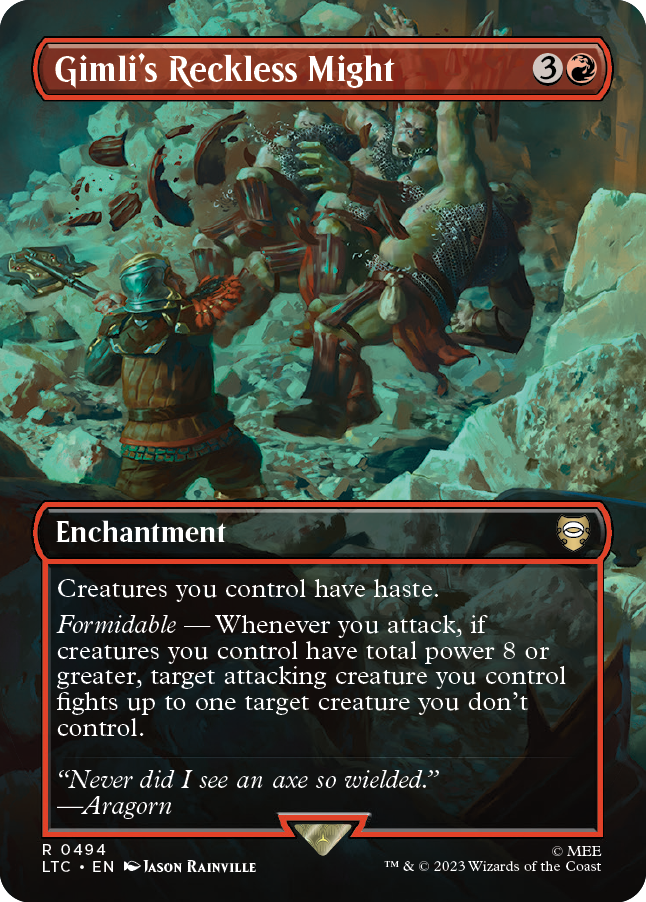
Gimli's Reckless Might
{3}{R}
Enchantment
Creatures you control have haste.
Formidable — Whenever you attack, if creatures you control have total power 8 or greater, target attacking creature you control fights up to one target creature you don't control.
- Gimli's Reckless Might's formidable ability checks the total power of creatures you control twice: once at the appropriate time to see if the ability will trigger, and again as the ability tries to resolve. If, at that time, the total power of creatures you control is no longer 8 or greater, the ability will have no effect.
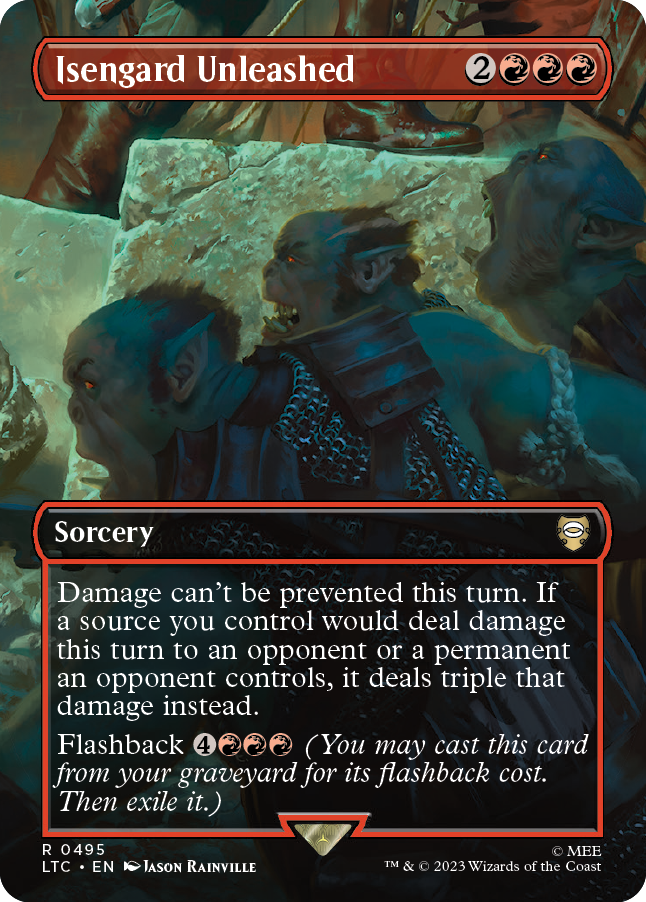
Isengard Unleashed
{2}{R}{R}{R}
Sorcery
Damage can't be prevented this turn. If a source you control would deal damage this turn to an opponent or a permanent an opponent controls, it deals triple that damage instead.
Flashback {4}{R}{R}{R} (You may cast this card from your graveyard for its flashback cost. Then exile it.)
- Isengard Unleashed only stops damage from being prevented by effects that use the word "prevent" or keyword abilities like protection that prevent damage.
- Protection prevents damage, so protection will be unable to prevent damage after Isengard Unleashed has resolved. However, this won't allow a spell or ability to target illegally, even if that spell or ability would cause damage to be dealt.
- If a creature with trample you control would deal combat damage to a blocking creature this turn, you must assign its unmodified damage. For example, a 3/3 creature with trample blocked by a 2/2 creature can have 1 damage assigned to the defending player. It will then deal 6 damage to the blocking creature (2 tripled) and 3 to the defending player (1 tripled).
- If an effect such as that of Chandra's Pyrohelix asks you to divide damage among targets, you must divide the unmodified damage before tripling it.
- If you resolve two copies of Isengard Unleashed in one turn, damage dealt by sources you control will be multiplied by 9. If you resolve three, it will be multiplied by 27, and so on.
- "Flashback [cost]" means "You may cast this card from your graveyard by paying [cost] rather than paying its mana cost" and "If the flashback cost was paid, exile this card instead of putting it anywhere else any time it would leave the stack."
- You must still follow any timing restrictions and permissions, including those based on the card's type. For instance, you can cast a sorcery using flashback only when you could normally cast a sorcery.
- To determine the total cost of a spell, start with the mana cost or alternative cost (such as a flashback cost) you're paying, add any cost increases, then apply any cost reductions. The mana value of the spell is determined only by its mana cost, no matter what the total cost to cast the spell was.
- A spell cast using flashback will always be exiled afterward, whether it resolves, is countered, or leaves the stack in some other way.
- You can cast a spell using flashback even if it was somehow put into your graveyard without having been cast.
- If a card with flashback is put into your graveyard during your turn, you can cast it if it's legal to do so before any other player can take any actions.
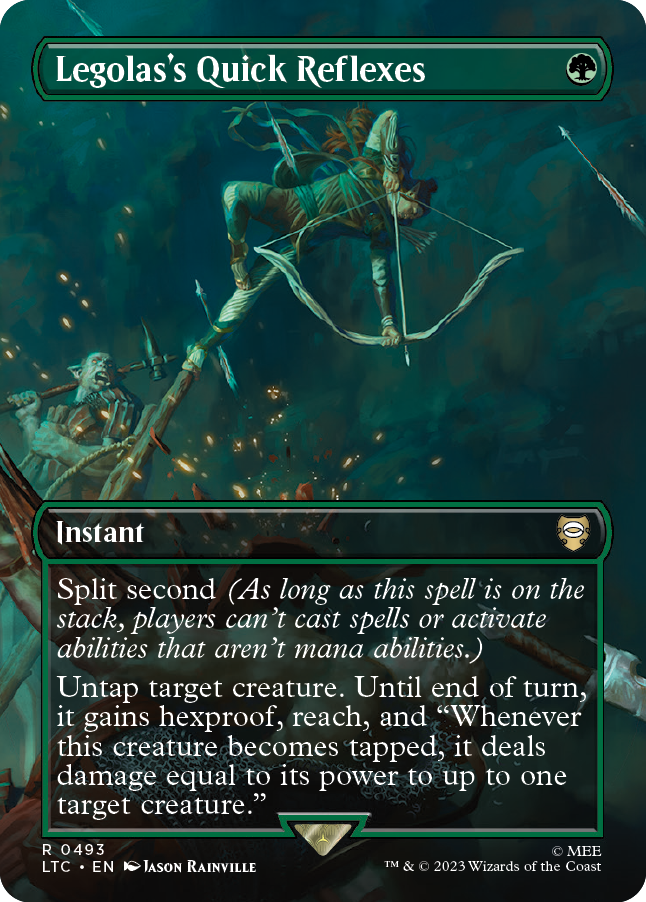
Legolas's Quick Reflexes
{G}
Instant
Split second (As long as this spell is on the stack, players can't cast spells or activate abilities that aren't mana abilities.)
Untap target creature. Until end of turn, it gains hexproof, reach, and "Whenever this creature becomes tapped, it deals damage equal to its power to up to one target creature."
- Players still get priority while a spell with split second is on the stack; their options are just limited to mana abilities and certain special actions.
- Players may turn face-down creatures face up while a spell with split second is on the stack.
- Split second doesn't stop triggered abilities from triggering, such as that of Chalice of the Void. If one does, its controller puts it on the stack and chooses targets for it, if any. Those abilities will resolve as normal.
- Casting a spell with split second won't affect spells and abilities that are already on the stack.
- If the resolution of a triggered ability involves casting a spell, that spell can't be cast if a spell with split second is on the stack.
- After a spell with split second resolves (or otherwise leaves the stack), players may again cast spells and activate abilities before the next object on the stack resolves.
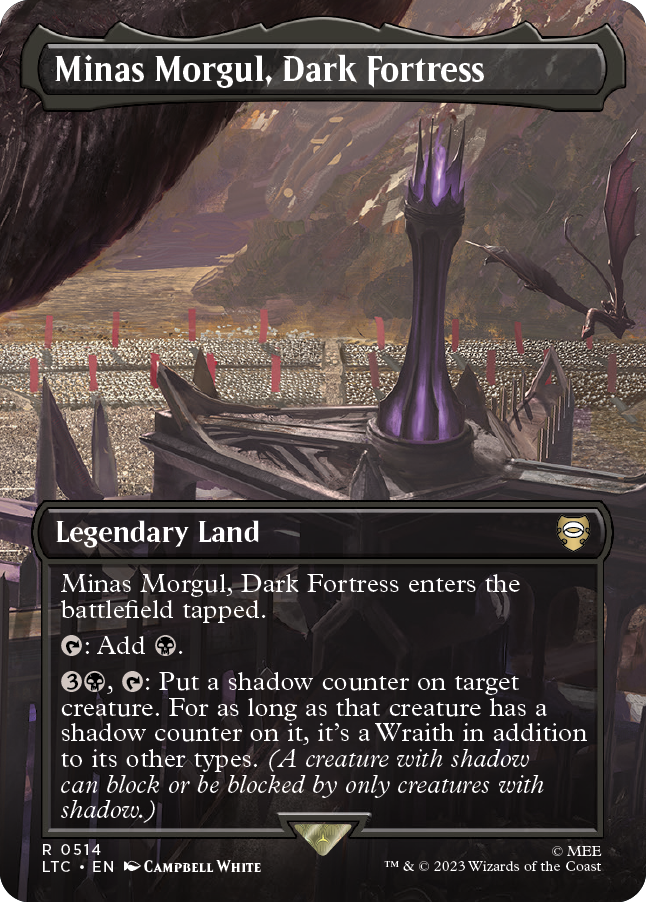
Minas Morgul, Dark Fortress
Legendary Land
Minas Morgul, Dark Fortress enters the battlefield tapped.
{T}: Add {B}.
{3}{B}, {T}: Put a shadow counter on target creature. For as long as that creature has a shadow counter on it, it's a Wraith in addition to its other types. (A creature with shadow can block or be blocked by only creatures with shadow.)
- A permanent with a shadow counter on it has shadow.
- Once a creature has been blocked, that creature remains blocked and will deal and be dealt combat damage even if it gains or loses shadow or if the blocking creature gains or loses shadow.
- If an attacking creature has multiple evasion abilities, such as shadow and flying, a creature can block it only if that creature satisfies all of the appropriate evasion abilities.
- Multiple instances of shadow on the same creature are redundant.
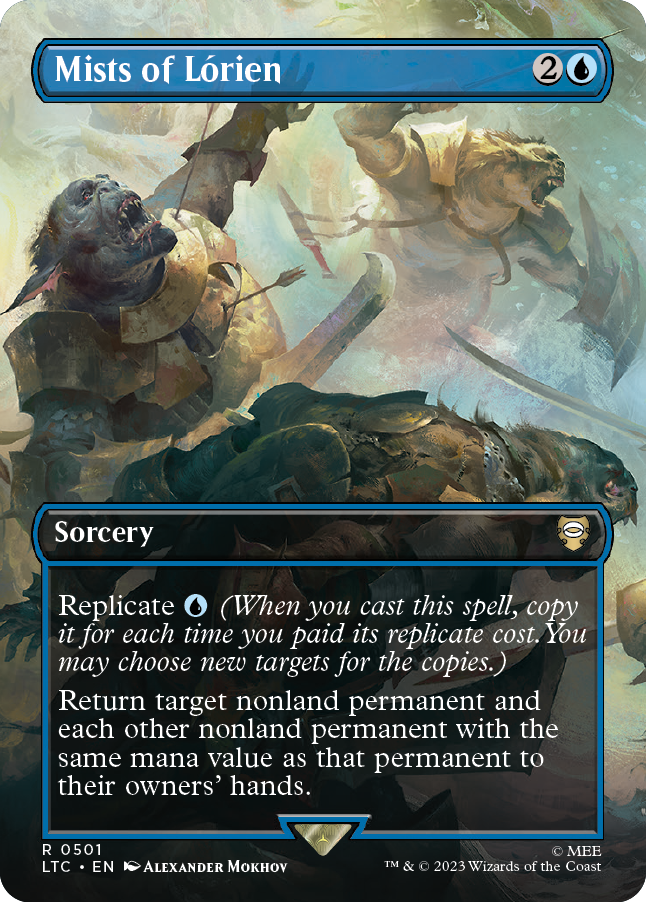
Mists of Lórien
{2}{U}
Sorcery
Replicate {U} (When you cast this spell, copy it for each time you paid its replicate cost. You may choose new targets for the copies.)
Return target nonland permanent and each other nonland permanent with the same mana value as that permanent to their owners' hands.
- If a permanent has {X} in its mana cost, X is 0 when determining its mana value.
- If the target nonland permanent is an illegal target as Mists of Lórien tries to resolve, it won't resolve and none of its effects will happen. No permanents will be returned to their owners' hands.
- A copy of a spell can be countered like any other spell, but it must be countered individually. Countering a spell with replicate won't affect the copies.
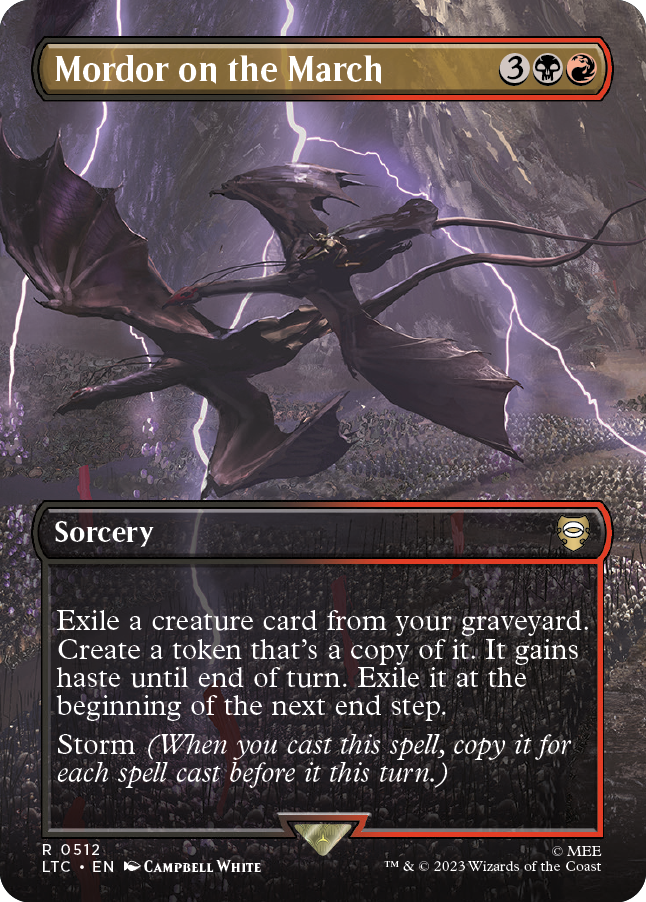
Mordor on the March
{3}{B}{R}
Sorcery
Exile a creature card from your graveyard. Create a token that's a copy of it. It gains haste until end of turn. Exile it at the beginning of the next end step.
Storm (When you cast this spell, copy it for each spell cast before it this turn.)
- The token copies exactly what was printed on the original creature card and nothing else.
- If the copied creature card has {X} in its mana cost, X is 0.
- Any enters-the-battlefield abilities of the copied creature card will trigger when the token enters the battlefield. Any "as [this permanent] enters the battlefield" or "[this permanent] enters the battlefield with" abilities of the copied creature card will also work.
- If another creature becomes a copy of, or enters the battlefield as, a copy of the token, that creature will copy the creature card the token is copying. However, the new copy won't gain haste and you won't exile it at the beginning of the next end step.
- If Mordor on the March creates multiple tokens due to a replacement effect (such as the one Doubling Season creates), each of those tokens will gain haste, and you'll exile each of them at the beginning of the next end step.
- The copies of Mordor on the March created by its storm ability are put directly onto the stack. They aren't cast and won't be counted by other spells with storm cast later in the turn.
- Spells cast from zones other than a player's hand and spells that were countered or otherwise failed to resolve are still counted by the storm ability.
- A copy of a spell can be countered like any other spell, but it must be countered individually. Countering a spell with storm won't affect the copies.
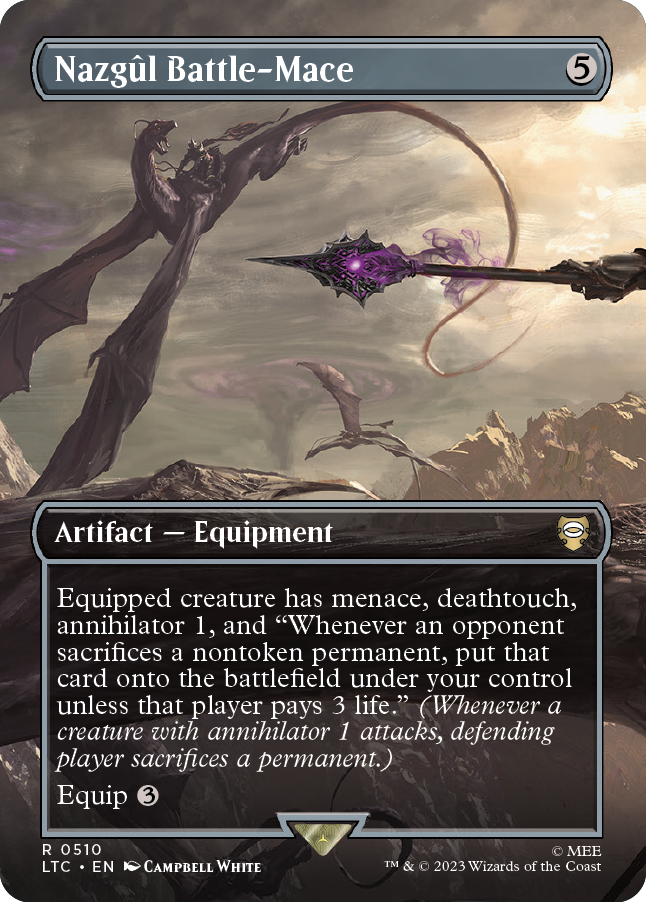
Nazgûl Battle-Mace
{5}
Artifact — Equipment
Equipped creature has menace, deathtouch, annihilator 1, and "Whenever an opponent sacrifices a nontoken permanent, put that card onto the battlefield under your control unless that player pays 3 life." (Whenever a creature with annihilator 1 attacks, defending player sacrifices a permanent.)
Equip {3}
- Annihilator abilities trigger and resolve during the declare attackers step. The defending player chooses and sacrifices the required number of permanents before they declare blockers. Any creatures sacrificed this way won't be able to block.
- If a creature with annihilator is attacking a planeswalker, and the defending player chooses to sacrifice that planeswalker, the attacking creature continues to attack. It may be blocked. If it isn't blocked, it simply won't deal combat damage to anything.
- The last ability granted by Nazgûl Battle-Mace triggers whenever an opponent sacrifices a nontoken permanent for any reason, not just due to the annihilator ability.
- If an opponent sacrifices a nontoken permanent, it doesn't matter which graveyard it goes to. The last ability granted by Nazgûl Battle-Mace will trigger.
- If the card leaves the graveyard before the last ability granted by Nazgûl Battle-Mace resolves, the opponent will still have the option to pay 3 life. Regardless of their choice, you can't put the card onto the battlefield, even if it returns to the graveyard before the ability resolves.
- If a replacement effect, such as that of Rest in Peace, causes a sacrificed nontoken permanent to be put into a different public zone than a graveyard, the last ability granted by Nazgûl Battle-Mace will still trigger and you will still put the card onto the battlefield under your control if its original controller doesn't pay 3 life.
- If an opponent sacrifices a nontoken permanent as part of paying the cost of a spell or ability, the last ability granted by Nazgûl Battle-Mace will trigger and go on the stack on top of that spell or ability. The ability granted by Nazgûl Battle-Mace will resolve before that spell or ability.
- If you put an Aura on the battlefield using the last ability granted by Nazgûl Battle-Mace, you choose what the Aura will enchant just before it enters the battlefield. An Aura put onto the battlefield this way doesn't target the player or permanent it will enchant, so permanents or players with hexproof may be chosen; however, the chosen recipient must be able to legally be enchanted by the Aura, so a player or permanent with protection from one of the Aura's qualities can't be chosen this way. If there's nothing legal for the Aura to enchant, it stays in the graveyard.
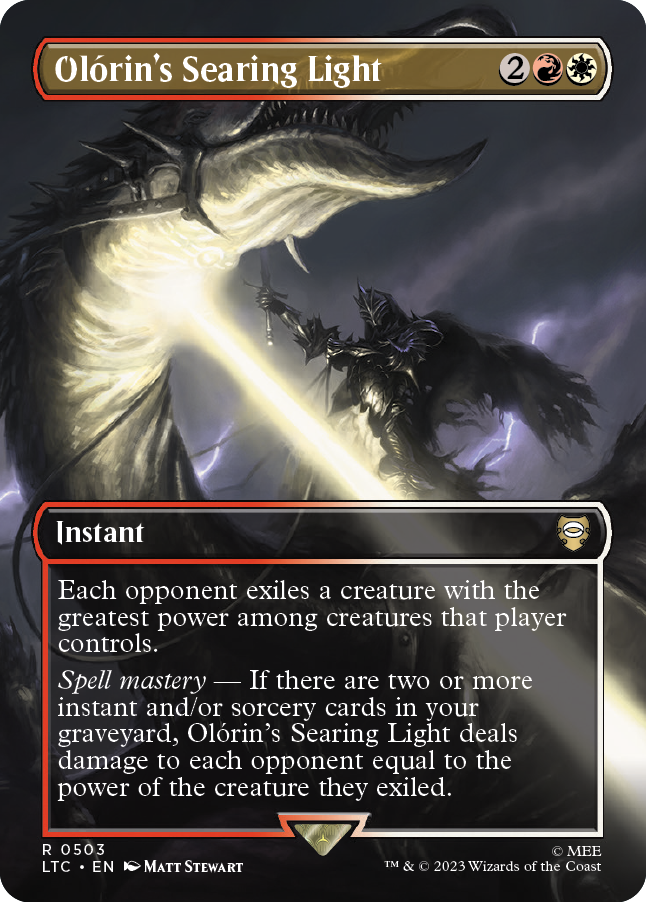
Olórin's Searing Light
{2}{R}{W}
Instant
Each opponent exiles a creature with the greatest power among creatures that player controls.
Spell mastery — If there are two or more instant and/or sorcery cards in your graveyard, Olórin's Searing Light deals damage to each opponent equal to the power of the creature they exiled.
- If a player controls two or more creatures tied for the greatest power among creatures they control, that player chooses one of them to exile.
- First, the active player (or, if it's not an opponent's turn, the next opponent in turn order) chooses which creature they'll exile, then each other opponent in turn order does the same, knowing choices made before their choice. Then all those creatures are exiled simultaneously.
- Check to see if there are two or more instant and/or sorcery cards in your graveyard as the spell resolves to determine whether the spell mastery ability applies. The spell itself won't count because it's still on the stack as you make this check.
- Use the power of each exiled creature as it last existed on the battlefield to determine how much damage is dealt to each opponent.
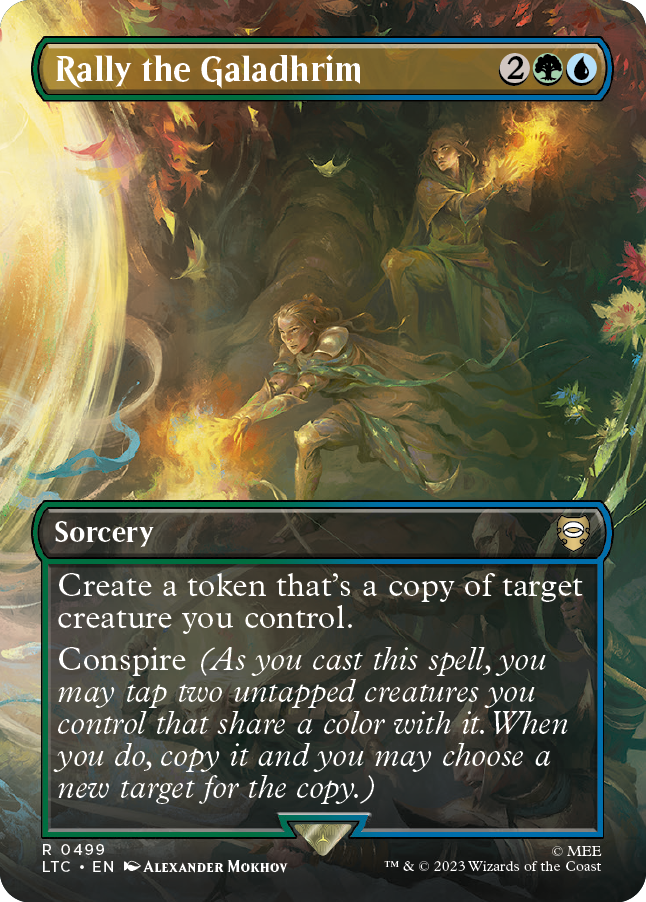
Rally the Galadhrim
{2}{G}{U}
Sorcery
Create a token that's a copy of target creature you control.
Conspire (As you cast this spell, you may tap two untapped creatures you control that share a color with it. When you do, copy it and you may choose a new target for the copy.)
- Conspire represents both an additional cost and a triggered ability that triggers when you cast the spell if you paid that cost.
- Each creature you tap for conspire must share a color with Rally the Galadhrim For example, you could tap two green creatures, two blue creatures, or one of each. For either or both of the creatures, you may tap a multicolored creature that's green and/or blue, and possibly other colors as well.
- The triggered ability that creates the copy can itself be countered by anything that can counter a triggered ability. If it is countered, no copies will be put onto the stack.
- The copy that conspire creates is created on the stack, so it's not "cast." Abilities that trigger when a player casts a spell won't trigger.
- A copy of a spell can be countered like any other spell, but it must be countered individually. Countering a spell with conspire won't affect the copy, and vice versa.
- If a spell with conspire has targets, you may choose new targets for the copy.
- The token copies exactly what was printed on the original creature and nothing else (unless that creature is copying something else or is a token; see below). It doesn't copy whether that creature is tapped or untapped, whether it has any counters on it or Auras and Equipment attached to it, or any non-copy effects that have changed its power, toughness, types, color, and so on.
- If the copied creature has {X} in its mana cost, X is 0.
- If the copied creature is a token, the token that's created copies the original characteristics of that token as stated by the effect that created that token.
- If the copied creature is copying something else, then the token enters the battlefield as whatever that creature copied.
- Any enters-the-battlefield abilities of the copied creature will trigger when the token enters the battlefield. Any "as [this creature] enters the battlefield" or "[this creature] enters the battlefield with" abilities of the copied creature will also work.
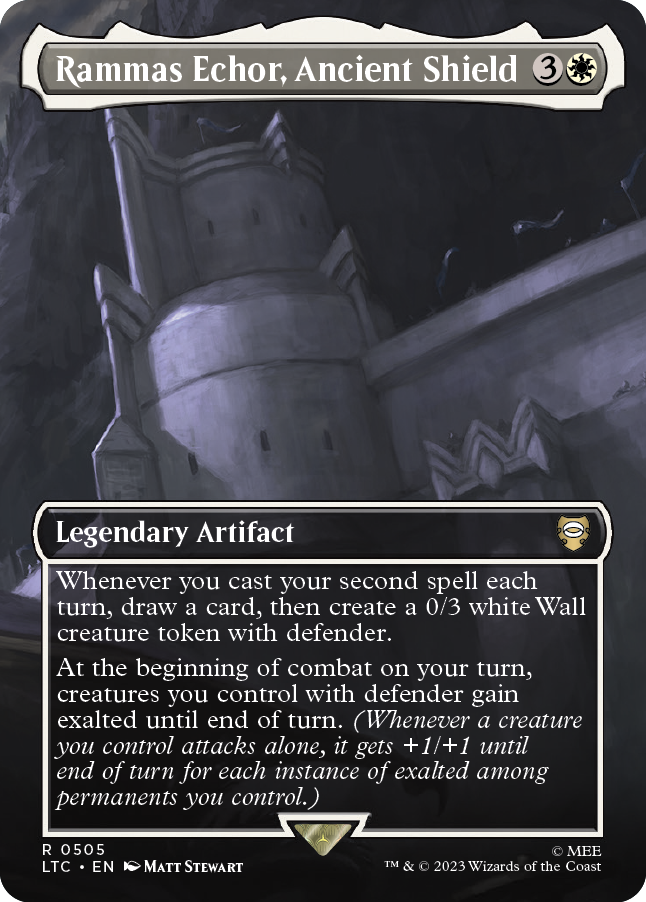
Rammas Echor, Ancient Shield
{3}{W}
Legendary Artifact
Whenever you cast your second spell each turn, draw a card, then create a 0/3 white Wall creature token with defender.
At the beginning of combat on your turn, creatures you control with defender gain exalted until end of turn. (Whenever a creature you control attacks alone, it gets +1/+1 until end of turn for each instance of exalted among permanents you control.)
- Spells that were cast before Rammas Echor, Ancient Shield entered the battlefield count. If Rammas Echor was the first spell you cast in a turn, the next spell you cast that turn is your second spell.
- If Rammas Echor was the second spell you cast in a turn, its first ability won't trigger that turn.
- A creature attacks alone if it's the only creature declared as an attacker during the declare attackers step (including creatures controlled by your teammates, if applicable). For example, exalted won't trigger if you attack with multiple creatures and all but one of them are removed from combat.
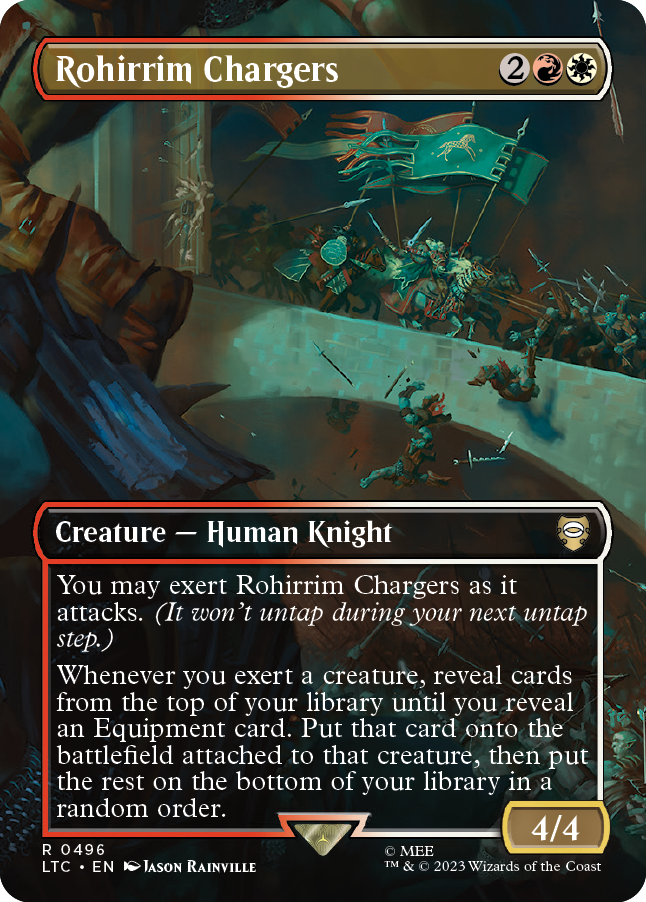
Rohirrim Chargers
{2}{R}{W}
Creature — Human Knight
4/4
You may exert Rohirrim Chargers as it attacks. (It won't untap during your next untap step.)
Whenever you exert a creature, reveal cards from the top of your library until you reveal an Equipment card. Put that card onto the battlefield attached to that creature, then put the rest on the bottom of your library in a random order.
- You can't exert a creature unless an effect allows you to do so. Similar effects that "tap and freeze" a creature or put stun counters on a creature don't exert that creature.
- If an exerted creature is already untapped during your next untap step (most likely because it had vigilance or an effect untapped it), exert's effect preventing it from untapping expires without having done anything.
- If you gain control of another player's creature until end of turn and exert it, it will untap during that player's untap step.
- You can exert Rohirrim Chargers as you declare it as an attacking creature. You can't do so later in combat, and creatures put onto the battlefield attacking can't be exerted. Any abilities that trigger on exerting an attacking creature will resolve before blockers are declared.
- If the exerted creature is no longer on the battlefield or the Equipment can't legally be attached to that creature, that Equipment will enter the battlefield unattached.
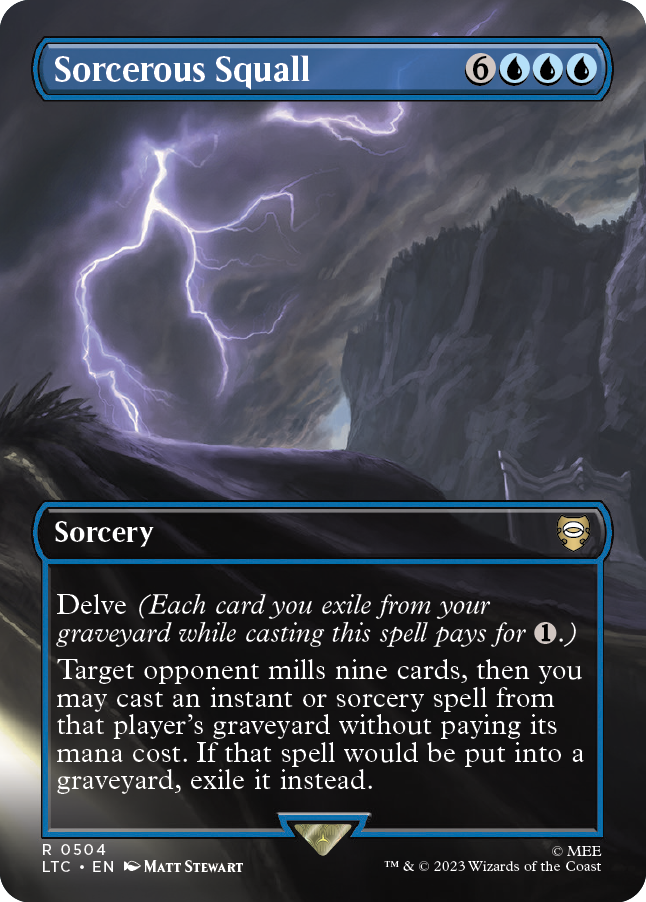
Sorcerous Squall
{6}{U}{U}{U}
Sorcery
Delve (Each card you exile from your graveyard while casting this spell pays for {1}.)
Target opponent mills nine cards, then you may cast an instant or sorcery spell from that player's graveyard without paying its mana cost. If that spell would be put into a graveyard, exile it instead.
- Delve doesn't change a spell's mana cost or mana value. For example, Sorcerous Squall's mana value is 9 even if you exiled three cards to cast it.
- You can exile cards to pay only for generic mana, and you can't exile more cards than the generic mana requirement of a spell with delve. For example, you can't exile more than six cards from your graveyard to cast Sorcerous Squall unless an effect has increased its cost.
- Because delve isn't an alternative cost, it can be used in conjunction with alternative costs, such as flashback. It can also be used to pay for additional costs that include generic mana.
- If you cast an instant or sorcery spell, you do so as part of the resolution of Sorcerous Squall. You can't wait to cast one later in the turn. Timing restrictions based on a spell's type are ignored.
- If you cast a spell "without paying its mana cost", you can't pay any alternative costs. You can, however, pay additional costs. If the spell has any mandatory additional costs, those must be paid to cast the card.
- If the spell has {X} in its mana cost, you must choose 0 as the value of X when casting it without paying its mana cost.
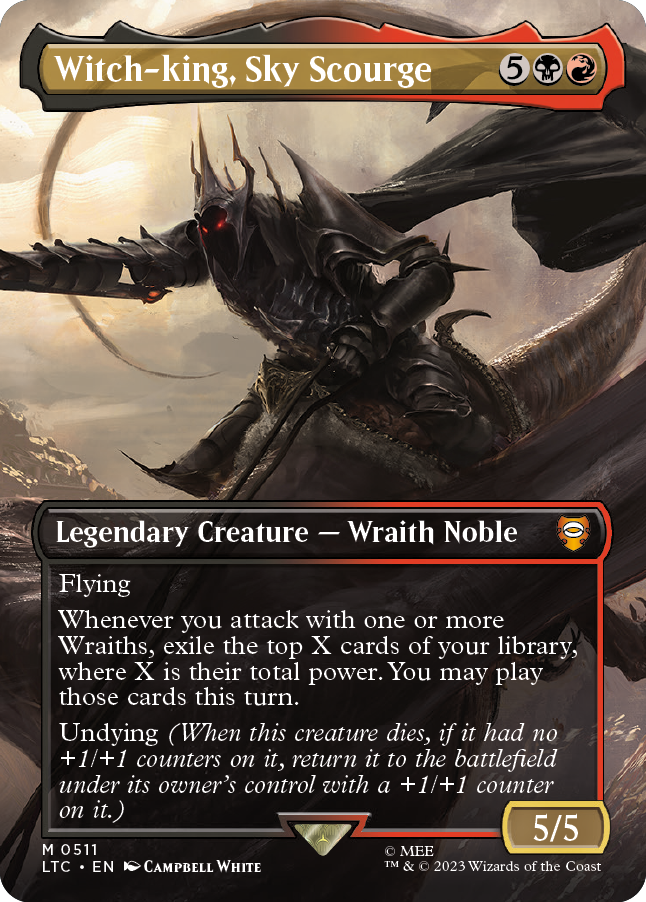
Witch-king, Sky Scourge
{5}{B}{R}
Legendary Creature — Wraith Noble
5/5
Flying
Whenever you attack with one or more Wraiths, exile the top X cards of your library, where X is their total power. You may play those cards this turn.
Undying (When this creature dies, if it had no +1/+1 counters on it, return it to the battlefield under its owner's control with a +1/+1 counter on it.)
- Use the power of the Wraiths as the triggered ability resolves to determine the value of X. If one or more of those Wraiths are no longer on the battlefield at that time, use their power from when they were last on the battlefield.
©2023 Wizards of the Coast LLC Wizards of the Coast, Magic: The Gathering, their logos, Magic, and the WUBRGCT symbols are property of Wizards in the USA and other countries. U.S. Pat. No. RE 37,957.
Tales of Middle-earth, The Lord of the Rings, and the names of the characters, events, items, and places therein are trademarks of Middle-earth Enterprises, LLC used under license by Wizards of the Coast LLC. All rights reserved.
